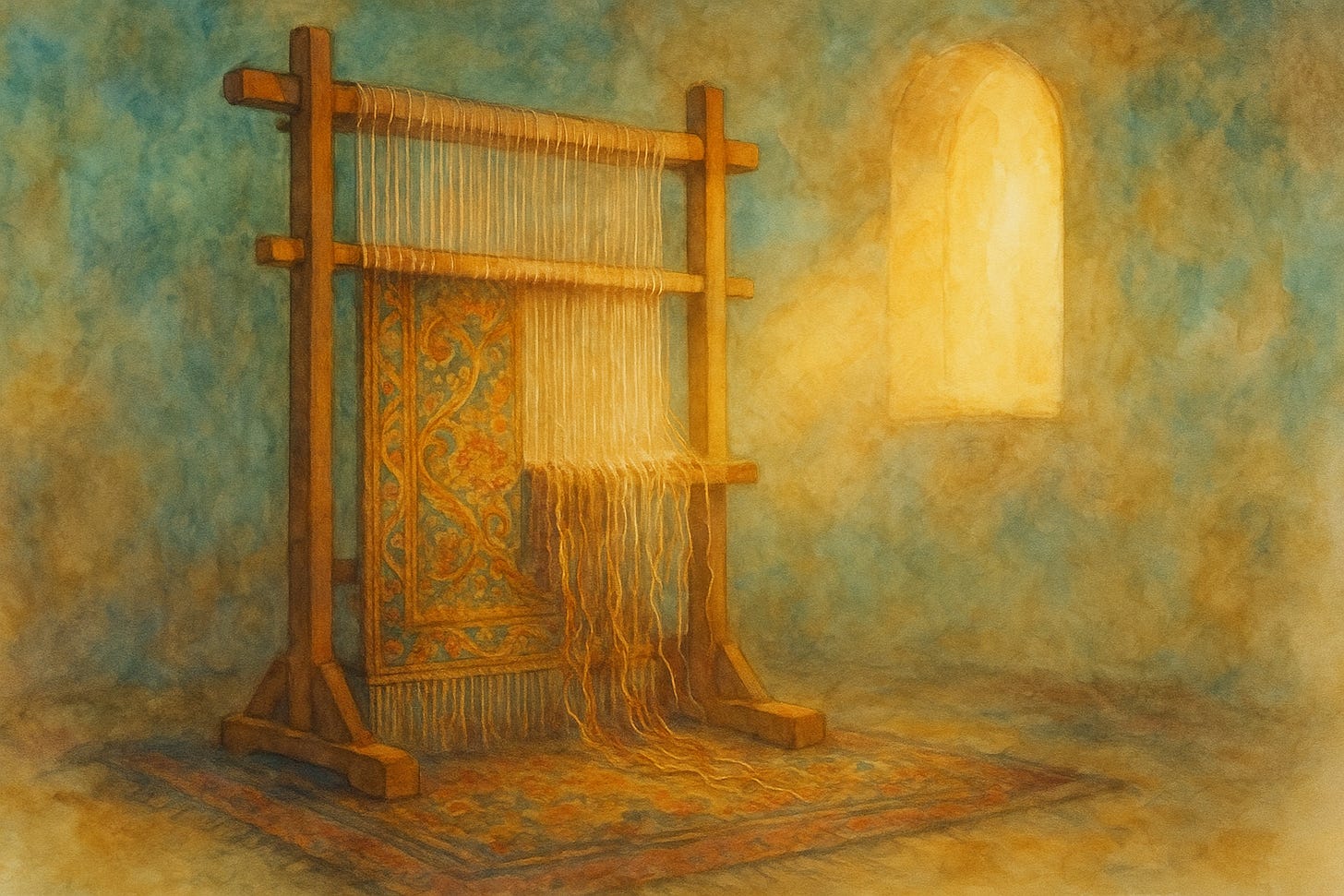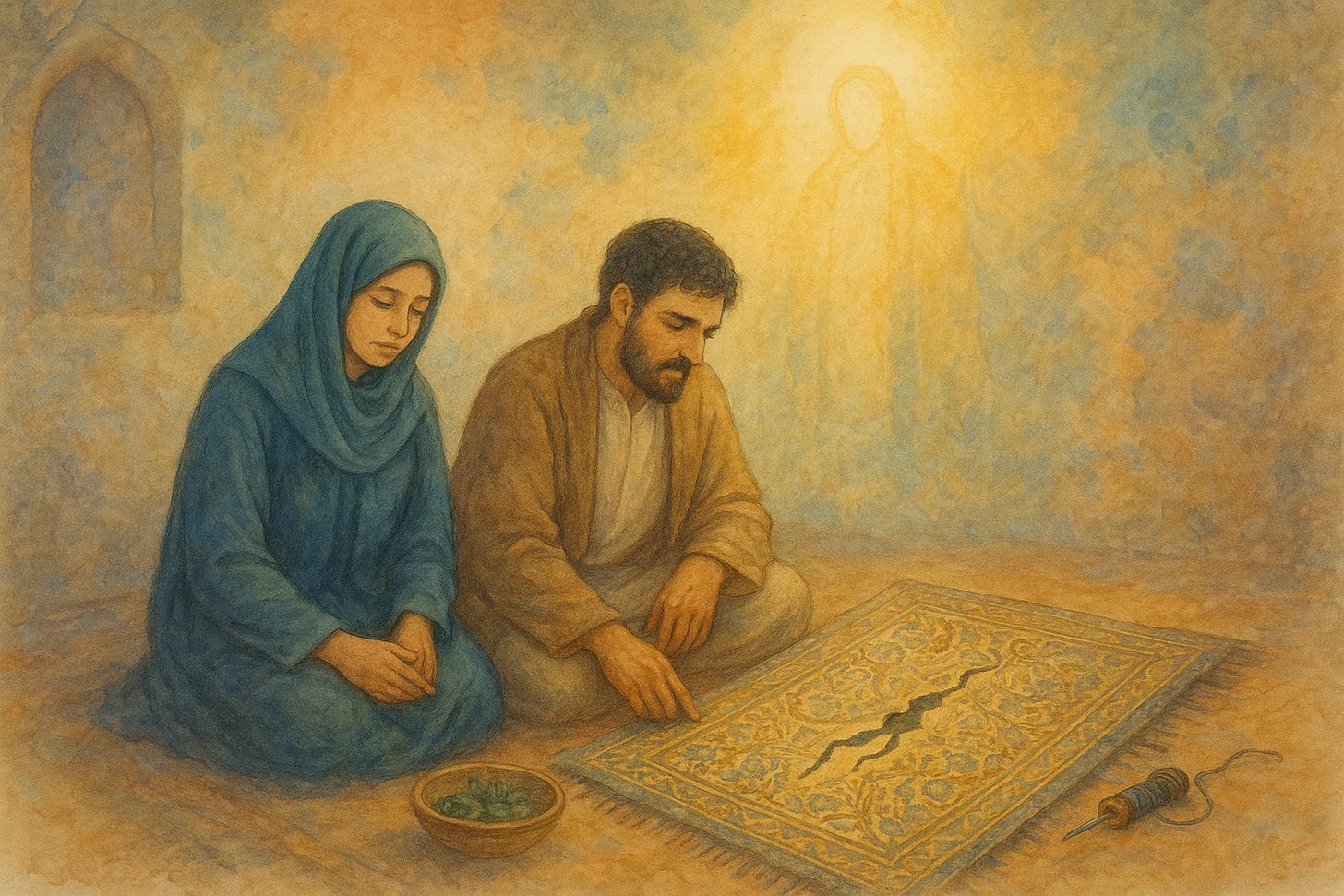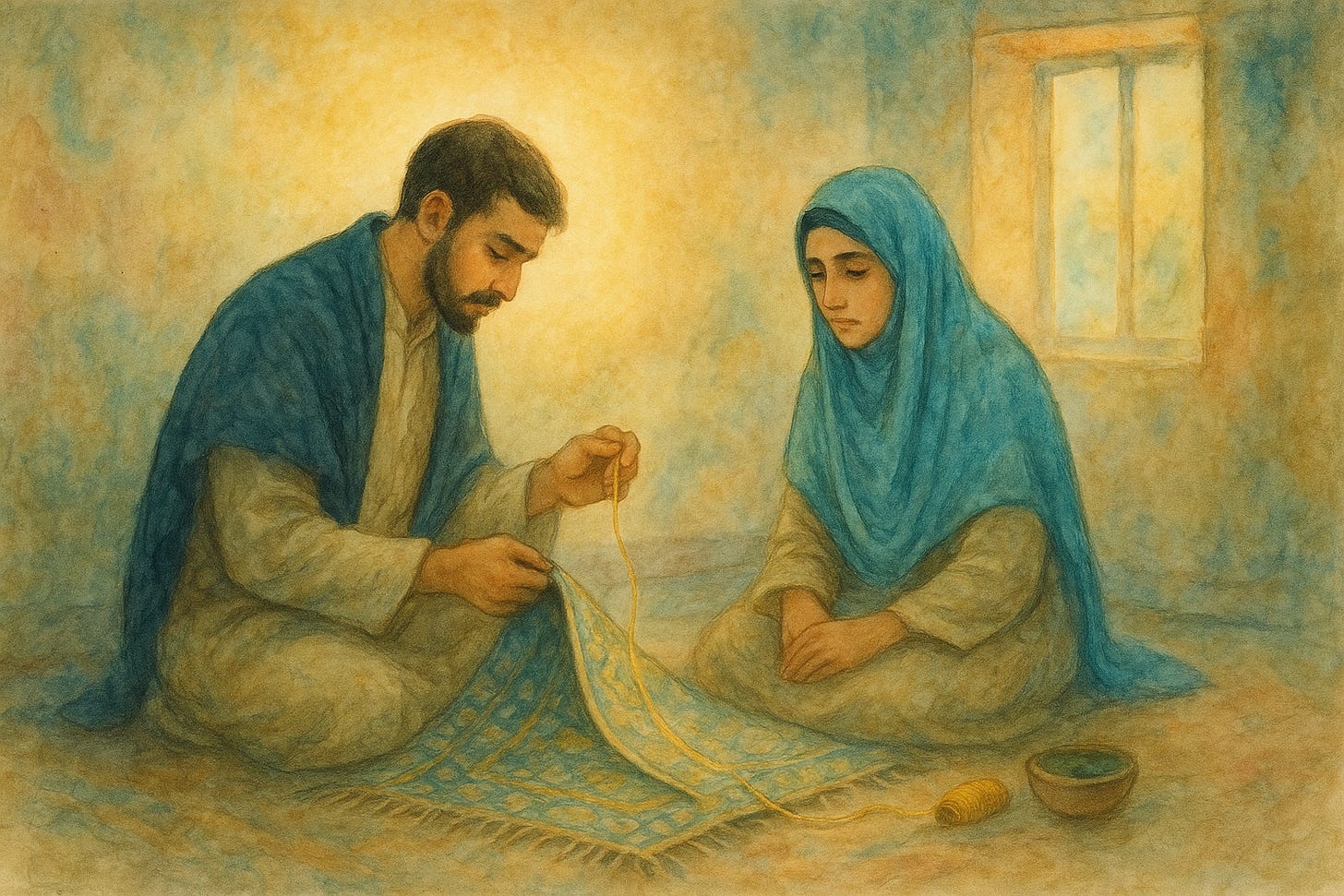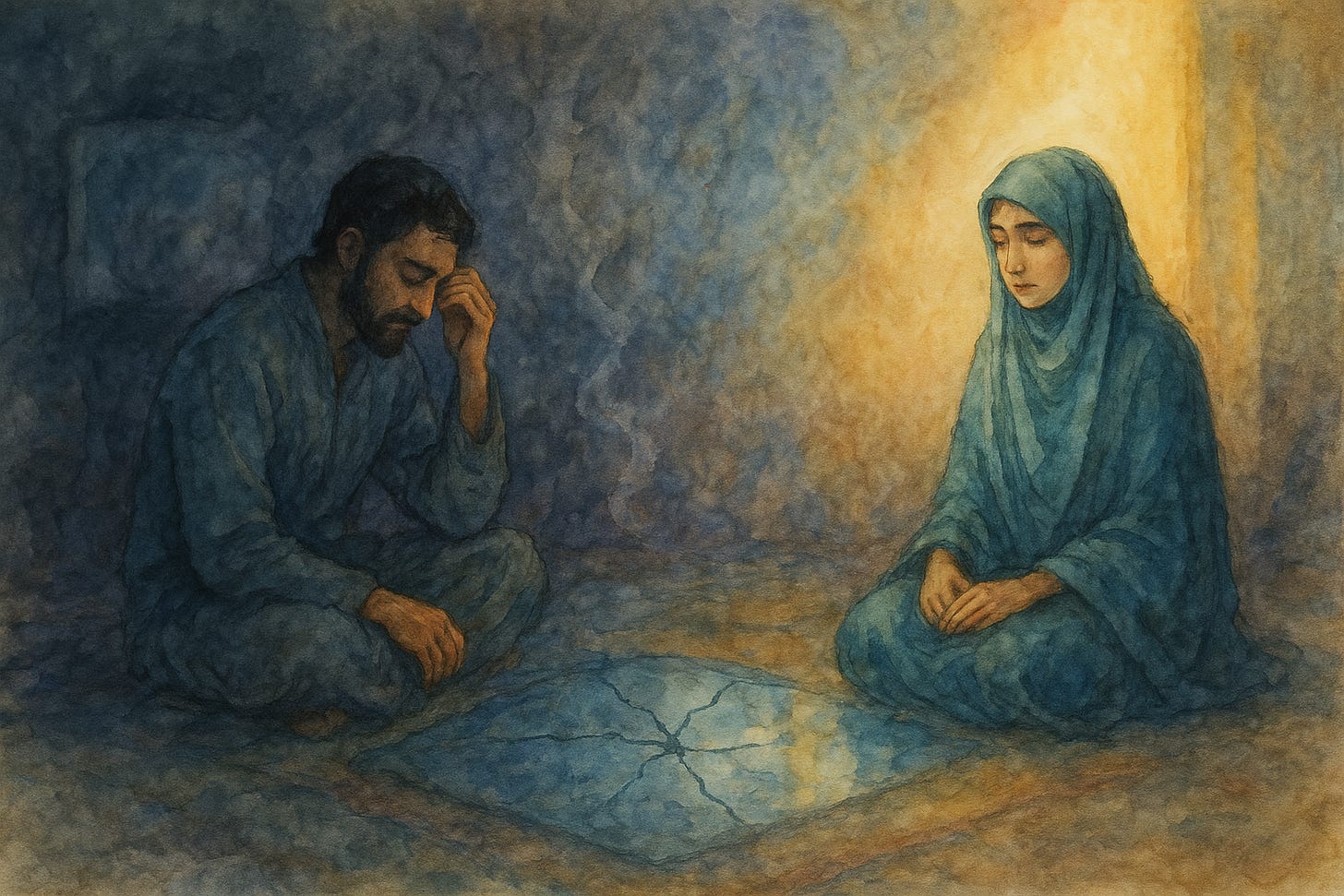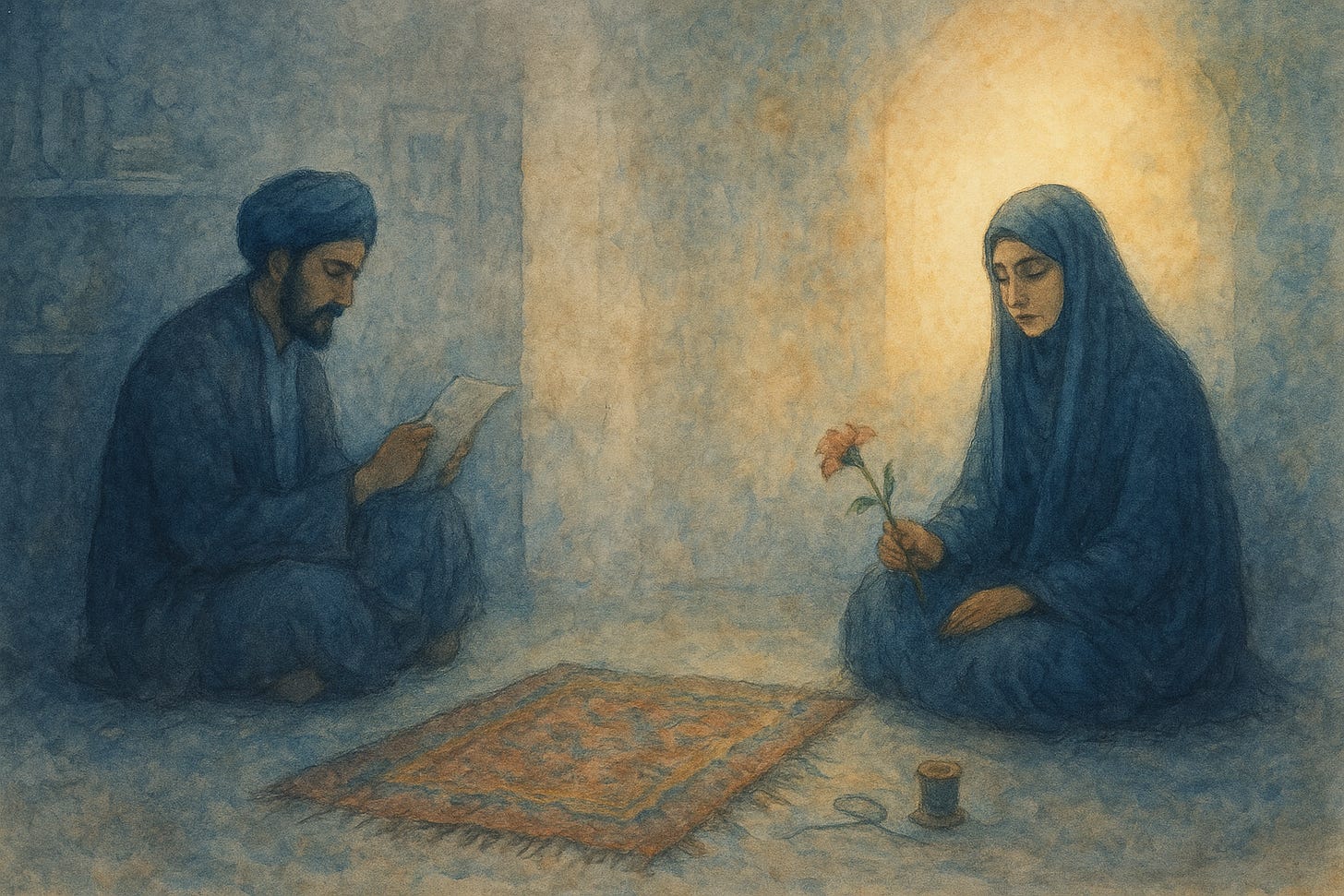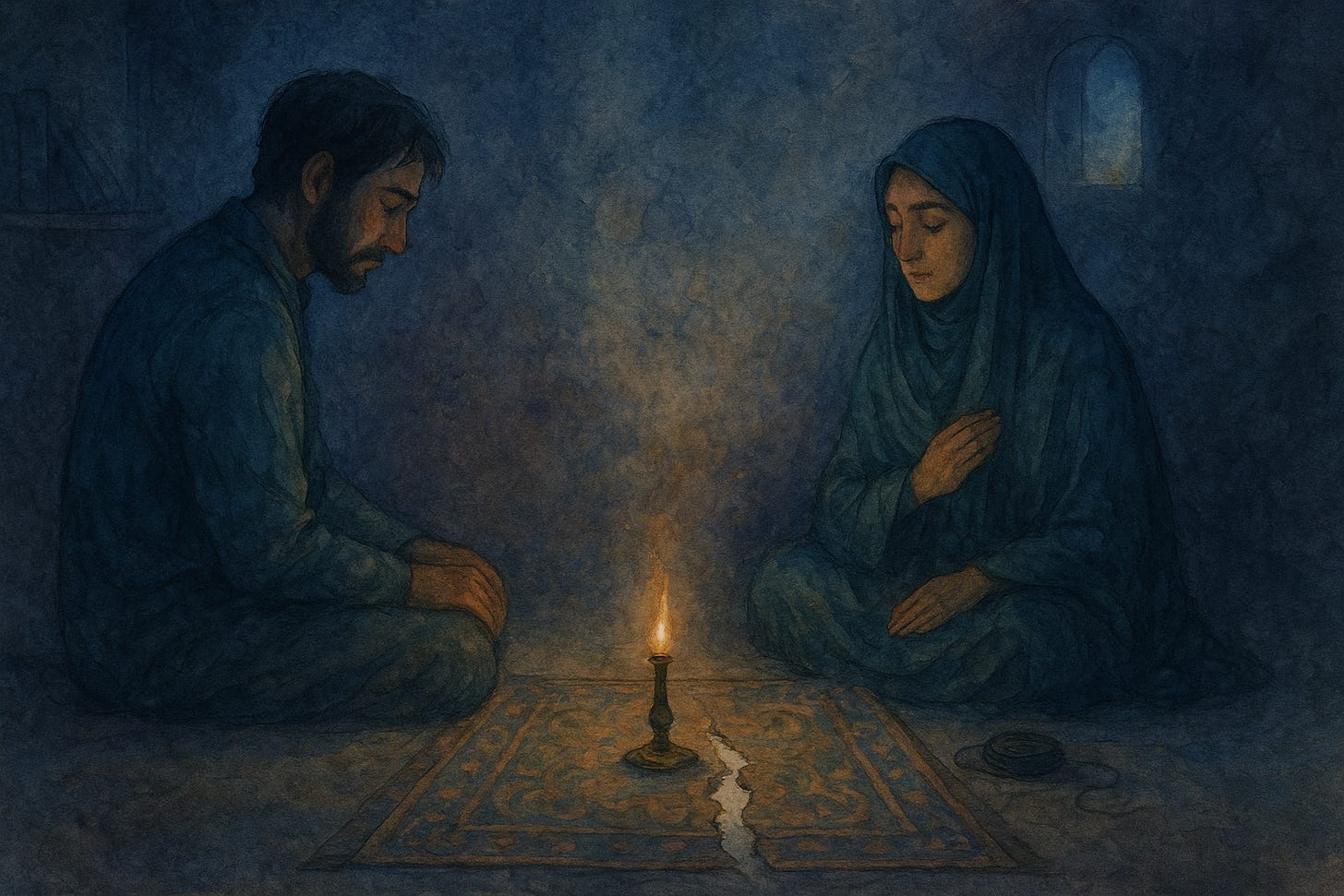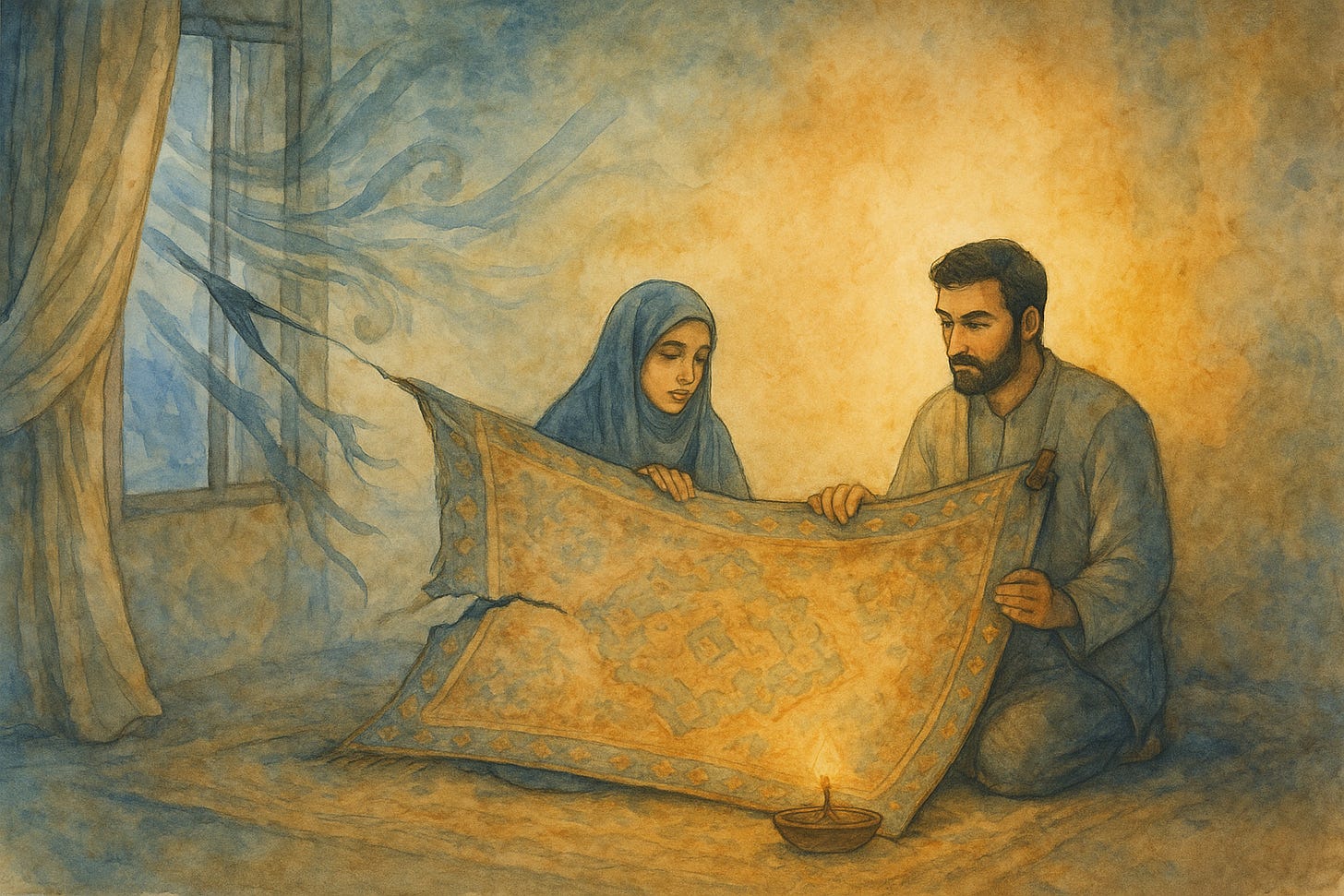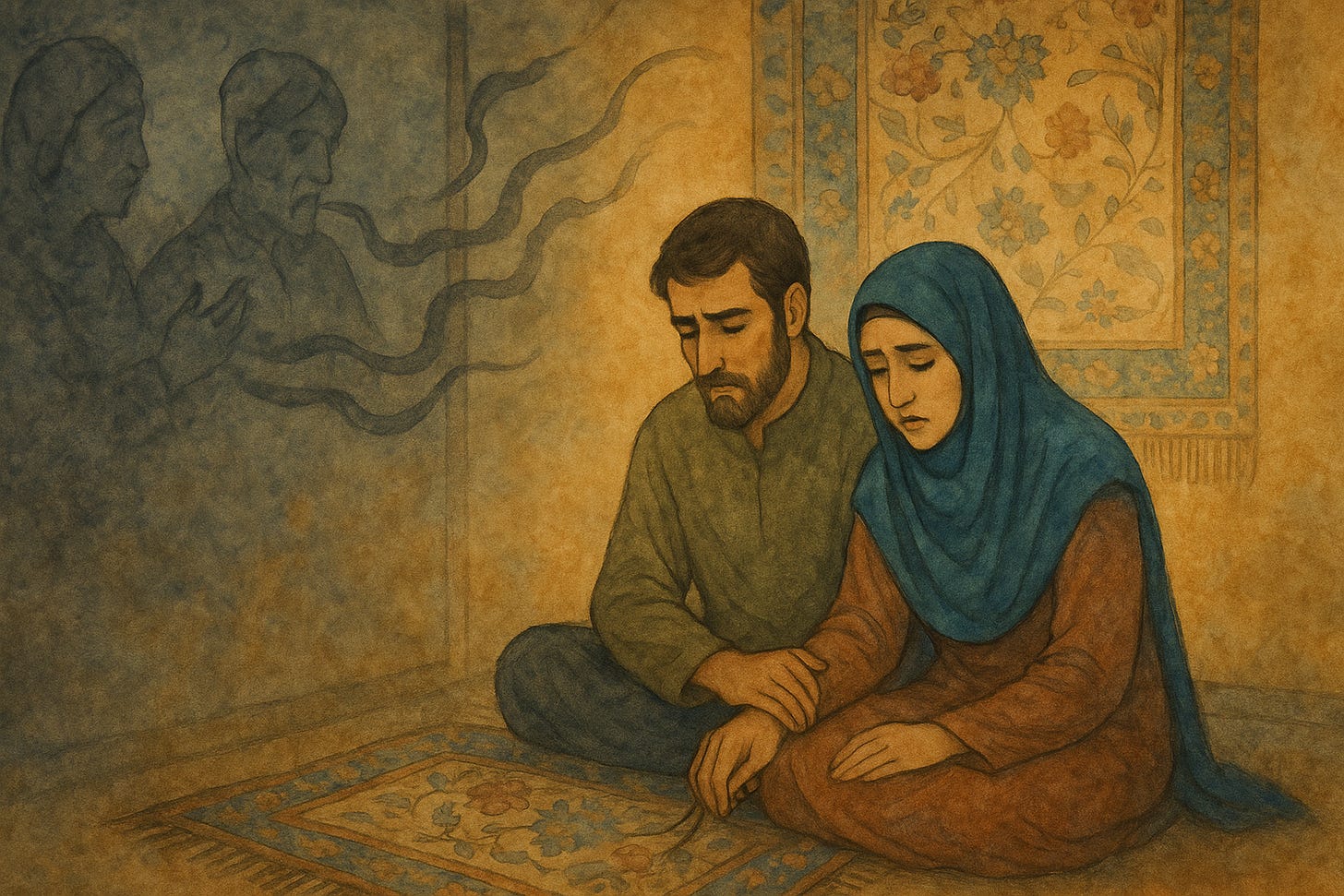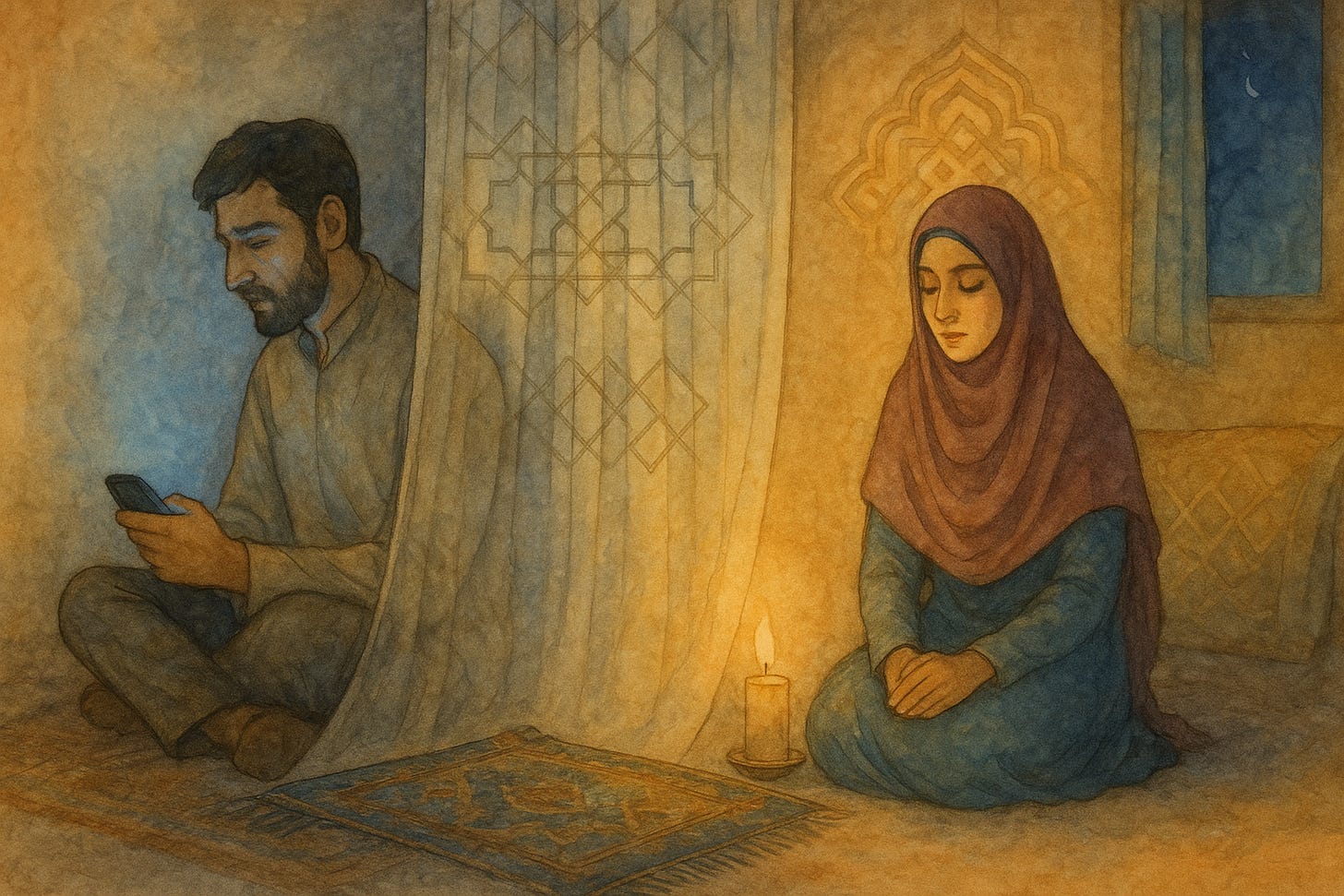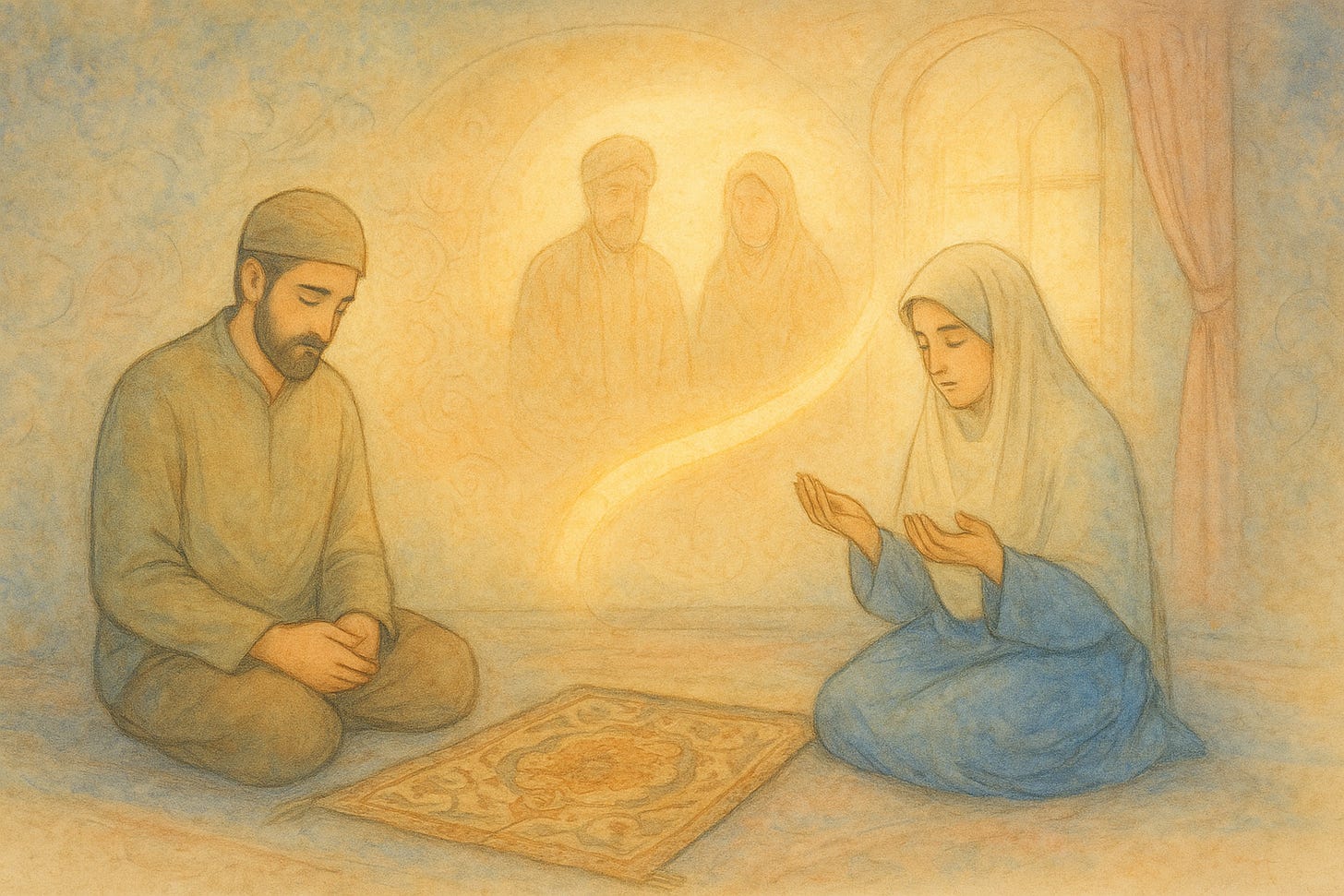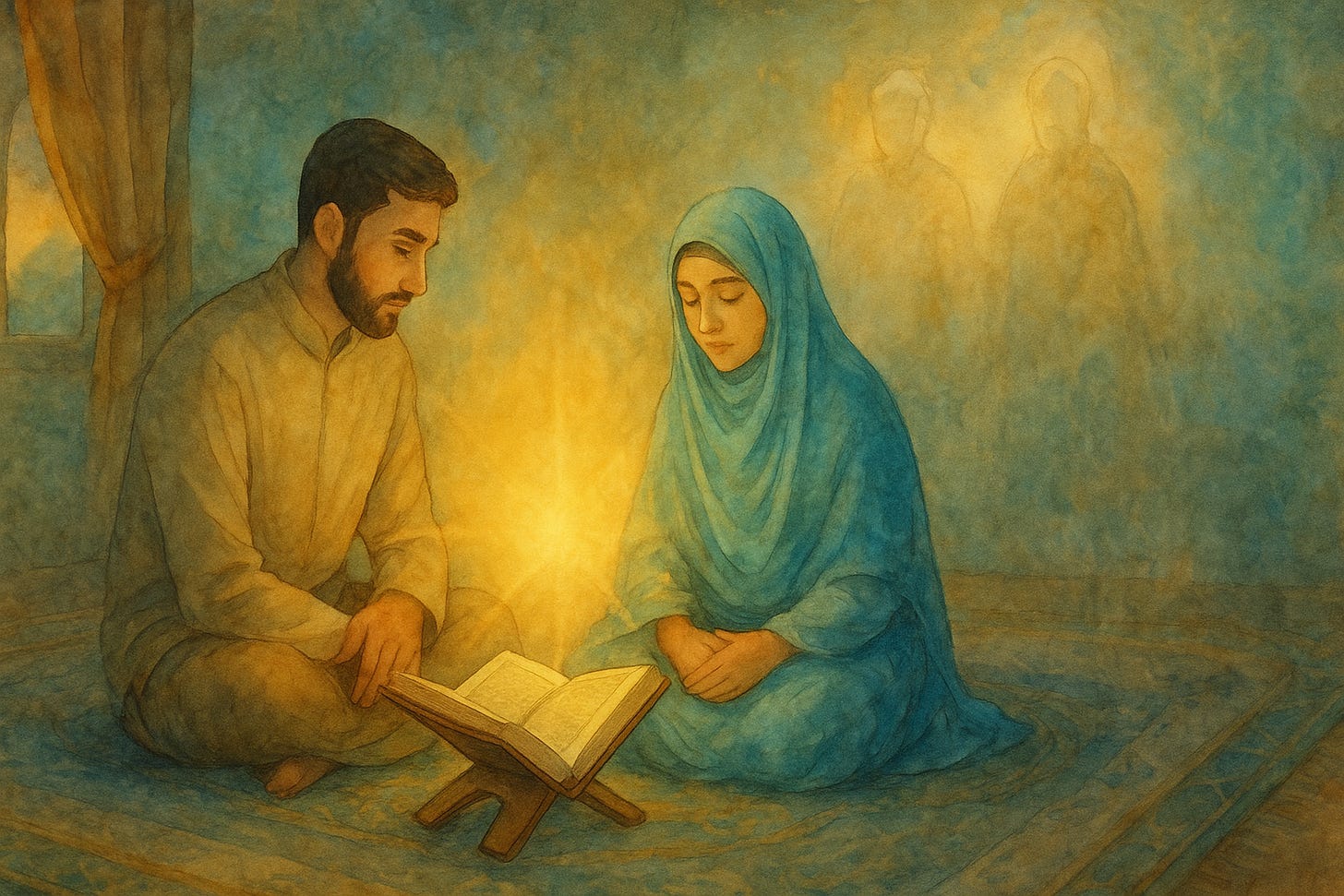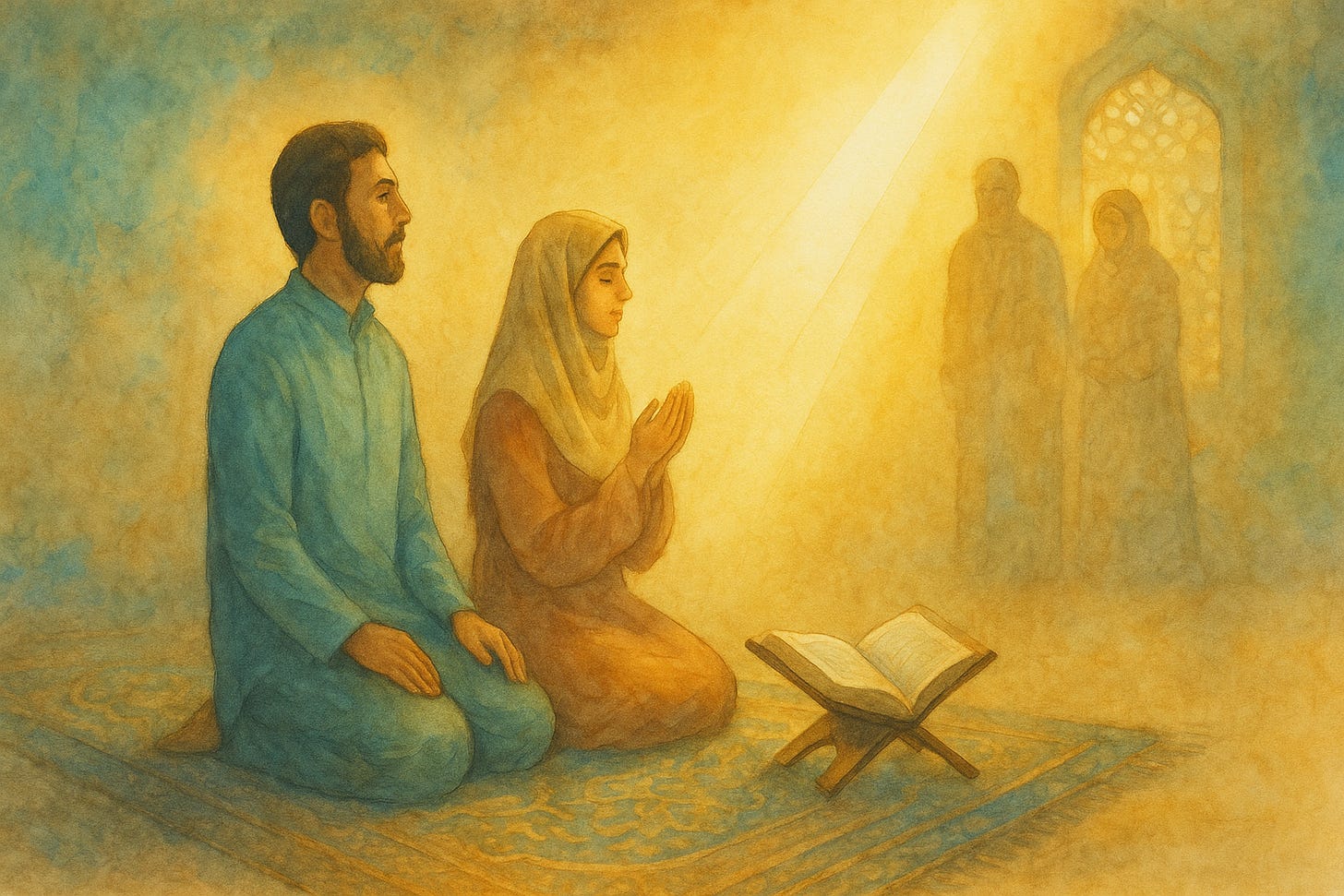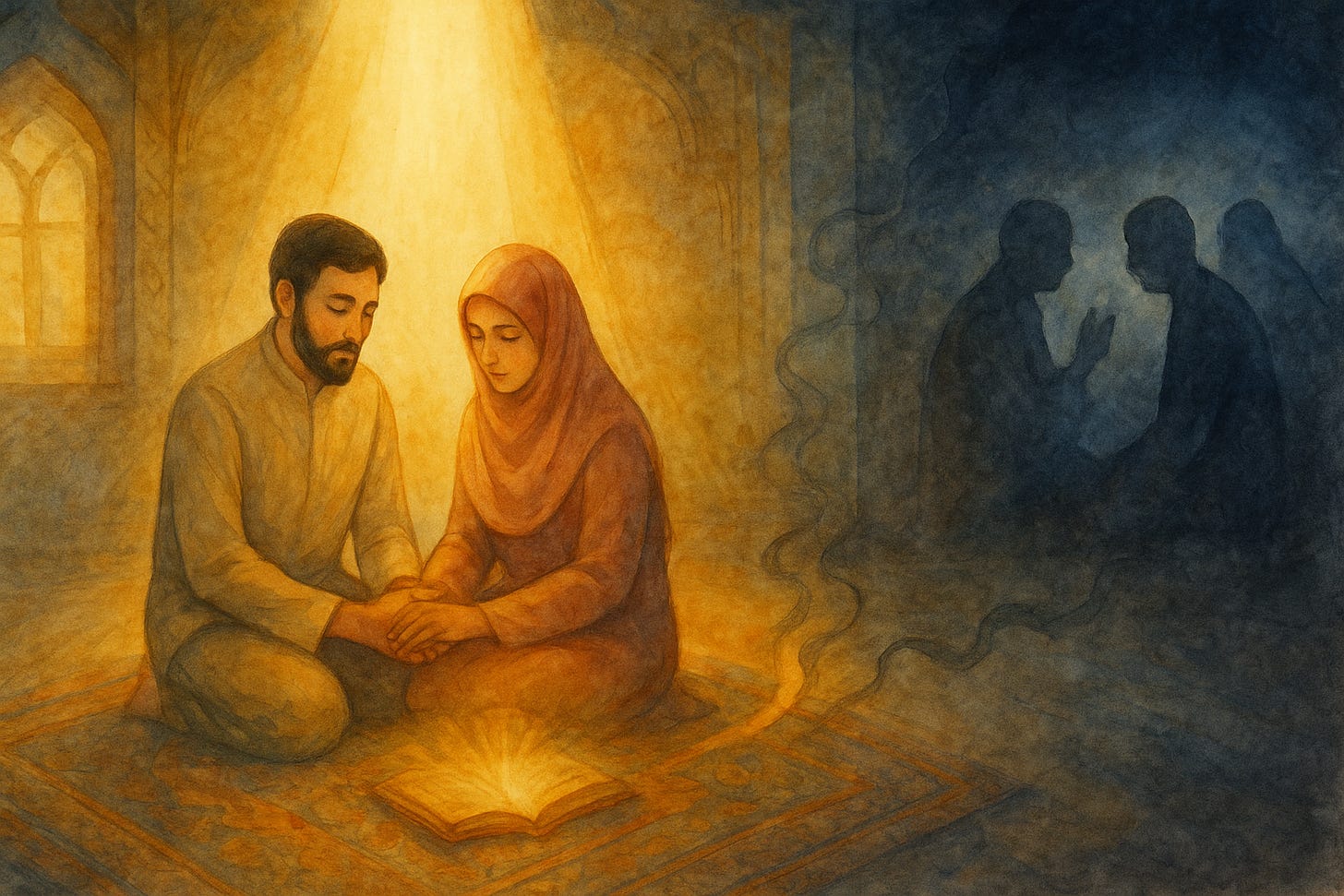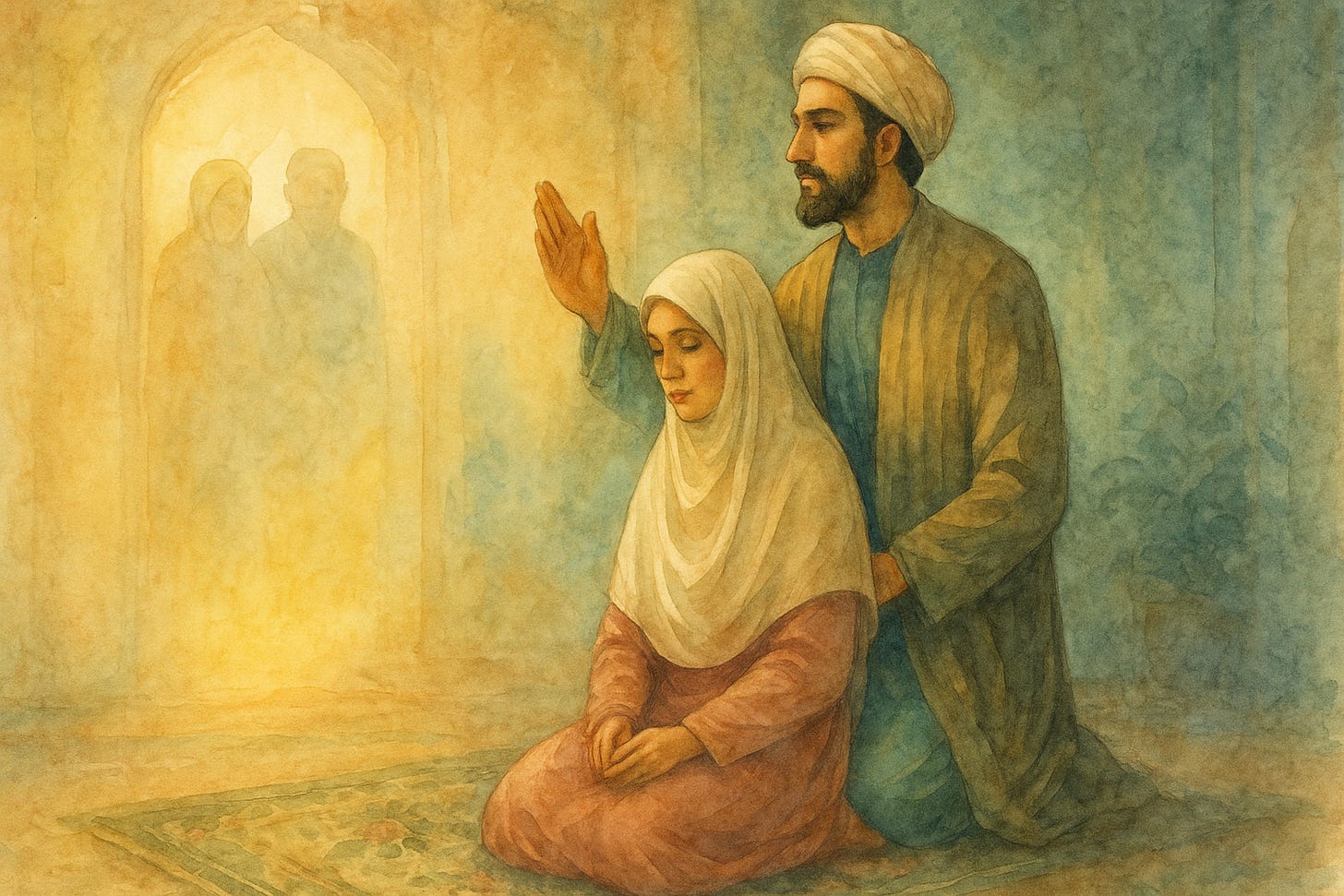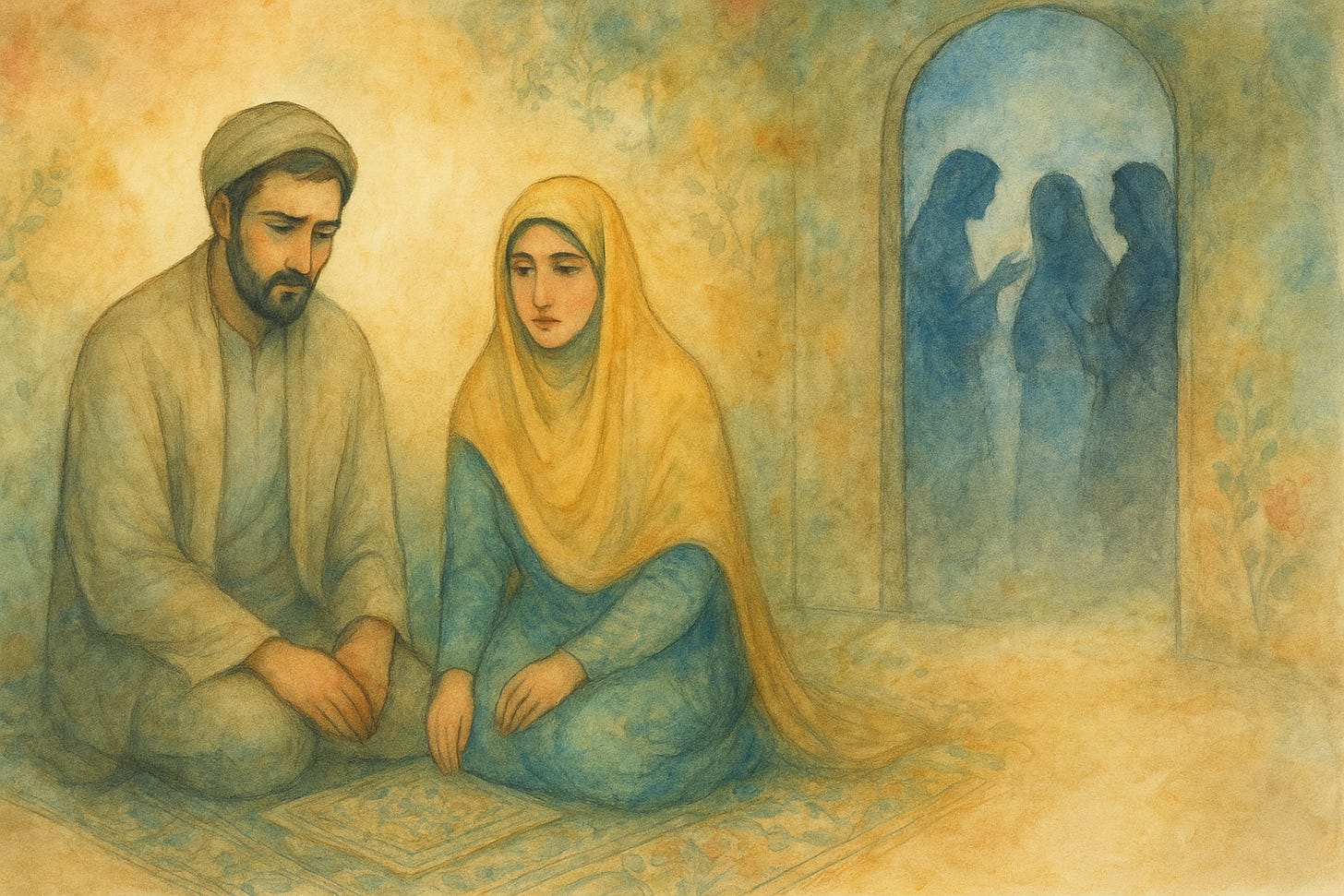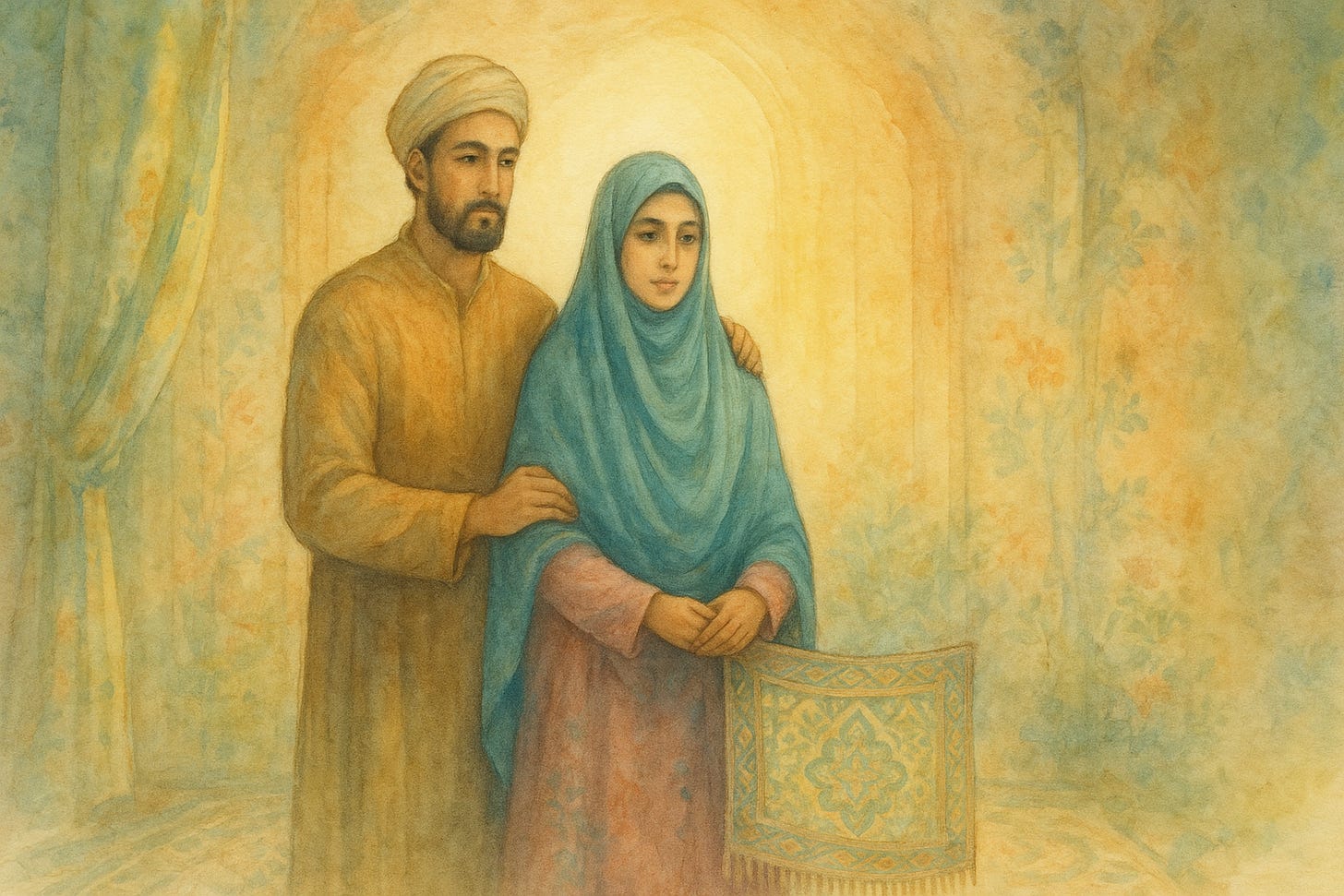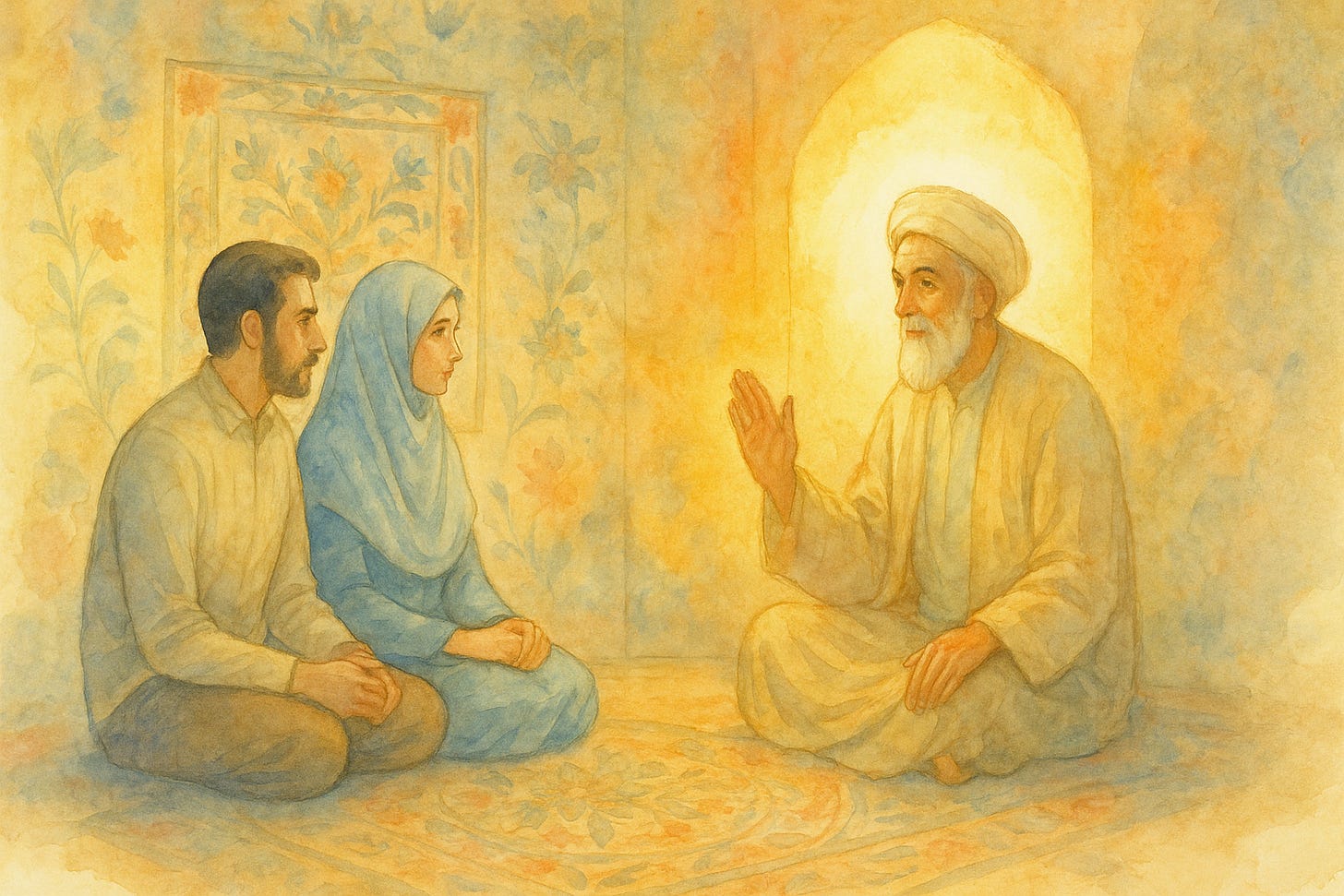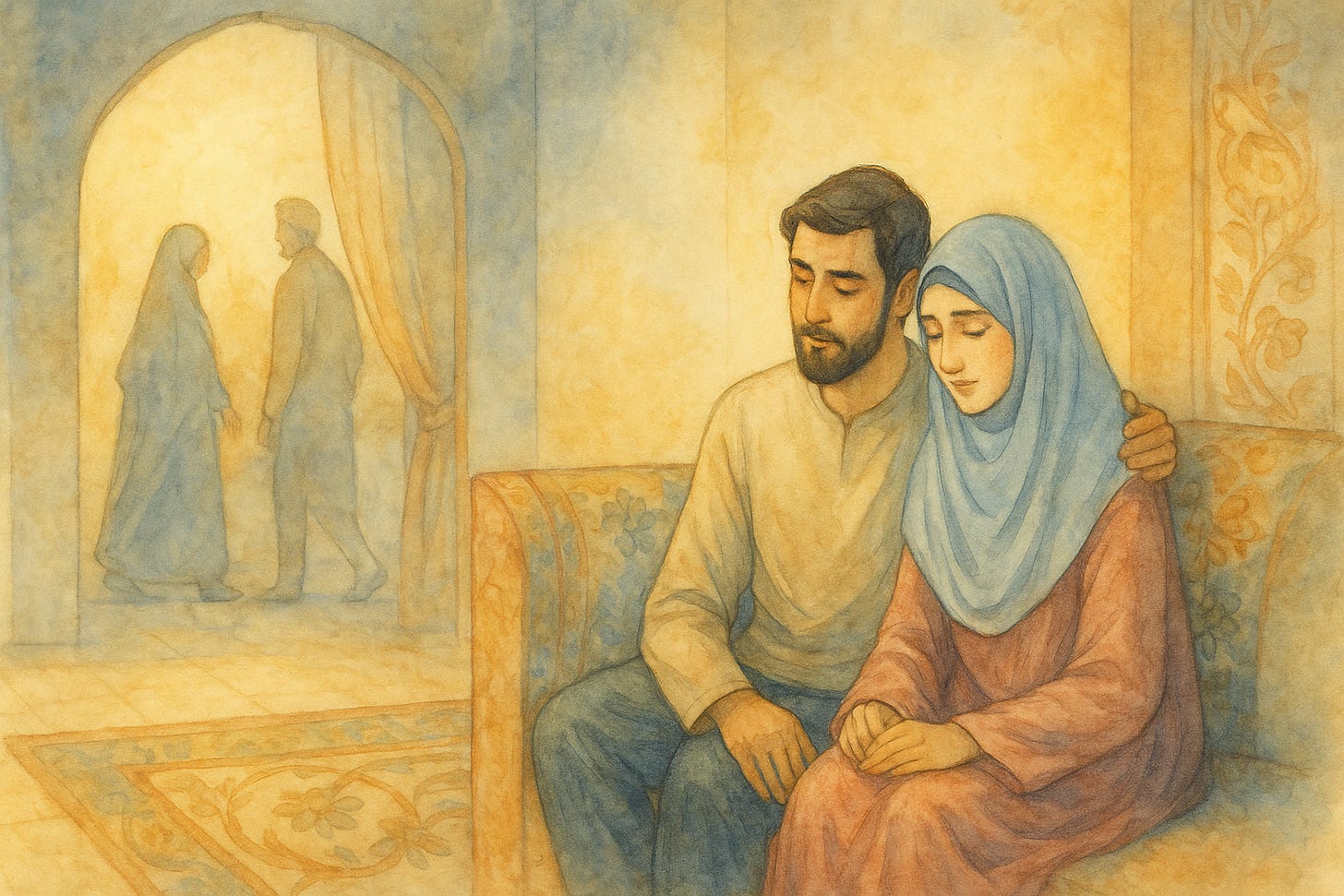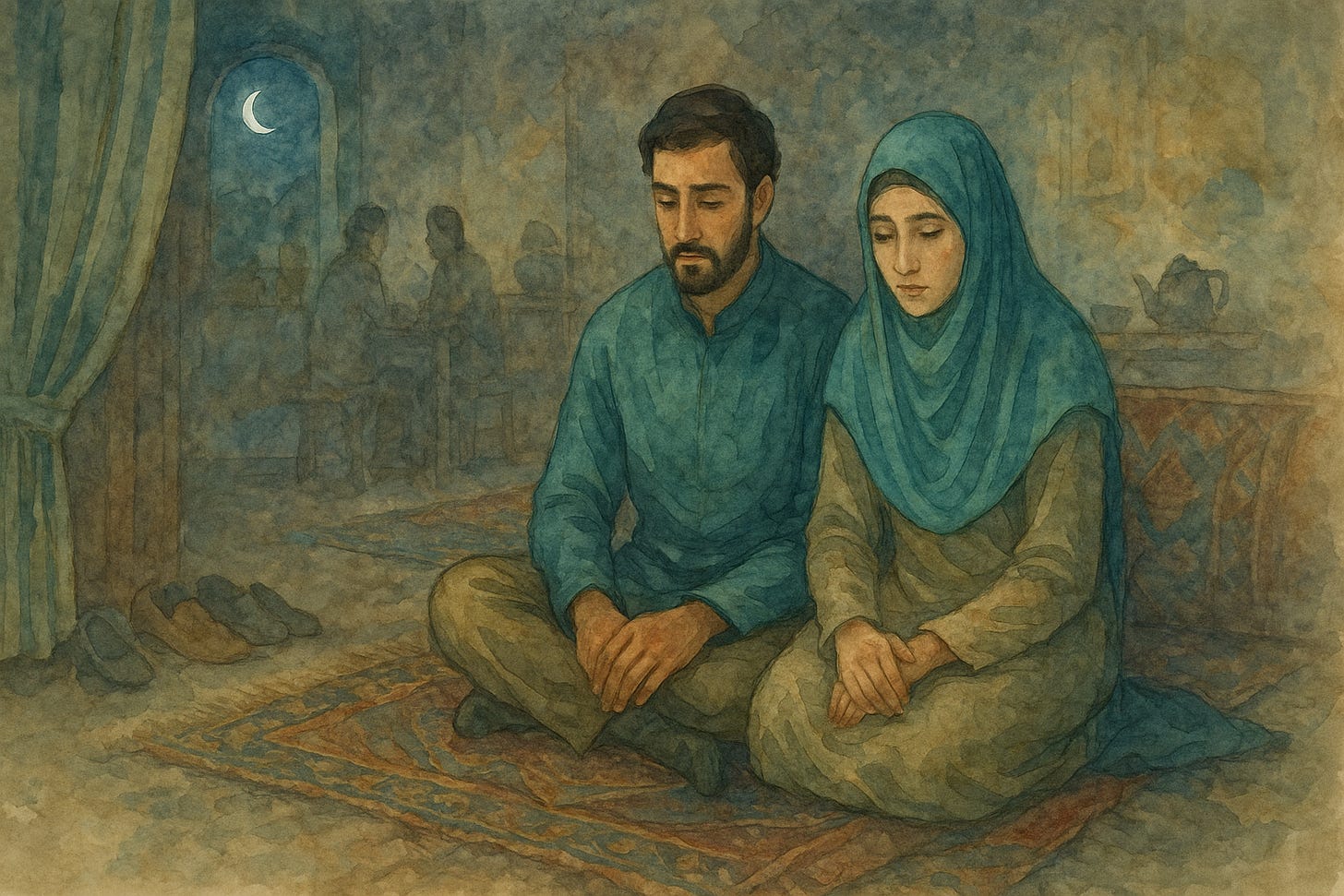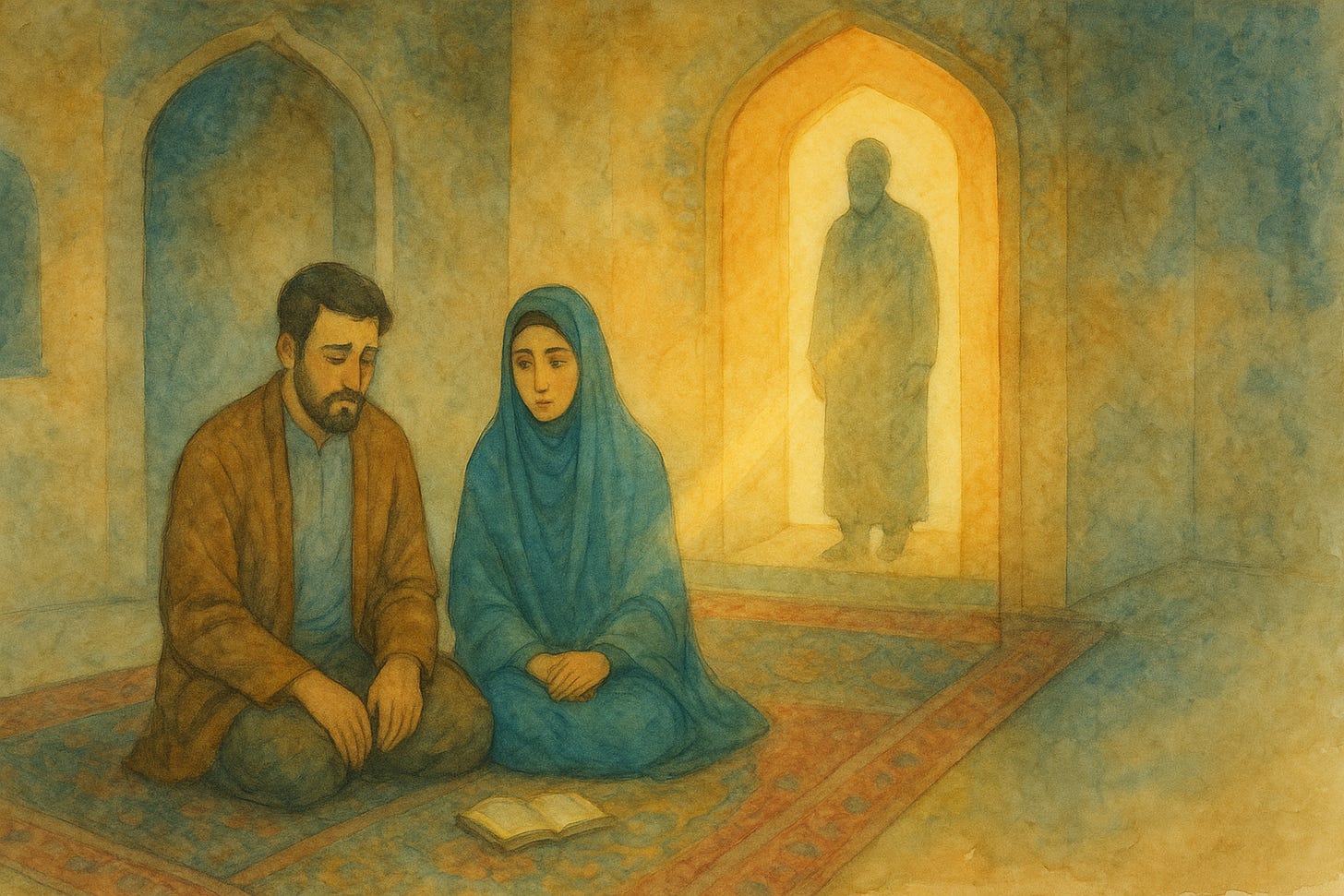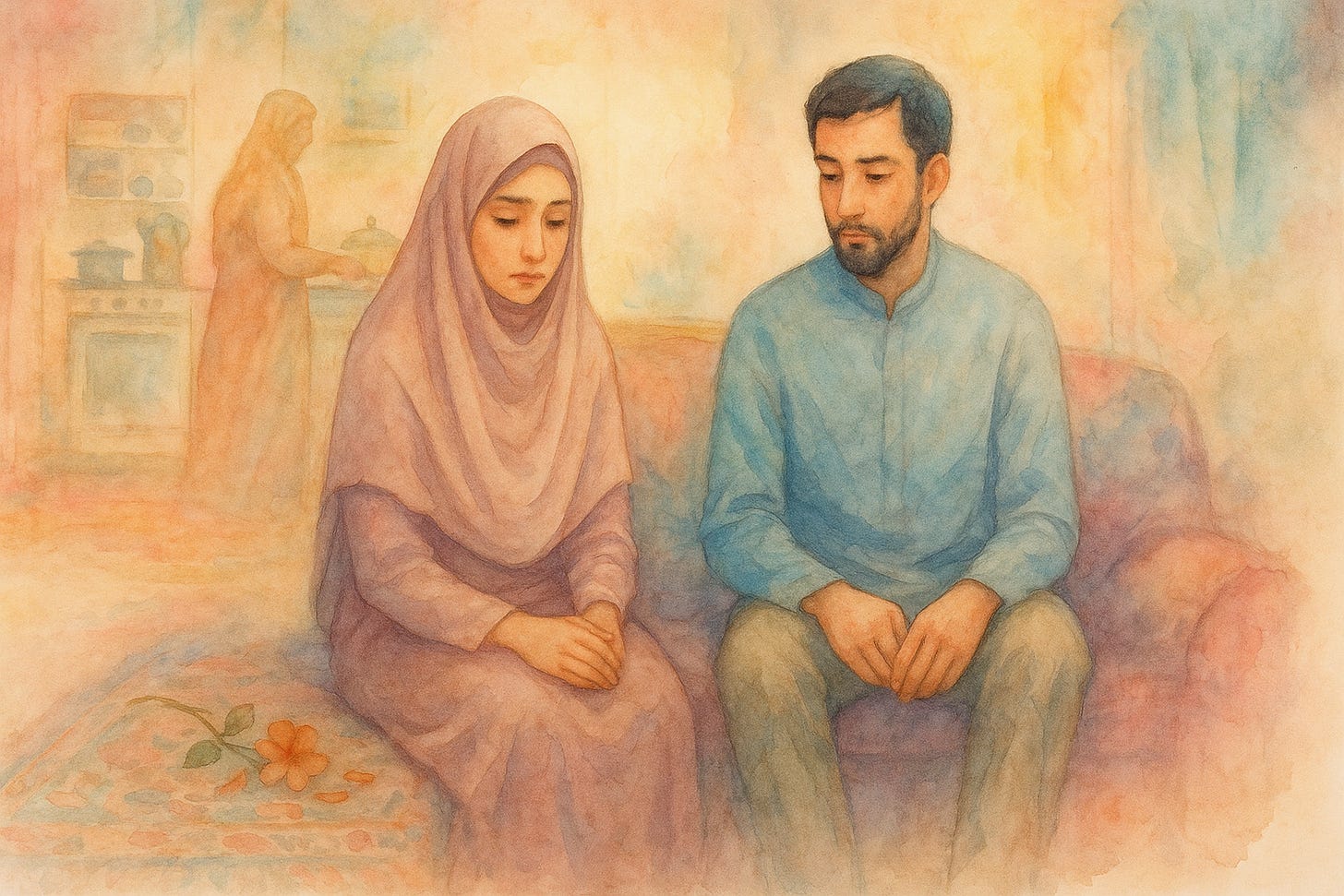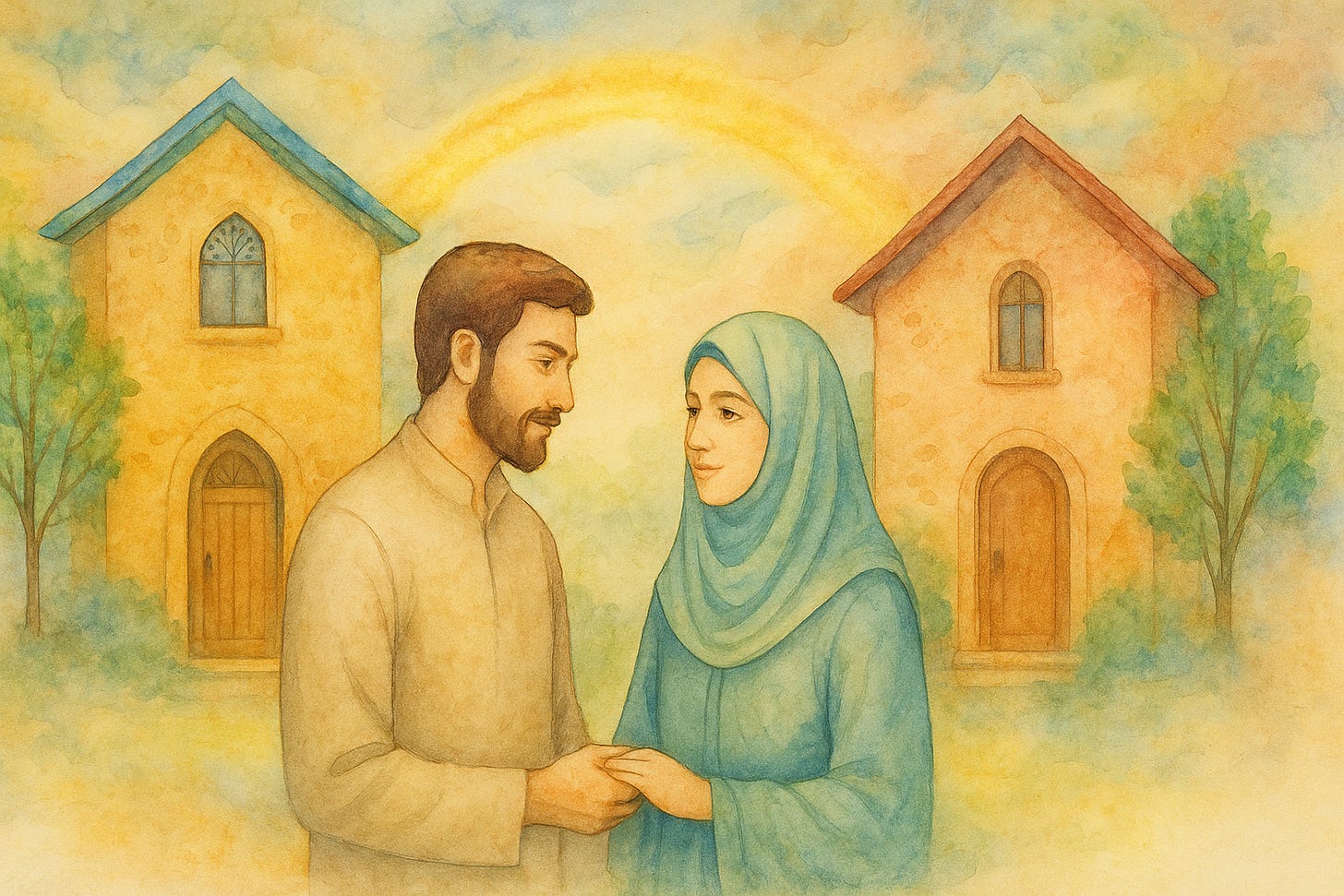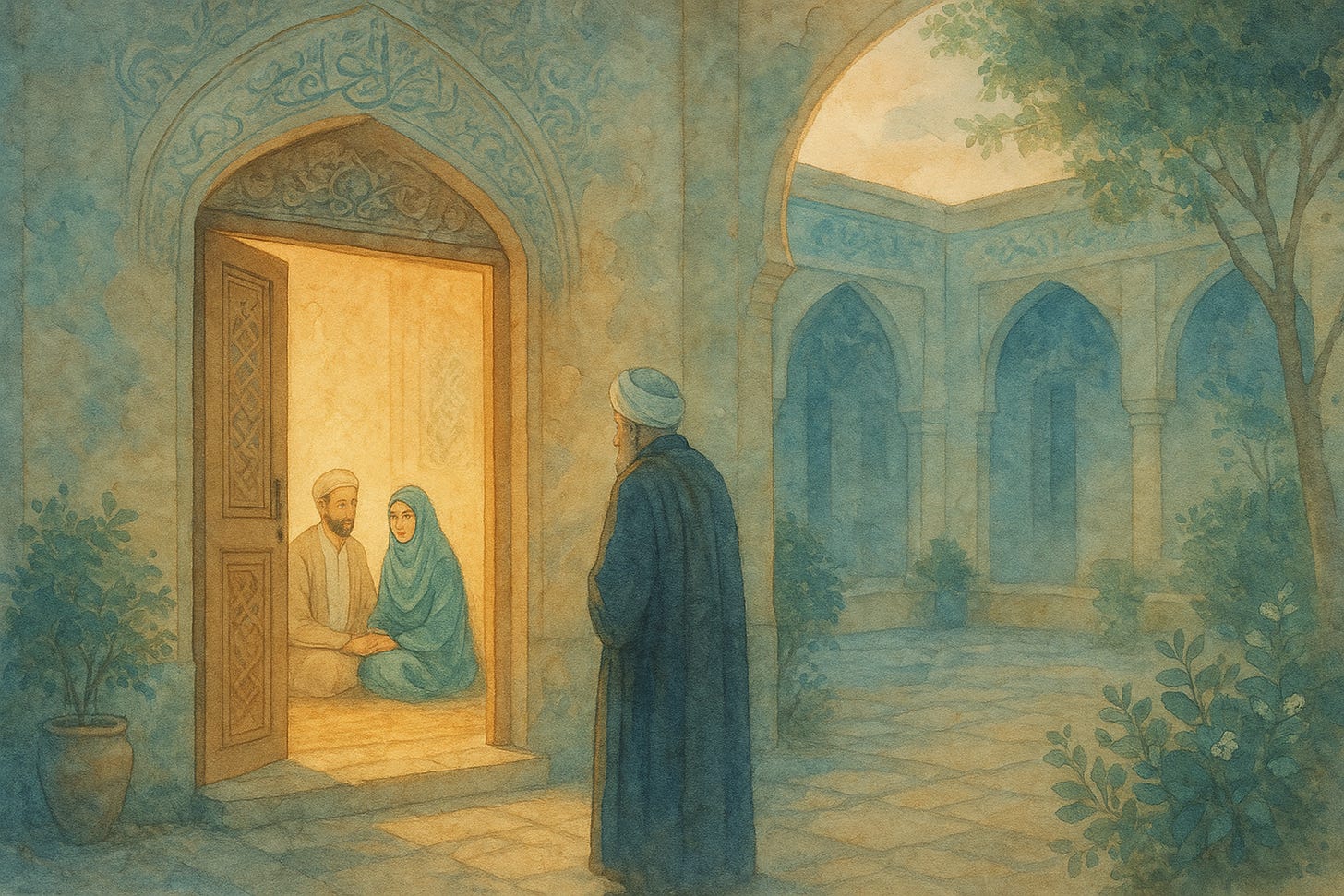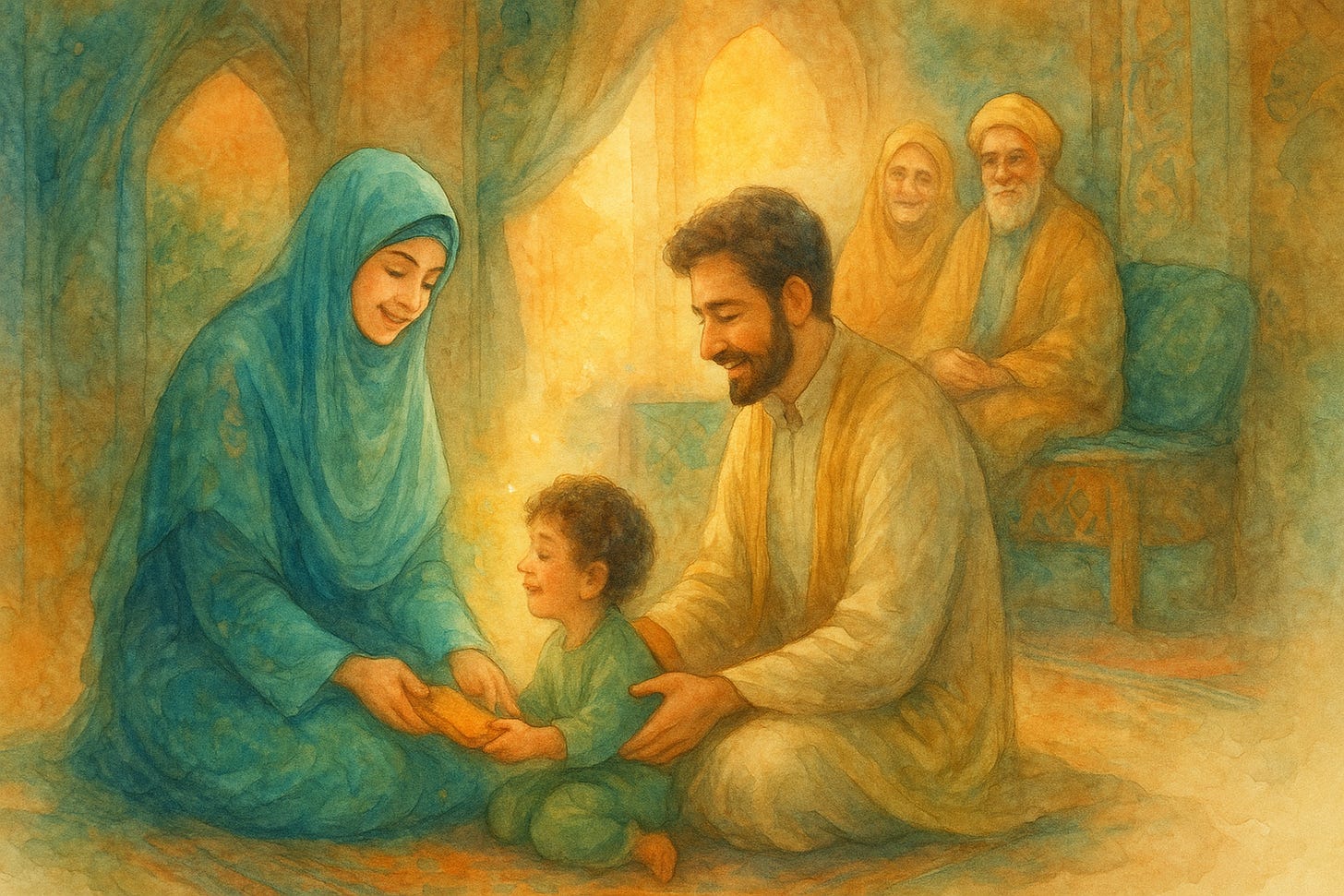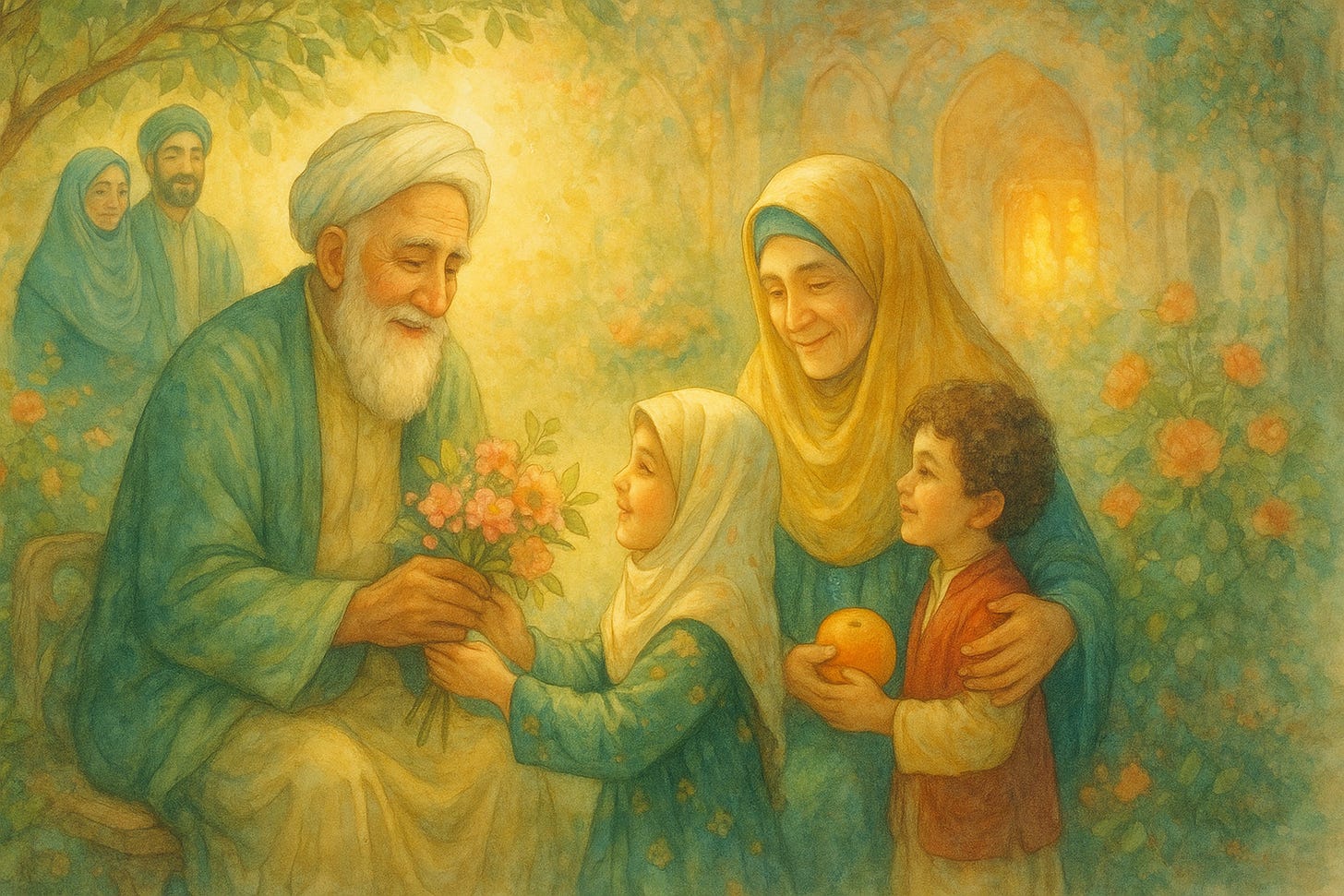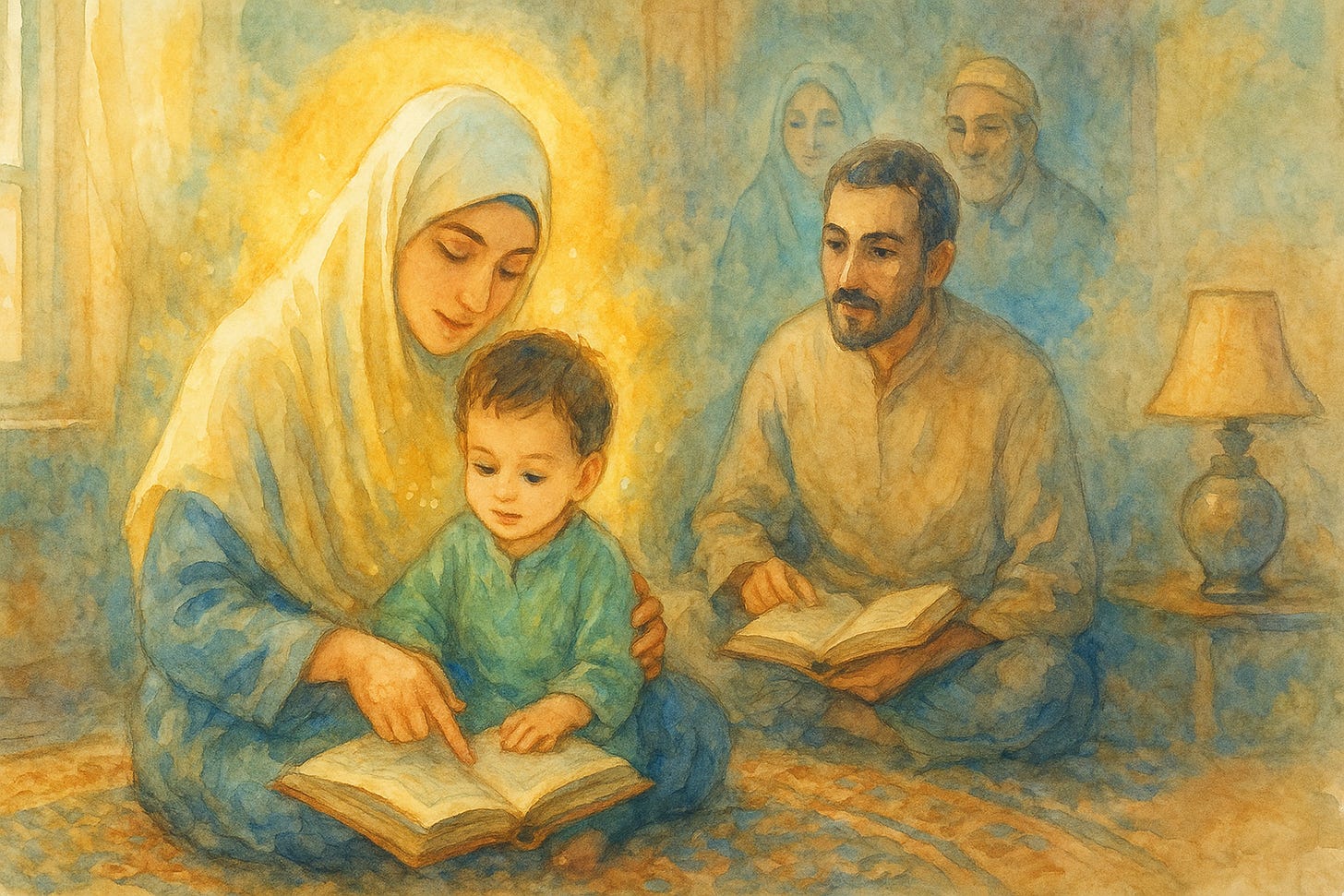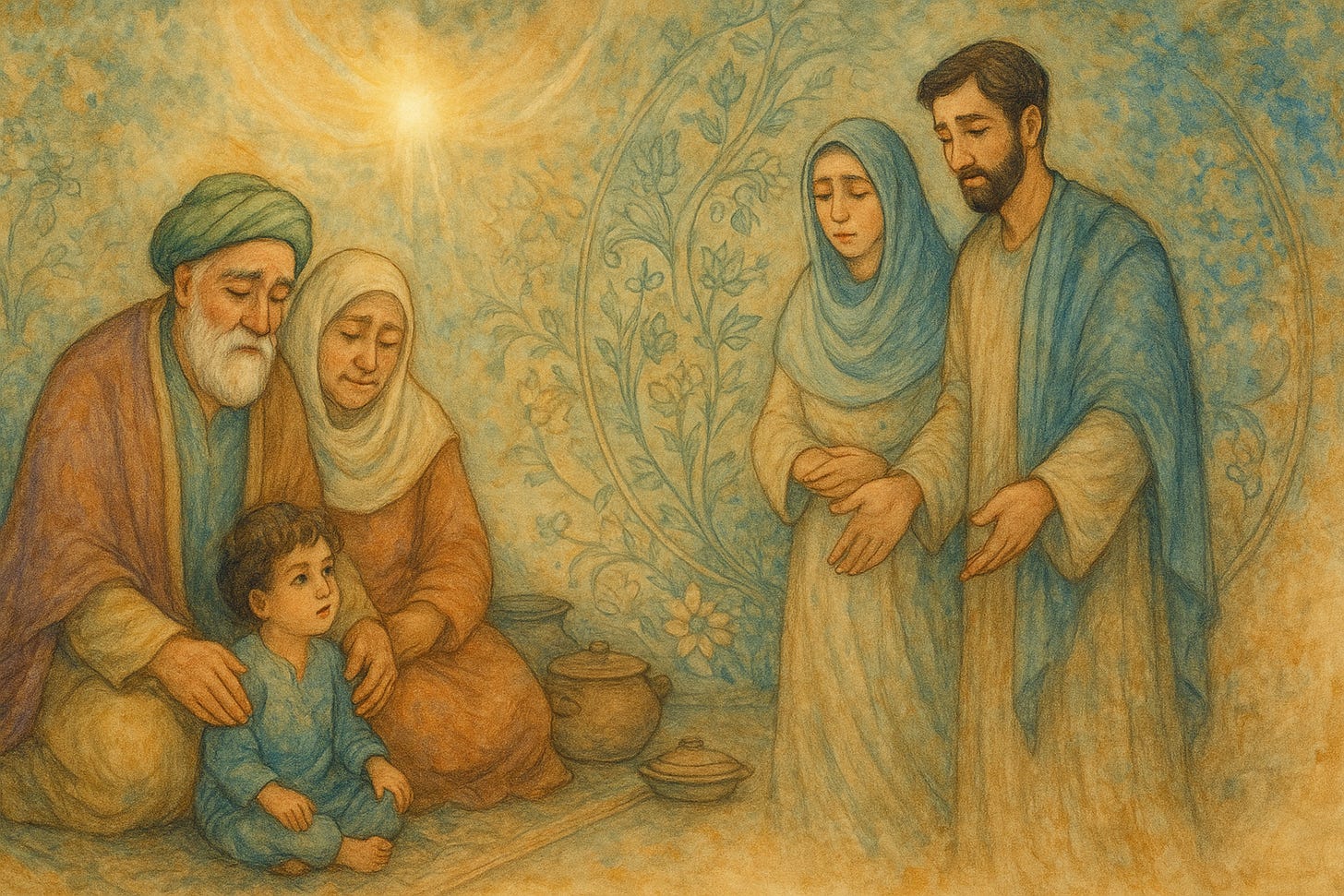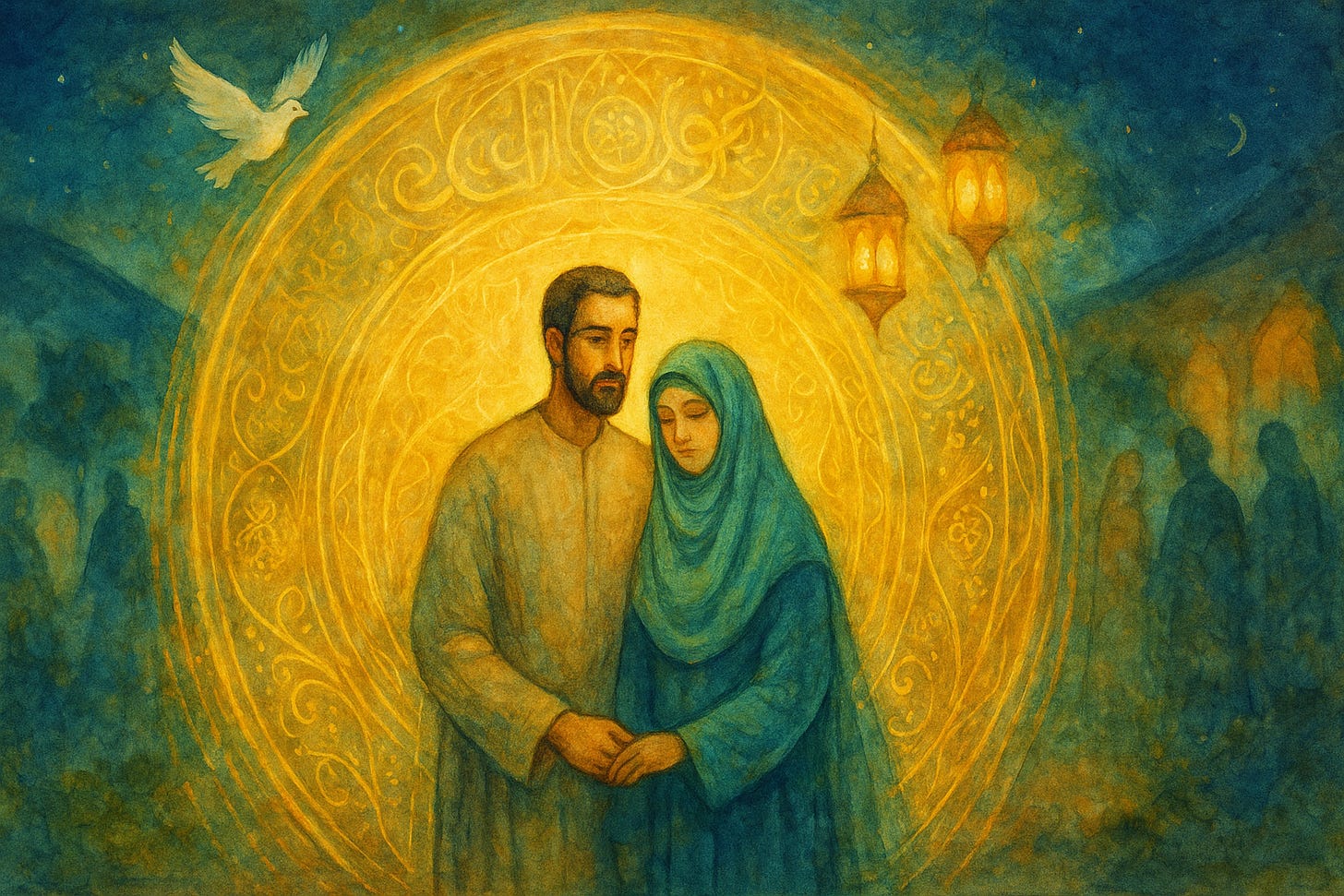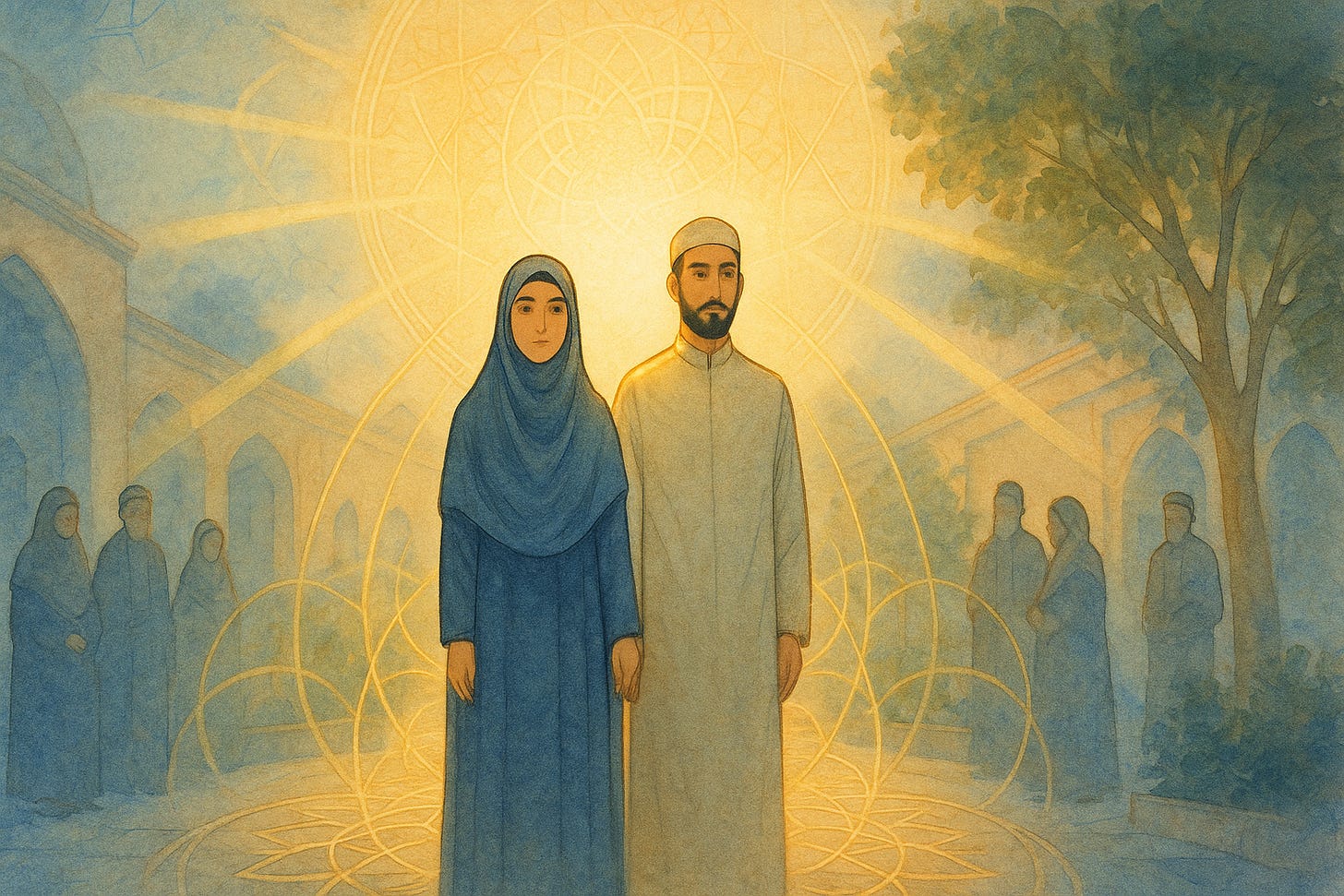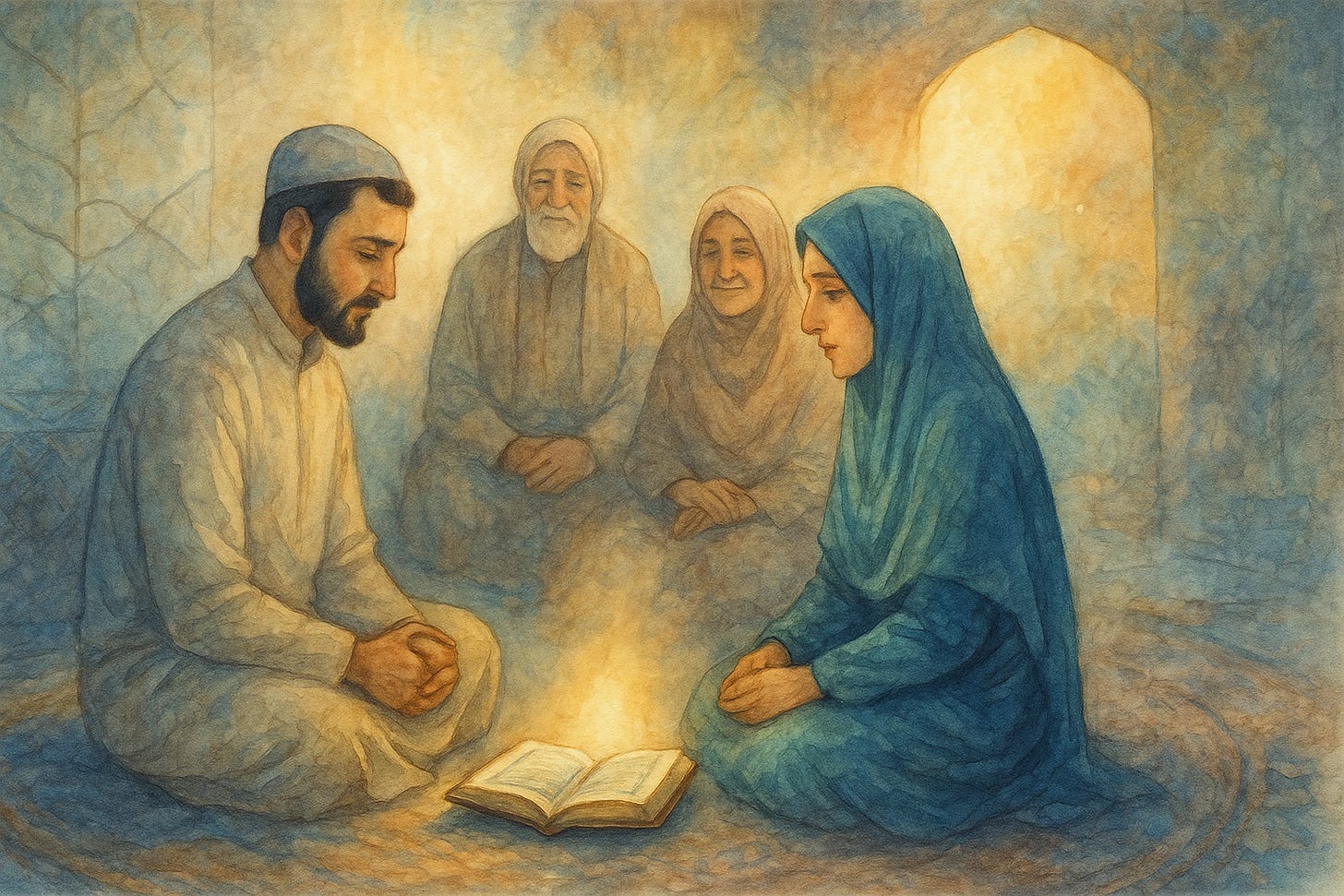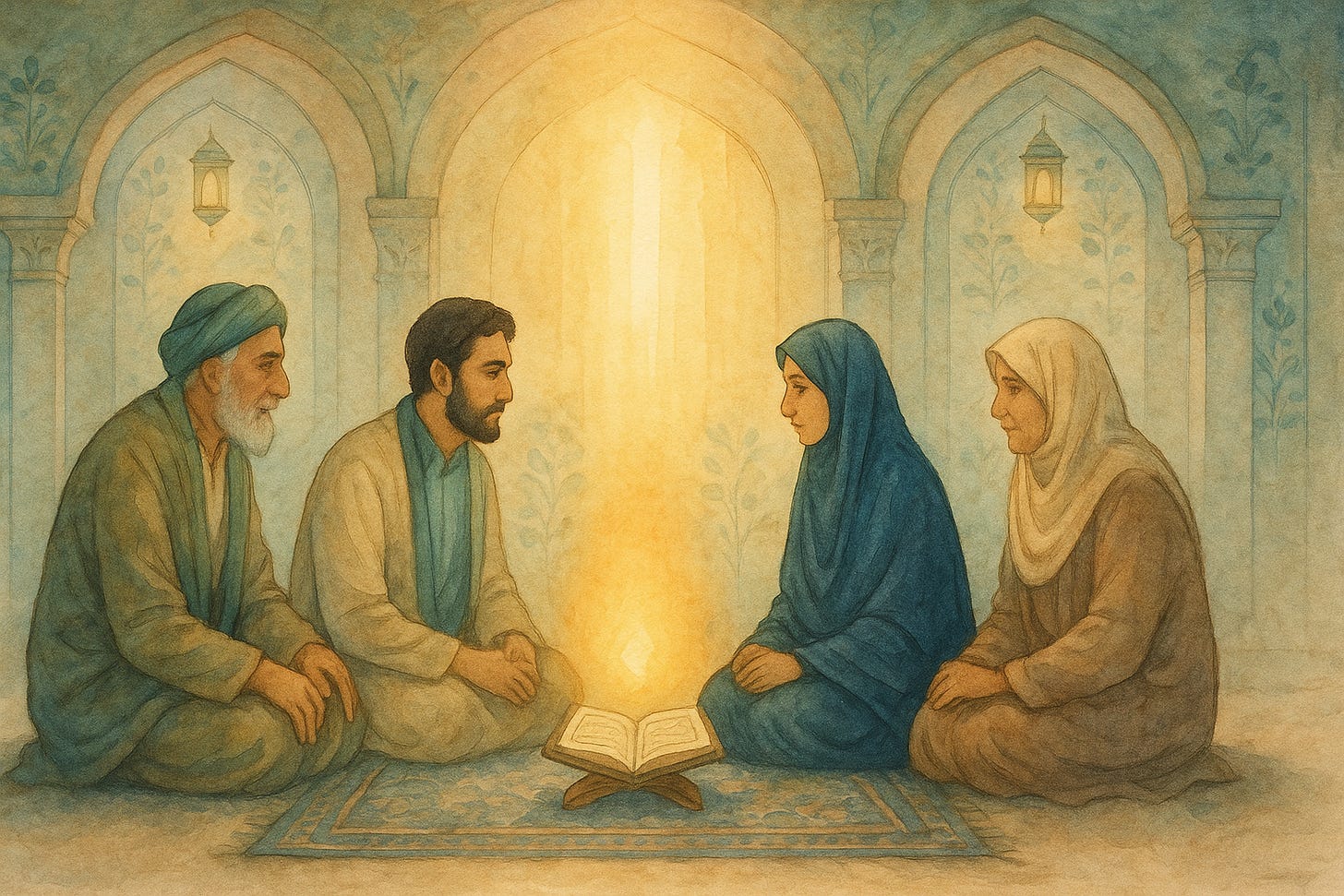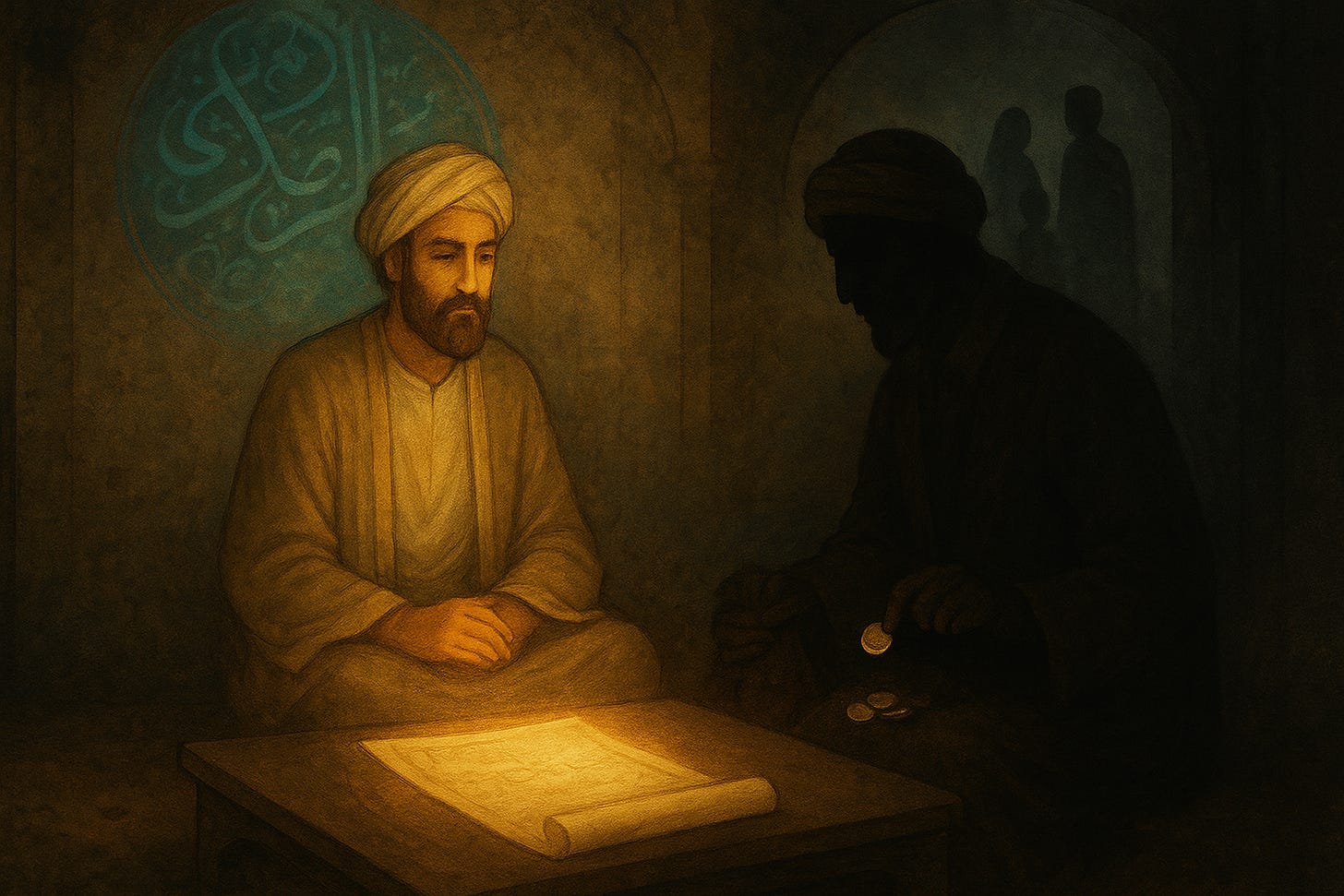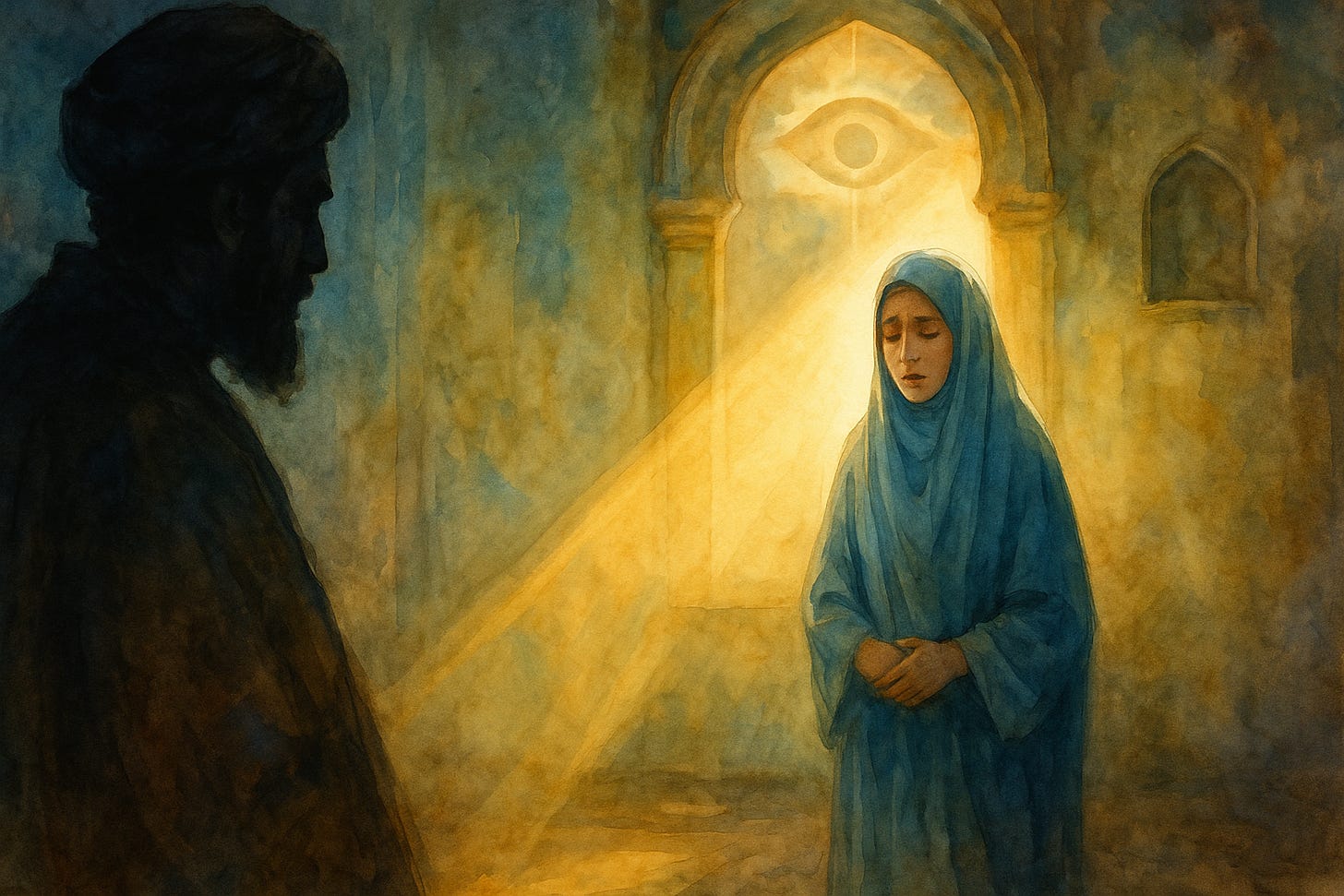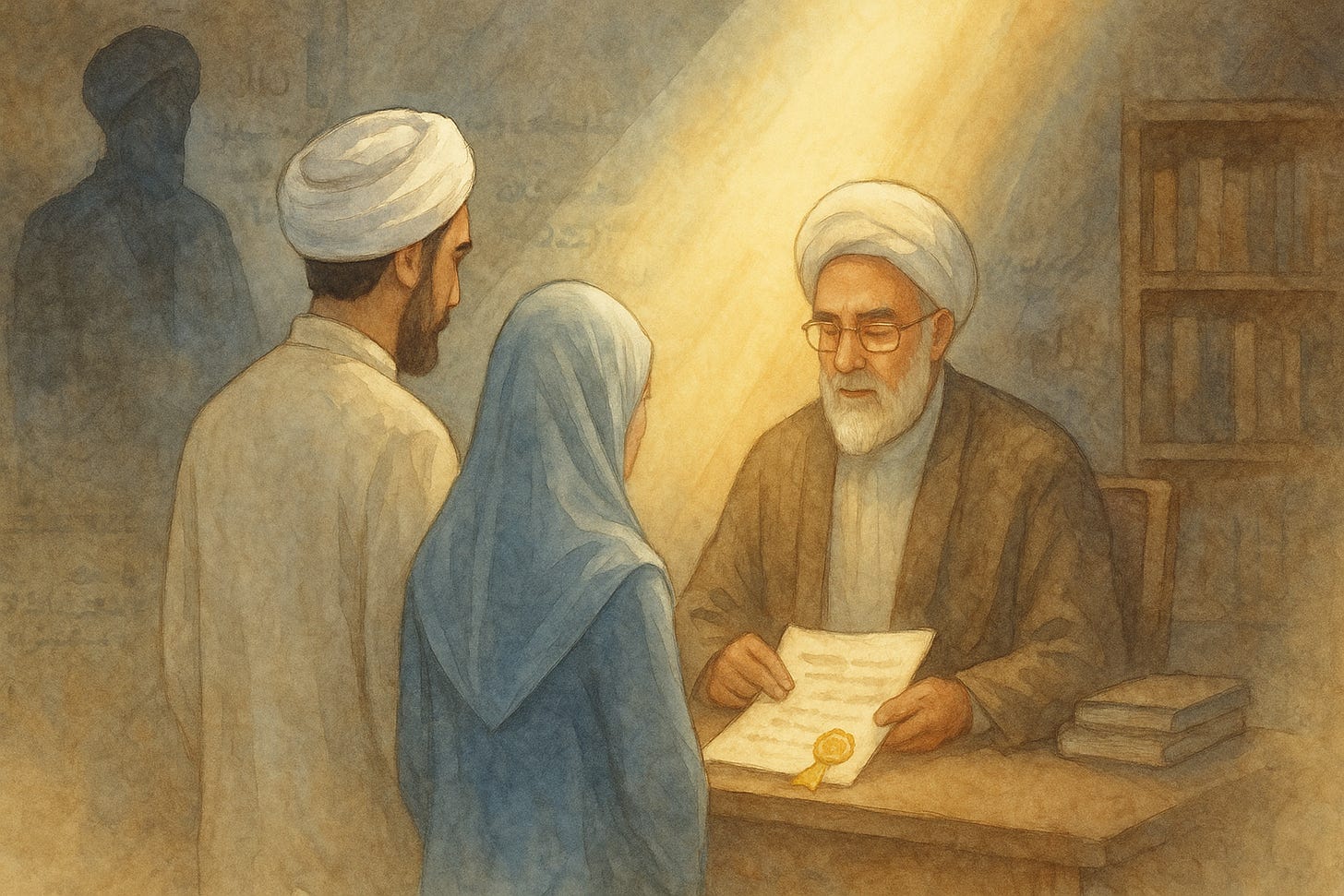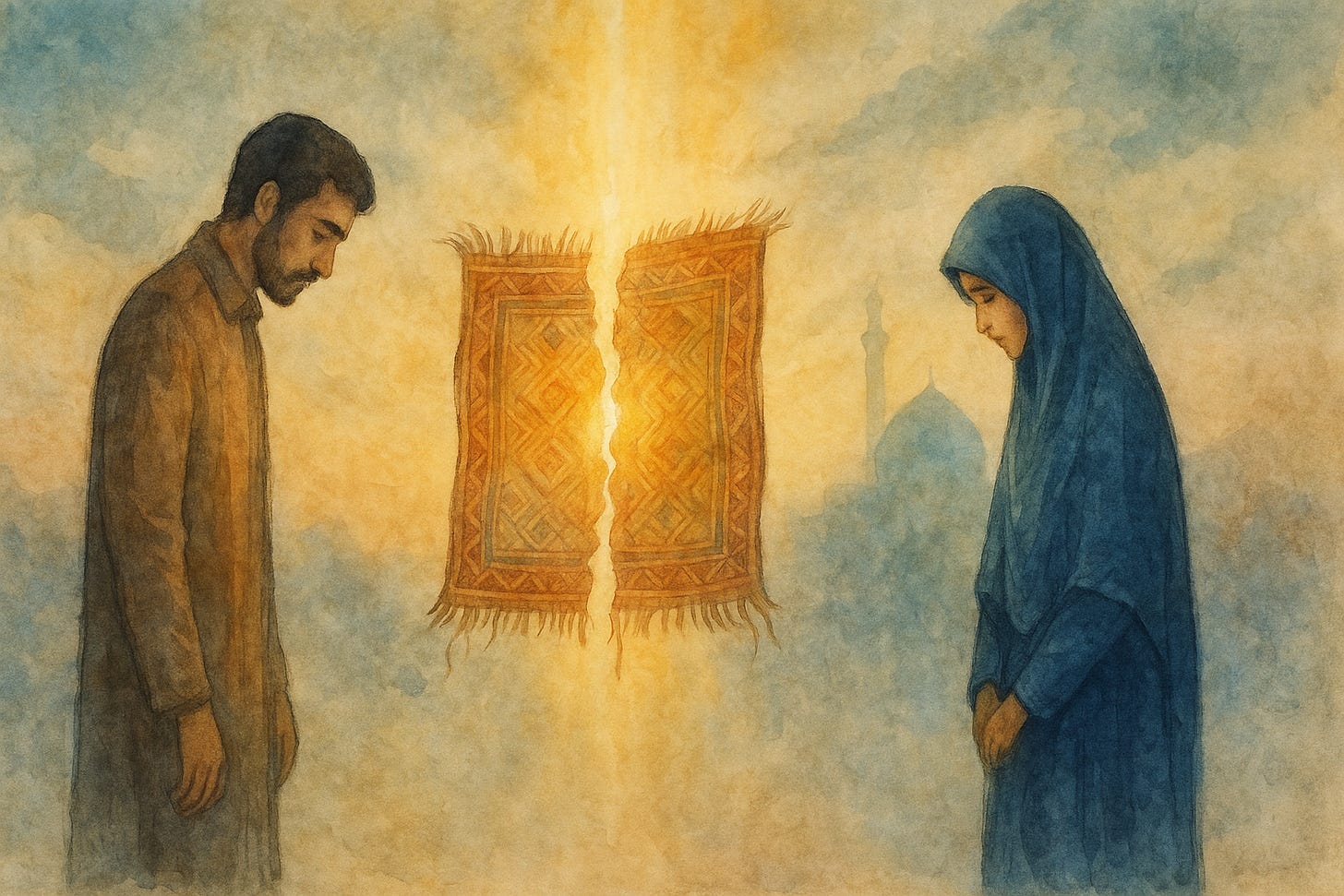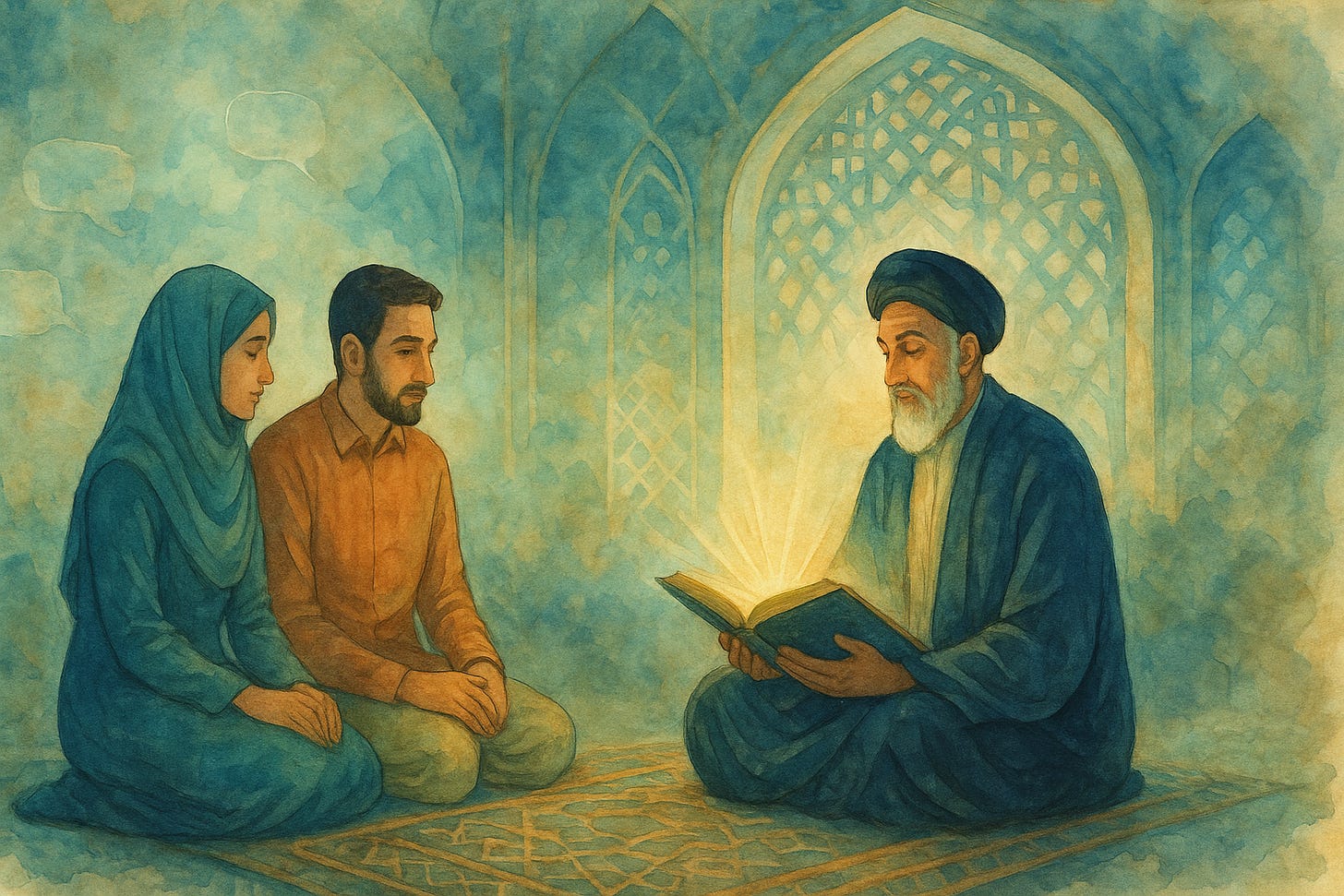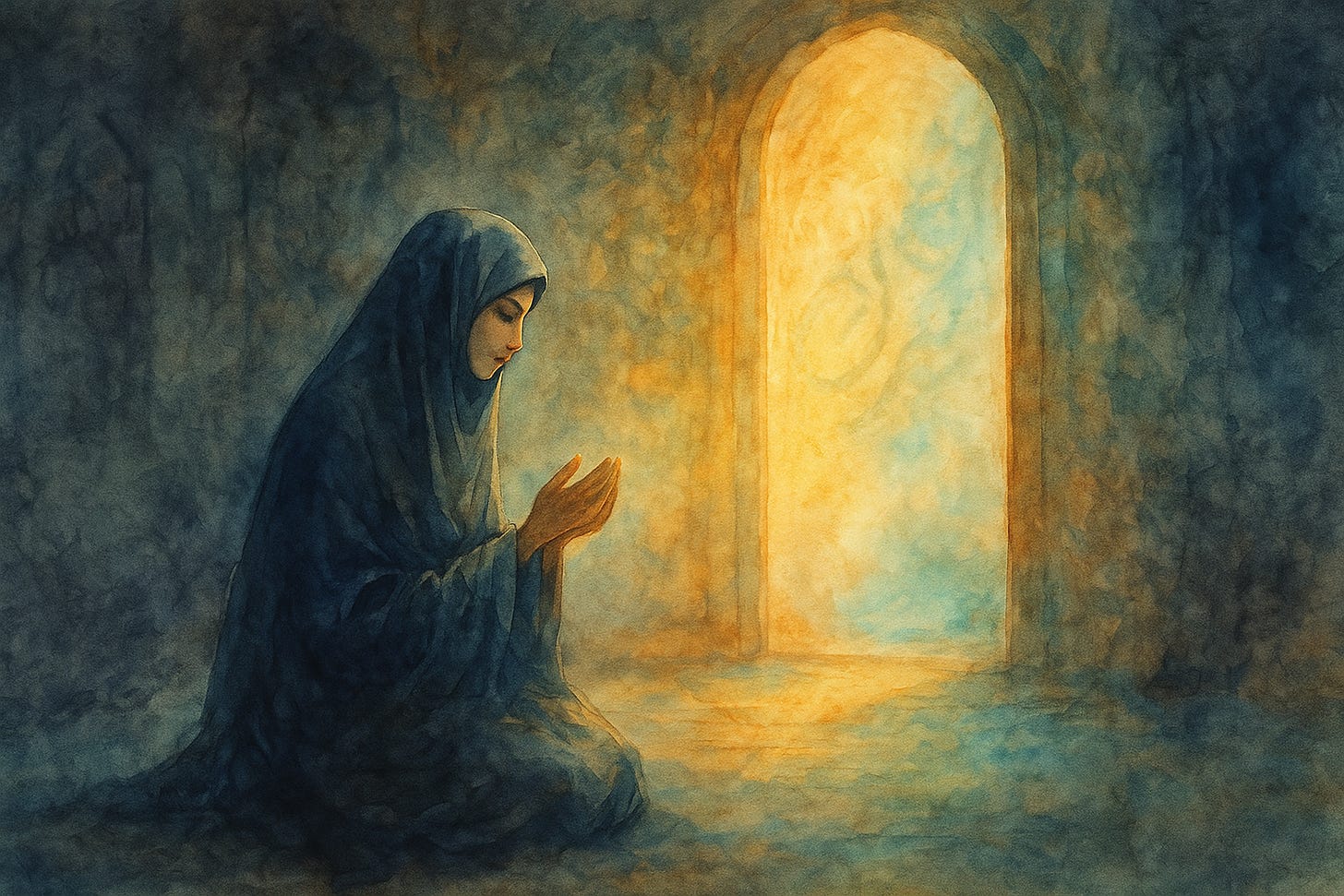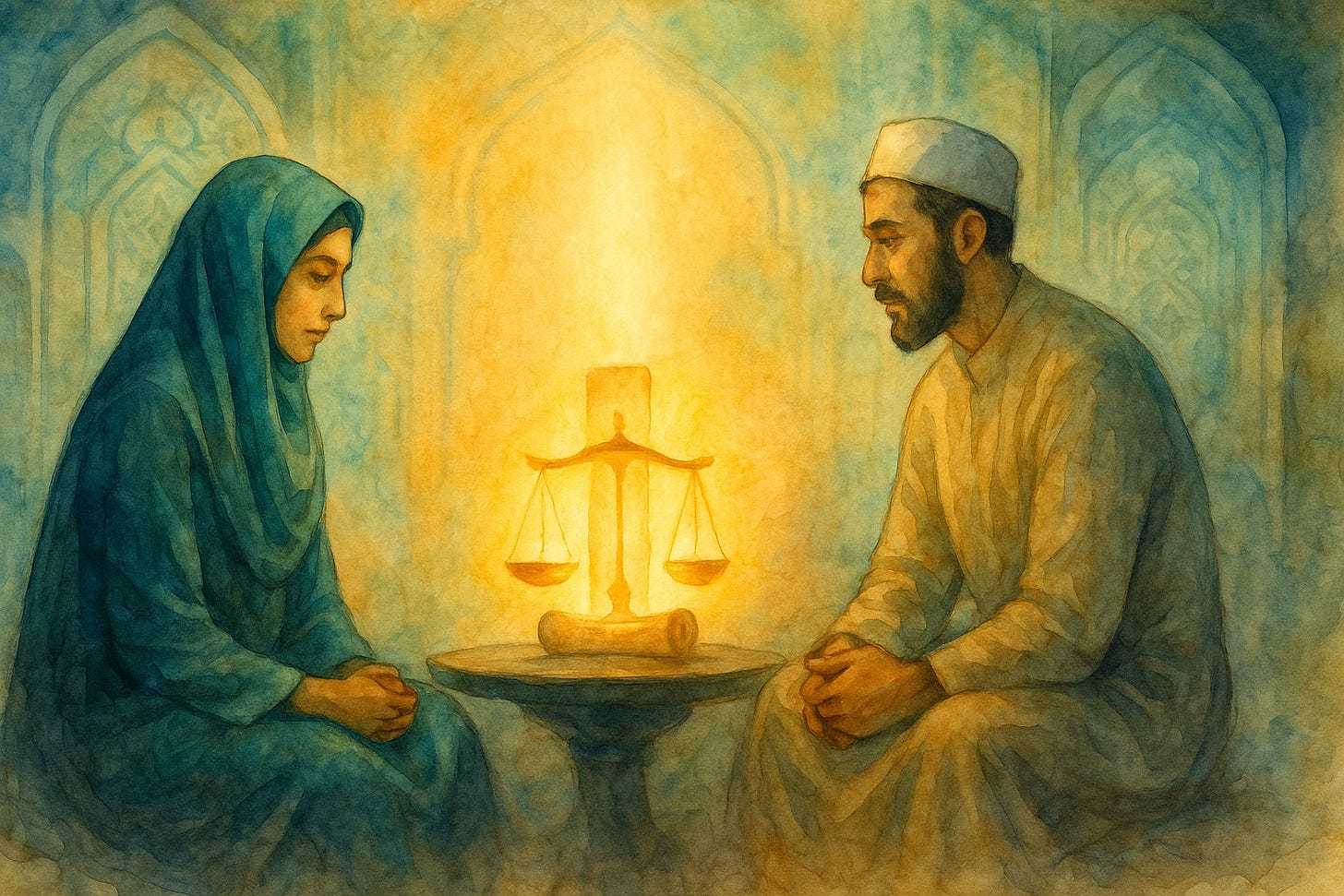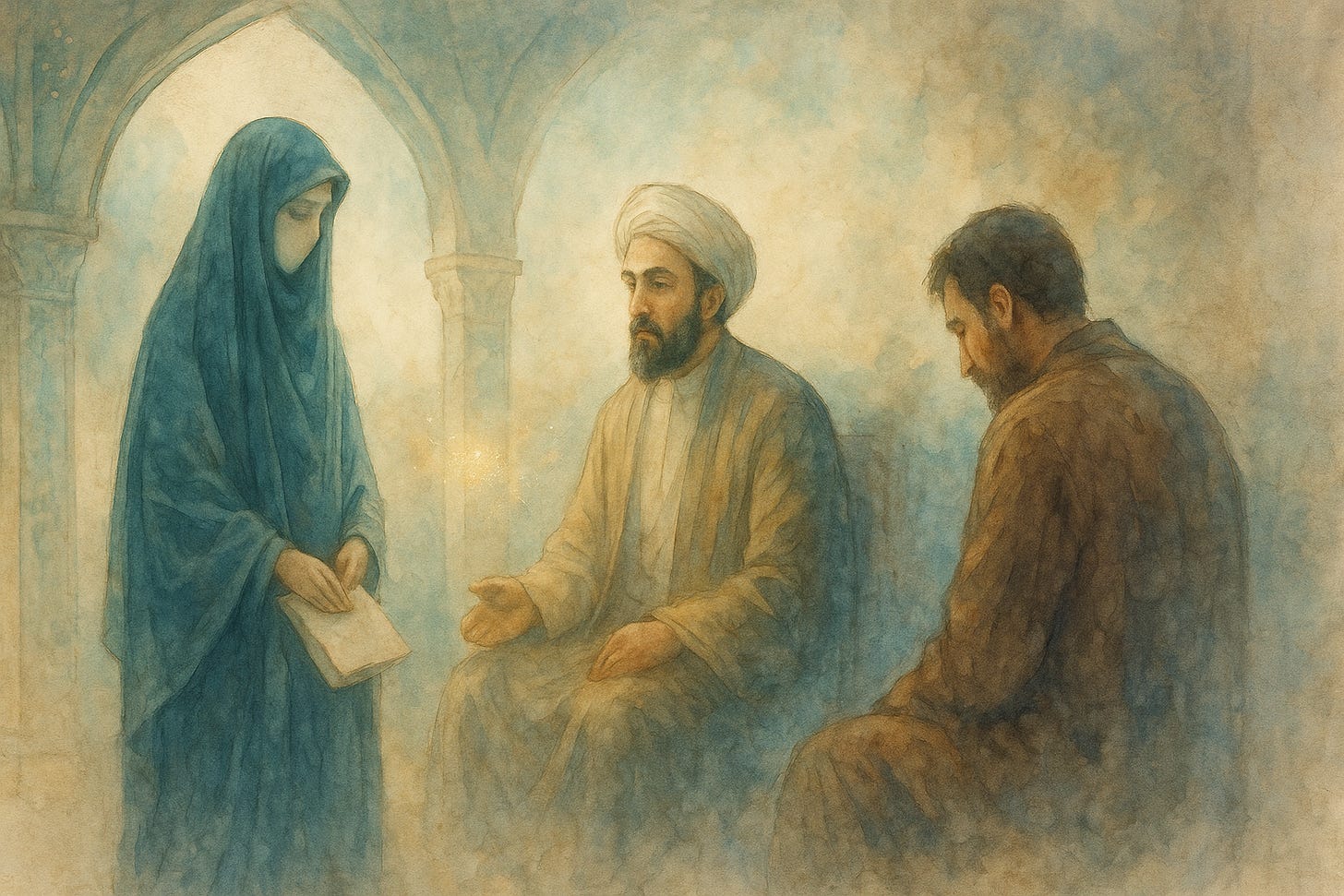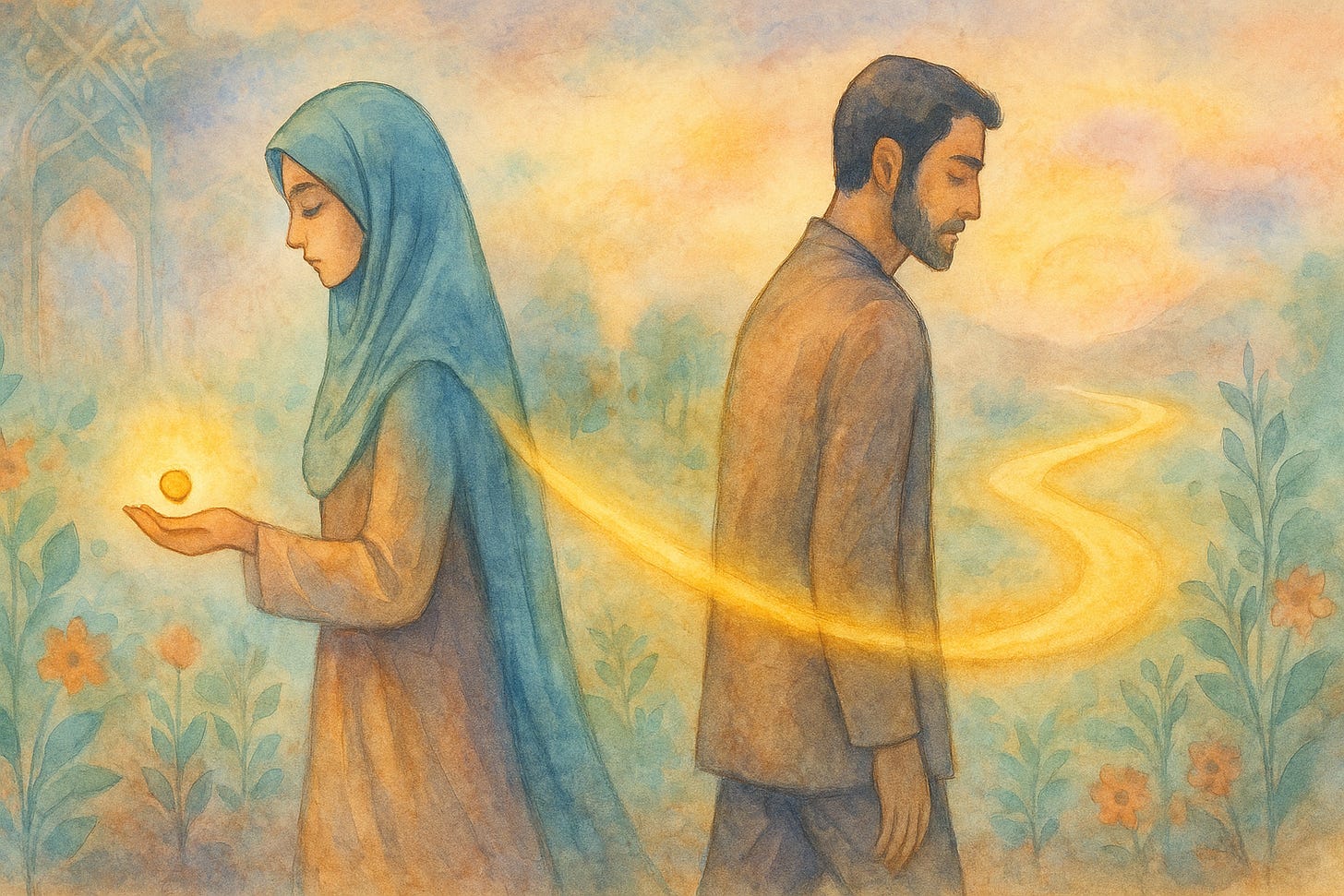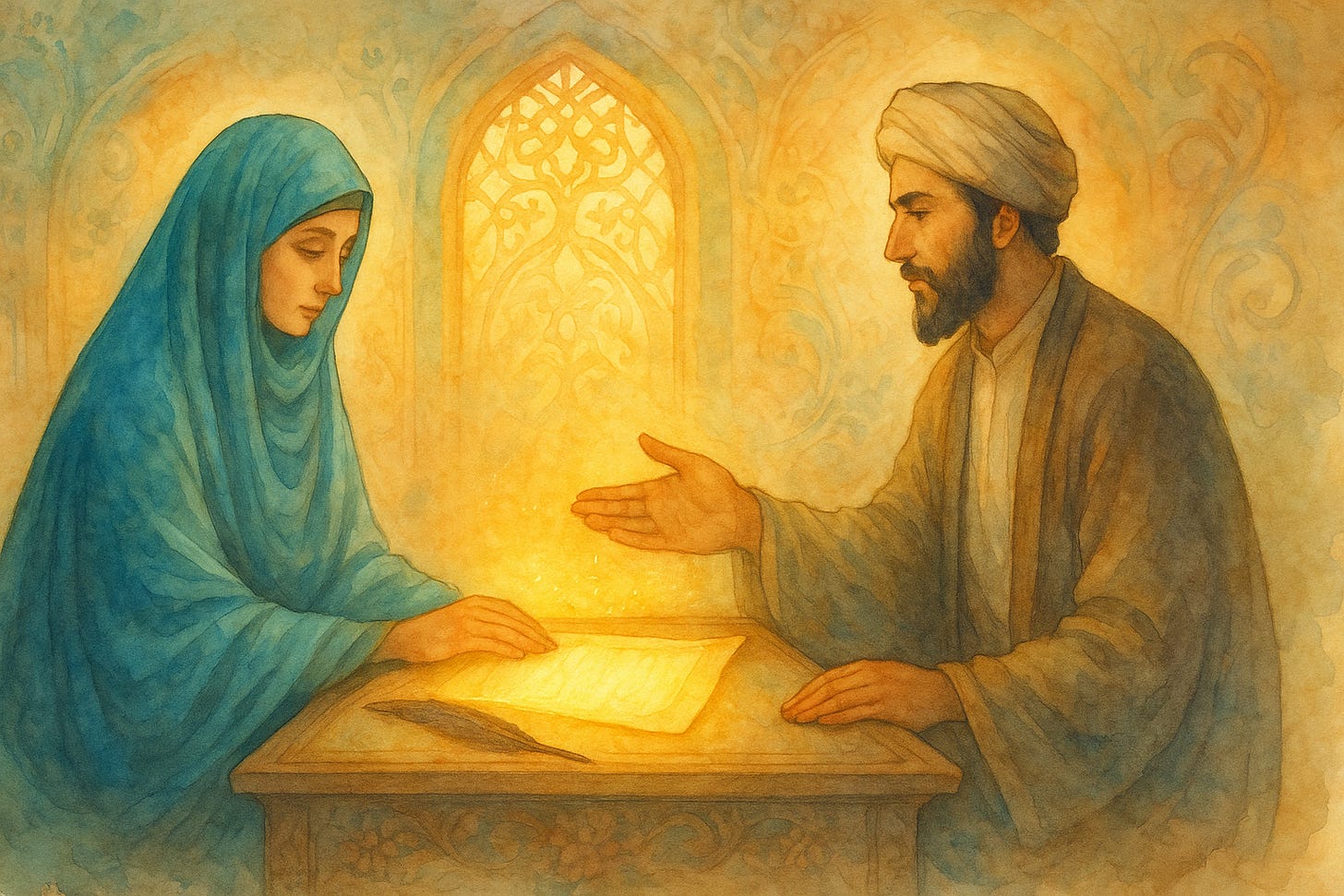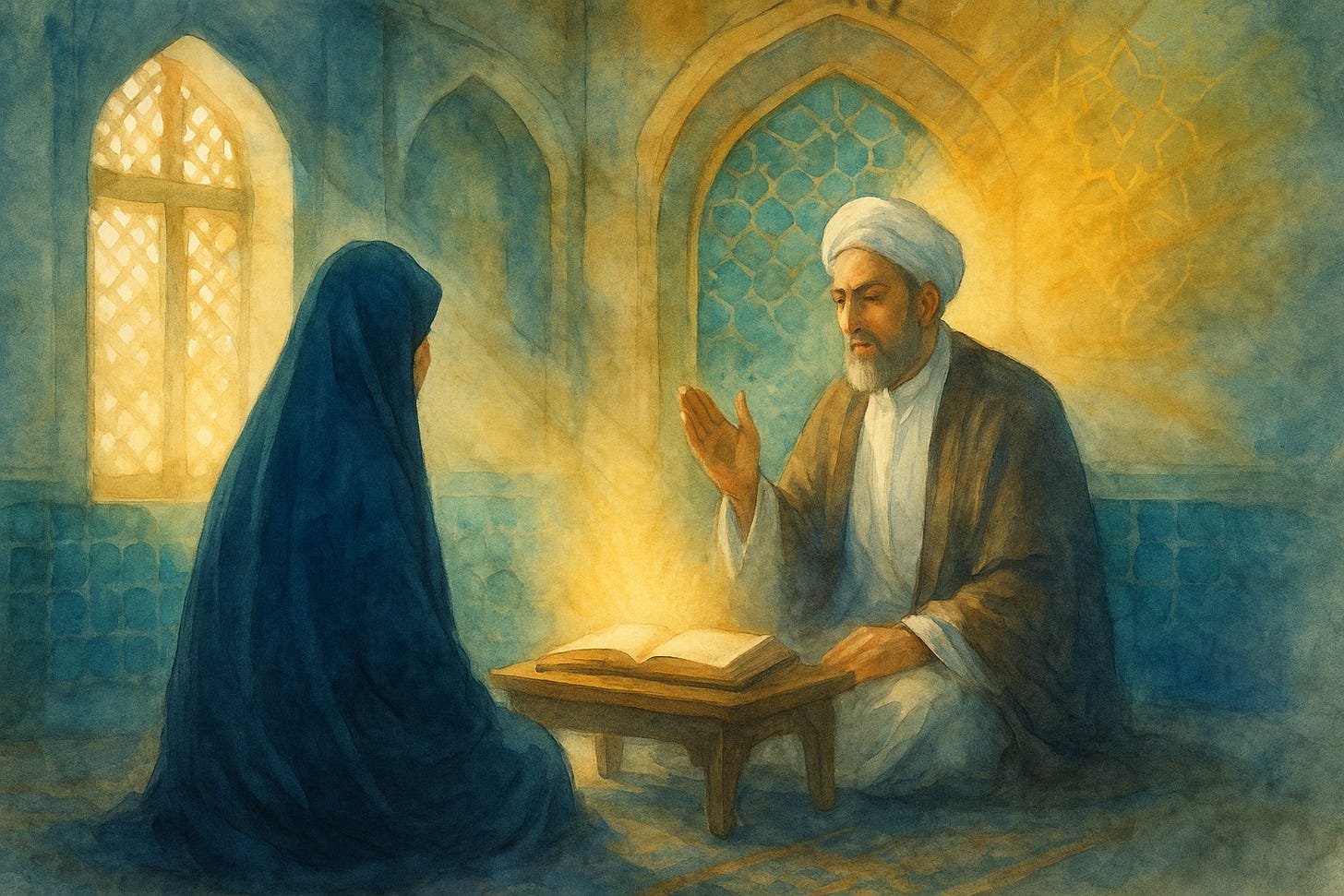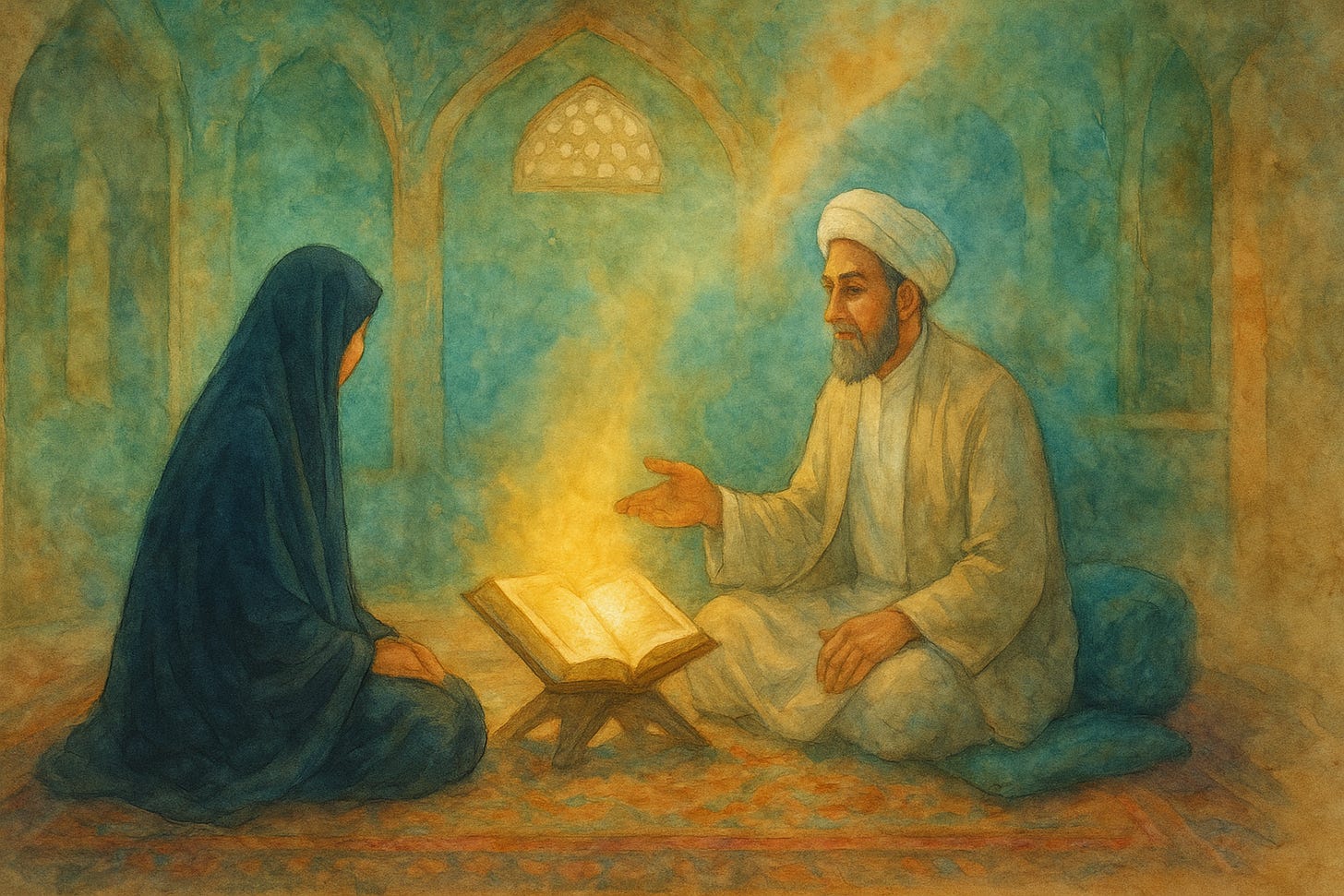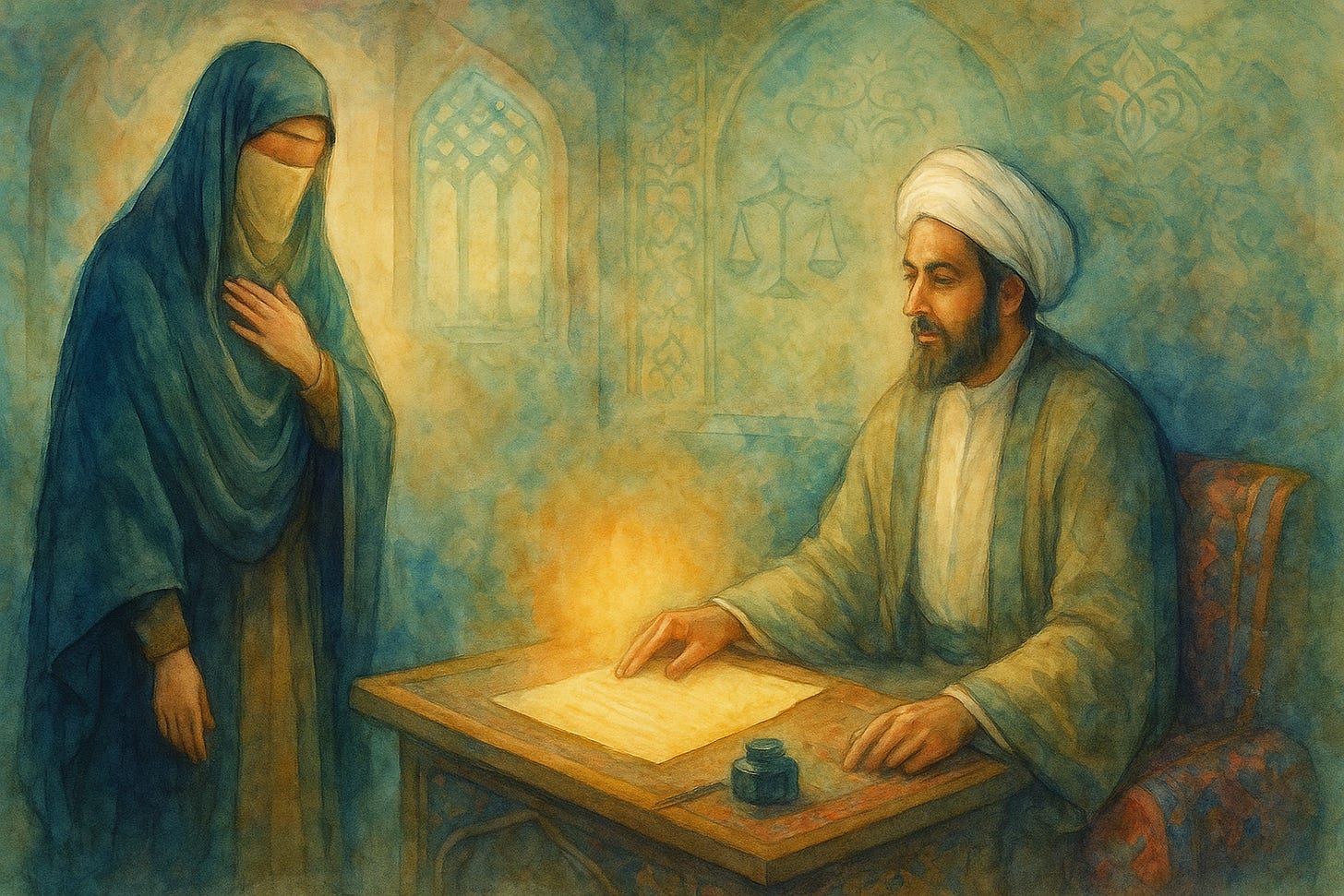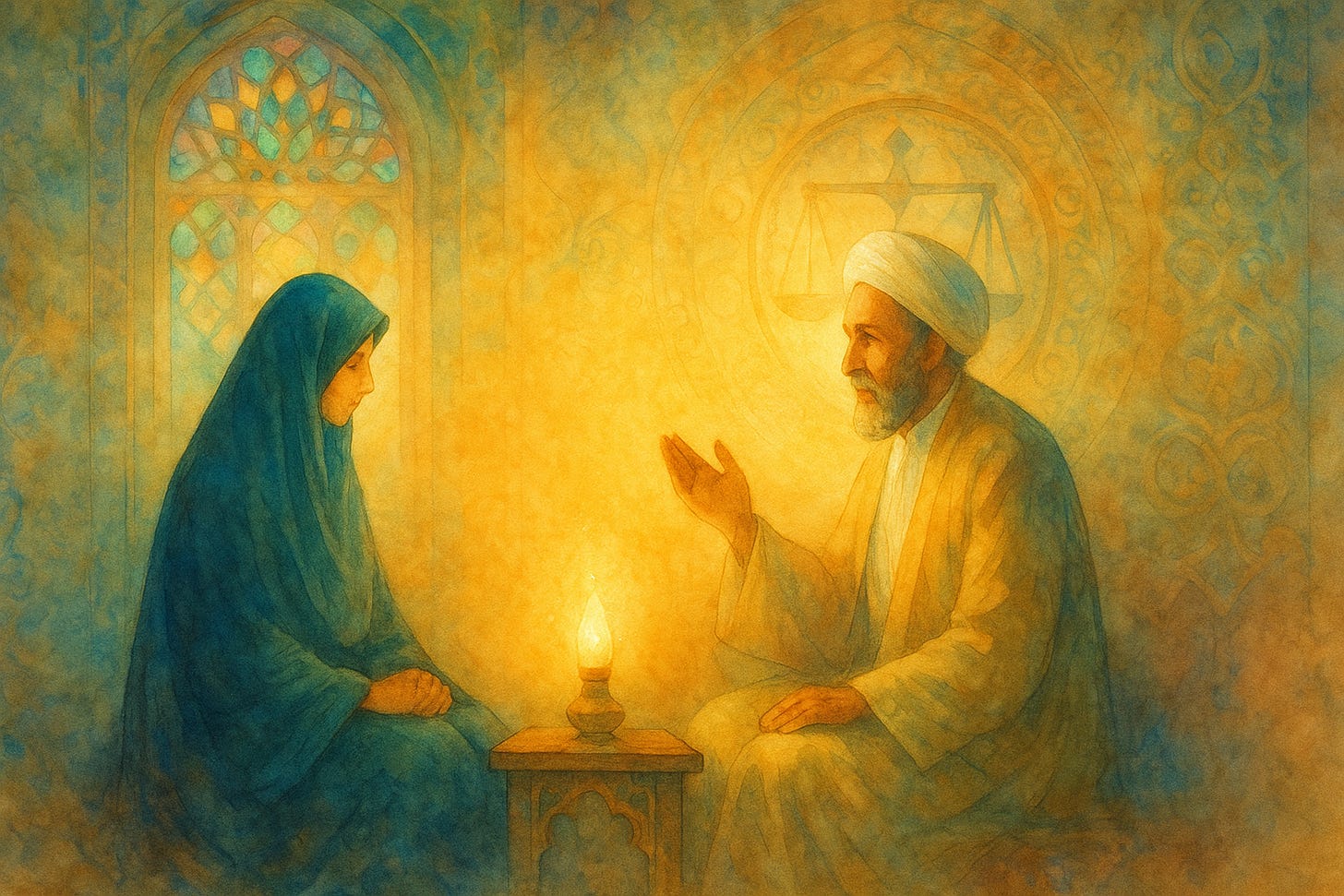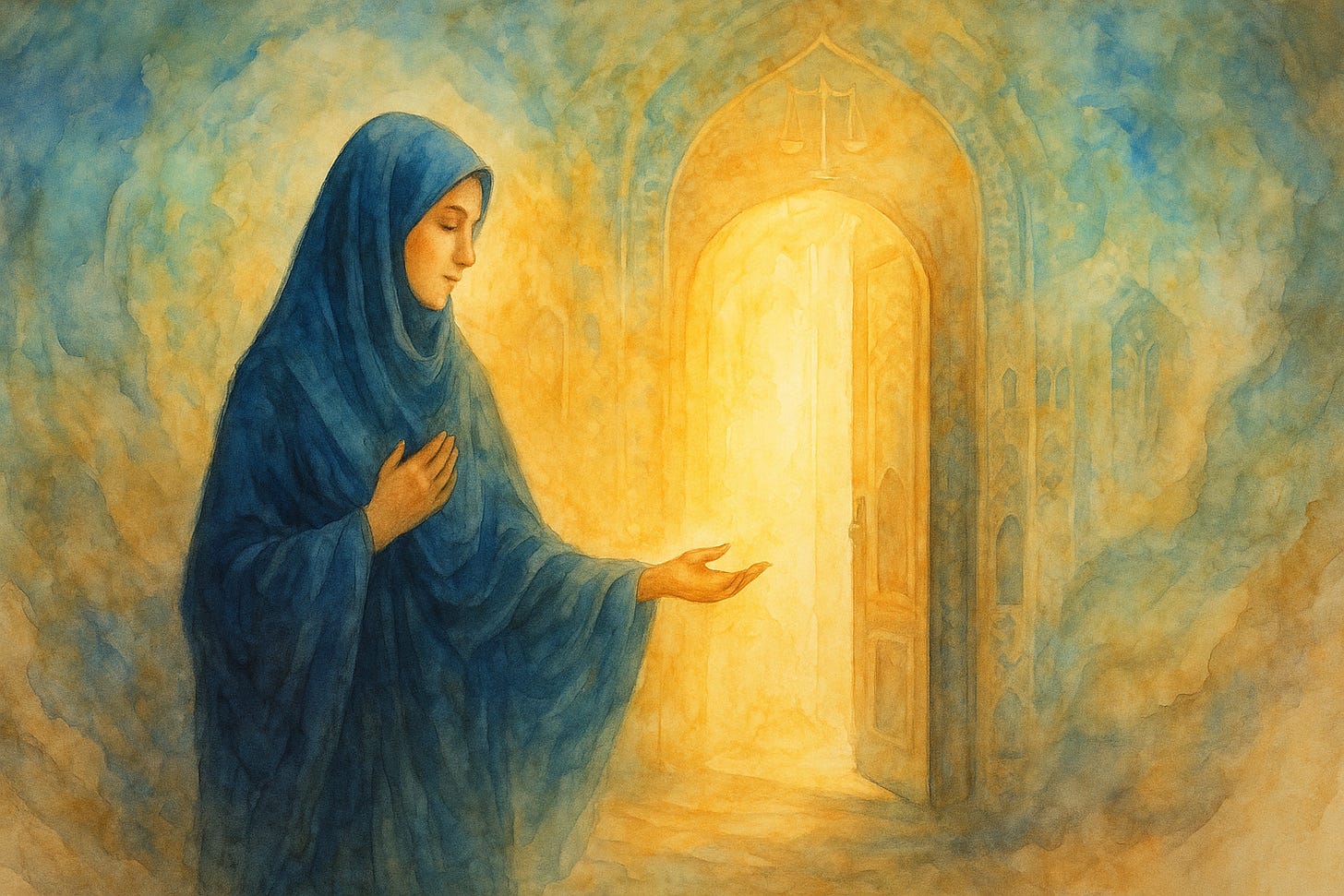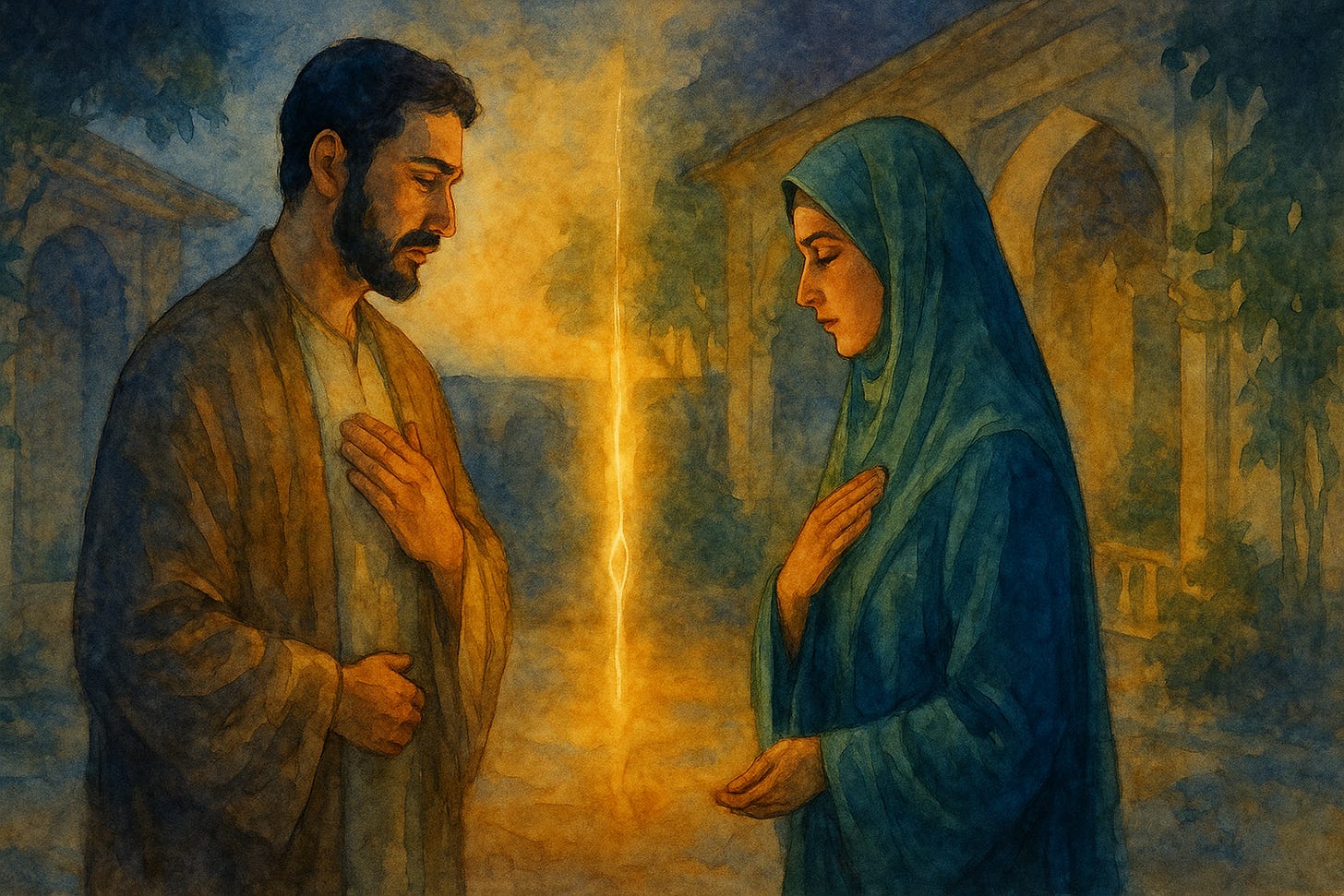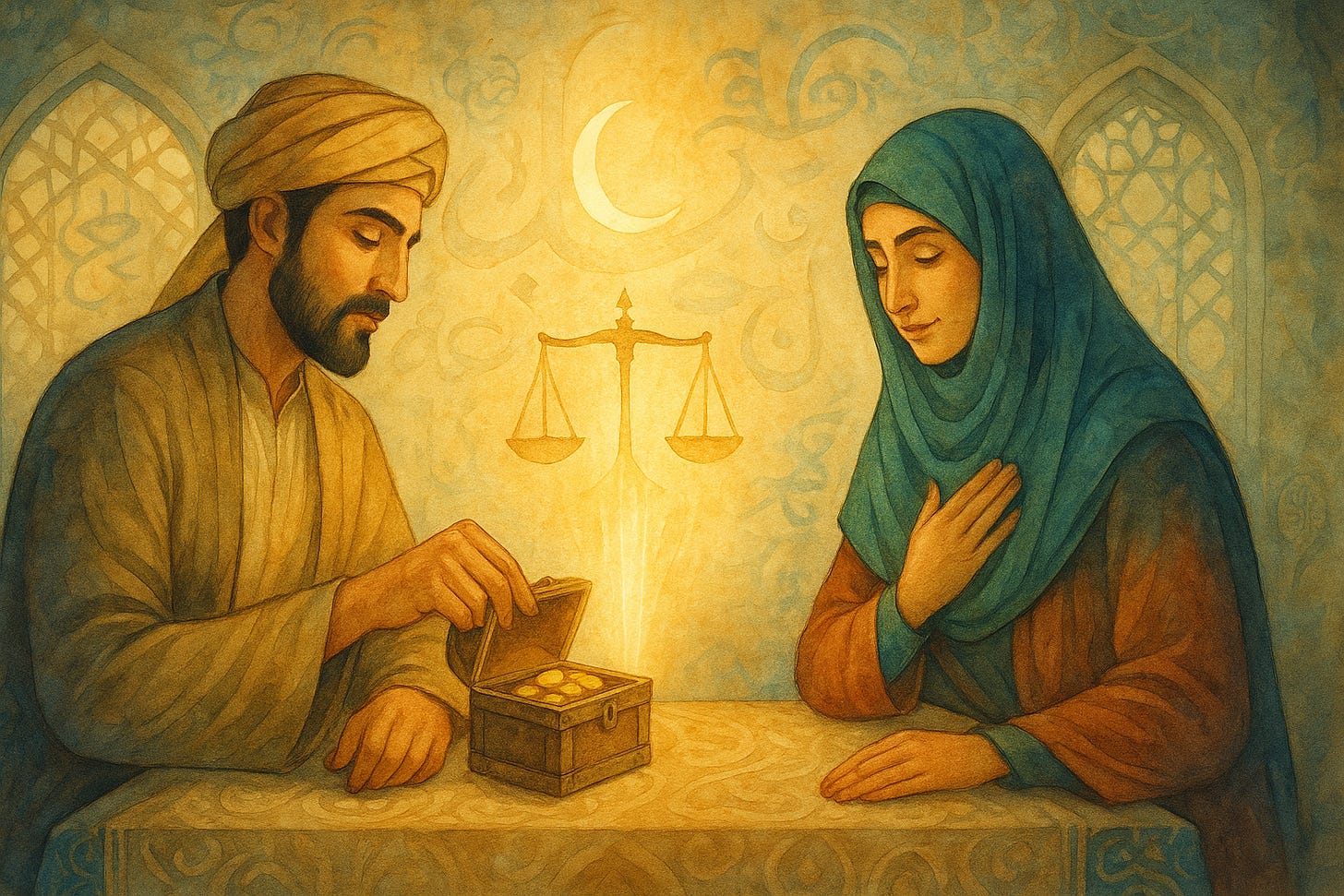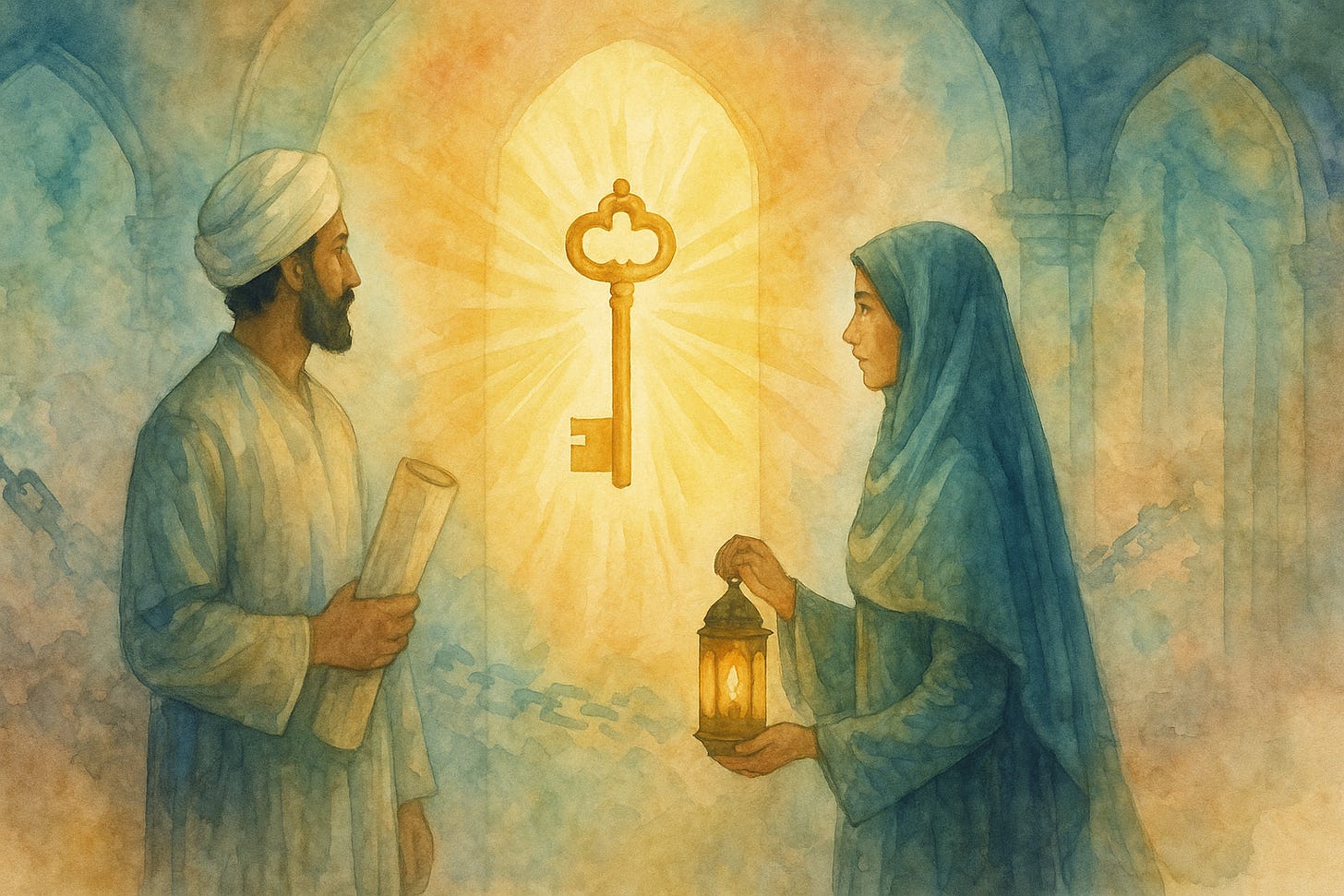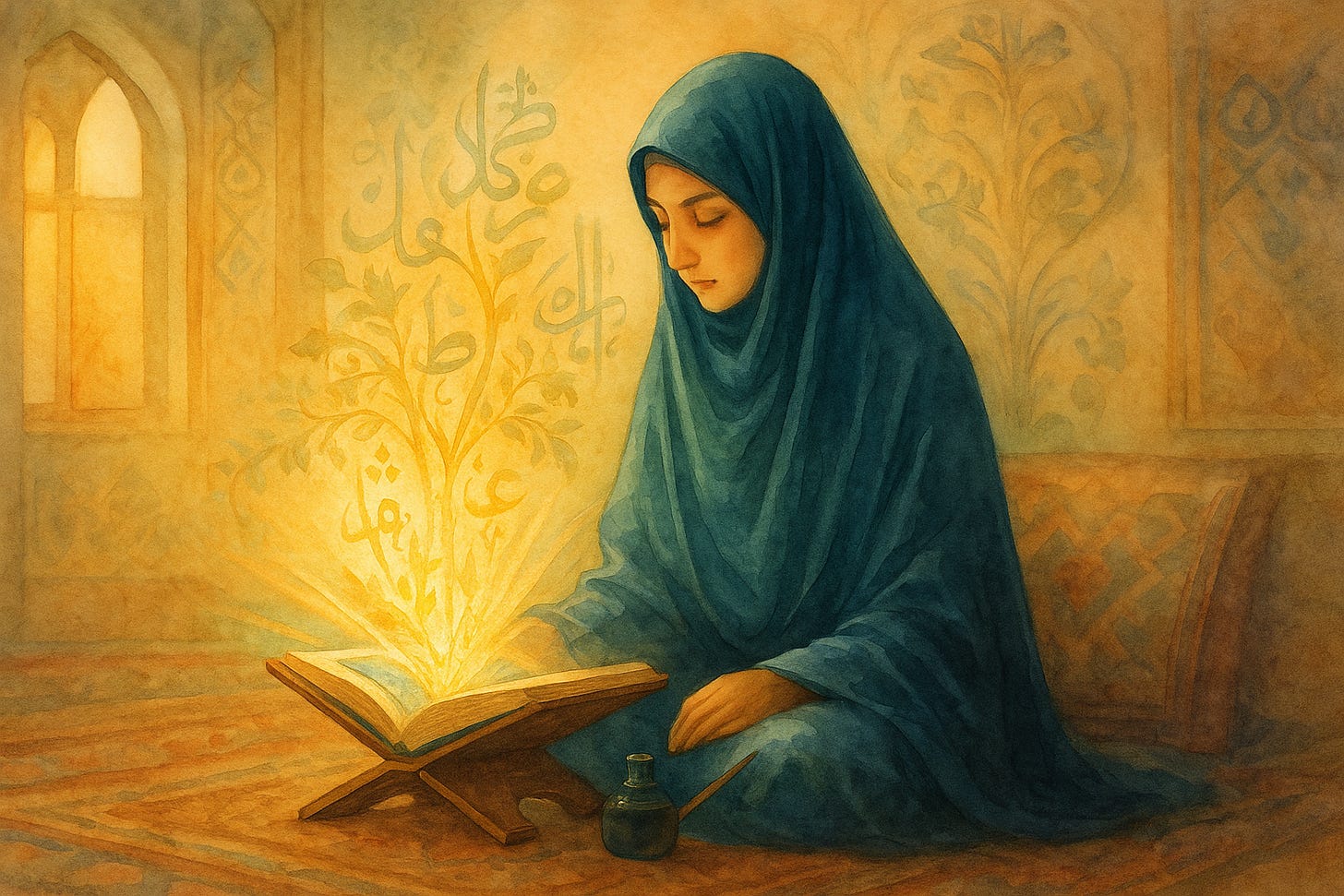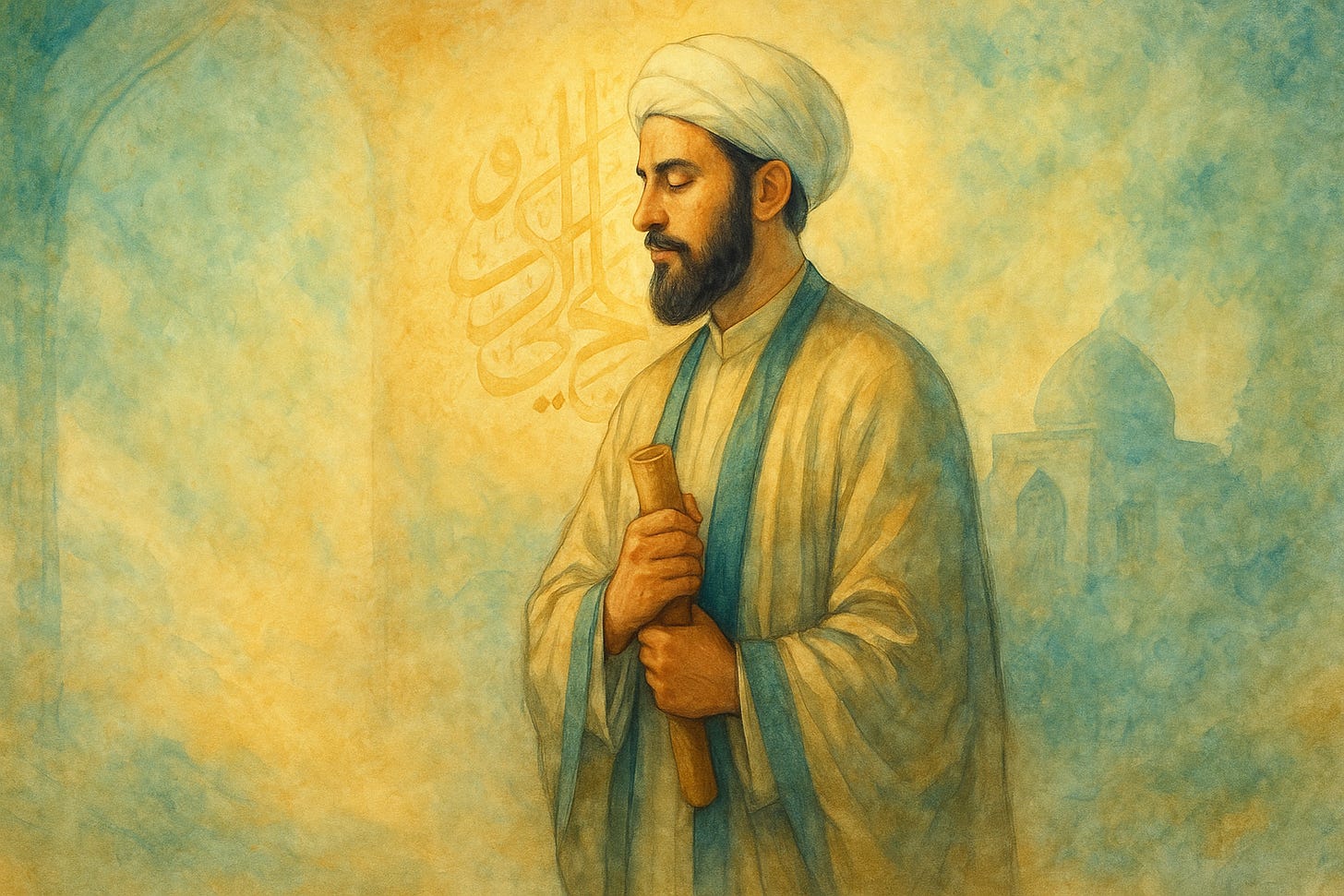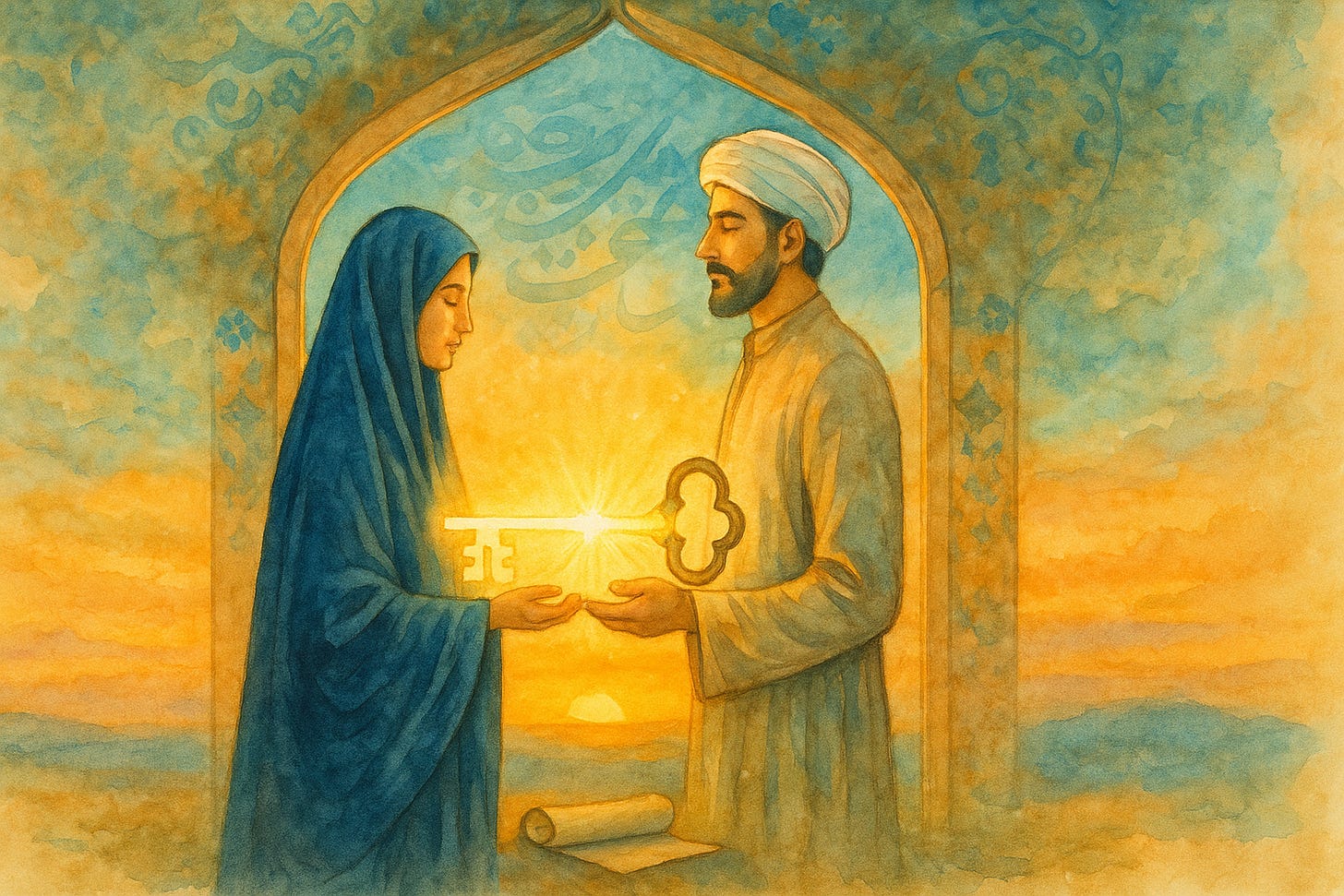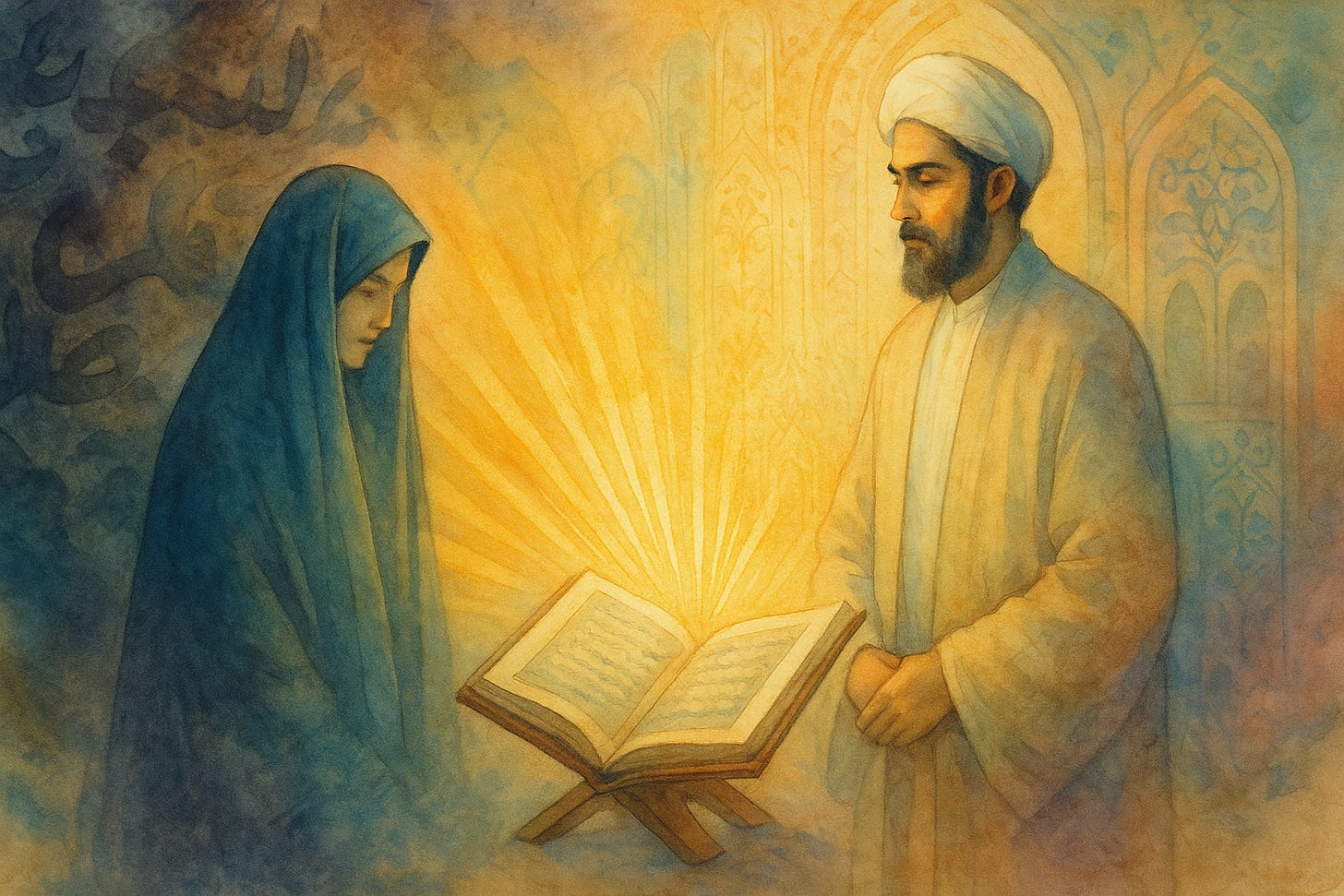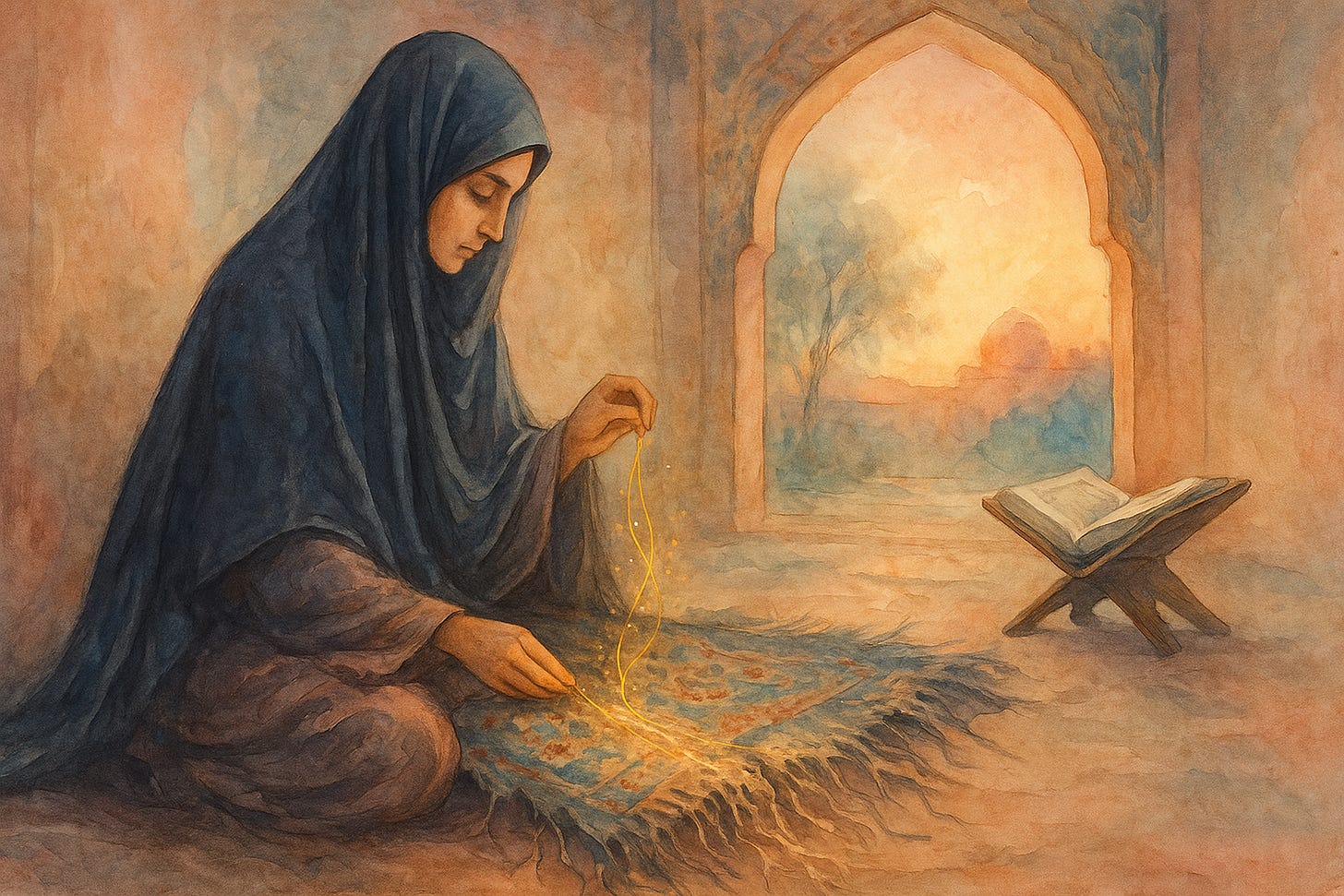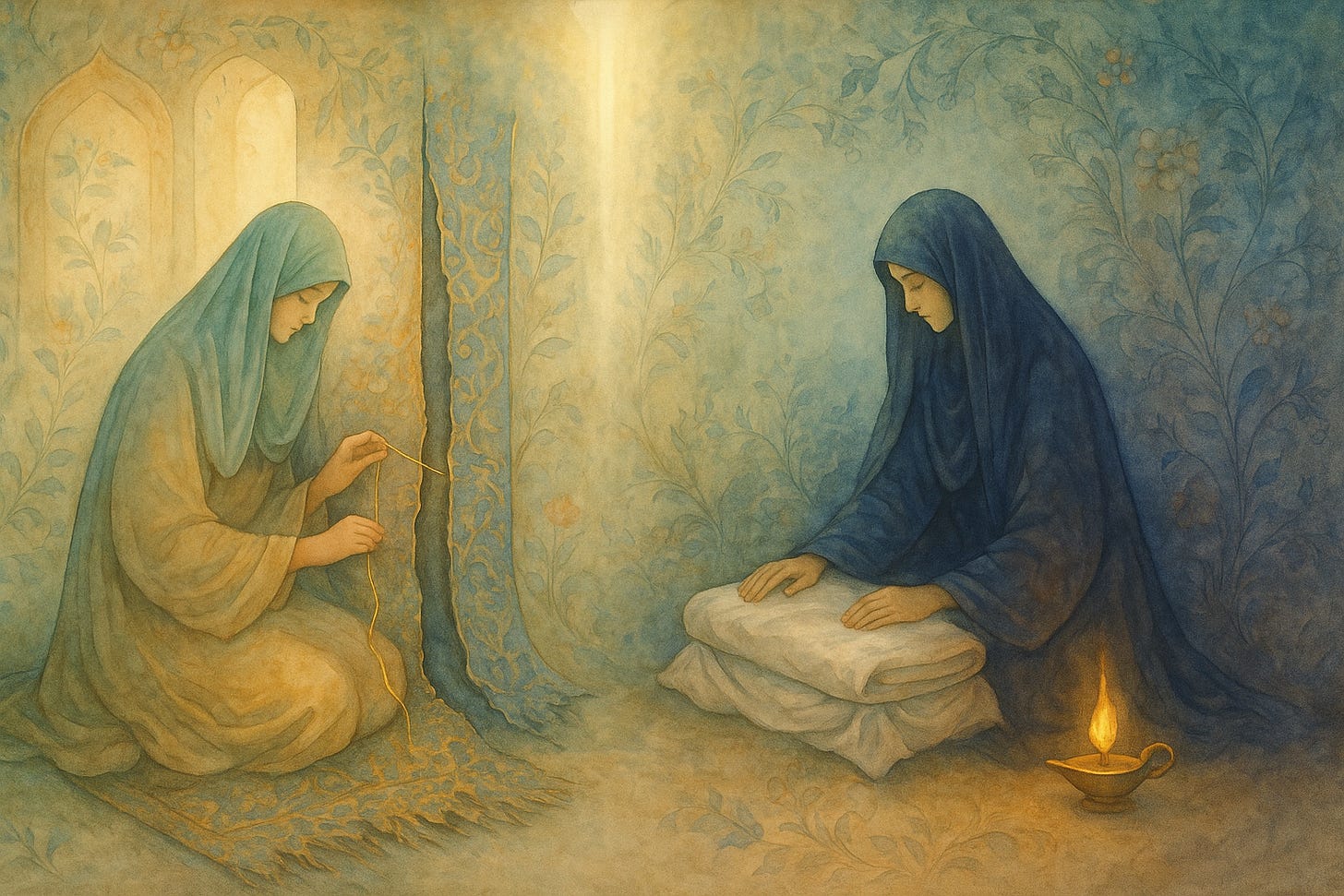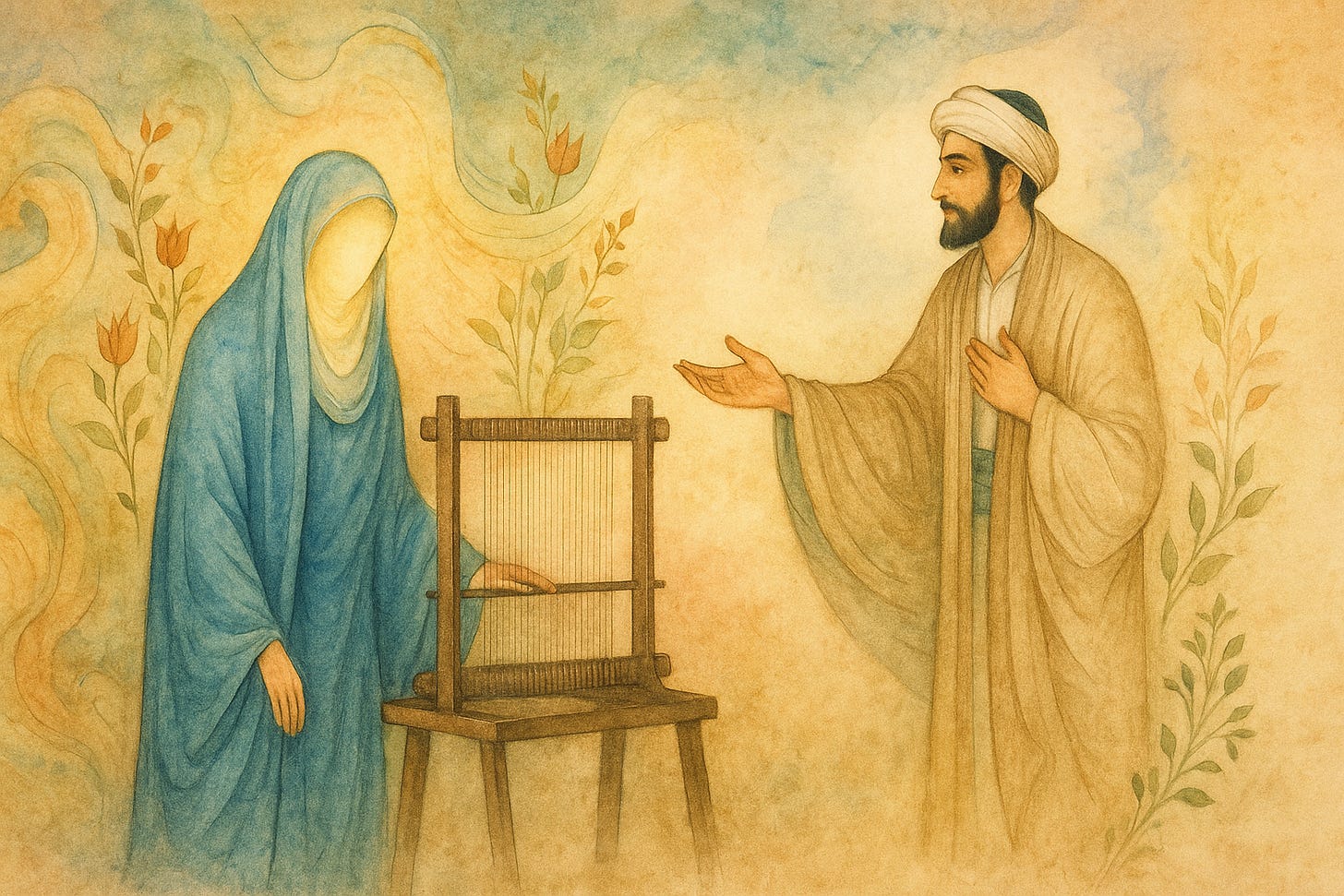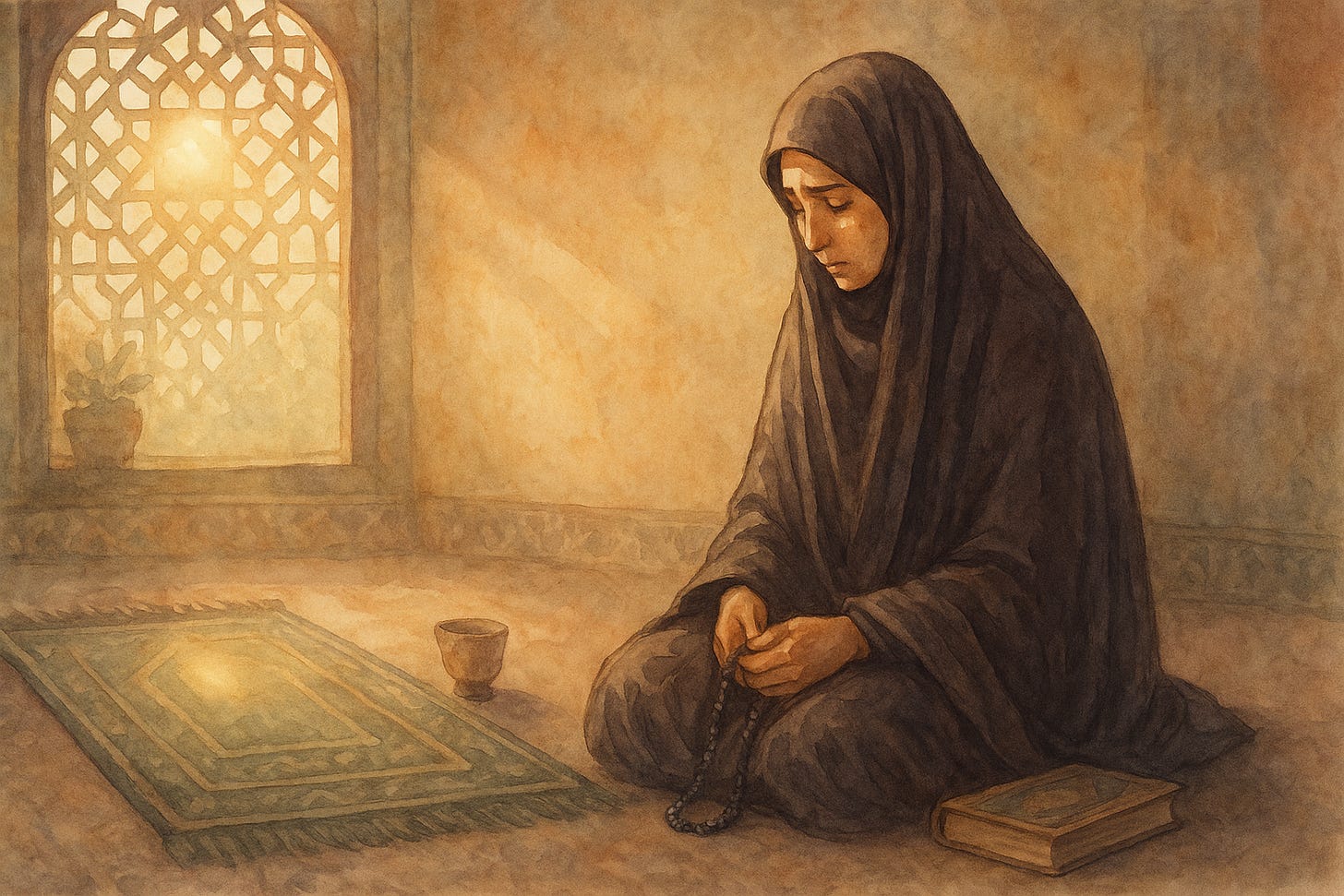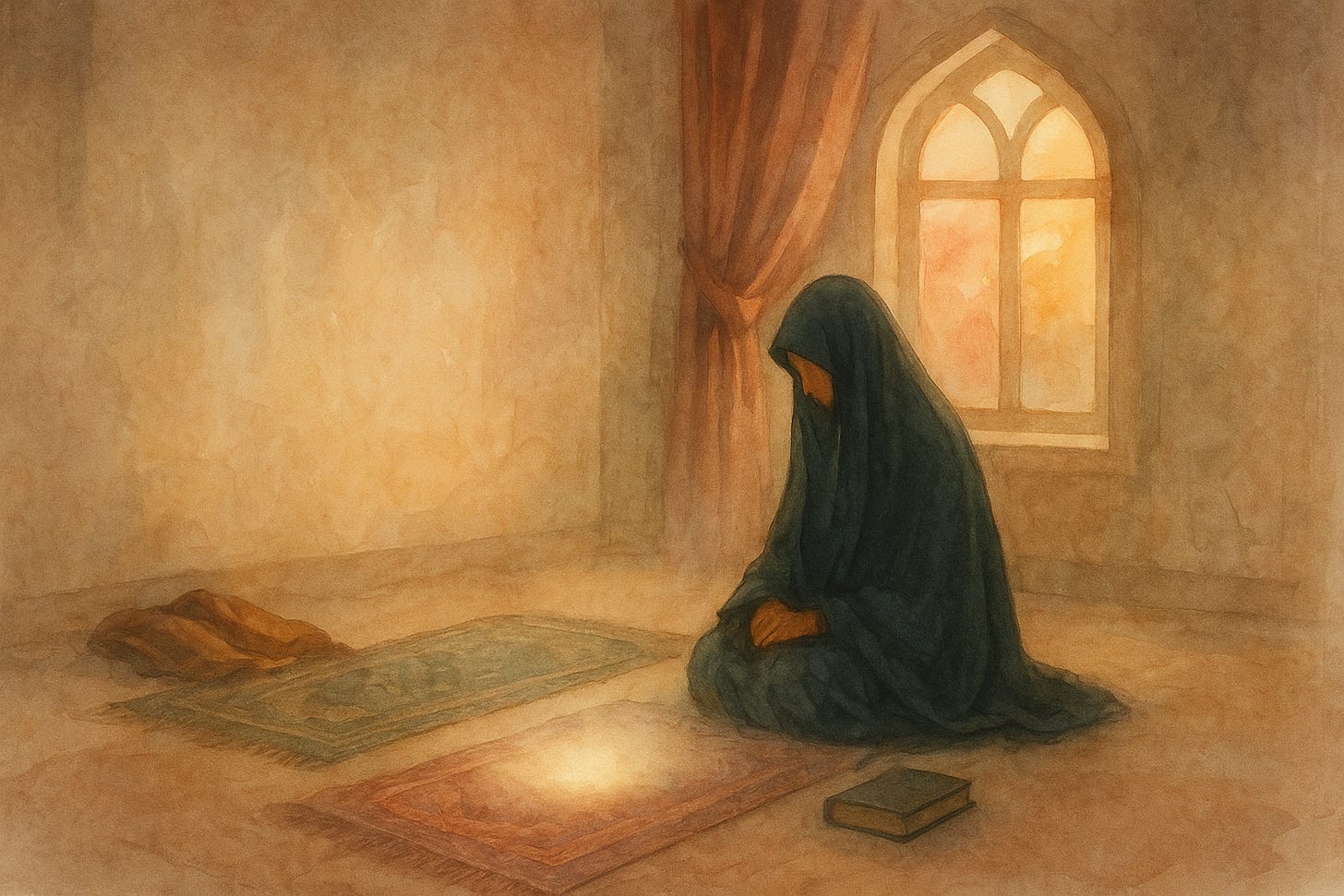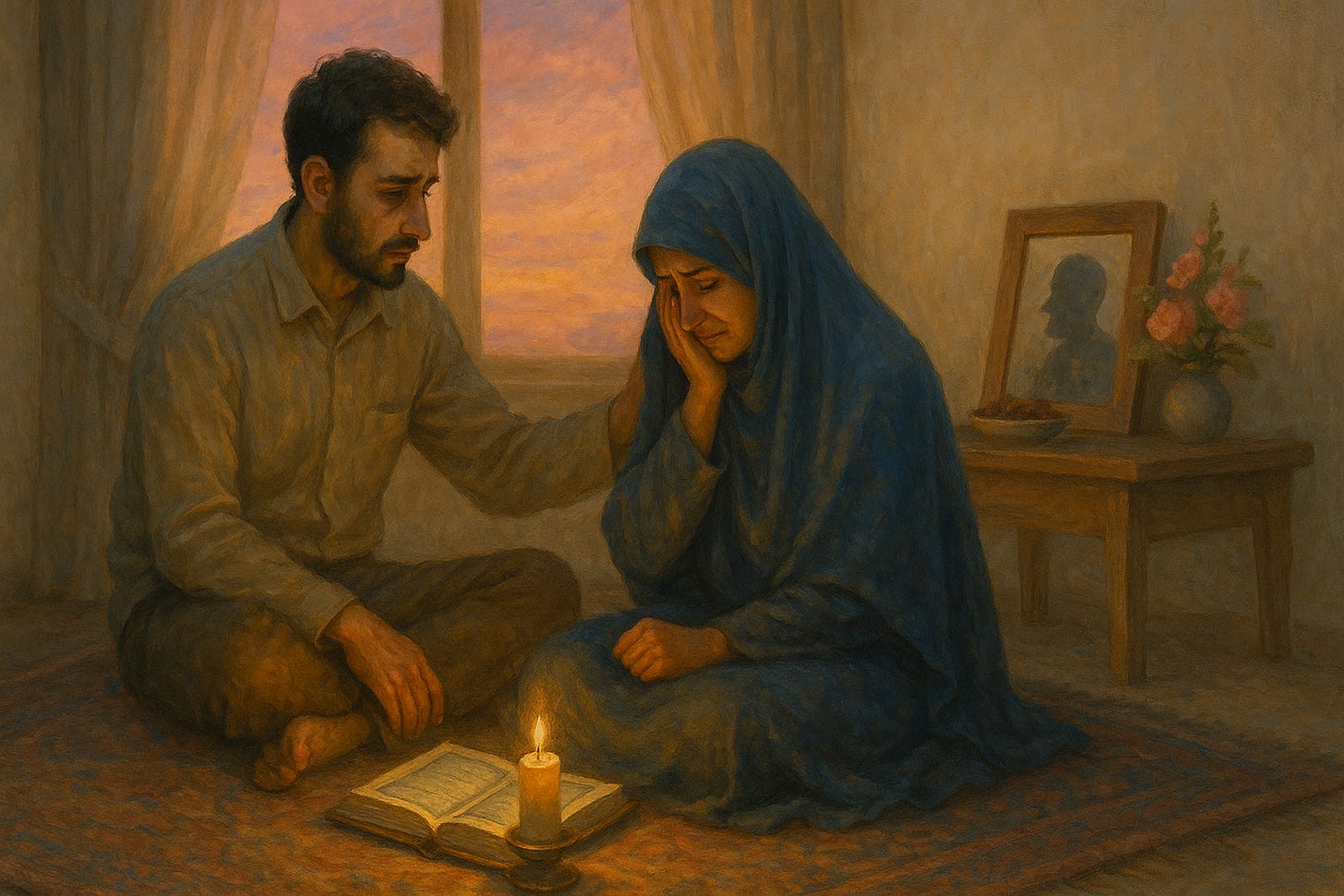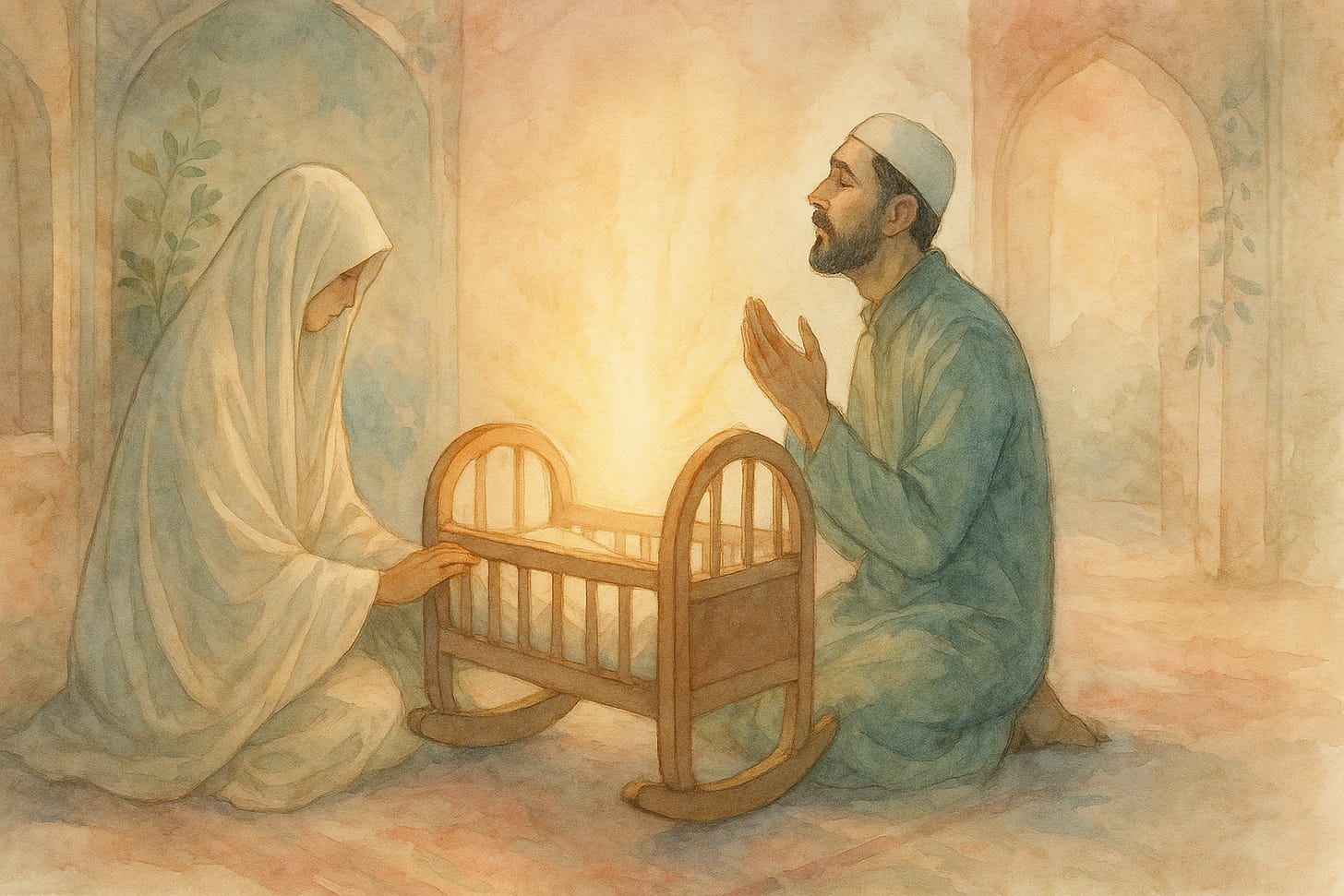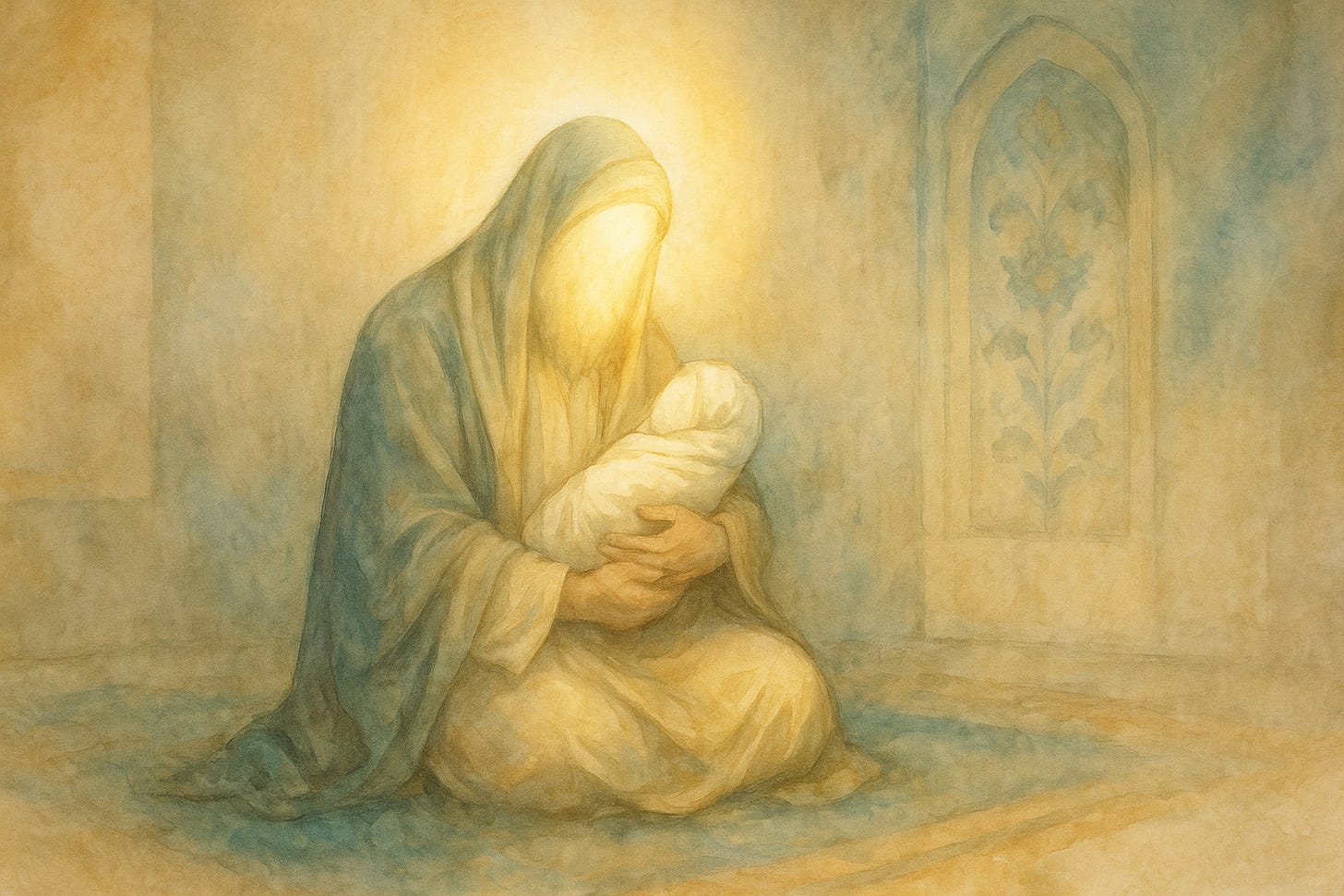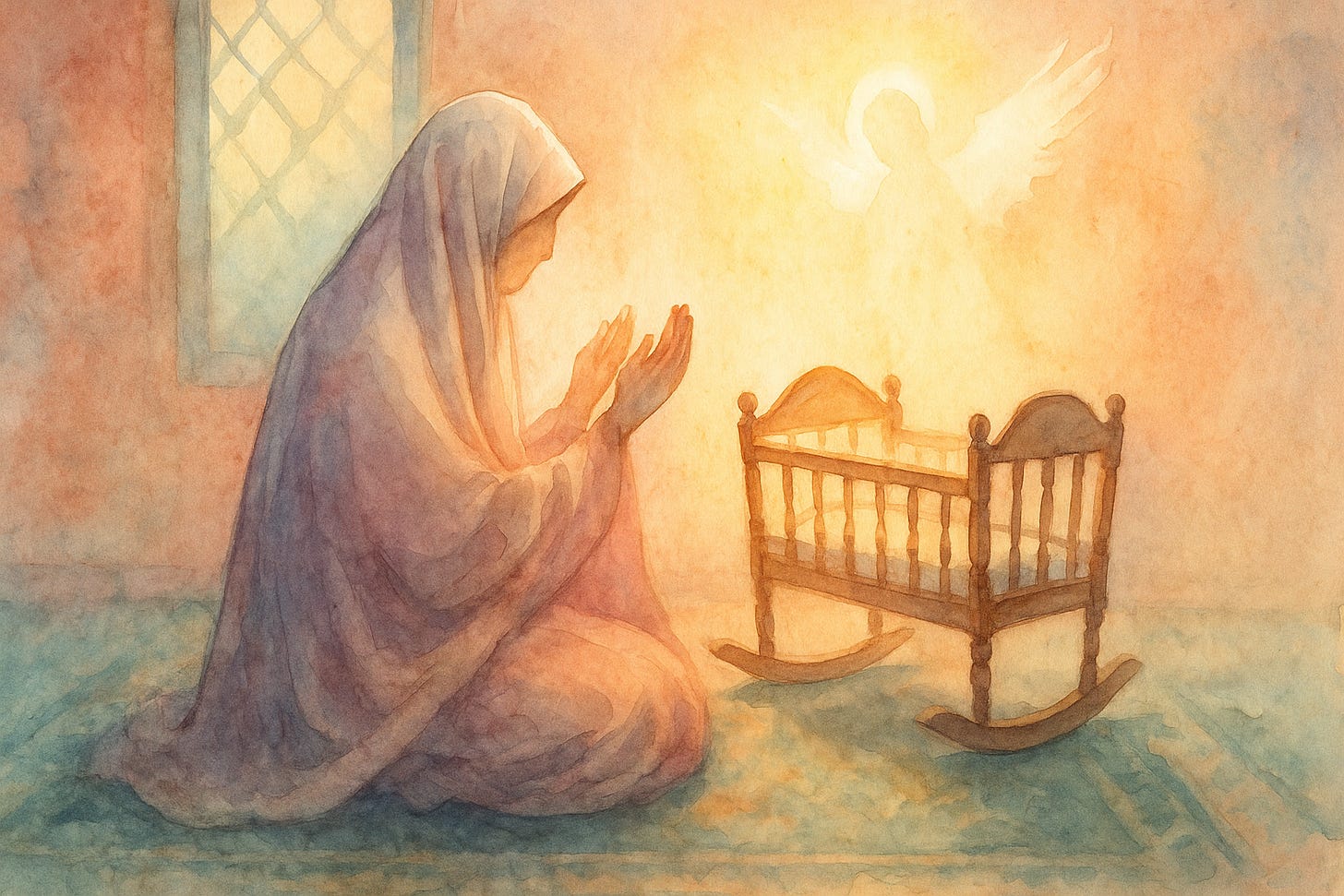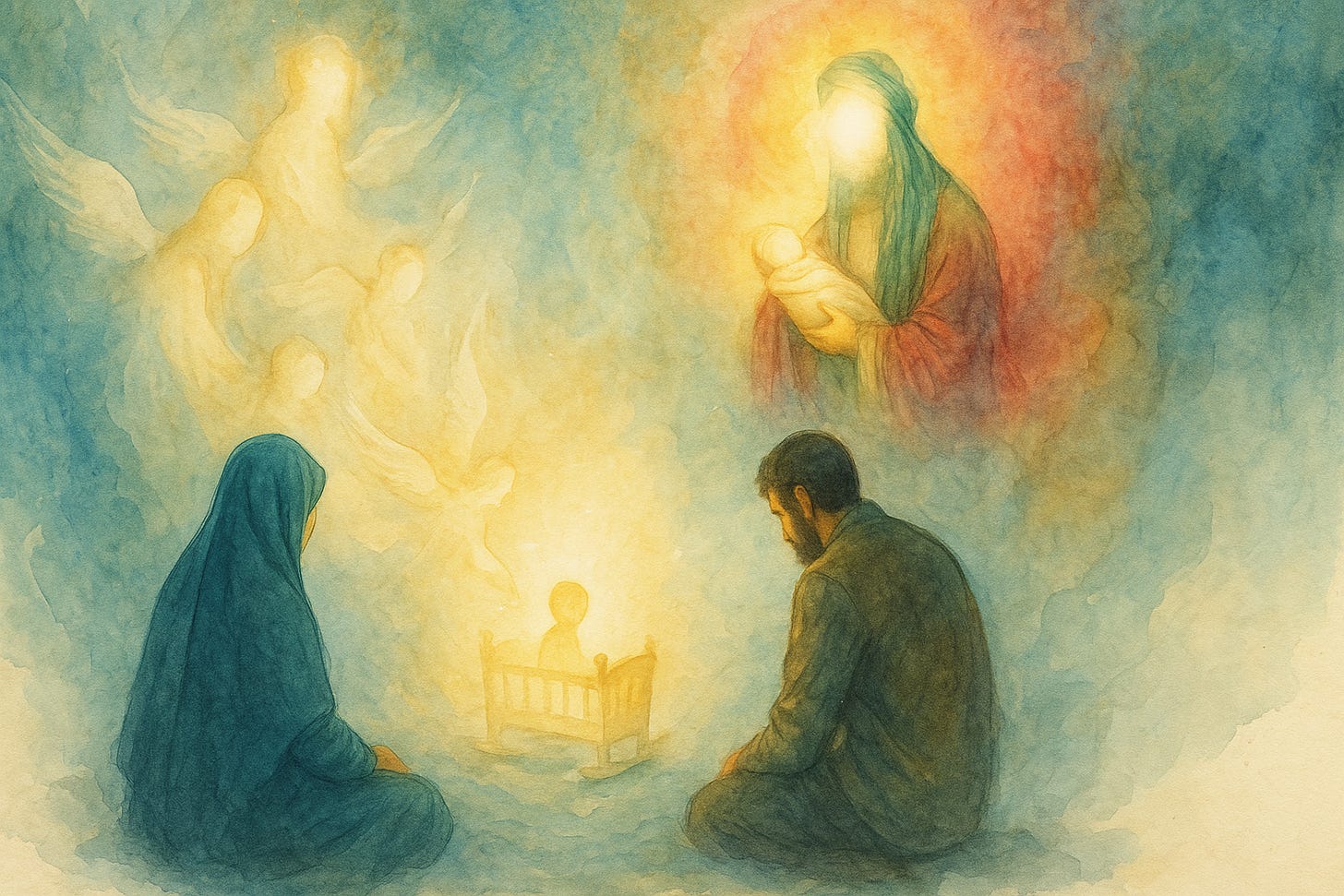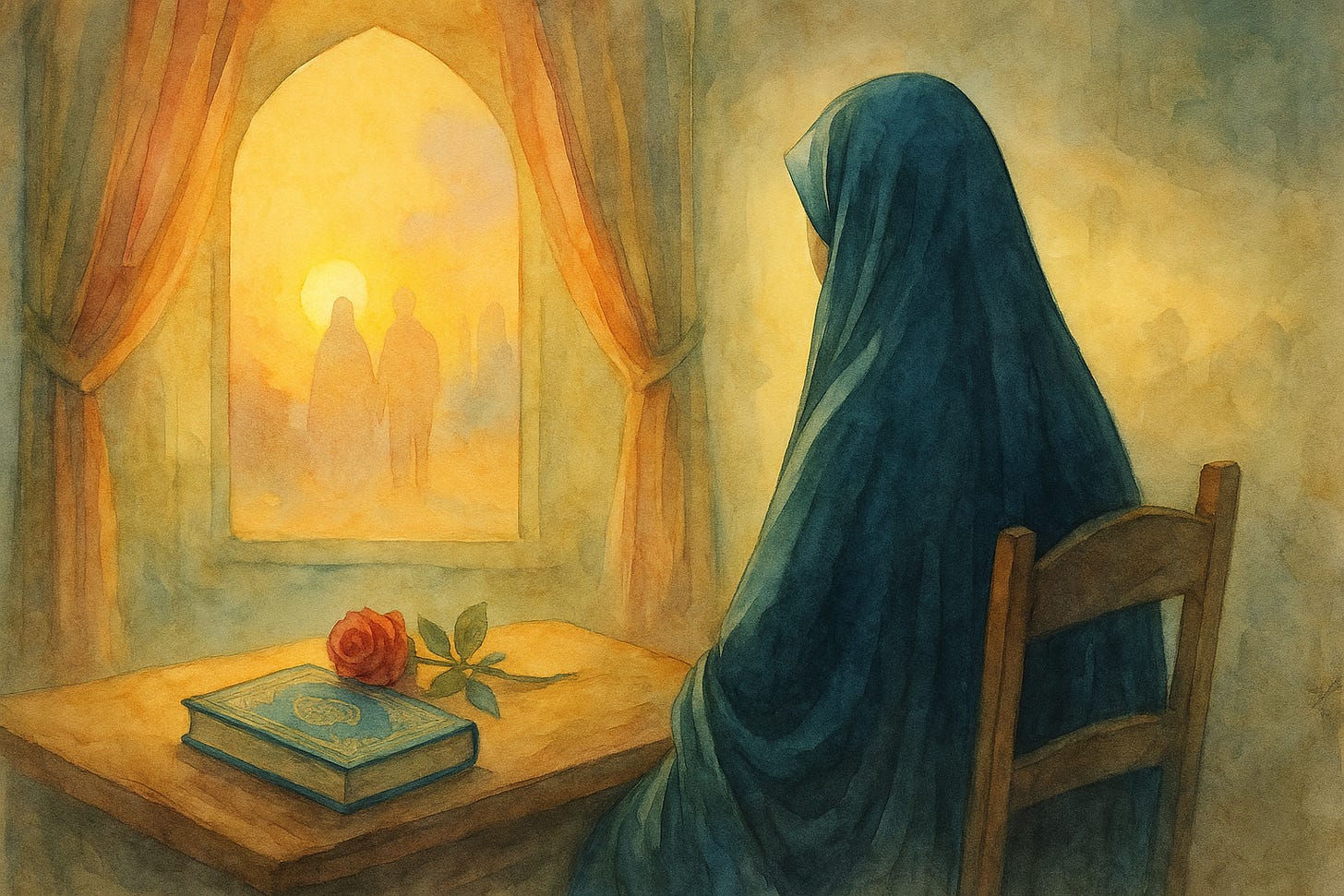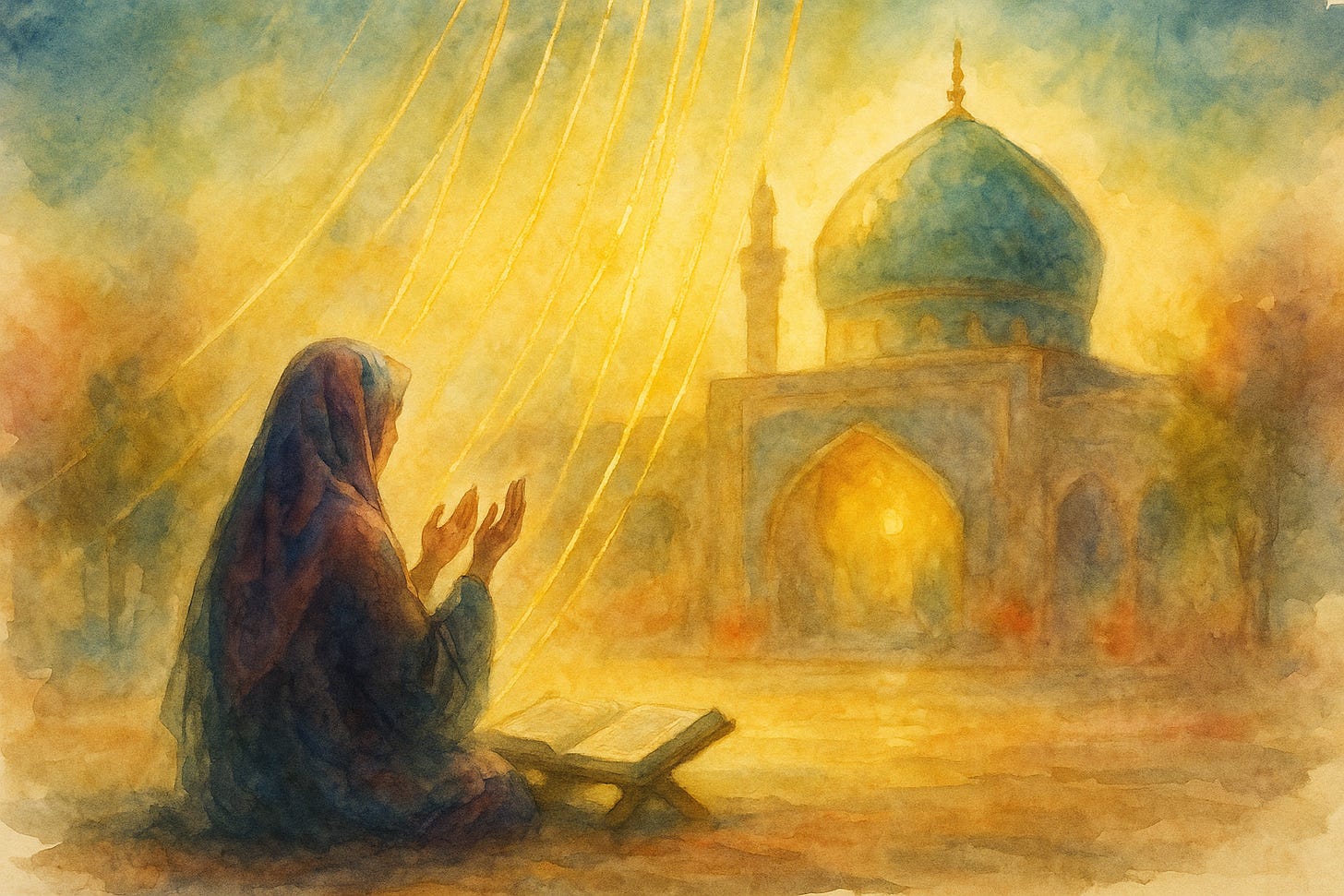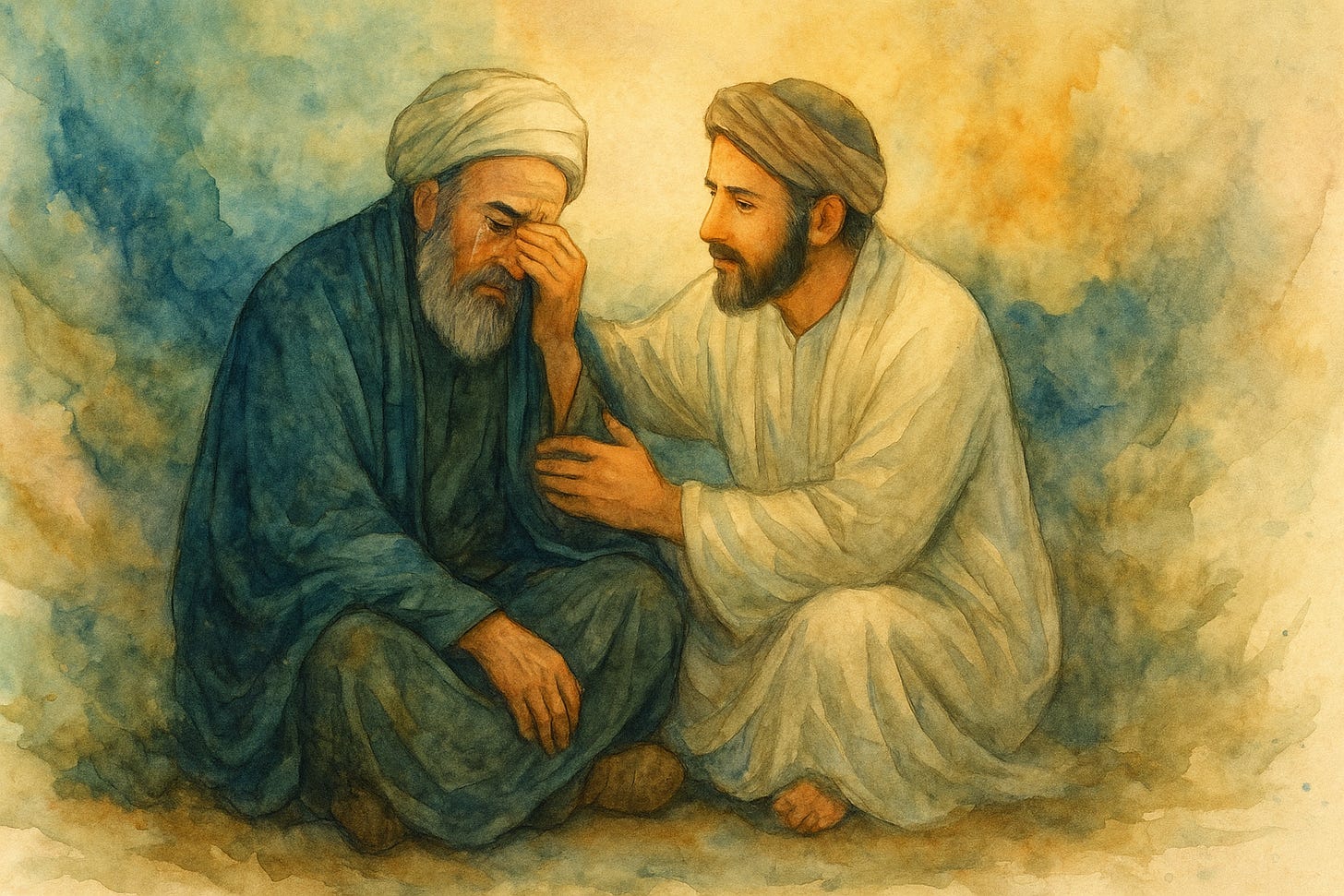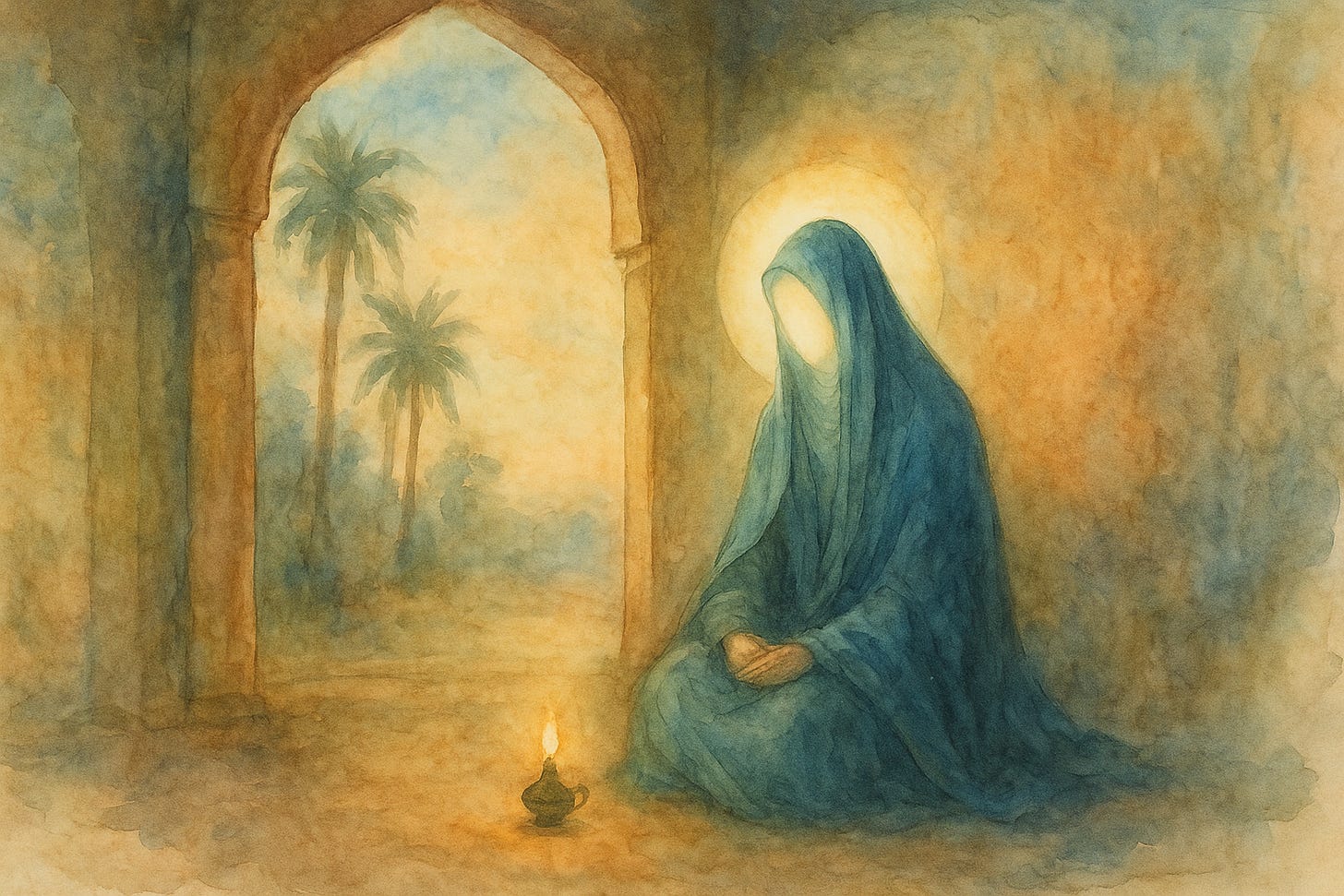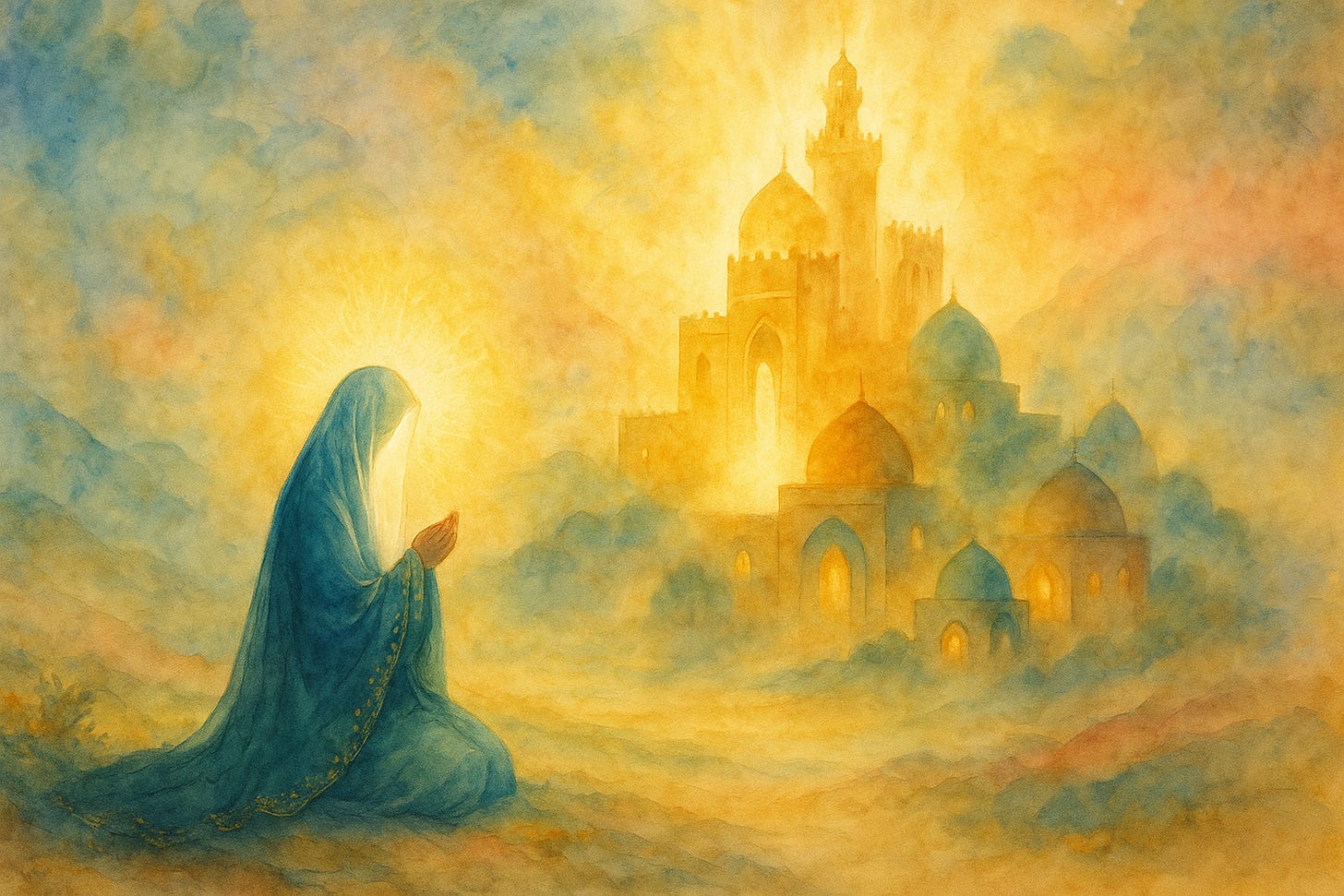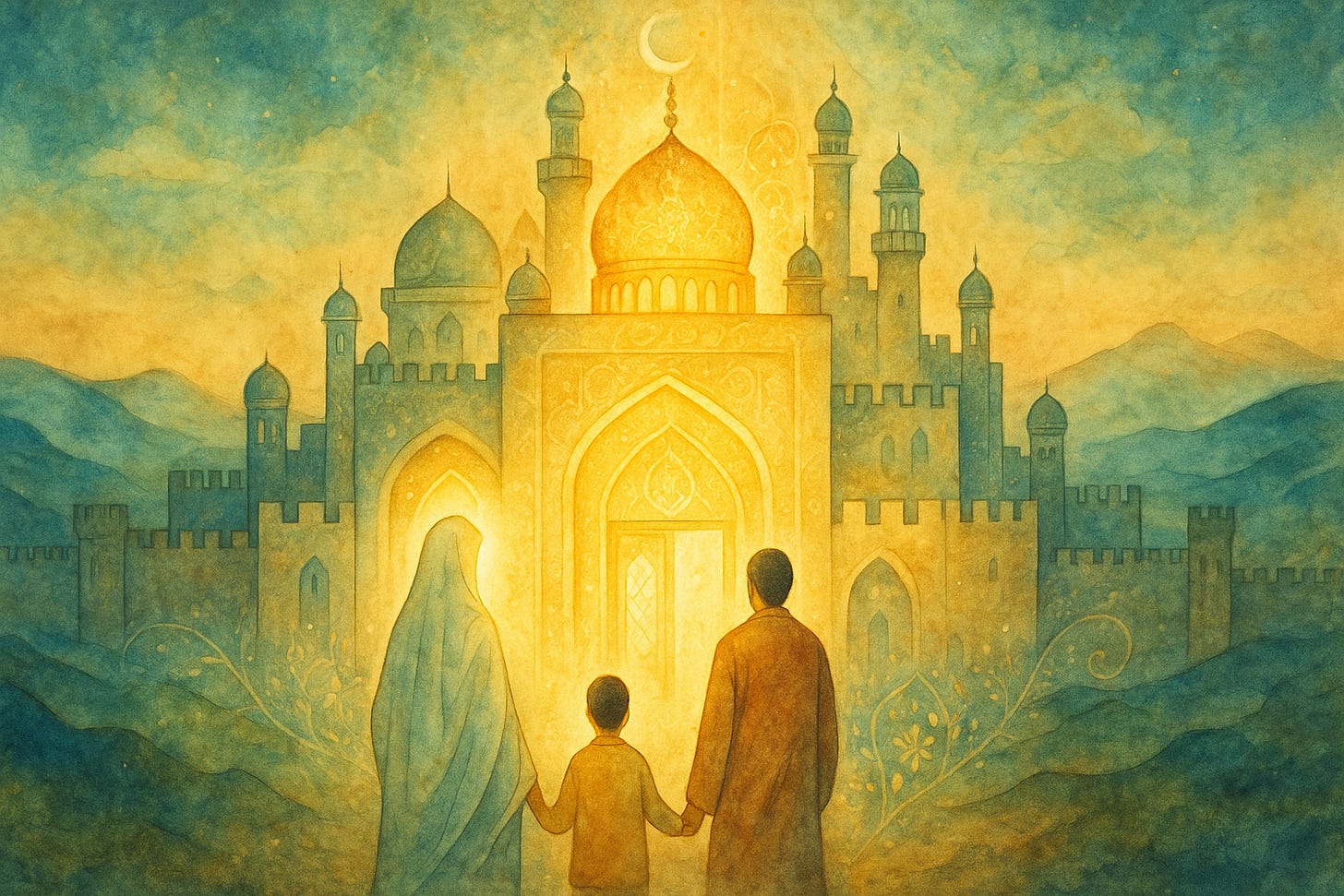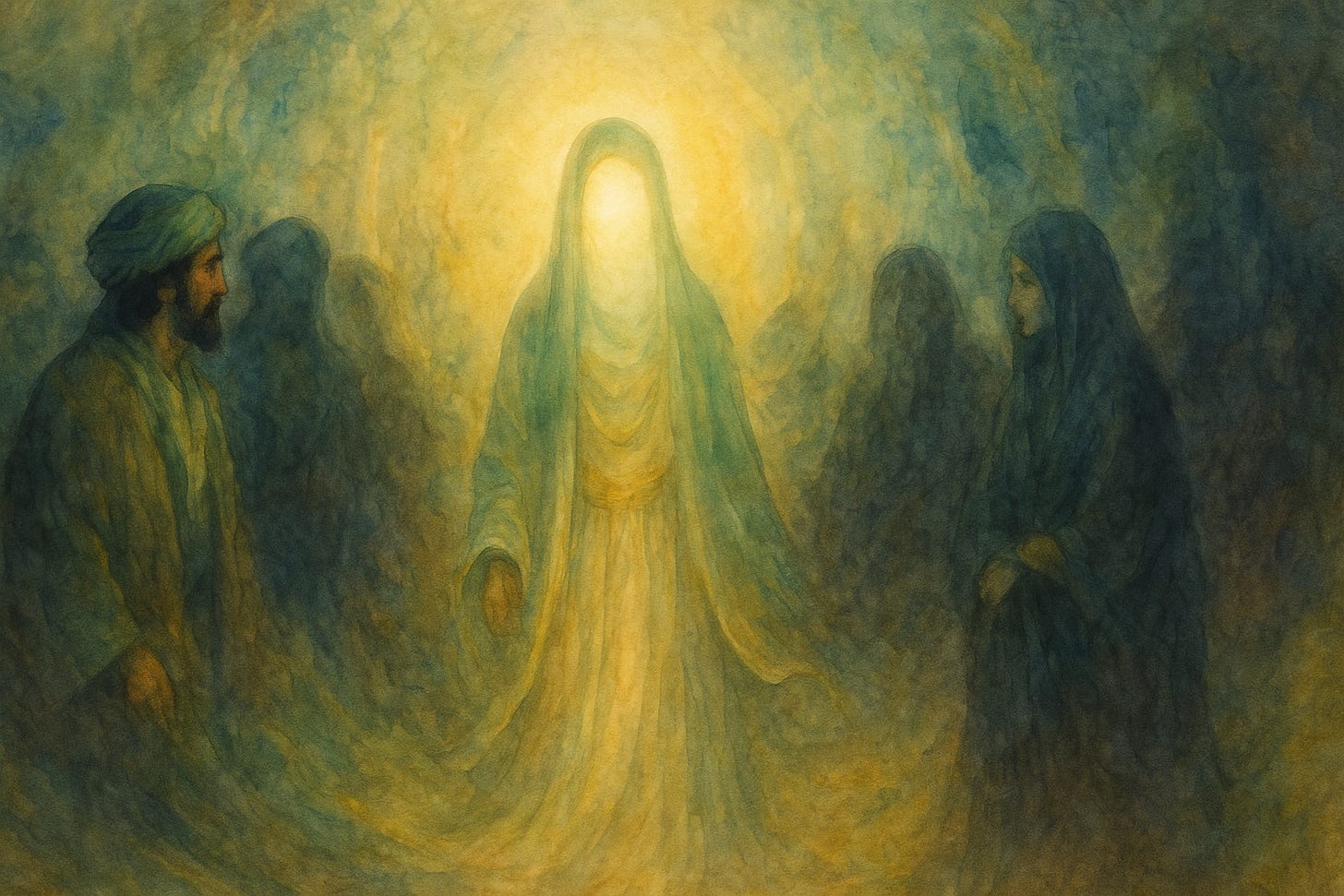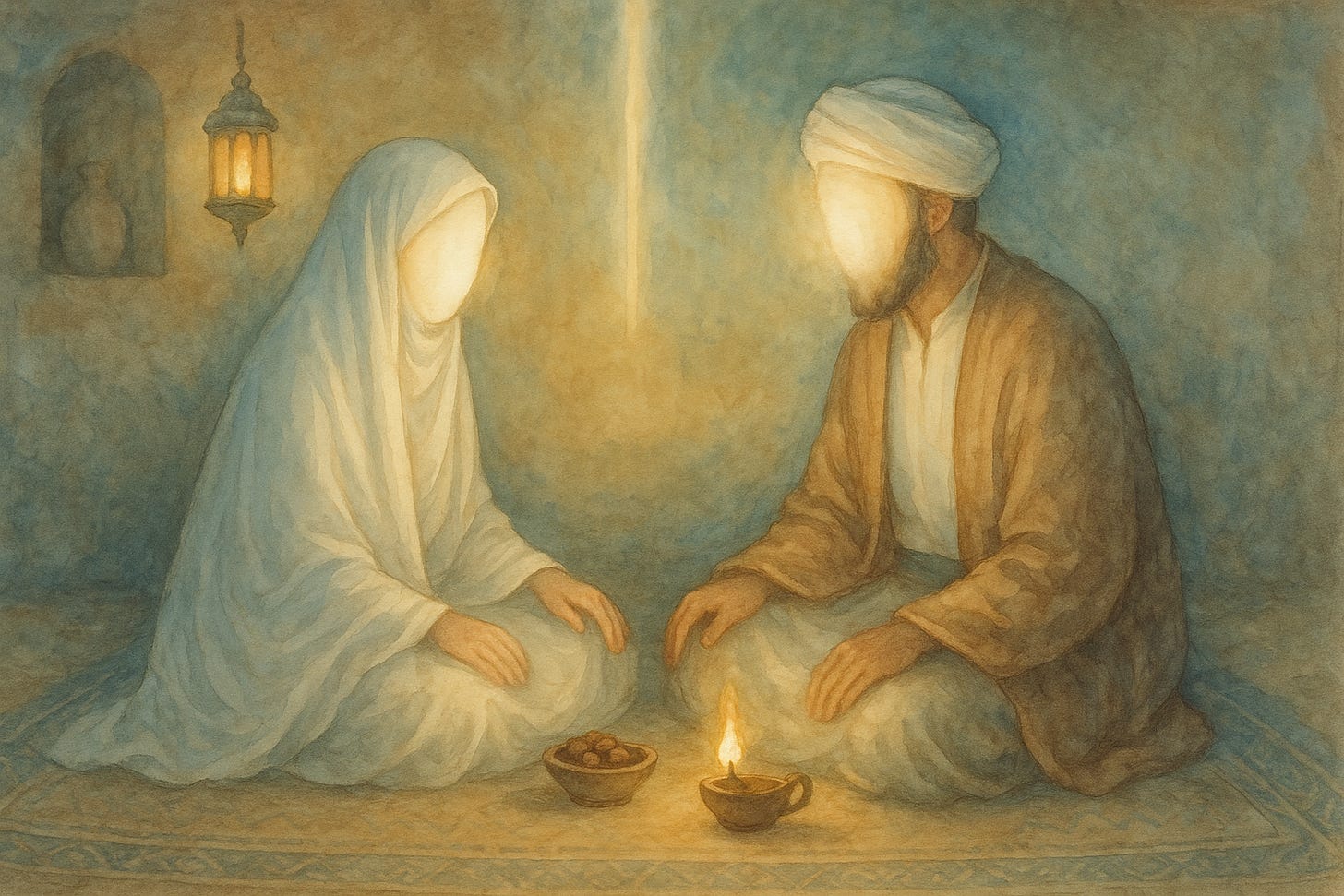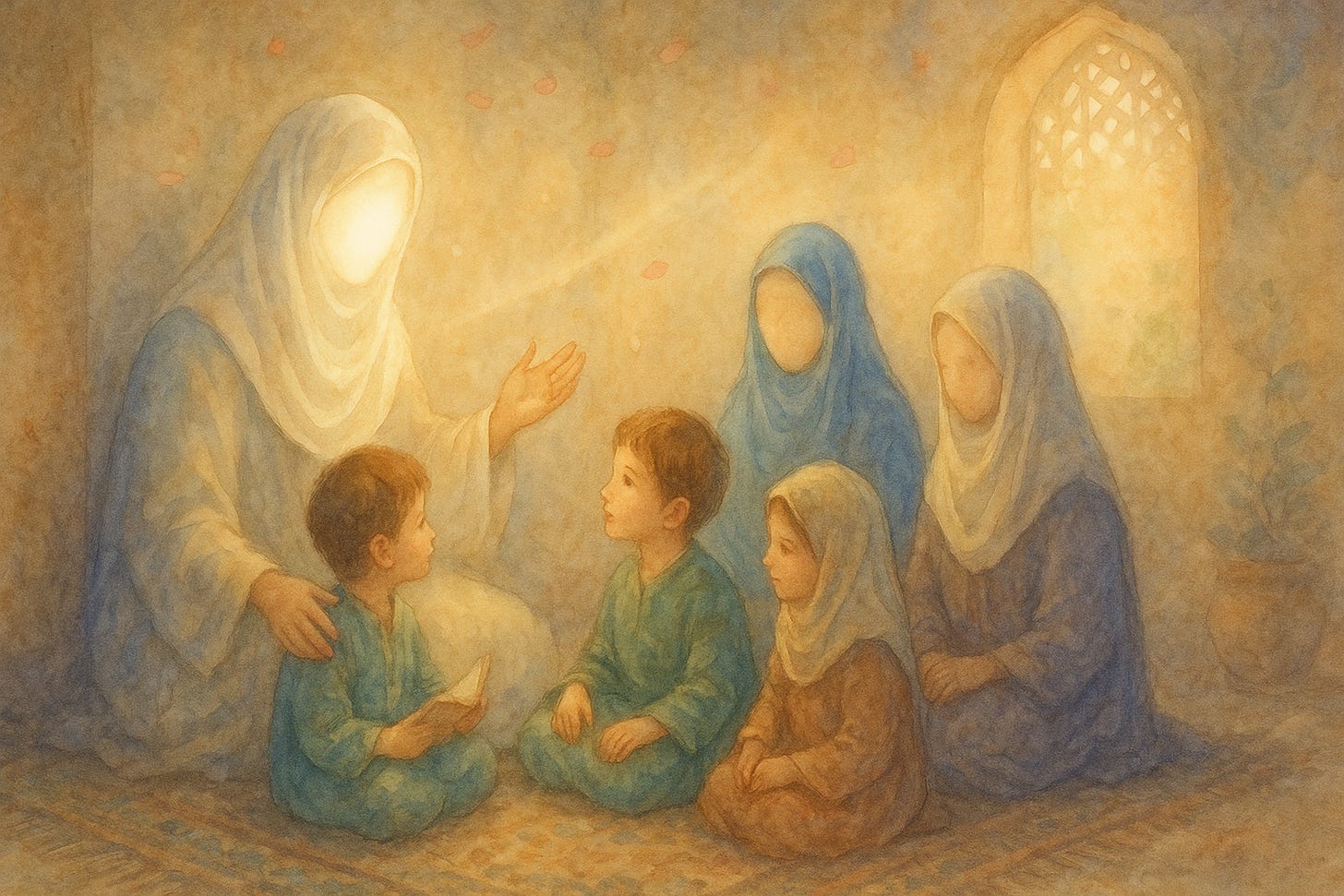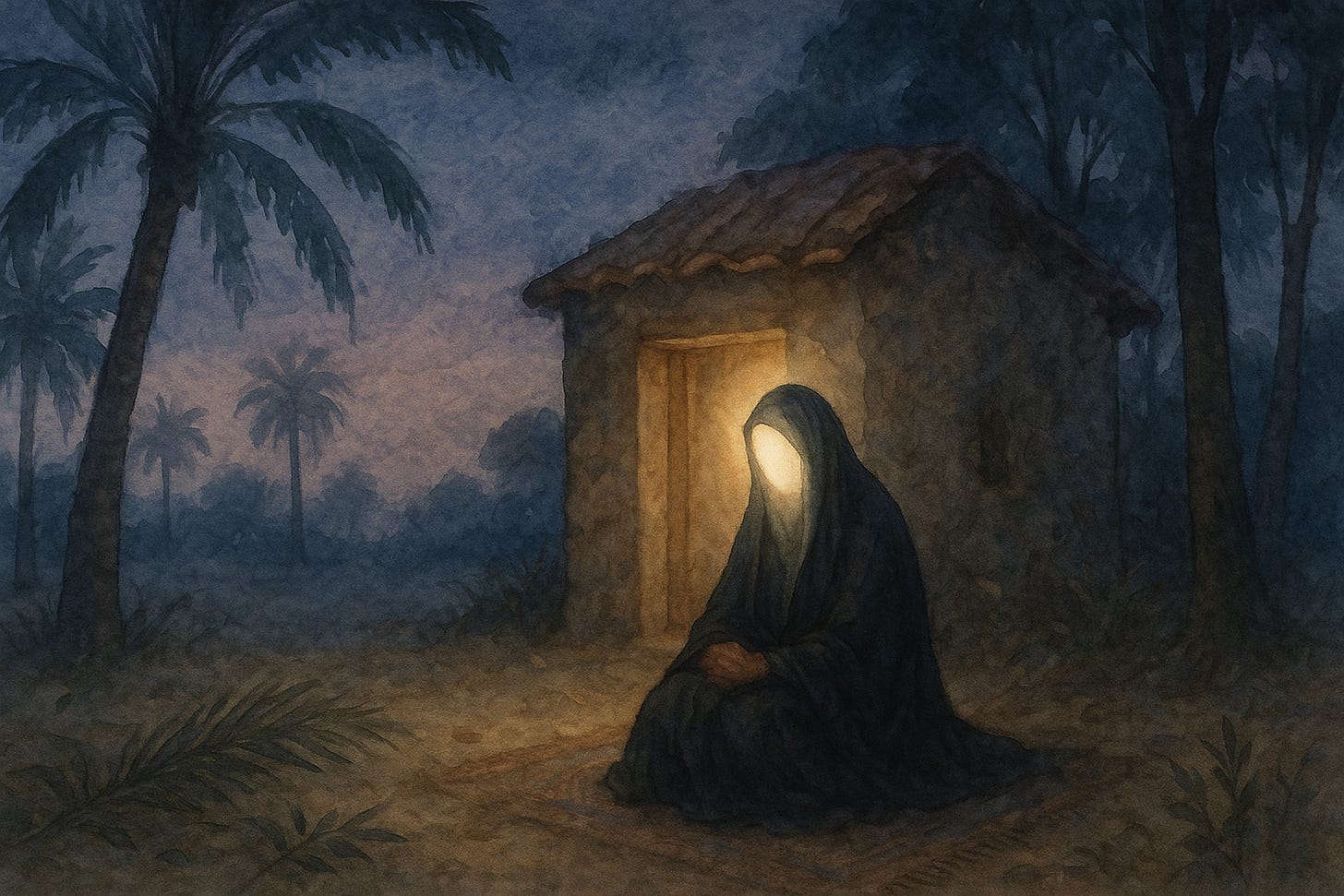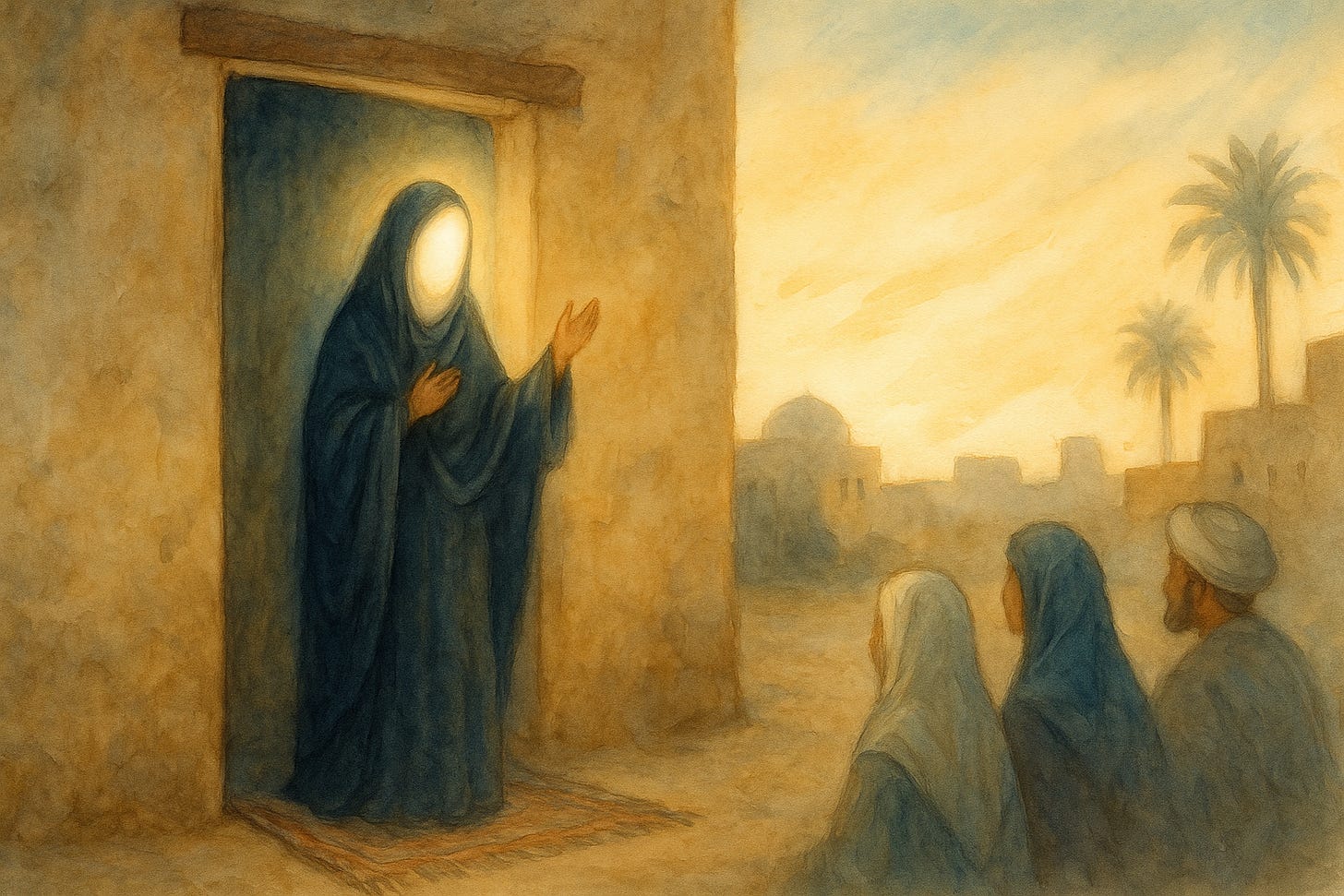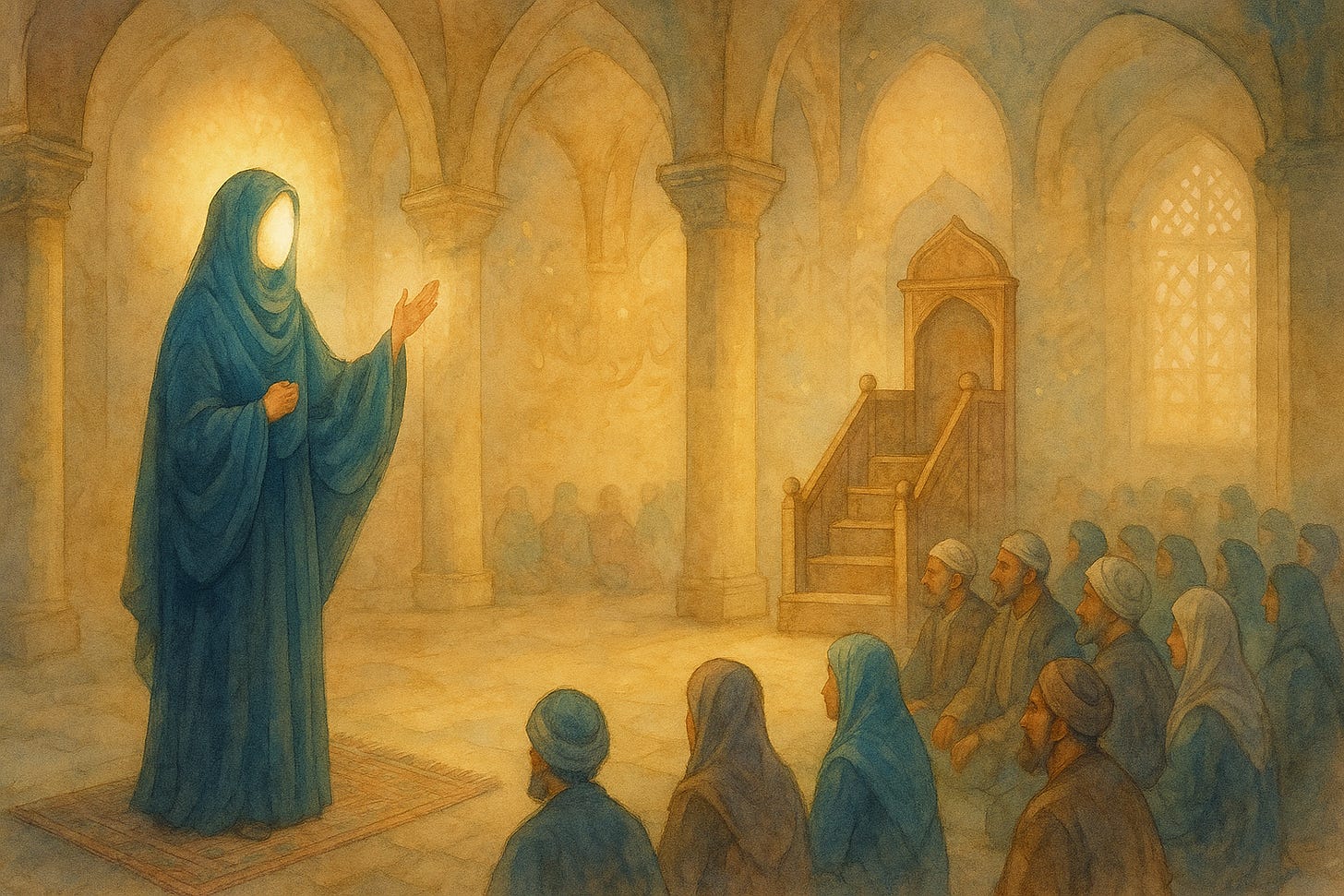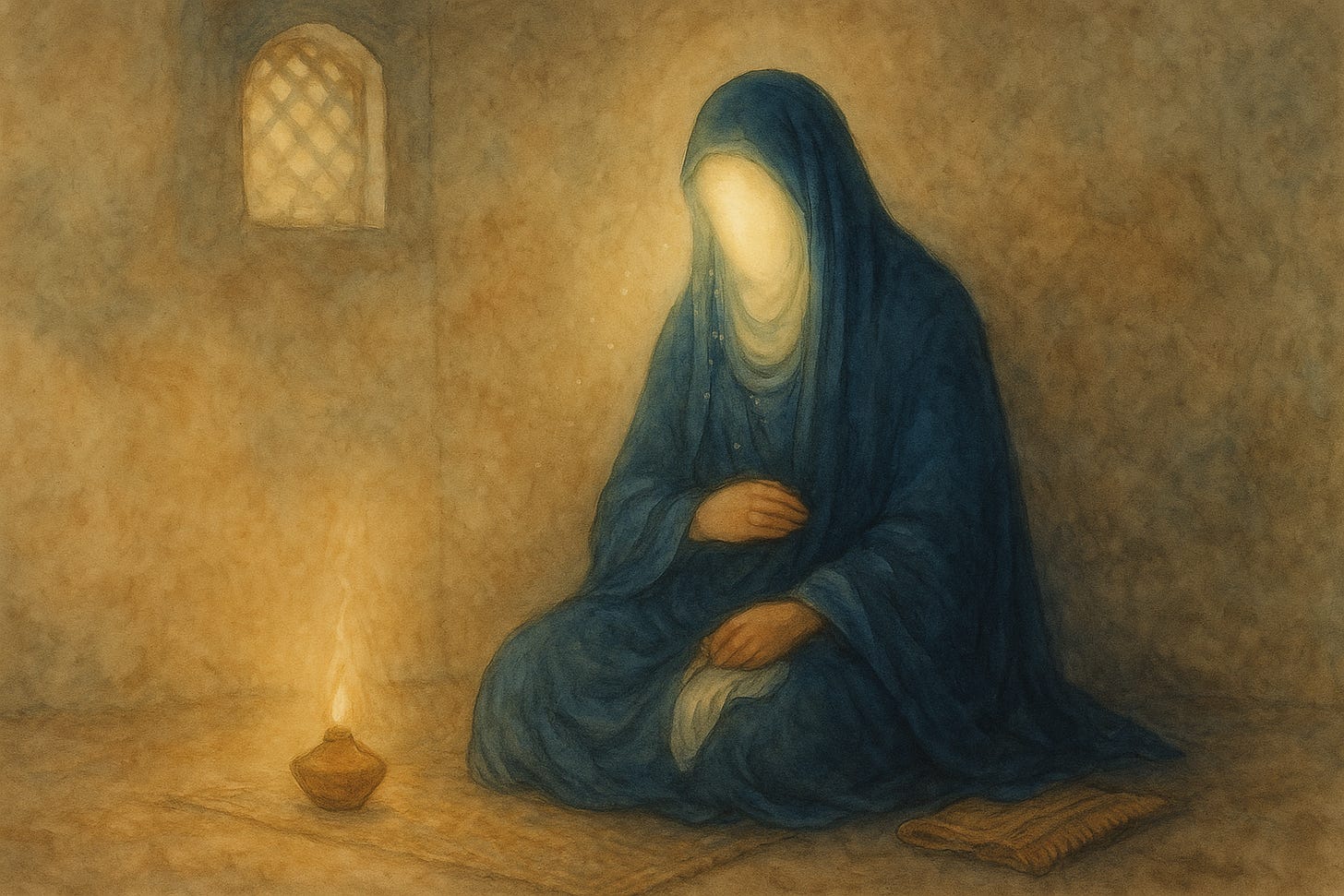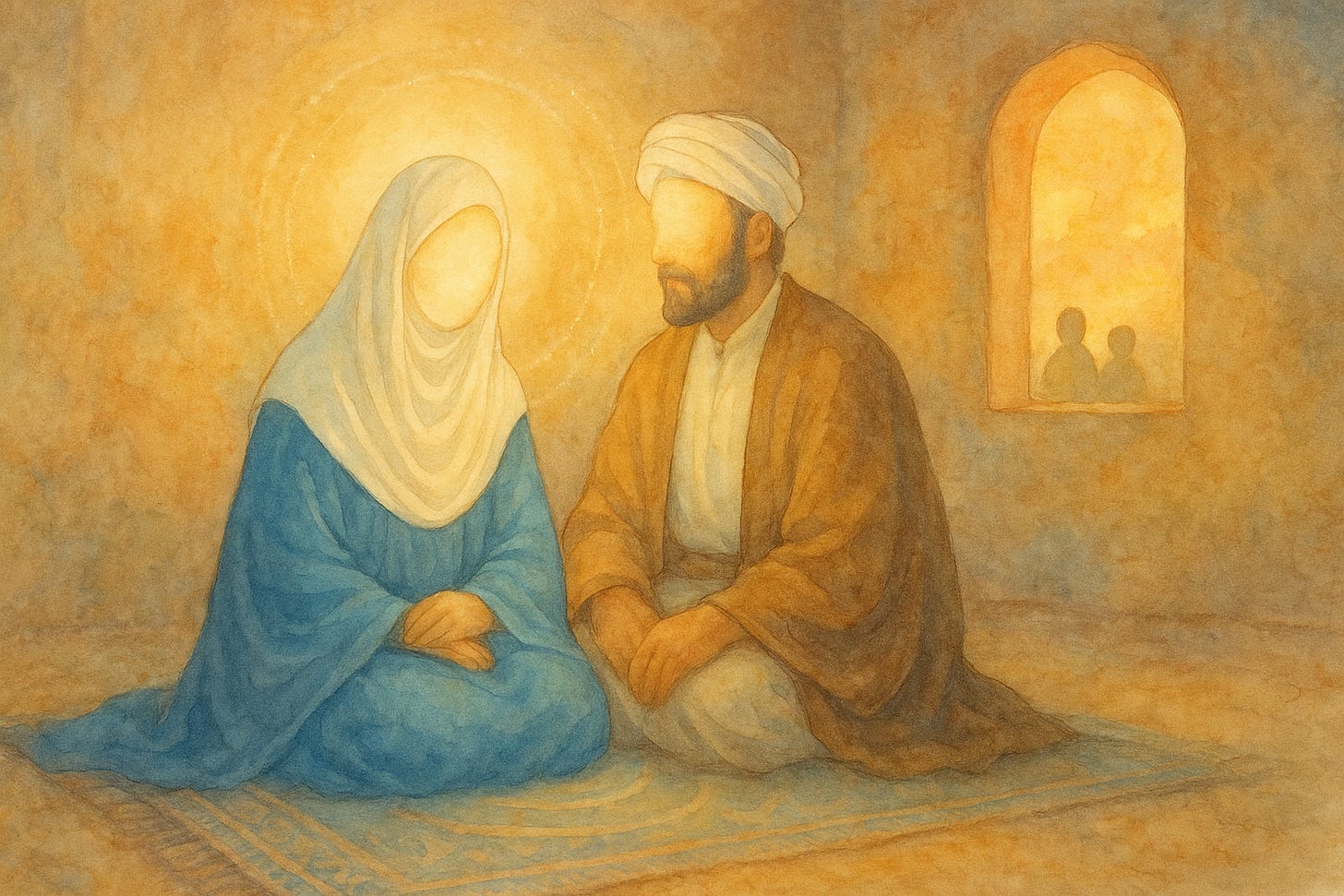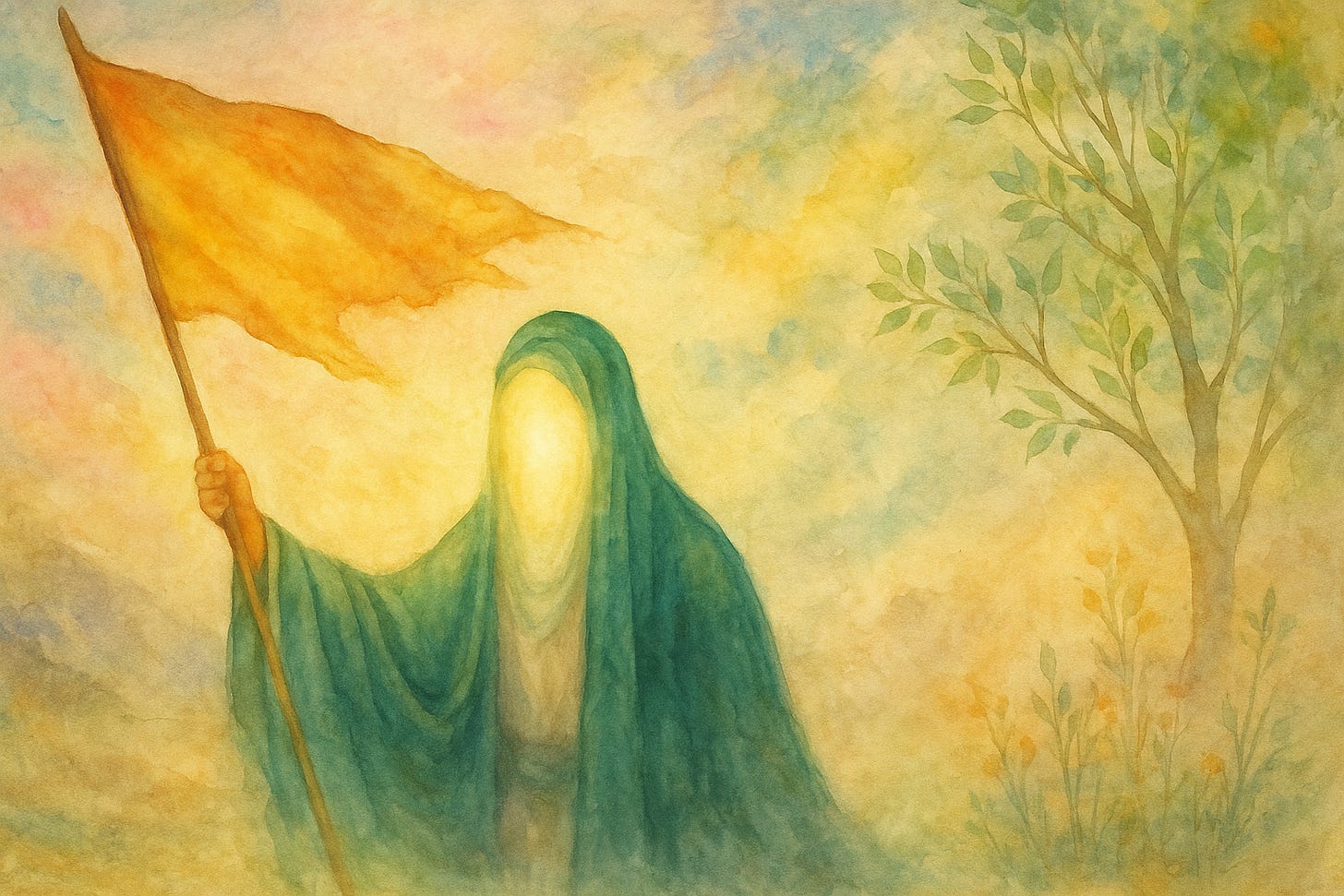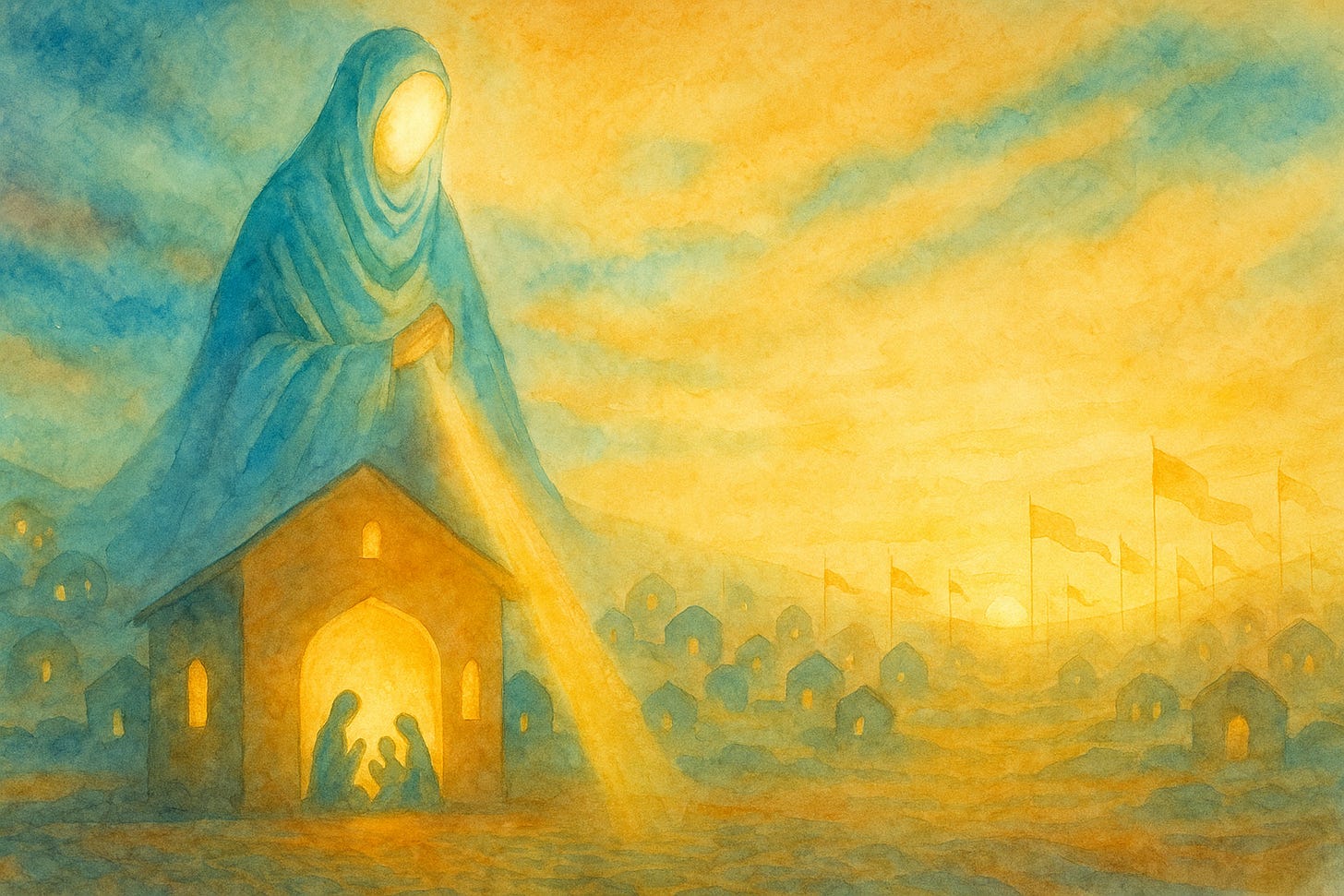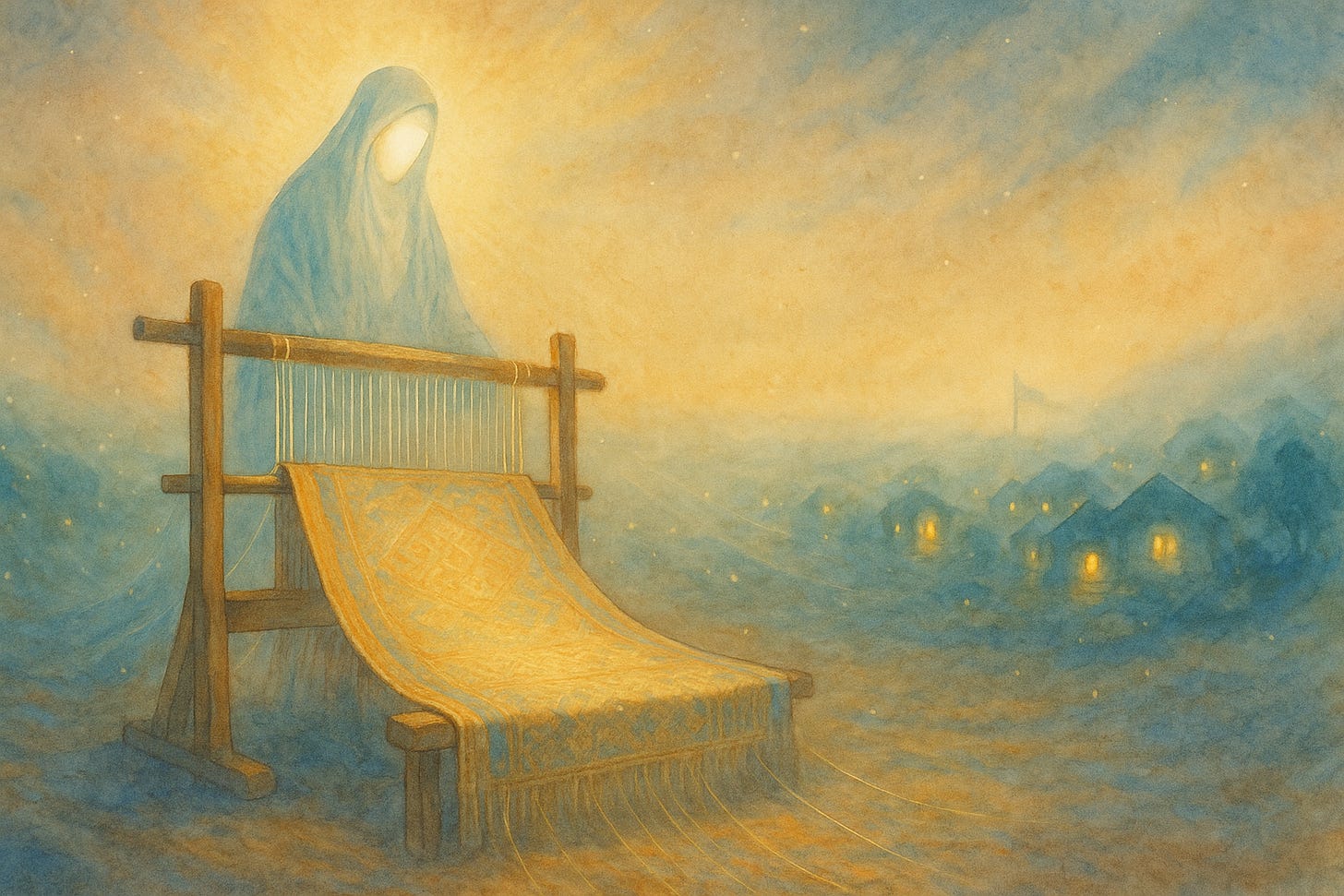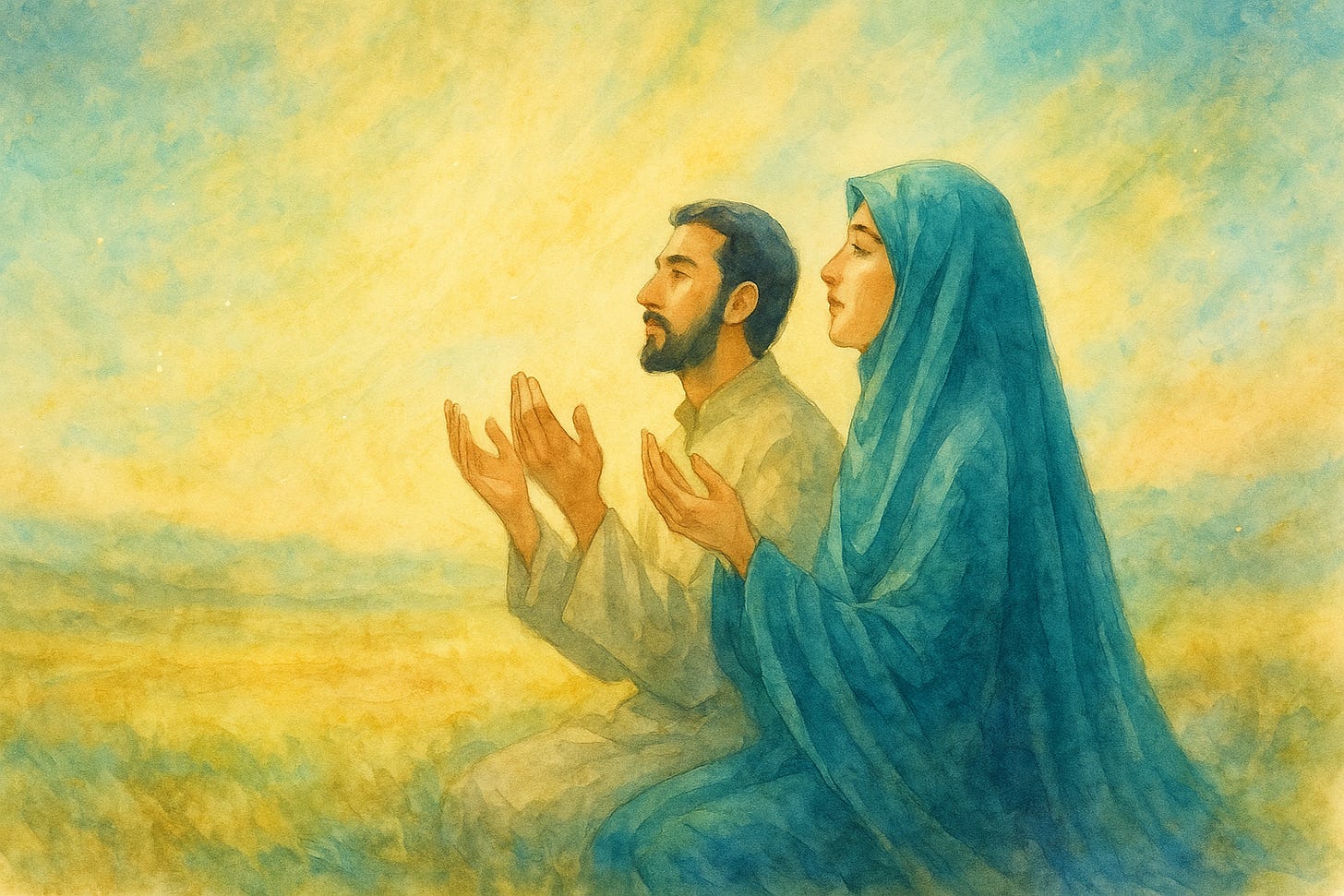[3] Wilayah in the Home - Mending the Tapestry: Trials, Trust, and Turning to God
Wilayah in the Home: A Fatimiyyah Series on Marriage and Family, based on the Quran, the Tradition of the Ahlulbayt, and guidance drawn from the teachings of Imam Khamenei. Fatimiyyah 2025/1447
In His Name, the Most High
This is the third and final session in our three-part Fatimiyyah 2025/1447 series, “Wilayah in the Home,” focusing on Marriage and Family, based on the Quran, the Tradition of the Ahlulbayt (peace be upon them), and guidance drawn from the teachings of Imam Khamenei.
As with our explorations into subjects like The Art of Supplication, The Lantern of the Path or the Tabyeen series (for Ashura and Arbaeen 2025/1447), it is strongly recommended that readers engage with the previous session prior to consuming the current one.
This is due to the cumulative nature of our discussion; the manner of discourse requires that each part build upon foundations laid in the ones that came before.
Proceeding sequentially helps avoid confusion, misunderstanding, or invalid assumptions, ensuring we move towards clarity on these vital matters.
While this session will include a brief recap, it is highly summarised.
To grasp the full context and nuance of our previous discussions on establishing the foundations and nurturing the relationship, engaging with, studying, and reflecting upon them is essential.
Therefore, while these discussions might sometimes feel detailed or lengthy, the subject matter is profoundly important. We request patience and encourage everyone to read through to the end, following the progression of the series for maximum benefit.
God willing, this journey will illuminate the path towards building stronger, God-centric families.
Video of the Majlis (Sermon)
This is the video of the majlis (sermon)
Audio of the Majlis (Sermon)
This is the audio of the majlis (sermon)
Recap
The Unfolding Tapestry: Weaving a Life of Love and Purpose
In our second session, we moved from the foundations of marriage to the active process of weaving the tapestry of a shared life.
We began by clarifying that mawaddah (love) is not a passive “Hollywood” emotion, but an active, daily commitment (an “active verb”).
We established that the soil for this love is trust, a two-way street that must be earned, not just demanded.
We explored the libas (garment) metaphor, clarifying that while it commands concealment of faults, it provides a divine license—and even an obligation—to seek help for harm (dharar) or oppression (dhulm), distinguishing between sinful gossip and necessary consultation (istisharah).
From there, we clarified the divine pattern of roles, rescuing them from cultural distortion.
We understood the husband’s role as qawwam (a responsible protector/provider, not a dictator) and the wife’s honoured role as rayhanah (a cherished flower) and modir (the internal manager of the home), not a qahramanah (servant).
We addressed the fiqhi (jurisprudential) limits of authority, emphasising that in a healthy marriage, communication and Rahmah—not legal technicalities—are the guiding principles.
We then discussed the balanced weave of a woman’s life, affirming her irreplaceable, primary role as mother and wife as her highest jihad, while also confirming her Islamic right to education and social participation, provided this primary foundation is not compromised.
We tackled conflict, establishing sazegari (mutual accommodation) as the key to longevity, while drawing a hard “red line” against dhulm (abuse), which we clarified is bidirectional and universally forbidden (haram).
Finally, we celebrated the fruits of the tapestry: the sacred duty of tarbiyyah (nurturing).
We affirmed the mother’s irreplaceable role and the father’s duty as a “friend” and guide.
Most importantly, we compassionately addressed the profound test of infertility, reframing it as a divine decree of the All-Knowing, not a punishment, and explored the honourable paths of sabr (patience), kafalah (guardianship), and spiritual parenthood for the Ummah.
We have now learned how to lay the first stitch and how to weave the main body of the tapestry.
But what happens when the threads snap?
What happens when dhulm is not rectified, when sazegari fails, when the damage seems too great?
This brings us to our final, most difficult session: “Mending the Tapestry: Trials, Trust, and Turning to God.”
We must now, with the same commitment to tabyeen (clarification) and rahmah (compassion), address the painful realities of breakdown, the Islamic pathways for mediation and, if necessary, dissolution (divorce), and the spiritual tools for recovery, resilience, and turning back to God.
Wilayah in the Home - Mending the Tapestry: Trials, Trust, and Turning to God
Diagnosing the Tears: Internal and External Pathologies
Before we begin this difficult diagnosis, we must clarify our intention with the utmost compassion.
This exploration of why a marriage may falter is not intended to assign blame or to look back with judgment.
Our purpose is not to say, “I told you so.”
Rather, to find a cure, we must first have the courage to diagnose the illness.
We are guided by the example of the Holy Prophet (peace and blessing be upon him and his family), whom Imam Ali (peace be upon him) described as the ultimate “physician of the soul”—a healer who did not wait for the sick to come to him, but actively sought them out to offer a remedy.
طَبِيبٌ دَوَّارٌ بِطِبِّهِ قَدْ أَحْكَمَ مَرَاهِمَهُ وَأَحْمَى مَوَاسِمَهُ
[He was] a physician, itinerant with his medicine, who had perfected his ointments and heated his instruments (for cauterisation).
— Nahjul Balagha, Sermon 108
Our approach in this session must be the same: to diagnose these deep, painful wounds not to condemn or single anyone out, but to understand.
Our goal is to seek the correct shar’i remedies, find practical solutions, and, where a complete fix is not possible, find the divine strength and guidance to cope.
This is a path of healing, and it begins with an honest, compassionate diagnosis.
A tapestry woven with rotten thread will unravel, no matter how beautiful the pattern.
Many marital breakdowns are not sudden events; they are the inevitable result of foundational pathologies, sicknesses of the soul that were present from the beginning but ignored, concealed, or misunderstood.
The Flawed First Stitch: When Internal Pathologies Unravel the Bond
The most resilient tapestry cannot survive if its core threads are diseased.
These internal pathologies, often stemming from issues we warned against in our first session, are the primary cause of a bond unravelling from within.
Pathology 1: Unresolved Addictions & Media Fantasies
In our first session, we issued a stark warning against the “digital poison” of pornography and the “false expectations” set by media.
When an individual enters marriage while captive to these influences, the “first stitch” is already broken.
A “Hollywood” or pornography-driven expectation of intimacy is a fading print on the fabric, not the thread itself. It creates a distorted view of human relations that the sacred, real-world mawaddah of a marriage cannot (and should not) compete with.
This addiction starves the real relationship of the affection and mercy it needs to survive, becoming a primary driver of emotional neglect and breakdown.
It is the very embodiment of the lifestyle Imam Khamenei warned against:
باطن فرهنگ غربی عبارت است از همان سبک زندگی مادی شهوت آلود گناه آلود هویت زدا و ضد معنویت و دشمن معنویت
The inner reality of Western culture consists of that same materialistic, lustful, sinful, identity-erasing, anti-spiritual, and spirituality-hating lifestyle.
— Imam Khamenei, Sabk-e Zendegi (Lifestyle), Page 92
The tragedy is not just the addiction itself, but the deception of entering marriage while concealing it.
A spouse discovering this hidden pathology feels a double betrayal - both by the addiction and by the concealment.
This is why the courage of honest disclosure before marriage, paired with a genuine commitment to recovery, is essential.
Pathology 2: Narcissistic Traits & Profound Emotional Neglect
A marriage can also unravel when one partner, particularly one exhibiting traits of profound narcissism or self-obsession, is incapable of fulfilling the most basic duties of the covenant.
In our second session, we learned that spouses are a libas (garment) for one another, tasked with protecting, adorning, and concealing each other’s faults.
We learned that God places rahmah (mercy) between them.
The narcissistic or emotionally neglectful spouse violates this entirely.
They are not a libas; they are an abrasive force that exposes faults and inflicts wounds.
They cannot show rahmah because their focus is solely on the self.
For them, the spouse is not a rayhanah (a cherished flower) to be cared for, but an object to be used.
This pathology is a profound act of dhulm (oppression), creating the “oppressive dungeon” we will discuss later.
This pathology manifests not only in clinical narcissism but in the everyday emotional abandonment that occurs when one spouse consistently prioritises work, hobbies, friends, or even religious activities over their partner’s emotional needs.
The spouse who is ‘married to their job’ or who uses even prayer as an escape from marital responsibility is committing a form of this neglect.
As Imam Khamenei clarified, the hadith ”she is a flower, not a foreman” forbids this dynamic of servile, objectified use:
إنما المرأة ريحانة و ليست بقهرمانة ... زن گل است... نوع برخورد با گل چگونه است؟... قهرمان... یعنی» مباشر امور ... سرکارگر یعنی در خانه ی شما زن را بعنوان مباشر امور خودتان ندانید
“A woman is a flower (rayhanah), not a chambermaid (qahramanah)”... A woman is a flower. How does one interact with a flower?... qahramanah... means a manager of affairs... a foreman. Meaning, do not consider the woman in your house as your manager of affairs.
— Imam Khamenei, Zan va Khanevadeh (Woman and Family), Page 60
Pathology 3: Pathological Neglect of Deen (Faith)
Finally, the “first stitch” is fundamentally flawed when the core intention—serving God—is absent or abandoned by one partner.
We established that this is a theocentric union, a sacred covenant (mithaq ghalidh) with God as the “unseen third”.
When one spouse pathologically neglects their deen—abandoning prayer, engaging in haram, or adopting a purely materialistic worldview—they are not just breaking a personal habit.
They are unilaterally severing the covenant.
They have removed God from the equation, thus destroying the entire foundation of Wilayah in the Home.
The tapestry, having lost its central anchor, inevitably tears apart.
The “Third Peg”: Pathologies of External Interference
While internal pathologies rot the threads of the tapestry from within, external forces can rip it apart.
A marriage is a sacred covenant between two people and their God.
When external forces begin to interfere, the couple’s first defence must be their ‘united front’ - a conscious decision to face pressures together rather than allowing them to divide.
Without this unity, the marriage becomes vulnerable to every external wind.
When a third party—be it a parent, an in-law, a sibling, or even a friend—inserts themselves into this sacred space with a sense of entitlement or control, they act as a “third peg,” stretching the fabric of the marriage to a breaking point.
Pathology 1: Interference as Control - Overbearing Parents & In-laws
This is one of the most common and destructive pathologies.
It occurs when parents or in-laws refuse to respect the new, independent family unit.
They may interfere in decisions, criticise a spouse, or demand a level of time and emotional energy that rightly belongs to the new marriage.
This often manifests as namimah (malicious gossip), carrying tales from one spouse to the other, or from a spouse back to the extended family, poisoning the well of trust.
The Prophet identified those who engage in this as among the most evil of people:
«أَلَا أُنَبِّئُكُمْ بِشِرَارِكُمْ؟» قَالُوا: بَلَى يَا رَسُولَ اللَّهِ. قَالَ: «الْمَشَّاءُونَ بِالنَّمِيمَةِ، الْمُفَرِّقُونَ بَيْنَ الْأَحِبَّةِ، الْبَاغُونَ لِلْبُرَآءِ الْعَنَتَ»
“Shall I not inform you of the most evil among you?” They said: “Yes, O Messenger of God.” He said: “Those who go about with malicious gossip (namimah), those who cause separation between loved ones (al-mufarriquna bayn al-ahibba), and those who seek to find fault with the innocent.”
— Al-Kulayni, Al-Kafi, Volume 2, Page 369, Hadith 7
When a parent, in-law, or sibling engages in behaviour that is al-mufarriquna bayn al-ahibba—actively causing separation between the husband and wife—they are committing a grave sin, not exercising a familial right.
Pathology 2: Betrayal of Trust vs. Islamic Brotherhood - Inappropriate Friendships
This pathology is often misunderstood, and clarification is essential.
Islam does not condemn friendship; it commands brotherhood and sisterhood.
The believers are a single body, described by the Qur’an as “brothers (ikhwah)” and “allies (awliya’) of one another”.
The ideal of trust in this brotherhood is so absolute that Imam al-Sadiq described it thus:
... أَنْ يَكُونَ أَخَاهُ فِي الشَّيْءٍ كُلِّهِ... حَتَّى أَنَّهُ إِذَا أَدْخَلَ يَدَهُ فِي كِيسٍ أَخِihهِ فَأَخَذَ مِنْهُ مَا يَحْتَاجُ لَمْ يَدْفَعْهُ
...That he be his brother in all things... to the point that if he puts his hand into his brother’s pocket and takes what he needs, his brother does not prevent him.
— Imam Ja’far al-Sadiq, cited in Misbah al-Sharia (The Lantern of the Path)
Therefore, having friends is not the problem; it is a blessing and a virtue.
The pathology arises when a spouse betrays the sacred marital covenant under the guise of friendship.
The fault is not with the friend, but with the spouse’s behaviour.
The blame lies with the husband or wife who is secretive with their phone, engages in inappropriate emotional intimacy, or behaves in a way that causes valid suspicion.
They have betrayed the marital amanah (trust).
They have violated the command of Imam Ali to “beware of the positions of accusation” (mawatin al-tuhamah).
This is precisely the point Imam Khamenei stresses—that the prerequisite for trust is protecting the boundaries of the relationship:
لازمه ی اعتماد در خانواده حفظ حریمهای زن و مرد
The Prerequisite for Trust in the Family is Protecting the Boundaries of Man and Woman
— Imam Khamenei, Zan va Khanevadeh (Woman and Family), Page 143, Heading
A spouse who fails to protect these boundaries is the one creating the pathology.
They are engaging in behaviour that Imam Khamenei identifies as the very foundation of this crisis:
معاشرتهای نادرست؛ زمینه ساز حسادت و سوءظن
Incorrect Interactions: A Foundation for Jealousy and Suspicion
— Imam Khamenei, Zan va Khanevadeh (Woman and Family), Page 144, Heading
He has explicitly and repeatedly advised both spouses to avoid the very actions that provoke this jealousy, as it is a poison that “burns the foundations of love from the root.”
He warns that once the seed of suspicion is planted, the damage is done, regardless of whether the suspicion was factually correct or not:
من همیشه به مردهای جوان توصیه میکنم... کاری نکنید و حرفی نزنید که زنان خود را وادار به حسادت کنید. به دختران جوان هم سفارش میکنم، که در برخوردشان با مردهای بیگانه، کاری نکنند و حرفی نزنند که حس حسادت و غیرت شوهرانشان را تحریک نمایند. این حسادتها بدبینی می آورد و پایه های محبت را سست میکند و از ریشه میسوزاند.
I always advise young men... do not do an action or say a word that compels your wives to jealousy. I also advise young women, in their interactions with strange men, do not do an action or say a word that provokes the feeling of jealousy and zeal of their husbands. These jealousies bring about suspicion (badbīnī) and weaken the foundations of love and burn it from the root.
— Imam Khamenei, Matla’-e ‘Ishq, Page 178
...بالاخره اگر سوءظن پیدا شد چه سوءظن مستند درستی داشته باشد، چه نداشته باشد، اثر خودش را می بخشد...
...in the end, if suspicion appears, whether it has a correct, documented basis or not, it will have its effect...
— Imam Khamenei, Bayanat dar Zan va Khanevadeh, Page 28
It is crucial to clarify what healthy Islamic brotherhood and sisterhood looks like: interactions are transparent, boundaries are clear, and the spouse’s comfort is prioritised.
It is the colleague who mentions their spouse in conversation, the friend who includes both spouses in invitations, the community member who maintains professional distance while offering genuine Islamic support.
This is the beautiful balance Islam teaches - maintaining warm community bonds while protecting the sanctity of marriage.
A Clarification (Tabyeen) on Honouring Parents vs. Sabotaging a Marriage
The most sensitive and common form of external interference comes from parents and extended family.
The relationship between honouring one’s parents and protecting one’s marriage is one of the most difficult balances to strike, and it is a primary area where cultural traditions often clash with divine law.
The Quranic Mandate: The Paramount Duty of Ihsan (Kindness)
The duty of Birr al-Walidayn (Kindness to Parents) is not optional; it is a foundational pillar of Islam, second only to Tawhid (Monotheism/Oneness of God).
The Qur’an places it at the highest level of obligation:
وَقَضَىٰ رَبُّكَ أَلَّا تَعْبُدُوا إِلَّا إِيَّاهُ وَبِالْوَالِدَيْنِ إِحْسَانًا ۚ إِمَّا يَبْلُغَنَّ عِndكَ الْكِبَرَ أَحَدُهُمَا أَوْ كِلَاهُمَا فَلَا tَقُل لَّهُمَا أُفٍّ وَلَا تَنْهَرْهُمَا وَقُل لَّهُمَا قَوْلًا كَرِيمًا
And your Lord has decreed that you not worship except Him, and to parents, good treatment (ihsan). Whether one or both of them reach old age [while] with you, say not to them [so much as], “uff,” and do not repel them but speak to them a noble word.
— Qur’an, Surah al-Isra (The Chapter of the Night Journey) #17, Verse 23
This command for ihsan (a standard higher than mere justice; it is goodness, kindness, and excellence) is absolute.
This kindness is due to both sets of parents from both spouses.
However, this duty has one, and only one, shar’i (legal) limit.
The Divine Limit: No Obedience in Disobedience
The duty of kindness and respect is unwavering, but the duty of obedience is conditional.
It ends precisely where the command of God begins.
If a parent orders a child—married or unmarried—to do something that is haram (forbidden) or to neglect a wajib (obligation), obedience to them is forbidden.
The Prophet and Imam Ali both established this non-negotiable principle:
لَا طَاعَةَ لِمَخْلُوقٍ فِي مَعْصِيَةِ الْخَالِقِ
There is no obedience to a creature in disobedience to the Creator.
— Nahjul Balagha, Saying 165; also a widely cited Prophetic maxim.
The Forbidden (Haram) Act of Sabotaging the Covenant
This brings us to the core conflict.
When a parent’s “advice” or “demands” cross the line into actively sabotaging their child’s marriage, it ceases to be a parental “right” and becomes an act of sin (ma’siyah).
This interference is a grave pathology, whether it comes from the husband’s family or the wife’s.
It is namimah (malicious gossip).
It is acting as one of “those who cause separation between loved ones” (al-mufarriquna bayn al-ahibba), which the Prophet called one of the most evil of acts:
«أَلَا أُنَبِّئُكُمْ بِشِرَارِكُمْ؟» قَالُوا: بَلَى يَا رَسُولَ اللَّهِ. قَالَ: «الْمَشَّاءُونَ بِالنَّمِيمَةِ، الْمُفَرِّقُونَ بَيْنَ الْأَحِبَّةِ، الْبَاغُونَ لِلْبُرَآءِ الْعَنَتَ»
“Shall I not inform you of the most evil among you?” They said: “Yes, O Messenger of God.” He said: “Those who go about with malicious gossip (namimah), those who cause separation between loved ones (al-mufarriquna bayn al-ahibba), and those who seek to find fault with the innocent.”
— Al-Kulayni, Al-Kafi, Volume 2, Page 369, Hadith 7
Pathology 1: Undermining the Rayhanah (The Wife)
This occurs when a husband’s family refuses to see his wife as the honoured rayhanah (cherished flower) and modir (manager) of her own home.
They may treat her as a qahramanah (servant or foreman), criticise her, and pressure their son to exert a tyrannical authority that is haram.
A son who obeys his family in committing this dhulm (oppression) against his wife is obeying a creature in disobedience to the Creator.
His wife has shar’i rights (nafaqah, kindness, respect) that his parents cannot override.
His duty as qawwam (protector) extends to protecting his wife from the dhulm (oppression) of his own family.
Pathology 2: Undermining the Qawwam (The Husband)
This destructive interference is, of course, not limited to one side.
The same pathology occurs when a wife’s family (parents, siblings, or “aunties”) interferes by telling her, “He can’t ask you to do that,” or “You don’t have to listen to him.”
By doing so, they are inciting her to nushuz (rebellion or recalcitrance) and undermining the husband’s God-given role as qawwam —a role of legitimate external leadership and provision.
Unless the husband is commanding a sin, this interference is a haram act of sabotage, directly opposing the shari’ah.
The Independent Unit: A United Front
In both cases, these interfering parties are sinning.
When two people marry, they form a new, independent family unit.
While they remain children to their parents, their primary covenant is now with each other.
The couple must learn to communicate, form a “united front,” and protect their sacred space.
The Jihad of Sincere Advice: When Help is Not Harm
This does not mean parents and family can never give advice.
Islam is built on mutual support and sincere advice (nasihah).
The Qur’an commands us to “enjoin upon one another truth”
The critical difference lies in the intention and the method.
Interference is self-serving: it seeks to control, to impose one’s own will, or to validate one’s own ego.
Pious guidance (nasihah) is selfless: its only goal is islah (reconciliation) and moving the couple closer to God.
Often, interference is disguised as “help” from a position of incomplete knowledge.
A parent hears one side of a story and, in a rush to “defend” their child, offers advice that is in fact destructive.
This is a violation of the Quranic principle of tabayyun (verification).
يَا أَيُّهَا الَّذِينَ آمَنُوا إِن جَاءَكُمْ فَاسِقٌ بِنَبَإٍ فَتَبَيَّنُوا
O you who have believed, if there comes to you a disobedient one with information, investigate...
— Qur’an, Surah al-Hujurat (The Chapter of the Chambers) #49, Verse 6
While a child is not a fasiq (disobedient one), the principle holds: acting on incomplete, one-sided information is dangerous.
Pious advice must be given with hikmah (wisdom) and maw’idhah hasanah (beautiful admonition).
Imam Khamenei provides the perfect model for this.
When a spouse complains to an elder, the elder’s duty is not to “reinforce that ill-speaking.”
Their duty is to become an agent of islah:
مبادا خدای نکرده بزرگترها یکی از زوجین پیش آنها از آن دیگری بدگویی کند، اینها هم بدگویی او را تقویت کنند... بگذارند این دو با هم مأنوس شوند و دلهایشان را به هم متصل کنند.
God forbid that the elders should allow one of the spouses to come to them and speak ill of the other, and then they (the elders) reinforce that ill-speaking... Let them (the couple) become intimate with each other and connect their hearts.
— Imam Khamenei, Matla’-e ‘Ishq (The Dawn of Love), Page 128
The truly loving parent or relative is a “support scaffold,” not a “third peg.”
They provide strength to help the new, independent union set its foundation, and then they wisely step back, allowing the couple to stand on their own, bound together in their covenant with God.
One Home, Two Households: The Crisis of Infringed Intimacy
This discussion of interference leads us to a specific and common living arrangement that institutionalises this pathology: the practice of the newly married couple “moving in” with one set of parents.
While sometimes born of economic necessity, this arrangement often creates a crisis of “one home, two households.”
The Violation of Sakinah (Tranquility)
In our first session, we established that the Quranic purpose of marriage is:
وَمِنْ آيَاتِهِ أَنْ خَلَقَ لَكُم مِّنْ أَنفُسِكُمْ أَزْوَاجًا لِّتَسْكُنُوا إِلَيْهَا وَجَعَلَ بَيْنَكُم مَّوَدَّةً وَرَحْمَةً إِنَّ فِي ذَٰلِكَ لَآيَاتٍ لِّقَوْمٍ يَتَفَكَّرُونَ
And of His signs is that He created for you spouses from among yourselves so that you may find rest in them (li taskunu ilayha), and He put between you affection and compassion; most surely there are signs in this for a people who reflect.
— Qur’an, Surah al-Rum (the Chapter of the Romans) #30, Verse 21
This sakinah is the peace and repose that comes from forming a new, independent sanctuary.
As Imam Khamenei explains, this is the very definition of a family:
خانواده در اسلام یعنی محل سکونت دو انسان، محل آرامش روانی دو انسان، محل انس دو انسان با یکدیگر، محل تکامل یک نفر به وسیله یک نفر دیگر...
Family in Islam means: the place of residence (sukunat) for two people, the place of psychological tranquility (aramesh-e ravani) for two people, the place of intimacy (uns) for two people with each other, the place for one person to find perfection by means of the other...
— Imam Khamenei, Zan va Khanevadeh (Woman and Family), Page 110
When the couple lives under the roof of another established household, this sacred privacy is fundamentally infringed.
The couple is never truly alone; they are long-term guests, unable to establish their own rhythm, their own rules, or their own intimate space.
This constant infringement is the very antithesis of sakinah.
The “One Man of the House” Conflict (Undermining Qawwam)
This arrangement creates an immediate and unavoidable conflict of wilayah (authority). In Islam, the husband is designated as the qawwam of his own family—its protector and provider.
الرِّجَالُ قَوَّامُونَ عَلَى النِّسَاءِ...
Men are the protectors and maintainers (qawwamūn) of women...
— Qur’an, Surah al-Nisa (The Chapter of the Women) #4, Verse 34
As Imam Khamenei explains, this means “the supervision of the family’s affairs is the responsibility of the man”
قرآن میفرماید: «الرّجال قوامون على النساء»؛ یعنی سرپرستی امور خانواده به عهده مرد است. مرد باید برود کار کند. معیشت خانواده به عهده اوست
The Qur’an says: “Men are the protectors and maintainers (qawwamun) of women”; meaning, the supervision (sarparasti) of the family’s affairs is the responsibility of the man. The man must go and work. The livelihood (ma’ishat) of the family is his responsibility.
— Imam Khamenei, Matla’-e ‘Ishq (The Dawn of Love), Page 91
When a married man lives in his father’s home, he is not the qawwam.
His father is.
This undermines his God-given role, creating tension and preventing him from maturing into the leader of his own family.
His wife, in turn, is left in a state of confusion, unsure of who holds the final responsibility for her protection.
The Crisis of the Rayhanah (Infringed Management)
This pathology is just as severe when the couple lives with the wife’s parents. In this scenario, the husband’s role as qawwam is equally undermined, as he is a guest in his father-in-law’s home.
Simultaneously, the wife’s own role is compromised. In the previous session (session 2), we established her honoured place as the modir (internal manager) and kadbanoo (lady of the house)
But when living in her mother’s home, she is not the modir.
Her mother is.
She cannot manage her own kitchen, her own home, or her own space.
She is, in effect, demoted from rayhanah (cherished flower) to a subordinate, creating a rift where she feels her “privacy and intimacy is always infringed.”
The Path of Wisdom: Proximity, Not Co-habitation
This is why the path of wisdom, wherever possible, is independence.
The couple must form their own home, their own sakan.
This does not mean abandoning parents; it means fulfilling the wajib of Birr al-Walidayn (kindness to parents) from a position of strength and independence.
The couple should strive to live where they can visit the parents often, have dinner with them once a week, and take them shopping, thus fulfilling the duty of ihsan without sacrificing the wājib of protecting their own marital sanctuary.
An Islamic Mandate for Privacy: Even in Extended Families
Here, we must offer a crucial clarification.
We understand that for many, due to powerful economic reasons or deep-rooted cultural norms, living in an extended family home is the reality.
This guidance is not intended to condemn those who have no other choice, or even make an active choice to do this.
Rather, it is to clarify that the couple’s need for their own private space and spiritual sanctuary is not a modern or “Western” idea.
It is a sacred, Islamic mandate.
The sanctity of the private home is established by God Himself in the Holy Qur’an, where He forbids entry without permission:
يَا أَيُّهَا الَّذِينَ آمَنُوا لَا تَدْخُلُوا بُيُوتًا غَيْرَ بُيُوتِكُمْ حَتَّىٰ تَسْتَأْنِسُوا وَتُسَلِّمُوا عَلَىٰ أَهْلِهَا...
O you who have believed, do not enter houses other than your own houses until you have sought permission and greeted their inhabitants...
— Qur’an, Surah al-Nur (The Chapter of the Light) #24, Verse 27
This verse establishes the external sanctity of a home. God then establishes the internal sanctity, commanding that even children and servants must seek permission at three specific times:
...لِيَسْتَأْذِنكُمُ الَّذِينَ مَلَكَتْ أَيْمَانُكُمْ وَالَّذِينَ لَمْ يَبْلُغُوا الْحُلُمَ مِنكُمْ ثَلَاثَ مَرَّاتٍ ۚ مِّن قَبْلِ صَلَاةِ الْفَجْرِ وَحِينَ تَضَعُونَ ثِيَابَكُم مِّنَ الظَّهِيرَةِ وَمِن بَعْدِ صَلَاةِ الْعِشَاءِ...
...let those whom your right hands possess and those who have not yet reached puberty among you ask permission of you at three times: before the dawn prayer, and when you put aside your clothing at noon, and after the night prayer...
— Qur’an, Surah al-Nur (The Chapter of the Light) #24, Verse 58
The exegesis (tafsir) of this verse is unambiguous. Allamah Tabatabai, in Tafsir al-Mīzān, explains the divine reasoning (‘illal) for this law:
وهي أوقات الخلوة ونزع الثياب... ففيها مظنة انكشاف العورة... فأمر سبحانه حتى الاطفال غير البالغين والعبيد والاماء بالاستيذان في هذه الاوقات الثلاثة...
And these are the times of seclusion (khalwah) and removing clothes... so in them is the likelihood of private parts (‘awrah) being uncovered... Therefore, the Sublime (God) commanded even non-adult children and servants to seek permission in these three times...
— Allamah Tabatabai, Tafir al-Mizan, Volume 15, Page 155
The logic here is powerful: if God commands children living inside the home to seek permission before entering their parents’ private space during these times of undress and seclusion, it establishes an undeniable shar’i right for the couple to have a private space.
This divine law implicitly forbids any family member—parent, sibling, or in-law—from barging in unannounced.
This is not just a spiritual or cultural matter; it is rooted in fiqh (jurisprudence).
As part of the wajib (obligatory) nafaqah (maintenance), a husband is required to provide a maskan (dwelling) for his wife.
Our maraji’ (jurists), such as Ayatullah Sistani, have explicitly detailed this right, stating that a wife is not obligated to live in a shared home if it causes her haraj (hardship).
مسألة ١٠٦٣: ليس للزوج أن يُسكن الزوجة في دار سُكناه مع أهله كأُمّه وأُخته مثلاً بحيث تتأذّى وتكون في مضايقة وحرج، إلا أن تشترط عليه أو ترضى بذلك بعد العقد، نعم إذا أعدّ لها مسكناً مستقلاً في داره بحيث كانت مستقلة في مرافقها ولم تكن عليها مضايقة من أهله... كفى.
Issue 1063: It is not permissible for the husband to house the wife in his dwelling place with his family, such as his mother and his sister for example, in a way that causes her harm (tata’adhdha) or places her in constriction and hardship (mudayaqah wa haraj), unless she had stipulated this upon him or she consents to it after the contract.
Yes, if he prepares for her an independent dwelling (maskanan mustaqillan) within his house, such that she is independent in its facilities and there is no constriction upon her from his family... this is sufficient.
— Ayatullah Sayyed Ali al-Sistani, Minhaj al-Salihin, Volume 3 (Marriage), Issue 1063
The fiqh is clear.
The wife’s right to an independent space—one free from haraj (hardship) and mudayaqah (constriction) caused by others—is her shar’ī right. An infringed intimacy, where she has no sakan (peace) or sitr (covering), is precisely this form of hardship
The home is a sanctuary.
As Shaykh Alireza Panahian has often taught, the sanctity of the home must be preserved, as it is the primary place of tranquility.
خانه محل آرامش است نه محل تنش و آزار روحی... حرمت خانه باید حفظ شود.
The home is the place of tranquility (maḥall-e aramesh), not the place of tension and spiritual/emotional harm (azar-e ruhi)... The sanctity (hormat) of the home must be preserved.
— Attributed to Shaykh Alireza Panahian (Reflecting his consistent themes on family ethics)
The pathology, therefore, is not the extended family; it is the violation of this God-given, Quranic right to privacy.
While the extended-family lifestyle is less common today, the principle endures: the couple’s covenant requires a sacred, private space to flourish, and it is the duty of the entire extended family to respect and protect that sanctuary.
In the large, traditional family compounds of the past — or in some parts of the world to this day — this Islamic principle was often better understood than in a small, modern apartment.
While a patriarch might be the qawwam of the entire compound’s external security, and the women might work together to bring sakinah to the communal areas, it was understood that each family unit had its own private quarters.
Within those private rooms, the husband and wife were their own qawwam and rayhanah.
Their space was inviolable.
The pathology we are diagnosing—the crisis of infringed intimacy—occurs when this Quranic and fiqhi (jurisprudential) mandate for privacy is violated.
It happens when a door is not knocked on, when a family member enters a couple’s private room without permission, or when the couple has no space at all to call their own.
While the extended-family lifestyle is less common today, the principle endures: the couple’s covenant requires a sacred, private space to flourish, and it is the duty of the entire extended family to respect and protect that sanctuary.
Just as interference from parents can tear the tapestry from one side, an over-reliance on them can unravel it from another, creating the subtle but damaging pathology of the ‘proxy parent.’
The Honoured Guest vs. The Proxy Parent: The Sacred Role and Limits of Grandparents
Just as interference from parents can unravel the tapestry, so too can an over-reliance on them.
This creates a different, more subtle pathology: the “proxy parent.”
The Honoured Role: Grandparents as a Barakah (Blessing)
Let us be clear: in Islam, grandparents are a profound source of barakah (blessing).
They are the roots of the family tree, and their homes are often sanctuaries of mawaddah and wisdom.
The Holy Prophet commanded us to show them reverence:
مَنْ وَقَّرَ ذَا شَيْبَةٍ فِي الْإِسْلَامِ آمَنَهُ اللَّهُ مِنْ فَزَعِ يَوْمِ الْقِيَامَةِ
Whoever honours an elder in Islam, God will grant him security from the terror of the Day of Resurrection.
— Al-Kulayni, Al-Kafi, Volume 2, Page 66, Hadith 1
Their love for their grandchildren is a gift, a “bonus” of pure affection, and a “treat” for the children.
However, a blessing, when misused, can become a burden.
The Irreplaceable Murabbi (Nurturer)
The pathology begins when the couple, whether out of convenience or cultural habit, abdicates their own sacred duty of tarbiyyah (nurturing) and “outsources” it to the grandparents.
As we established in the previous session, the primary and irreplaceable murabbi (nurturer) of a child is the mother.
Her role is not a job that can be delegated. It is a divine amanah (trust) and an unparalleled art, as Imam Khamenei explains:
شما اگر بچه ی خودتان را در خانه تربیت نکردید... هیچکس دیگر نمیتواند این کار را بکند؛ نه پدرش و نه به طریق اولی دیگران. فقط کار مادر است... اما آن شغلی که شما بیرون دارید اگر شما نکردید، ده نفر دیگر آنجا ایستاده اند و آن کار را انجام خواهند داد؛ بنابراین اولویت با این کاری است که بدیل ندارد
If, as a woman, you decide not to raise your children at home... no one else will be able to do this. Even a father cannot do this, let alone anyone else. This feat can only be accomplished by a mother... As for that employment outside the house, if you cannot do it, there will be tens of people to take your place. Hence, the priority must lie with the task that is irreplaceable.
— Imam Khamenei, Bayanat dar Zan va Khanevadeh (Women and Family), Page 26
The father, as qawwam, shares this duty by providing the safe, loving environment and acting as a guide and friend to his children.
As Shaykh Panahian has taught, the family is the primary place to struggle with the self and to grow.
...مهمترین عرصه مبارزه با نفس کجاست؟... مهمترین عرصه مبارزه با نفس در خانواده است.
...Where is the most important arena for struggling with the self (mubahatha ba nafs)?... The most important arena for struggling with the self is in the family.
— Shaykh Alireza Panahian, Khanevadeh-ye Khoob (The Good Family), Page 18
When parents hand their children over to “proxy parents,” they are not just avoiding a task; they are fleeing from their most important arena of spiritual growth.
The “Triple Burden” Pathology
This abdication of duty places a “triple burden” on all three generations.
A Burden on the Grandparents: They are forced into a full-time role they have already completed. They deserve to be the “honoured guests,” not the primary caregivers, and this undue burden can exhaust them physically and emotionally.
A Burden on the Parents: The couple fails to develop their own tarbiyyah skills. They do not forge the deep, resilient bond that comes from the struggle of raising their child, as Shaykh Panahian described. They remain emotionally and functionally immature.
A Burden on the Children: The child is caught between two sources of authority. They receive inconsistent nurturing and discipline, which can lead to confusion and emotional insecurity.
It is true, that grandparents will often say they “love to raise and look after the children,” and this love is pure and genuine.
But that sincere love, when it facilitates an abdication of duty, must not be used as a justification to preclude the new parents from their own God-given path.
The couple must walk the path of tarbiyyah themselves to mature; they must learn from their own mistakes and forge their own bond.
Their spiritual growth comes from this jihad, and they must not be prevented from it, even by the most well-intentioned and loving grandparents.
This pathology extends to the couple who, even if living separately, treats the parents’ home as a service, expecting them to regularly cook and clean for them.
This is a failure of the husband to be qawwam (provider) and the wife to be modir (manager) of their own independent unit.
It creates the same “infringed intimacy” and “third-peg” feeling as living with parents, as the couple has failed to truly “leave the nest.”
The path of wisdom is one of ihsan (kindness) to the parents, not reliance on them.
The flow of service should be reversed: the young, strong couple should be taking their parents shopping, having them for dinner, and serving them, not burdening them.
Grandparents are the cherished roots, but the parents are the trunk, and they must bear the responsibility of their own branches.
Lessons for the Present: Weaving Boundaries of Wisdom and Mercy
Our diagnosis of these internal and external pathologies is not a mere academic exercise; it is a call to action.
It teaches us that a marriage grounded in Wilayah must be a fortress, but a fortress built of wisdom and mercy, not stone and steel.
The practical lesson for every couple, new or established, is the jihad of forming a “united front.”
This means consciously deciding to become an independent, self-sufficient, and divinely-oriented unit.
t is the practice of navigating the treacherous currents of external pressures and internal weaknesses, together.
This “united front” requires the husband to fully embrace his role as qawwam—not as a dictator, but as the protector of the family’s sanctuary.
This includes the difficult jihad of protecting his wife from the dhulm (oppression) or undue interference of his own family, doing so with ihsan (goodness) and wisdom, not harshness.
It requires the wife to embrace her role as the honoured rayhanah and modir of the home, supporting her husband’s leadership and protecting their sacred covenant from any interference that seeks to undermine it, whether from her family or his.
This unity is not built by walling off the world, but by establishing clear, loving, and shar’i boundaries.
It means learning to communicate with each other first, resolving issues between yourselves before they fester or become “public property.”
It is the wisdom to filter well-intentioned but harmful “help” from genuine nasihah (sincere advice) that seeks islah (reconciliation).
It is the courage to honour one’s parents deeply, while lovingly but firmly resisting any action from them that constitutes a sin—be it namimah (gossip), incitement, or sabotage.
Building this fortress of mutual trust, privacy, and shared purpose is the first and most critical test of a couple’s commitment to “Wilayah in the Home.”
Call to Clarify: Clarifying the Sacred from the Social
We must ask ourselves and clarify for our communities:
What are the true roots of marital breakdown?
Let us clarify that while external pressures are real, many breakdowns begin with internal pathologies.
We must clarify that entering marriage while hiding addictions, narcissistic traits, or a fundamental lack of deen (faith) is a deception that poisons the “first stitch” of the covenant.
We must clarify the absolute shar’ī line between the wajib (obligatory) duty to honour parents and the haram (forbidden) act of interfering in or sabotaging a marriage.
Let us clarify for all parents and in-laws that their role is to be a source of islah (reconciliation) and barakah (blessing), not namimah (gossip) and tafriqah (division).
Let us clarify for husbands that their duty to their parents never includes permission to be unjust to their wives, and for wives that their duty to their parents never includes permission to undermine their husbands.
We must clarify that the couple’s right to a maskanan mustaqillan—an independent, private dwelling free from hardship (haraj)—is a fiqhi (legal) right, not a “Western” luxury.
Let us clarify that the Quranic principles of privacy are the foundation of a healthy home, even within an extended family.
Finally, let us clarify the sacred role of grandparents.
They are an honoured source of blessing, not a “proxy” service for parents to abdicate their own jihad of tarbiyyah.
We must clarify that the couple must walk their own path of raising their children, as this is their primary arena for spiritual growth, and that this duty must not be set aside, even by the most loving and well-intentioned grandparents.
The Quranic Mandate for Mending: Mediation and Its Betrayal
In our previous section, we undertook the painful but necessary diagnosis of the pathologies that tear at the marital tapestry. We looked at the internal sicknesses of the soul and the external attacks of interference that can unravel a family.
But Islam is not a brittle system.
It does not merely command us to be perfect and then abandon us when we falter.
For the believer, there is no “I told you so.”
There is only the compassionate, divine methodology for healing.
When the threads of mawaddah and rahmah are torn, when a breach appears, God Himself provides the blueprint for islah—a sacred, structured process for mending, reconciliation, and returning to Him.
The Divine Ideal for Islah (Reconciliation): Appointing the Two Hakam (Arbitrators)
When the foundation of a home is shaken by a deep breach (shiqaq) between the spouses, the first recourse is not dissolution, but divine mediation.
The Holy Qur’an provides the exact command:
وَإِنْ خِفْتُمْ شِقَاقَ بَيْنِهِمَا فَابْعَثُوا حَكَمًا مِّنْ أَهْلِهِ وَحَكَمًا مِّنْ أَهْلِهَا إِن يُرِيدَا إِصْلَاحًا يُوَفِّقِ اللَّهُ بَيْنَهُمَا ۗ إِنَّ اللَّهَ كَانَ عَلِيمًا خَبِيرًا
And if you fear a breach between the two, appoint an arbitrator (hakam) from his people and an arbitrator from her people. If they both desire reconciliation (islah), God will bring harmony between them. Indeed, God is ever All-Knowing, All-Aware.
— Qur’an, Surah al-Nisa (The Chapter of the Women) #4, Verse 35
This verse establishes a sacred, structured process.
The divine wisdom in appointing one from ‘his people’ and one from ‘her people’ ensures balance - each spouse has an advocate who understands their context, yet both advocates must transcend partisanship to seek God’s goal of islah.
This is the divine model: balanced representation united in purpose.
The goal is stated explicitly and unambiguously: islah, which means reconciliation, mending, and setting things right.
This is not a court for assigning blame.
It is not a preliminary hearing for divorce.
It is a divine process for healing.
The hakam (arbitrator) is therefore not a lawyer whose job is to “win the case” for their “client.”
The hakam is a wakil (agent) for mending.
This is a profound and sacred amanah (trust).
Just as the wikala (Agency) system of Imam al-Hadi was built on the absolute amanah (trust) of his deputies, these two arbitrators are entrusted by God with the trust (amanah) of a family’s future.
They are, in that moment, agents of the shari’ah, tasked with the holy objective of islah (reconciliation).
The divine promise in the verse is conditional: “If they both desire reconciliation...”
This shows that the process requires a pure and sincere niyyah (intention) from the couple themselves.
The arbitrators are not there to impose a solution, but to facilitate the couple’s own good-faith desire to mend the covenant.
This is the divine ideal, a path of mercy intended to save the sacred unit of the family.
A Betrayal of the Wikala: The Corrupt Mediator as the Corrupt Agent
The divine ideal of the hakam (arbitrator) is built on one, non-negotiable principle: amanah (Trust).
The arbitrator is a wakil (agent) entrusted with the most sacred property a couple possesses: their covenant, their home, and the future of their children.
To betray this trust is a monumental sin, a khiyanah (treachery) not just against the couple, but against God Himself, who is the ultimate witness to this covenant.
The Holy Qur’an warns us in the most severe terms about this specific betrayal:
يَا أَيُّهَا الَّذِينَ آمَنُوا لَا تَخُونُوا اللَّهَ وَالرَّسُولَ وَتَخُونُوا أَمَانَاتِكُمْ وَأَنتُمْ تَعْلَمُونَ
O you who have believed, do not betray God and the Messenger or betray your trusts while you know [the consequence].
— Qur’an, Surah al-Anfal (The Chapter of the Spoils of War) #8, Verse 27
This verse perfectly describes the sin of the corrupt mediator.
They are betraying their amanat (trusts) knowingly, or through gross negligence.
As we explored in our study of Imam Ali al-Hadi, the entire wikala (agency) system was built on this single principle of amanah (trust).
The wakil was the Imam’s hand, his voice, and his presence in the community.
His authority was valid only as long as his amanah was intact.
What, then, is a “corrupt wakil“?
It is the arbitrator who is biased, unskilled, has a vested interest, or is motivated by anything other than islah (reconciliation).
It is the mediator who is identical to the “false wukala’“ (agents) who plagued the Imams, those who used their proximity to power for their own gain.
The Imams did not tolerate this treachery, and their response is our precedent.
When a wakil became corrupt, he was not just dismissed; he was publicly denounced and cursed, to protect the ummah from his poison.
Imam al-Hadi himself, upon discovering the treachery of his agent Faris ibn Hatim, issued a formal, signed decree (tawqi’) to his followers:
رَوَى الْحُسَيْنُ بْنُ مُحَمَّدٍ الْأَشْعَرِيُّ ... أَنَّهُ خَرَجَ إِلَيْهِمْ مِنْ أَبِي الْحَسَنِ (ع) تَوْقِيعُ: ... لَا تَأْتُوا فَارِسَ بْنَ حَاتِمٍ ... .... وَ قَدْ أَعْلَمْتُكُمْ، فَاجْتَنِبُوهُ، وَ لَعَنَهُ اللَّهُ
It is narrated... that a tawqi’ (signed letter) came out to them from Abu al-Hasan [Imam al-Hadi] (as): “...Do not go to Faris ibn Hatim... I have informed you, so shun him, and may God curse him...”
— Shaykh al-Tusi, Kitab al-Ghaybah (The Book of Occultation), Page 218
This is the gravity of the sin.
A mediator who betrays their amanah—who fails to investigate dhulm (oppression), who is biased by family ties or financial gain, who is lazy or unskilled—is not merely failing at a task.
They are committing khiyanah (treason).
They are a corrupt wakil, a modern-day Faris ibn Hatim, and they are facilitating the destruction of a family that God Himself commanded them to mend.
Yet there exists a level of corruption that transcends mere incompetence or bias.
While many mediators fail through weakness or ignorance - itself a grave sin when dealing with such sacred trusts - there are those whose betrayal is calculated and predatory.
The Predatory ‘Scholar’: On Facilitating Dhulm (Oppression) and the Sin of Exploitation
The corrupt wakil is a tragedy, but there exists a documented pattern of betrayal far deeper and more predatory.
While specific cases must be handled with discretion to protect victims, the pattern itself must be exposed: the ‘unscrupulous mulla,’ the mediator who does not just fail in their amanah but who actively facilitates dhulm (oppression) and preys on the vulnerable.
This is the ‘scholar’ who, when faced with a spouse’s credible claims of abuse, ignores them.
It is the mediator who accepts “gifts”—which are, in reality, bribes—to side with the wealthier or more powerful party, thereby becoming a paid accomplice to dhulm.
This is the predatory agent who sees a vulnerable spouse, trapped in an oppressive dungeon, and rather than offering the shar’i key of release, exploits their desperation, perhaps even suggesting mut’ah (temporary marriage) as a “solution.”
This is not mediation; it is a monstrous exploitation of a soul in crisis.
And these are not just ‘tales’ - these are realities that well known, but tragically never spoken about, and as a result, these horrific crimes are hidden, and people keep using the services of such corrupt wukala.
Such an individual is not a hakam (arbitrator) or a wakil (agent) of the Imams; they are wolves in the clothing of a shepherd.
They are the walking embodiment of the warning given by Imam Ja’far al-Sadiq about the scholar whose loyalty is not to God, but to the dunya (the world):
إِذَا رَأَيْتُمُ الْعَالِمَ مُحِباً لِدُنْيَاهُ فَاتَّهِمُوهُ عَلَى دِينِكُمْ ، فَإِنَّ كُلَّ مُحِبُّ لِشَيْءٍ يَحُوطُ مَا أَحَبَّ
When you see a scholar who is in love with his worldly life, then hold him in suspicion regarding your religion. For verily, everyone who loves something hoards what he loves.
— Al-Kulayni, Al-Kafi, Volume 1, Kitab Fadl al-’Ilm
If this warning applies to a scholar’s general love for the world, how much more severely must we hold in suspicion the “scholar” who is willing to trade the fate of a family, the tears of the oppressed, and the sanctity of his amanah for a worldly advantage?
Such an individual is not a mediator; they are a co-sinner with the oppressor.
In such a case, it is important to clarify that speaking out does not fall into the realm of mindless backbiting against the so-called scholars who do this.
Rather, this is precisely one of those instances where exposing the crimes of such individuals—even ‘scholars’—is not only permitted but necessary.
This is a nahy ‘an al-munkar (forbidding evil) of the highest order, meant to protect the community.
If such criminals are not stopped, then they will continue their rampage.
Countless homes have been destroyed by such unscrupulous people, and this is a blight on the entire community.
Why?
Because the family is the “foundational unit” (wahid al-bina’i) of society.
It is the core “cell” of the ummah.
If the family, which is the very first school of tarbiyyah (nurturing), is fractured rather than repaired, then the community as a whole will ultimately collapse.
Imam Khamenei identifies the family as the true cell of the social body, the health of which determines the health of the entire nation:
خانواده، سلول حقیقی پیکرهی جامعه
The Family: The True Cell of the Body of Society
— Imam Khamenei, Zan va Khanevadeh (Woman and Family), Page 80, Heading
This is why the corrupt mediator’s sin is not merely personal but societal.
Every family destroyed through biased or predatory mediation sends ripples through the community - children grow up witnessing injustice sanctioned by religious authority, potentially losing faith not just in mediators but in Islam itself.
The corrupt mediator thus becomes guilty not only of destroying a marriage but of causing societal fitna and driving people from the deen.
Lessons for the Present: Seeking a True Wakil (Agent) —The Duty of Due Diligence
These cautionary tales are not meant to make us despair.
They are a shar’i (legal) warning.
If a family is a sacred trust, and the mediator is its temporary guardian, then the couple has a wajib (obligation) of due diligence in selecting that guardian.
This is not a passive process.
We must distinguish between informal family intervention - where well-meaning relatives try to help - and the formal appointment of a hakam as described in the Quran.
While informal support has its place in minor disagreements, when shiqaq (deep breach) occurs, the formal process with qualified arbitrators becomes necessary.
Confusing these two levels often leads to unqualified people handling situations beyond their competence.
We cannot simply choose an arbitrator based on a title, a turban, or a reputation for being “easy-going.”
The role of a hakam (arbitrator) is a judicial one, and it demands the same core qualifications as a qadhi (judge) in Islam:
‘Ilm (Knowledge),
Taqwa (Piety), and
‘Adalah (Justice).
This is not a new problem.
The crisis of “false agents” was one of the greatest threats faced by our Imams. As we discussed in our study of the Wikala system, Imam Ali al-Hadi did not ask his followers to blindly trust anyone who claimed to represent him.
On the contrary, he actively warned them against corrupt agents, placing the duty of verification upon the community itself.
He issued a formal tawqi’ (signed decree) against the impostor Faris ibn Hatim, commanding his followers to abandon him:
... لَا تَأْتُوا فَارِسَ بْنَ حَاتِمٍ ... .... وَ قَدْ أَعْلَمْتُكُمْ، فَاجْتَنِبُوهُ، وَ لَعَنَهُ اللَّهُ
“...Do not go to Faris ibn Hatim... I have informed you, so shun him, and may God curse him...”
— Al-Tusi, Kitab al-Ghaybah (The Book of Occultation), Page 218
The lesson is clear:
The Imams expected their followers to perform due diligence.
Today, that duty falls upon us.
A mediator who holds the fate of a marriage in their hands is acting as a wakil (agent) of the shari’ah.
We must, therefore, seek authentication, or ijazah (permission), just as the believers did in the time of the Imams.
Our maraji’ (jurists) are unequivocal that no one may act as an agent—especially in sensitive matters—without explicit, verifiable permission.
س ١٠١٥: ... آیا مجازند حقوق شرعيه (مانند خمس را از مردم بگیرند، بدون اینکه از مراجع اجازه داشته باشند؟
ج: جایز نیست... مگر بعد از کسب اجازه از مرجعی...Question: ...Is it permissible... to take religious dues (like Khums) from the people without permission from a Marja’?
Answer: It is not permissible... except after seeking and obtaining permission from the Marja’...
— Imam Khamenei, Risaleh-ye Ajwibat al-Istifta’at (Answers to Inquiries), Question #1015
This principle applies to all forms of agency.
While this ruling is for khums, the principle of amanah (trust) is the same.
The mediator is an agent.
We must ask:
Are they an agent of God, or an agent of their own ego?
The wajib of due diligence, therefore, means we must seek an arbitrator known for their taqwa (God-consciousness), their ‘ilm (knowledge of the fiqh of family), and their ‘adalah (proven justice and character).
How do we verify this?
We cannot rely on a “verbal ijazah” or a mere title.
As we learned from the Wikala system, the burden of proof is on the one who claims.
Our maraji’ have given us the exact methodology for this verification.
When asked how one can be certain of a Marja’s agent, Ayatullah Sistani’s office replied:
السؤال: كيف يمكن التأكد من وكلاء المرجع؟
الجواب: لا بد من إحراز الوكالة بالطرق المعتبرة شرعاً، كالاختبار أو شهادة الثقات الذين يثق بهم، أو الاطلاع على إجازته الخطية المختومة بختم مكتبهQuestion: How is it possible to be certain of the Marja’s agents?
Answer: One must ascertain the agency (wikalah) through legally valid methods, such as personal knowledge, or the testimony of reliable persons (thiqat) whom one trusts, or by seeing his written permission (ijazatihi al-khattiyyah) stamped with the seal of his office.
— Ayatullah Sayyed Ali al-Sistani, Official Website, Questions & Answers on Khums
This is our duty.
We must seek a mediator who is either personally known for their ‘adalah by the community’s “reliable persons” (thiqat), or who is formally authenticated by the hawzah (Islamic seminary) or the office of the marja’.
This is especially critical when the goal of islah (reconciliation) fails and the matter turns to dhulm (oppression).
The person to be approached in such a dire situation is not “some random turban-wearing scholar,” but the hakim shar’ (religious judge).
This is a formal legal authority, not a casual title.
As Ayatullah Sistani’s defines it:
«المقصود بالحاكم الشرعي في فتاوانا: الفقيهُ الجامعُ لشروطِ التقليد، إلّا في بعضِ الموارد حيث إنّ المقصود فيها هو الفقيهُ الأعلمُ المطّلعُ على الجهات العامّة...»
“The intended meaning of ‘the religious judge (al-hakim al‑sharʿi)’ in our fatwas is: the fully qualified jurist (mujtahid) who meets the conditions for taqlid; except in some instances where the intended meaning is the Most Learned jurist (al-fuqih al-a’lam) who is aware of public affairs...”
— Ayatullah Sayyed Ali al-Sistani, Ahkam Shar‘iyya (Religious Laws) , Question 4
This is the proper authority because they have the shar’i power not just to advise, but to act and to enforce a solution, precisely as outlined in the fiqh for protecting an oppressed spouse:
«إذا كان الزوجُ يؤذي زوجته ويشاكسها بغير وجهٍ شرعي، جاز لها رفعُ أمرها إلى الحاكمِ الشرعي، ويلزمُه بالمعاشرة معها بالمعروف، فإن نفع، وإلا عزّره بما يراه، فإن لم ينفع أيضاً، كان لها المطالبةُ بالطلاق، فإن امتنع منه، ولم يمكن إجباره عليه، طلّقها الحاكمُ الشرعي.»
“If the husband harms his wife and mistreats her without any valid religious justification, it is permissible for her to present her case to the religious judge (al‑hakim al‑sharʿi). He will oblige the husband to live with her in an amicable manner; if that works, [the matter ends]. Otherwise, he will censure/discipline him as he deems appropriate. If that also does not work, she has the right to demand a divorce. If he refuses to divorce her and it is not possible to compel him to do so, the religious judge will pronounce her divorced.”
— Ayatullah Sayyed Ali al-Sistani, A Code of Practice for Muslims in the West, Marriage, Issue 409
To choose an arbitrator blindly, or based on convenience, is to fail in our due diligence. It risks placing the sacred amanah of our family into the hands of an impostor and bypassing the very systems of justice our Imam have established to protect us, and that which is now - in his absence - administered and managed by the honourable Maraji’ and the Wali al-Faqih.
Call to Clarify: Clarifying the Agent from the Impostor
We have walked through the sacred process of mending and the tragic reality of its betrayal.
Now, we must ask ourselves and clarify for our communities:
What is the true nature of Islamic mediation, and how do we protect this sacred trust?
Let us clarify that the appointment of a hakam (arbitrator) as prescribed in the Holy Qur’an is a formal shar’ī function, not a casual chat with a family friend or a random elder.
It is a sacred process with the explicit, divinely-stated goal of islah (reconciliation), not a formality for dissolution.
We must clarify that the mediator is a wakil (agent), acting as a guardian of the most profound amanah (trust) a couple possesses—their covenant.
As with the Wikala system of Imam al-Hadi, this agent’s authority is conditional upon their amanah (trust).
An arbitrator who is biased, unskilled, or has a vested interest is not a hakam; they are a “corrupt agent” committing khiyanah (treachery) against God and the couple.
We must clarify, in the strongest possible terms, that a so-called ‘scholar’ or mediator who facilitates dhulm (oppression), ignores credible claims of abuse, or preys on the vulnerable is not a guide; they are a “scholar in love with this worldly life”, and as our Imams warned, such a person must be held in suspicion regarding our deen.
They are a co-sinner with the oppressor, and exposing their corruption is not ghibah (backbiting)—it is a wajib (obligation) to protect the ummah from their predation.
We must clarify that amanah (trust) and ‘adalah (justice) are the non-negotiable, absolute conditions for any mediation.
Finally, we must clarify the correct authority to approach for this amanah.
In cases of severe dhulm (oppression) or dharar (harm), the correct authority is not just any well-meaning individual, but the hakim shar’ (religious judge)—a true, qualified, and authenticated jurist (mujtahid) who has the shar’i authority to investigate, to censure, and, if necessary, to enforce a divorce to release the oppressed.
It is our wajib (obligation/duty) of due diligence to seek these true agents and shun the impostors, just as the followers of the Imams were commanded to do.
Let us also clarify that there are many sincere, qualified, and just mediators who embody the divine ideal of the hakam.
Our warnings against corruption are not meant to create despair or distrust of all religious authority, but to protect the sacred institution of Islamic mediation from those who would corrupt it.
When true agents of islah are found - those with knowledge, piety, and justice - they should be sought out, supported, and their wisdom heeded.
When Mending Fails: The Gravity and Fiqh of Dissolution (Talaq)
We have now diagnosed the internal sicknesses and external attacks that can tear at the fabric of a marriage.
We have also established the sacred, Quranic mandate for islah (reconciliation) and warned against the “corrupt agents” who betray this trust.
We now arrive at the most painful and sensitive part of our discussion.
What happens when, despite all sincere efforts, the mending fails?
What happens when the dhulm (oppression) is persistent, the breach is too wide, and the sakan (tranquility) has been irrevocably replaced by haraj (unbearable hardship)?
Here, we must speak of dissolution.
We must approach this topic with the immense gravity it deserves, for it is an act that God Himself despises.
But we must also speak of it with clarity and compassion, to bring hope to those who feel trapped and to dispel the cultural myths that surround it.
The “Most Hated Halal“: Divorce and the Shaking of the Throne
There is no ambiguity in the Islamic tradition about the spiritual weight of divorce.
It is not a casual act, a simple “uncoupling,” or a lifestyle choice.
It is a profound and seismic event, described by Prophet Muhammad as the single most detested of all permissible acts in the eyes of God.
مَا أَحَلَّ اللَّهُ شَيْئاً أَبْغَضَ إِلَيْهِ مِنَ الطَّلَاقِ
God has not made permissible (ahalla) anything more hated (abghadh) to Him than divorce (al-talaq).
— Al-Hurr al-Ameli, Wasa’il al-Shia, Volume 22, Page 8
The gravity is further emphasised in another tradition, where the act of divorce is said to shake the very foundations of the cosmos.
It is not a private matter; it is an event with spiritual repercussions.
قَالَ رَسُولُ اللَّهِ ( صلى الله عليه و آله ): تَزَوَّجُوا وَ لَا تُطَلِّقُوا فَإِنَّ الطَّلَاقَ يَهْتَزُّ مِنْهُ الْعَرْشُ
The Messenger of God said: “Marry and do not divorce, for indeed the Throne (al-’arsh) shakes from divorce.”
— Al-Kulayni, Al-Kafi, Volume 6, Page 54, Hadith 3
Why such a severe warning?
Because, as we have discussed, the family is not merely a social contract; it is the “foundational brick” of the ummah.
As Imam Khamenei explains, the family is the “cell” of the societal body.
با این عقد یک سلول جدیدی در پیکره اجتماع، ایجاد میکنیم که این پیکره اجتماع از سلولهای خانواده ها تشکیل شده است.
With this contract, we create a new cell in the body of society, for this body of society is formed from the cells of families.
— Imam Khamenei, Matla’-e ‘Ishq (The Dawn of Love), Page 39
Divorce is the act of breaking that foundational brick.
A single broken brick may seem insignificant, but it weakens the integrity of the entire wall.
A society filled with broken homes is a fractured, weakened, and spiritually ailing society, vulnerable to collapse.
This tragedy is compounded exponentially when children are involved.
When the foundational brick of their world is broken, they are torn between two worlds.
It is an act of dhulm (oppression) against them, an almost inevitable consequence of the parents’ separation, which is why islah (reconciliation) is so heavily and mercifully stressed in the Qur’an and Islamic teachings.
The pain inflicted upon the children is a wound that shakes the ‘arsh (Throne) itself.
Yet we must also clarify that sometimes, remaining in a home filled with dhulm and conflict inflicts even greater wounds upon children.
Witnessing persistent abuse, living in constant tension, or seeing one parent destroyed by oppression can damage a child’s understanding of love, trust, and their own worth.
In such cases, a peaceful separation, conducted with ihsan, may be the greater mercy for all involved.
This is why dissolution must always be the absolute, final, and most reluctantly taken door, after every single path of mending has been exhausted.
Invalidating Triviality: Why the “Whatsapp Divorce” is Batil (Void)
Because divorce is so grave, the Ja’fari school of fiqh (jurisprudence)—the school of the Ahlulbayt—protects the family with a fortress of legal requirements.
Its goal is precisely to prevent dissolution based on temporary, trivial, or emotional outbursts.
This is a profound tabyeen (clarification) that distinguishes our school from others.
In the Ja’fari school, a talaq (divorce) is considered batil—null, void, and of zero legal or religious effect—unless all of its strict conditions are met.
This is a divine protection for the family.
As the great scholar and martyr Ayatullah Murtadha Mutahhari explains, the fiqh of the Ahlulbayt is designed to make divorce as difficult as possible.
The first condition is that of Intention and Will.
The formula of divorce cannot be issued in a state of extreme anger, intoxication, or jest.
It must be a deliberate, conscious, and intended act.
Shaheed Mutahhari highlights this crucial distinction:
...فقه شیعه بر خلاف سایر فقه های اسلامی طلاقی را که در حال غضب... واقع شود، معتبر نمی شمارد.
...Shi’ite jurisprudence, contrary to the other schools of jurisprudence of Islam, does not give any validity to a divorce which takes place in the state of anger...
— Ayatullah Murtadha Mutahhari, Nizam-e Huquq-e Zan dar Islam (The Rights of Women in Islam), Page 242
The second non-negotiable condition is that the divorce must be pronounced using the Specific, Spoken Arabic Formula.
It cannot be written, texted, or implied.
It must be spoken.
در فقه شیعه... شرط است که صیغه طلاق به عربی صحیح و صریح...
In Shi’ite jurisprudence... it is a condition that the formula of divorce must be pronounced in correct and explicit Arabic...
— Ayatullah Murtadha Mutahhari, Nizam-e Huquq-e Zan dar Islam (The Rights of Women in Islam), Page 243
Third, the wife must be in a State of Purity; that is, she cannot be in her monthly period (haydh).
...در قانون شیعه شرط است که در هنگام طلاق زن از عادت ماهانه پاک باشد.
...in Shi’ite law, it is a condition that at the time of divorce, the wife should not be in her monthly period.
— Ayatullah Murtadha Mutahhari, Nizam-e Huquq-e Zan dar Islam (The Rights of Women in Islam), Page 240
Finally, and perhaps most critically, these conditions must be verified.
Therefore, the formula of divorce must be spoken in the presence of Two Just Witnesses (‘ādil), who hear the formula simultaneously.
...در فقه شیعه بر خلاف فقه رایج اهل تسنن حضور دو شاهد عادل شرط صحت طلاق است...
...In Shi’ite jurisprudence, in contrast with the ‘common’ jurisprudence of the Sunni schools, the presence of two just witnesses is a condition for the validity of divorce...
— Ayatullah Murtadha Mutahhari, Nizam-e Huquq-e Zan dar Islam (The Rights of Women in Islam), Page 242
The conclusion of this tabyeen (clarification) is a source of immense security for the family.
It means that the “three-talaq” text message, the “Whatsapp divorce,” or an angry, thoughtless shout of “I divorce you!” in the heat of an argument is religiously and legally meaningless.
It is batil (void/invalid).
It has no effect.
The couple remains married.
This fiqh is a divine mercy, a “cooling off” period mandated by God, forcing deliberation and preventing the “most hated permissible act” from being trivialised by a moment of human weakness.
The “Oppressive Dungeon”: When Dissolution Becomes a Divine Mercy
There are times when the home, which God intended as a sakan—a sanctuary of peace and mercy—mutates into something unrecognisable.
It becomes a sijn, a prison, where the soul is suffocated and the heart is weighed down by the chains of persistent dhulm—abuse, degradation, belittling, neglect.
In such moments, the question arises:
If divorce is so hated, why is it halal?
Why would the Most Merciful permit the dissolution of what He Himself has called a sign of His love and compassion?
The answer lies in the very nature of divine mercy.
God, in His infinite wisdom, knows that not every union remains a sanctuary.
Sometimes, despite every effort, a marriage becomes an “oppressive dungeon,” a place where the light of dignity and hope is extinguished.
It is here that the door of talaq—divorce—is opened, not as a failure, but as a mercy, a rahmah for the oppressed soul.
امیرالمؤمنین علی علیهالسلام فرمود: «لَا یَنْبَغِی لِلْمَرْأَةِ أَنْ تَصْبِرَ عَلَى الْأَذَى مِنْ زَوْجِهَا وَ لَا یَنْبَغِی لِلرَّجُلِ أَنْ یُؤْذِیَ زَوْجَتَهُ»
“It is not befitting for a woman to endure harm from her husband, nor is it befitting for a man to harm his wife.”
— Nahjul Balagha, Hikmah 409
The sacredness of marriage is not in its mere endurance, but in the preservation of dignity, compassion, and justice.
When a wife is subjected to persistent dhulm—whether through words that belittle, actions that degrade, or neglect that erodes her very sense of self—she is not called to sabr (patience) that enables sin or destroys her soul.
Rather, she is called to protect the trust God has placed within her, to seek liberation from oppression, and to remember that her worth is not measured by her ability to endure injustice.
As Ayatullah Khamenei reminds us,
«اسلام هرگز زن را به تحمل ظلم وادار نکرده است. اگر زنی در خانه مورد ظلم قرار گیرد، اسلام راه را برای او باز گذاشته است تا از آن ظلم رهایی یابد.»
“Islam has never compelled a woman to endure oppression. If a woman is subjected to injustice in her home, Islam has left the way open for her to free herself from that oppression.”
— Imam Khamenei, Khanavade-ye Mot’ali (The Exemplary Family) Page 98
This is not a call to hasten towards separation at the first sign of difficulty.
Islam, in its wisdom, encourages reconciliation, patience, and mutual effort.
But when the home becomes a dungeon, when the soul is crushed and the heart is wounded beyond repair, then divorce is not a defeat—it is a divine mercy.
As Ayatullah Mutahhari writes:
«اسلام طلاق را به عنوان یک راهحل اضطراری و در شرایطی که ادامه زندگی مشترک به ظلم و ستم میانجامد، مشروع دانسته است.»
“Islam has legislated divorce as an emergency solution, permissible in circumstances where the continuation of married life leads to oppression and injustice.”
— Ayatullah Mutahhari, Huquq-e Zan dar Islam (The Rights of Women in Islam), Page 240
To remain in such a marriage is not sabr; it is to enable sin, to allow the destruction of a human soul, and to betray the trust of the All-Merciful.
The Prophet Muhammad said:
«لَا ضَرَرَ وَلَا ضِرَارَ فِي الْإِسْلَامِ»
“There is no harm and no reciprocating harm in Islam.”
— Al-Kulayni, Al-Kafi, Volume 5, Page 294, Hadith 1
The scholars of the Hawza, from Qom to Najaf, have always emphasised that the sanctity of marriage does not override the sanctity of the individual soul.
As Ayatullah Jawadi-Amoli states:
«حفظ کرامت انسانی بر هر چیز مقدم است؛ حتی بر دوام زندگی مشترک.»
“Preserving human dignity takes precedence over everything—even over the continuation of married life.”
— Ayatullah Jawadi-Amoli, Zan dar Ayene-ye Jalal va Jamal (Women in the Mirror of Majesty and Beauty), Page 275
Let us be clear: divorce, in this context, is not a failure.
It is a necessary, halal release from dhulm.
It is the hand of divine mercy, reaching into the darkness of the dungeon, unlocking the door, and inviting the oppressed soul to step into the light once more.
Having established when divorce transforms from a detested act to a divine mercy, we must now address one of the most damaging misconceptions plaguing our communities: the belief that women are powerless in seeking dissolution.
This distortion has trapped countless sisters in oppressive situations, unaware that the shari’ah itself has provided them with multiple keys to freedom.
A Clarification (Tabyeen) on a Woman’s Right to Divorce: Part 1: Khul, Mubarat, and Wakalah
At the heart of the Islamic approach to marriage lies a profound commitment to islah—reconciliation, healing, and the restoration of harmony between spouses.
The Qur’an commands:
فَإِنْ خِفْتُمْ شِقَاقَ بَيْنِهِمَا فَابْعَثُوا حَكَمًا مِّنْ أَهْلِهِ وَحَكَمًا مِّنْ أَهْلِهَا إِن يُرِيدَا إِصْلَاحًا يُوَفِّقِ اللَّهُ بَيْنَهُمَا
“If you fear a breach between them, appoint an arbiter from his family and an arbiter from her family; if they both desire reconciliation, God will cause it between them.”
— Quran, Surah al-Nisa (the Chapter of the Women) #4, Verse 35
The Prophet Muhammad has also said:
«أَبْغَضُ الْحَلَالِ عِنْدَ اللَّهِ الطَّلَاقُ»
“The most detested of permissible things to God is divorce.”
— Sunan Abi Dawud, Kitab al-Talaq, Hadith 2178
— Al-Hurr al-Ameli, Wasa’il al-Shia, Volume 22, Page 8
Imam Khomeini, reflecting the spirit of the Ahl al-Bayt, emphasised:
«اسلام طلاق را راه حل اضطراری میداند و توصیه میکند که تا جای ممکن، زوجین برای اصلاح و حفظ زندگی مشترک تلاش کنند.»
“Islam regards divorce as an emergency solution and recommends that, as far as possible, the couple strive for reconciliation and the preservation of their shared life.”
— Imam Khamenei, Tahrir al-Wasilah (The Elucidation of Means), Volume 2, Page 292
These mechanisms for dissolution—khul, mubarat, and wakalah—are not to be used lightly, nor as a “quick escape” for those who are simply bored, restless, or facing the ordinary ups and downs of life.
They are reserved for situations where all avenues of reconciliation have been exhausted, and where real harm, injustice, or irreconcilable aversion persists.
As Ayatullah Mutahhari cautions:
«اینکه کسی به صرف نارضایتی یا دلزدگی زودهنگام به فکر جدایی بیفتد، با روح شریعت سازگار نیست. باید تا حد امکان برای اصلاح و ترمیم رابطه تلاش کرد.»
“That someone should contemplate separation merely due to dissatisfaction or early boredom is not in harmony with the spirit of the Sharīʿah. One must strive, as far as possible, for reconciliation and repair of the relationship.”
— Ayatullah Mutahhari, Huquq-e Zan dar Islam (The Rights of Women in Islam), Page 247
The distinction between ‘ordinary difficulties’ requiring sabr and sazegari (accommodation) versus ‘destructive pathologies’ requiring intervention is crucial.
Ordinary difficulties include: disagreements about household management, temporary financial stress, personality differences that don’t involve abuse, or the natural cooling of initial passion.
Destructive pathologies include: persistent verbal degradation, physical violence, deliberate emotional manipulation, financial exploitation, substance abuse that threatens family safety, or abandonment of religious obligations that undermines the covenant’s foundation.
Only when the sacred trust of marriage has truly broken down, and all sincere efforts at islah (reconciliation) have failed, do these rights and mechanisms become a mercy and a way out of oppression.
Furthermore, in the discourse on divorce, a persistent misconception shadows many hearts: that the “power” of divorce (talaq) is a sword held solely by the husband, suspended above the wife as a perpetual threat.
This is a distortion of the sharʿi reality and a grave injustice to the spirit of Islamic law, which is rooted in mercy, justice, and the safeguarding of dignity for both spouses.
Countering the “Sword of Damocles”: The Limits of Authority
Islam does not grant the husband an unchecked, absolute authority over divorce.
The Qur’an and the teachings of the Ahl al-Bayt establish clear boundaries, checks, and rights for women—ensuring that marriage is never a one-sided contract of power, but a mutual covenant of trust and compassion.
As Imam Ali has said:
«لَا یَنْبَغِی لِلرَّجُلِ أَنْ یُؤْذِیَ زَوْجَتَهُ وَ لَا یَنْبَغِی لِلْمَرْأَةِ أَنْ تَصْبِرَ عَلَى الْأَذَى مِنْ زَوْجِهَا»
“It is not befitting for a man to harm his wife, nor for a woman to endure harm from her husband.”
— Nahjul Balagha, Hikmah 409
The right to seek release from an oppressive or intolerable marriage is not only recognised, but protected, in the shariʿah.
Khulʿ (Divestiture): A Woman’s Right to Request Divorce
When a wife finds herself unable to continue the marriage due to deep-seated aversion—whether from her husband’s character (akhlaq), conduct, or other causes—Islam grants her the right to seek divorce through khul.
In this process, she offers to return her mahr (dower) or more, as a means of release.
The Qur’an states:
فَإِنْ خِفْتُمْ أَلَّا يُقِيمَا حُدُودَ اللَّهِ فَلَا جُنَاحَ عَلَيْهِمَا فِيمَا افْتَدَتْ بِهِ
“If you fear that they will not maintain the limits of God, then there is no blame upon either of them concerning that by which she ransoms herself.
— Quran, Surah al-Baqarah (the Chapter of the Cow) #2, Verse 229
Ayatullah Khamenei further explains and clarifies:
«در طلاق خلع، زن اگر از شوهرش به شدت بیزار باشد و ادامه زندگی را غیرممکن بداند، میتواند با بازگرداندن مهر خود یا بیشتر، درخواست طلاق کند و مستحب است که مرد بپذیرد.»
“In khulʿ divorce, if a woman is intensely averse to her husband and finds continuation of life impossible, she may request divorce by returning her mahr or more, and it is recommended (mustahabb) for the husband to accept.”
— Imam Khamenei, Khanavade-ye Mot’ali (The Exemplary Family), Page 102
This right is not a mere formality; it is a living protection, ensuring that no woman is trapped in a marriage that has become a source of suffering.
Mubarat (Mutual Release): When Dislike is Mutual
There are times when both spouses find themselves unable to continue together, each harbouring a mutual aversion.
In such cases, Islam provides the path of mubarat—a divorce initiated by the wife, with the husband’s agreement, in which she may return less than the original mahr.
Imam Jaʿfar al-Sadiq educates us with clarity:
«الْمُبَارَاةُ أَنْ تَقُولَ الْمَرْأَةُ لِزَوْجِهَا: لَا أُطِيقُ عِشْرَتَكَ، وَيَقُولُ الرَّجُلُ: وَلَا أَنَا أُحِبُّ قُرْبَكِ، فَيَتَفَارَقَانِ عَلَى شَيْءٍ تَرُدُّهُ الْمَرْأَةُ دُونَ الْمَهْرِ»
Mubarat is when the woman says to her husband, ‘I cannot bear living with you,’ and the man says, ‘Nor do I wish to be near you,’ so they separate, and the woman returns something less than the mahr.”
— Al-Kulayni, Al-Kafi, Volume 6, Page 143, Hadith 1
This process, too, is a mercy—ensuring that neither party is forced to remain in a state of mutual misery.
Wakalah (Stipulation): The Power of Attorney in the Marriage Contract
Islamic law, as championed by Shaheed Mutahhari and Imam Khamenei, recognises the right of a woman to have the “right to divorce” stipulated in her marriage contract as a wakalah (power of attorney).
This means that, at the time of the ‘aqd (marriage contract), the husband can grant his wife the authority to initiate divorce on his behalf under agreed-upon conditions.
Shaheed Mutahhari writes:
«در عقد ازدواج، میتوان شرط کرد که زن در صورت تحقق شرایط معین، وکیل باشد که خود را مطلقه کند.»
“In the marriage contract, it is permissible to stipulate that the wife, upon the occurrence of certain conditions, is authorised (wakil) to divorce herself.”
—Ayatullah Mutahhari, Huquq-e Zan dar Islam (The Rights of Women in Islam), Page 245
Imam Khamenei likewise affirms:
«این حق برای زن وجود دارد که در ضمن عقد، وکالت در طلاق را از شوهر بگیرد.»
“A woman has the right, within the marriage contract, to obtain the power of attorney for divorce from her husband.”
— Imam Khamenei, Khanavade-ye Mot’ali (The Exemplary Family), Page 104
This is not a loophole or a modern innovation, but a well-established principle in the fiqh of the Ahl al-Bayt, and a means of ensuring justice and security for women in their most vulnerable moments.
In all these rulings, the spirit of Islam is clear: the dignity, agency, and well-being of the woman are never to be sacrificed.
The “power” of divorce is not a weapon, but a trust—one that must be exercised with justice, compassion, and, above all, mercy.
A Clarification (Tabyeen) on a Woman’s Right to Divorce: Part 2: The Final Door of the Hakim Shar’ (Qualified Jurist)
Having discussed the voluntary and mutual avenues of dissolution, we now turn to the final recourse—when even mercy, dialogue, and every effort at reconciliation have failed, and the door of justice must be opened by the hand of the Hakim Shar’.
The Final Safety Net: The Role of the Hakim Shar’
Islamic law, in its wisdom and compassion, does not leave the oppressed without recourse.
If a husband refuses to grant talaq or khul, and it is proven that he is oppressive (dhalim) or negligent, the wife is not abandoned to a life of suffering.
She has the right to seek the intervention of a Hakim Shar’—a qualified jurist, whose duty is to uphold justice and mercy when all other avenues have been exhausted.
Ayatullah Sistani explains what a Hakim Shar’ is:
«المقصود بالحاكم الشرعي في فتاوانا: الفقيهُ الجامعُ لشروطِ التقليد، إلّا في بعضِ الموارد حيث إنّ المقصود فيها هو الفقيهُ الأعلمُ المطّلعُ على الجهات العامّة...»
“The intended meaning of ‘the religious judge (al-hakim al‑sharʿi)’ in our fatwas is: the fully qualified jurist (mujtahid) who meets the conditions for taqlid; except in some instances where the intended meaning is the Most Learned jurist (al-fuqih al-a’lam) who is aware of public affairs...”
— Ayatullah Sayyed Ali al-Sistani, Ahkam Shar‘iyya (Religious Laws) , Question 4
The Qur’an reminds us:
فَإِنْ خِفْتُمْ شِقَاقَ بَيْنِهِمَا فَابْعَثُوا حَكَمًا مِّنْ أَهْلِهِ وَحَكَمًا مِّنْ أَهْلِهَا إِن يُرِيدَا إِصْلَاحًا يُوَفِّقِ اللَّهُ بَيْنَهُمَا
“If you fear a breach between them, appoint an arbiter from his family and an arbiter from her family; if they both desire reconciliation, God will cause it between them.”
— Quran, Surah al-Nisa (the Chapter of the Women) #4, Verse 35
But when reconciliation is no longer possible, the Hakim Shar’ becomes the final safety net, ensuring that no one is left to languish in oppression.
Judicial Divorce: Upholding Justice When All Else Fails
If a wife can prove dharar (significant harm), haraj (unbearable hardship), or abandonment—such as the husband’s failure to provide nafaqah (maintenance)—the Hakim Shar’ has the authority to issue a judicial divorce (talaq hukmi), which is valid even without the husband’s consent.
As Ayatullah Sistani rules:
«اگر شوهر از انجام وظایف زناشویی یا پرداخت نفقه خودداری کند و زن نتواند او را مجبور کند و ادامه زندگی برای زن موجب عسر و حرج باشد، حاکم شرع میتواند او را طلاق دهد.»
“If the husband refuses to fulfil his marital duties or to provide maintenance, and the wife cannot compel him, and continuing the marriage causes her hardship (‘usr wa haraj), the Hakim Shar’ can grant her a divorce.”
— Ayatullah Sistani, Minhaj al-Salihin (The Path of the Righteous), Volume 3, Issue 1051
Imam Khomeini likewise affirms:
«اگر زن بتواند عسر و حرج خود را نزد حاکم شرع ثابت کند، حاکم میتواند شوهر را مجبور به طلاق کند و اگر شوهر امتناع ورزد، حاکم زن را طلاق میدهد.»
“If a woman can prove her hardship before the Hakim Shar’, the jurist can compel the husband to divorce, and if he refuses, the Hakim himself will issue the divorce.”
— Imam Khomeini, Tahrir al-Wasilah (The Elucidation of the Means), Volume 2, Page 292
Ayatullah Khamenei and other marājiʿ echo this principle, emphasising that the Hakim Shar’ is not a mere bureaucrat, but a guardian of justice and mercy, whose intervention is a last resort to protect the dignity and well-being of the oppressed.
The Social and Pastoral Wisdom of the Hakim Shar’
The role of the Hakim Shar’ is not to “break” marriages, but to ensure that the sacred bond is never a tool of oppression.
His intervention is a mercy for those who have exhausted every path of reconciliation, and a safeguard against the misuse of power or neglect.
As Ayatullah Jawadi-Amoli writes:
«حاکم شرع، پناهگاه مظلومان است؛ وظیفه او حفظ عدالت و کرامت انسانی است، حتی اگر به جدایی بینجامد.»
“The Hakim Shar’ is a refuge for the oppressed; his duty is to preserve justice and human dignity, even if it leads to separation.”
— Ayatullah Jawadi-Amoli, Zan dar Ayene-ye Jalal va Jamal (Women in the Mirror of Majesty and Beauty), Page 281
Reflective Reminder: Divine Mercy Never Abandons the Oppressed
In all of this, we must remember: the mechanisms of the shariʿah are not cold procedures, but living manifestations of God’s mercy and justice.
When every door seems closed, the door of the Hakim Shar’ remains—a final assurance that no soul is left alone in the darkness of oppression.
As the Qur’an promises:
وَمَا رَبُّكَ بِظَلَّامٍ لِّلْعَبِيدِ
“And your Lord is never unjust to His servants.”
— Quran, Surah al-Fussilat (the Chapter of the Explained In Detail) #41, Verse 46
Releasing in Kindness: The Quranic Command for Dignity in Parting
The journey of marriage, even when it must end, is never meant to descend into bitterness or humiliation.
The Qur’an, in its unmatched wisdom, commands not only justice but beauty in conduct—even at the moment of separation.
«ٱلطَّلَـٰقُ مَرَّتَانِ فَإِمْسَاكٌۢ بِمَعْرُوفٍ أَوْ تَسْرِيحٌۢ بِإِحْسَـٰنٍۢ»
“A divorce is only permissible twice: after that, the parties should either hold together on equitable terms (bi’l maʿruf) or separate with kindness (ihsan).”
— Qur’an, Surah al-Baqarah (the Chapter of the Cow) #2, Verse 229
This is not a mere legal formality, but a spiritual and ethical command.
Even in dissolution, the duty of ihsan—kindness, excellence, and generosity—remains.
The parties are called to uphold maʿruf—good conduct, fairness, and dignity—until the very last moment.
The end of a marriage is not the end of respect, nor an excuse for cruelty or vengeance.
Imam Ali reminds us:
«إِذَا طَلَّقْتَ فَأَحْسِنْ وَإِذَا فَارَقْتَ فَجَمِّلْ»
“If you must divorce, then do so with kindness; and if you must part, then do so with grace.”
— Ghurar al-Hikam, Hadith 10219
Ayatullah Khamenei, echoing the Qur’anic spirit, writes:
«حتی در جدایی، باید کرامت و اخلاق را حفظ کرد؛ این دستور قرآن است.»
“Even in separation, dignity and good character must be preserved; this is the command of the Qur’an.”
— Imam Khamenei, Khanavade-ye Mot’ali (The Exemplary Family), Page 110
Thus, the believer is called to rise above ego and pain, to release with kindness, and to remember that every act—even parting—can be a reflection of divine beauty.
The Material Trust: Financial Rights and Responsibilities
The command for ihsan (excellence) in separation extends beyond emotions to encompass all material matters, for these too are part of maintaining human dignity during this difficult transition.
The shari’ah establishes clear financial protections that must not be violated, even in the midst of emotional turmoil.
The mahr becomes the absolute property of the wife upon the marriage contract itself.
مسألة ٦٧٨: المهر ملك للزوجة بمجرد العقد، وتستحق المطالبة بتمامه بعد الدخول
Issue 678: The mahr becomes the property of the wife immediately upon the contract, and she has the right to demand it in full after consummation.
— Ayatullah Sistani, Minhaj al-Salihin, Volume 3, Issue 678
In cases of regular divorce initiated by the husband, or when the separation is due to his fault or neglect, she retains this mahr in full.
Only in khul - where she herself seeks release and offers to return the mahr - or in mubarat with mutual agreement, does she forfeit this right.
To pressure her into khul’ through dhulm (coercion/oppression), thereby forcing her to ransom herself with her own mahr, is a grave injustice condemned by the shari’ah.
To withhold or contest this right is to add financial dhulm to emotional wounds.
Furthermore, during the ‘iddah period of a revocable divorce, the husband’s obligation of nafaqah (maintenance) continues in full - she remains entitled to housing, food, and all necessities as if the marriage were intact.
مسألة ٧٠٧: يجب على الزوج نفقة الزوجة في العدة الرجعية، ولا نفقة للمعتدة من الطلاق البائن
Issue 707: The husband must provide maintenance (nafaqah) for the wife during the revocable divorce waiting period (’iddah raj’iyyah), but there is no maintenance for one in the waiting period of an irrevocable divorce.
— Ayatullah Sistani, Minhaj al-Salihin, Volume 3, Issue 707
This is not charity but a divinely mandated right, ensuring that a woman is not left destitute while she observes the waiting period.
For the children, the father’s financial responsibility remains absolute, regardless of custody arrangements.
Whether they stay with him or their mother, their maintenance - education, healthcare, clothing, and all needs - remains his shari’i obligation until they reach the age of self-sufficiency.
These are not mere legal technicalities but manifestations of the Quranic command to “release with kindness” (tasrih bi-ihsan).
When a husband withholds these rights out of spite, or uses financial pressure to force his wife to forfeit her mahr in exchange for khul’, he transforms what should be a merciful release into continued oppression.
As Imam Ali (peace be upon him) warned:
احْذَرْ أَنْ تَظْلِمَ مَنْ لَا يَجِدُ عَلَيْكَ نَاصِراً إِلَّا اللَّهَ
Beware of wronging one who has no helper against you except God.
— Nahjul Balagha, Letter 31
The woman who knows these rights stands in a position of dignity, not as a beggar but as one claiming what God Himself has guaranteed her.
And the man who fulfils these obligations, even in the pain of separation, demonstrates true qiwamah - not the authority of domination, but the nobility of maintaining justice even when the heart is wounded.
Lessons for the Present: From the “Sword of Damocles” to the Key of Release
The wisdom of the shariʿah is not meant to remain locked in books or reserved for moments of crisis.
Its guidance is most powerful when it is known, understood, and lived—before the trials of life arise.
In our time, the greatest protection for both women and men is education: a clear, honest, and courageous teaching of rights, responsibilities, and the true spirit of the marriage covenant.
Women: Knowledge as Empowerment
Women must be educated about their sharʿi rights before marriage, especially the power of stipulation (wakalah) in the marriage contract.
Too often, ignorance or social pressure leaves women vulnerable, unaware that the shariʿah itself has provided them with keys to dignity and security.
Imam Jaʿfar al-Sadiq has instructed us, saying:
«تَفَقَّهُوا فِي الدِّينِ فَإِنَّ الْجَاهِلَ بِأَحْكَامِ اللَّهِ قَدْ يَقَعُ فِي الْحَرَامِ وَهُوَ لَا يَعْلَمُ»
“Gain understanding in religion, for the one ignorant of God’s rulings may fall into the forbidden without knowing.”
— Al-Kulayni Al-Kafi, Volume 1, Page 32, Hadith 1
Ayatullah Mutahhari emphasises:
«آگاهی زنان از حقوق شرعی خود، بزرگترین عامل حفظ کرامت و امنیت آنان است.»
“A woman’s awareness of her sharʿi rights is the greatest safeguard of her dignity and security.”
— Ayatullah Mutahhari, Huquq-e Zan dar Islam (The Rights of Women in Islam), Page 251
Men: Authority as Trust
Men, too, must be educated that their role as qawwam—the maintainers and protectors of the family—is not a license for domination, but a sacred trust. If a man betrays this trust with dhulm (oppression), he forfeits his authority in the eyes of God and the law.
The Qur’an declares:
ٱلرِّجَالُ قَوَّٰمُونَ عَلَى ٱلنِّسَاءِ
“Men are the maintainers of women…”
— Qur’an, Surah al-Nisa (the Chapter of the Women) #4, Verse 34
But this qiwamah is conditional upon justice, compassion, and the fulfilment of responsibilities.
As Imam Khamenei explains:
«قوامیت مرد به معنای مسئولیت و امانت است، نه سلطه و ظلم؛ اگر مردی به همسرش ظلم کند، این قوامیت را از دست میدهد.»
“A man’s qiwamah means responsibility and trust, not domination and oppression; if a man oppresses his wife, he loses this authority.”
— Imam Khamenei, Khanavade-ye Mot’ali (The Exemplary Family), Page 115
The Key of Release
The “Sword of Damocles” is replaced, in the light of knowledge and justice, by the key of release: a marriage built on mutual understanding, and—if necessary—an exit that preserves dignity and faith.
The future of our families depends on this education, this honesty, and this unwavering commitment to the spirit of the shariʿah, under the guidance of the righteous scholars, the Maraje', and the Wali al-Faqih.
After the Storm: The Path of Healing and Renewal
For those who have walked through this painful door, know that divorce is not the end of your story with God.
The ‘iddah period is not merely a legal waiting time but a sacred space for healing, reflection, and reconnection with the Divine
As Imam Sajjad teaches in his Whispered Prayer of the Repenters, every ending can become a new beginning when we turn to God.
هَلْ يَرْجِعُ الْعَبْدُ الآبِقُ إِلَّا إِلَى مَوْلَاهُ؟ أَوْ يُجِيرُهُ مِنْ سَخَطِهِ أَحَدٌ سِوَاهُ؟
Does the runaway servant return to anyone but his master? Or can anyone grant him sanctuary from His wrath besides Him?
— Sahifa al-Sajjadiyyah, Whispered Prayer of the Repenters
The divorced person is not ‘damaged’ or ‘lesser’ - they are a soul who has endured a trial and emerged, seeking God’s vast mercy.
For the community, our duty is not judgment but support, ensuring that neither the divorced woman nor man faces stigma or isolation.
Islam encourages remarriage for both divorced women and men, recognising it as a path to renewed companionship and completing half of faith anew.
The Prophet himself married divorced women, elevating their status.
Any cultural stigma against marrying divorced individuals contradicts prophetic example and perpetuates unnecessary suffering.
Call to Clarify: Clarifying Law vs. Culture
We must ask ourselves and clarify for our communities:
What is the true nature of divorce in Islam, and how do we distinguish between the sacred law (sharʿi) and the shifting sands of culture?
Let us clarify, unequivocally, that any so-called “divorce” enacted outside the bounds of sharʿī procedure—such as a text message, a casual declaration, or any process not witnessed and validated according to Islamic law—is batil (void/invalid), carrying no legal or spiritual weight.
A marriage cannot be dissolved by a whim, a moment of anger, or a cultural shortcut.
The sanctity of the marital bond demands that its dissolution be approached with the same gravity, process, and intention as its formation.
We must clarify that Islamic law, in its mercy and wisdom, provides women with clear, accessible mechanisms to escape an oppressive marriage.
These are not theoretical rights, but living protections—khul, mubarat, wakalah, and, when all else fails, the intervention of the Hakim Shar’.
To claim that Islam “traps” women in abuse is a distortion of both the law and the compassion of the sharīʿah.
Let us clarify, once and for all, that “patience” (sabr) in Islam never means enduring abuse, humiliation, or the destruction of one’s dignity.
Patience is a virtue in the face of life’s ordinary hardships, not a command to remain silent in the face of dhulm (oppression).
A marriage “preserved” through the endurance of abuse is not a victory for Islam; it is a betrayal of its spirit.
We must clarify for our families, our communities, and ourselves:
Islamic law is a shield, not a shackle.
Culture must never be allowed to override the divine blueprint of justice, mercy, and dignity for every soul.
Reweaving the Self: Navigating Grief, Loss, and Bereavement
There are seasons in every life when the fabric of our existence is tested by loss—when the familiar patterns unravel and we find ourselves standing at the edge of grief.
Whether through the end of a marriage or the passing of a loved one, these moments of bereavement are among the most profound trials a soul can face.
Yet within the tradition of Islam, such experiences are not seen as mere endings, but as invitations to reweave the self: to gather the scattered threads of sorrow, patience, and hope, and to begin, with God’s help, the slow and sacred work of healing.
We will now explore the unique challenges and spiritual opportunities that arise when the tapestry of life is torn or cut, and how faith can guide us through the journey of loss.
The Two Losses: When the Tapestry is Torn (Divorce) vs. When it is Cut (Death)
There are moments in every life when the world as we know it is irrevocably changed—when the tapestry we have so carefully woven is either torn by the pain of separation or cut by the finality of death.
These are the two great losses that visit the human heart: the end of a marriage through divorce, and the end of a partnership through death.
Both are moments that halt the rhythm of daily life. Both bring a silence that echoes through the home, a sense of absence that is felt in every corner.
Whether the loss comes suddenly or after a long struggle, it leaves behind questions, memories, and a profound ache that words can scarcely contain.
In our tradition, these experiences are not dismissed or minimised.
The Qur’an and the teachings of the Ahlulbayt (peace be upon them) acknowledge the reality of grief, the legitimacy of sorrow, and the need for healing.
The Prophet (peace and blessings be upon him and his family) himself wept for his loved ones, and the Imams (peace be upon them) taught that true patience (sabr) is found not in the denial of pain, but in the way we carry it—turning to God, seeking meaning, and allowing the heart to mend in its own time.
Divorce and death are not the same, yet both demand a reweaving of the self.
Each calls us to gather the loose threads of our lives, to sit with our grief, and to begin, slowly, to create new patterns of hope and connection.
In these moments, we are invited to remember that loss, however devastating, is also a form of ibtila’—a spiritual trial that, if met with honesty and faith, can become a means of drawing closer to the Most High.
As we enter this section, let us do so with gentleness—with ourselves and with others.
Let us acknowledge the weight of these losses, honour the journey of mourning, and seek together the wisdom that our faith offers for navigating the long road of healing.
Healing from Divorce: Reweaving the Self After Dissolution
Divorce leaves a silence that is unlike any other — a silence that hums not with absence alone, but with all the unspoken words, the prayers once shared, the memories that linger in the spaces of what once was.
The breaking of a marital bond can feel like a small death — not of the body, but of a chapter of the soul.
In that moment, one stands before an empty loom, the tapestry of life interrupted.
Yet Islam never leaves the believer abandoned before that silence.
It offers a path forward: the sacred art of reweaving.
The Qur’an reminds us that every hardship carries within it the seed of renewal:
فَإِنَّ مَعَ الْعُسْرِ يُسْرًا
“Indeed, with hardship comes ease.”
— Qur’an, Surah al-Inshirah (the Chapter of the Relief) #94, Verse 6
Ease (yusr) is not merely comfort after pain — it is the wisdom, strength, and refinement born through the trial itself.
For those healing from divorce, this ease often begins with three immensely difficult, deeply transformative inner acts: forgiveness, patience, and trustful consultation.
The Jihad of Forgiveness (‘Afw)
Forgiveness is perhaps the hardest jihad a wounded heart will ever face.
It is not the absolution of wrongdoing, nor the denial of pain.
It is the deliberate choice to free the soul from the weight of resentment.
Imam Ali (peace be upon him) said:
«إِذَا قَدَرْتَ عَلَى عَدُوِّكَ فَاجْعَلِ الْعَفْوَ عَنْهُ شُكْرًا لِلْقُدْرَةِ عَلَيْهِ»
“When you have power over your enemy, let your forgiveness be an act of gratitude for your strength over them.”
— Nahjul Balagha, Hikmah 11
This is the ʿafw — forgiveness as liberation.
It is not for the sake of the other, but for one’s own soul, to release oneself from the torment of reliving harm.
Shaykh Alireza Panahian often reminds that forgiveness is not forgetting the wound, but ceasing to let it define one’s horizon:
«اگر دلت را از کینهها و عقدهها پاک نکنی، هیچ عبادتی تو را نجات نمیدهد. دلِ پاک، سبک میشود و میتواند اوج بگیرد.»
“If you do not cleanse your heart of resentments and grudges, no act of worship will save you. A purified heart becomes light and can ascend.”
— Shaykh Alireza Panahian, Lecture Series on Tazkiyah (purification of the heart), Hosseiniyeh Honarmandan, Tehran, circa 1396–1398 SH (2017-2020 CE)
To explain in a more simpler manner, what he is saying is:
«وقتی میبخشی، دیگر ستمگر را در دلِ خود حمل نمیکنی. بخشش به معنای توجیهِ عمل او نیست؛ بلکه یعنی اجازه نمیدهی آن عمل، آرامشِ تو را به اسارت بگیرد.»
“When you forgive, you stop carrying the oppressor within your heart. You do not excuse their action, but you refuse to grant it power over your peace.”
— Shaykh Alireza Panahian teaches that forgiveness is not erasing the wound, but freeing the heart from being defined by it; that one should not “carry the oppressor” within by clinging to resentment. See, e.g., his talks on tazkiyah and removing rancour (kineh) from the heart (Hosseiniyeh Honarmandan, 1396–1398 Sh.; widely available via his official channel).
True jihad al-nafs (striving against the self) lies precisely here: choosing, with trembling hands and weeping eyes, to hand one’s pain back to God — knowing that He alone is the avenger, the witness, and the healer.
This forgiveness unfolds in stages.
First, we acknowledge the hurt without minimising it.
Then, we distinguish the person from their actions - they may have acted from their own wounds or limitations.
Finally, we consciously release our claim to revenge or recompense, trusting that God is the ultimate Judge.
Practical steps include: writing unsent letters to express the pain, performing two rak’at of prayer specifically for liberation from resentment, and when memories surface, consciously transforming them into dua' for guidance - for oneself and even for the one who caused harm.
Healing from Bereavement: Part 1: Enduring the Inevitable Loss of a Spouse, Parent, or Sibling
There are losses that do not simply wound—they rearrange the map of the heart.
When death enters the home, it alters the light, the sound, the rhythm.
The familiar cup, the empty chair, the silence between prayers—these become teachers in their own right.
Islam does not ask us to deny this pain.
It guides us to carry it with dignity, to sit with it in the presence of God, and to reweave a life that honours both the one who has returned to Him and those who remain.
كُلُّ نَفْسٍ ذَائِقَةُ الْمَوْتِ وَنَبْلُوكُمْ بِالشَّرِّ وَالْخَيْرِ فِتْنَةً وَإِلَيْنَا تُرْجَعُونَ
Every soul shall taste death; and We test you with both hardship and ease as a trial; and to Us you shall be returned.
— Qur’an, Surah al-Anbiya (the Chapter of the Prophets) #21, Verse 35
And it assures the grieving:
وَبَشِّرِ الصَّابِرِينَ الَّذِينَ إِذَا أَصَابَتْهُم مُّصِيبَةٌ قَالُوا إِنَّا لِلَّهِ وَإِنَّا إِلَيْهِ رَاجِعُونَ أُولَٰئِكَ عَلَيْهِمْ صَلَوَاتٌ مِّن رَّبِّهِمْ وَرَحْمَةٌ
Give glad tidings to the patient—those who, when calamity strikes them, say, “Truly we belong to God and truly to Him we shall return.” Upon them are blessings from their Lord and mercy.
— Qur’an, Surah al-Baqarah (the Chapter of the Cow) #2, Verses 155–157
Losing a Spouse: When Sakinah Is Displaced and the Libas Is Removed
Losing a spouse is the unthreading of a sanctuary.
The sakinah once felt in the home is shaken;
وَمِنْ آيَاتِهِ أَنْ خَلَقَ لَكُم مِّنْ أَنفُسِكُمْ أَزْوَاجًا لِتَسْكُنُوا إِلَيْهَا وَجَعَلَ بَيْنَكُم مَوَدَّةً وَرَحْمَةً
And among His signs is that He created for you spouses from among yourselves so that you may find tranquility with them; and He placed between you affection and mercy.
— Qur’an, Surah al-Rum (the Chapter of the Romans) #30, Verse 21
the libas (garment) that covered fear and softened the world’s edges is lifted.
هُنَّ لِبَاسٌ لَّكُمْ وَأَنتُمْ لِبَاسٌ لَّهُنَّ
They are a garment for you, and you are a garment for them.
— Qur’an, Surah al-Baqarah (the Chapter of the Cow) #2, Verse 187
It can feel like an amputation—the ache of a limb that is no longer there.
Alongside this emotional devastation often comes practical terror - especially for widows who may face immediate financial insecurity. The loss of the qawwam who provided, or the kadbanoo who managed, creates urgent material needs.
Here, the community’s obligation becomes clear: the widow and orphans are not charity cases but holders of rights upon us.
As the Quran commands:
وَيَسْأَلُونَكَ عَنِ الْيَتَامَىٰ ۖ قُلْ إِصْلَاحٌ لَّهُمْ خَيْرٌ
And they ask you about orphans. Say: Improvement for them is best’
— Qur’an, Surah al-Baqarah (the Chapter of the Cow) #2, Verse 220
Practical support - helping with paperwork, ensuring inheritance rights, providing temporary financial assistance without humiliation - these become acts of worship.
The path forward is not to forget, but to transform: we pour our grief into dua, we keep their memory alive with sadaqah (charity) on their behalf, and we find new purpose in the living duties of tarbiyyah if children remain, and in khidmah (service) that turns sorrow into a lamp for others.
Above all, we remember the situation of Ahl al-Bayt, we remember Imam Ali, when he lost his beloved Sayyedah Fatimah Zahra - on these very nights that we are commemorating.
We remind ourselves, of the pain Prophet Muhammad, when Sayyedah Khadijah departed for the eternal realm.
We take solace from such events; and we remember that our grief is nothing compared to the grief that burns in our very souls for the tragedy of Ashura, and the martyrdom of Imam Husayn.
Having said that, it is clear that the pain of such a loss endures, since the bond was strong and powerful.
The bond does not end; it changes its place—migrating from presence to prayer, from dialogue to dua’, from shared days to shared reward.
This continuing bond manifests in dreams where the departed visit with messages of comfort, in moments when their favourite verse brings sudden peace, in the inexplicable sense of their presence during prayer.
These are not delusions but gifts - what scholars call ‘the connection of spirits’ (ittisal al-arwah).
We maintain this bond through: reciting Quran and gifting its reward, giving charity in their name, completing their unfinished good works, and teaching their children and grandchildren the stories they would have told.
More so, we should remember that if our spouse passed away on the path of God, then as we have discussed at length in our eighteenth session on the Art of Supplication, and as taught to us in Quran:
وَلَا تَحْسَبَنَّ ٱلَّذِينَ قُتِلُوا۟ فِى سَبِيلِ ٱللَّهِ أَمْوَٰتًۢا ۚ بَلْ أَحْيَآءٌ عِندَ رَبِّهِمْ يُرْزَقُونَ
“And never think of those who have been killed in the cause of God as dead. Rather, they are alive with their Lord, receiving provision.”
— Qur’an, Surah Aal-e-Imran (the Chapter of the Family of Imran) #3, Verse 169
Visiting the graves of one’s spouse is an important part of the healing process, and as believers, this reminds us of resurrection, as elucidated by Shaykh Alireza Panahian:
زیارت اهل قبور، بهویژه عزیزان، دل را نرم میکند و انسان را به یاد قیامت میاندازد
“Visiting the graves — especially of loved ones — softens the heart and reminds one of the Resurrection.”
— Shaykh Alireza Panahian, Lecture on Grief and Spiritual growth, Tehran Seminary, 2021
The late Ayatullah Misbah-Yazdi is even more specific, and he teaches us that it brings peace and strengthens our faith and belief:
زیارت قبور مؤمنان، بهویژه کسانی که با انسان پیوند عاطفی داشتهاند، موجب آرامش روحی و تقویت ایمان میشود
“Visiting the graves of believers — especially those with whom one shared emotional bonds — brings spiritual peace and strengthens faith.”
— Ayatullah Misbah-Yazdi, Mafahim-e Quran (Quranic Concepts), Volume 3, Page 212
True patience is found not in hiding the pain, but in how we turn with it to God:
«الصبر عند الصدمة الأولى»
“True patience is at the first shock of grief.”
— Al-Kulayni, Al-Kafi, Volume 3, Pages 223-225
We honour the departed by continuing their goodness:
«الميّتُ يفرحُ بالرحمةِ والاستغفارِ لهُ والصدقةِ عنه»
“The deceased rejoices at mercy shown to him, seeking forgiveness for him, and charity given on his behalf.”
— Al-Saduq, Man La Yahdharuhu al-Faqih, Volume 1, Page182
And we steady ourselves by remembering that ease is sown into hardship, even if we cannot yet feel it:
فَإِنَّ مَعَ الْعُسْرِ يُسْرًا
Indeed, with hardship comes ease.
— Qur’an, Surah ash-Sharh (the Chapter of the Relief) #94, Verse 6
Such a loss is never easy; regardless of how long the marriage latest, be it a few months, or decades. A part of you has been separated; but the key here is to understand that they are in the presence of their Lord; and to turn to Imam Ali and Prophet Muhammad and how they dealt with their bereavements - these are our teachers.
We also need to understand that death is a certainty, and every soul will taste death. These are difficult tests as has been said; but we must be patient, we must persevere, and we must never let despondency and despair every engulf us.
At these times Satan will target the remaining spouse, and the only solution is to place our entire reliance in God.
We must be from amongst the patient, those who when a difficulty, a tragedy, befalls them, they place their firm trust in God, in God’s plan, and declare:
إِنَّا لِلَّهِ وَإِنَّا إِلَيْهِ رَاجِعُونَ
We are from God, and to Him is our return
— Qur’an, Surah al-Baqarah (the Chapter of the Cow) #2, Verse 156
Losing a Parent or Sibling: Grief That Tests the Living Bond
Losing a parent or a sib
ling is the reconfiguration of one’s first shelter and earliest mirror.
The home may feel less anchored, the story less witnessed.
This trial also tests the surviving marital bond.
The healthy response is for spouses to become libas for one another again—gentle, protective, and patient; guarding each other’s dignity, making space for tears without making a home for despair.
The disordered response is to let grief become a “third peg” in the marriage—quietly isolating the grieving spouse, or neglecting the living covenant in the name of sorrow.
The way forward is to grieve together: to set rhythms of remembrance that unite rather than divide—shared dua, a weekly Qur’an recitation gifted to the departed, a small regular charity in their name—so that love for the one who has gone deepens love for those who remain.
Our duty to parents continues after their passing, and our tenderness towards siblings can be renewed through their memory:
«نعم؛ الصلاةُ عليهما والاستغفارُ لهما وإنفاذُ عهدهما وصلةُ رحمهما وإكرامُ صديقهما»
Yes: praying for them, seeking forgiveness for them, fulfilling their pledges, maintaining the kinship-ties that come through them, and honouring their friends.
— Al-Kulayni, Al-Kafi, Volume 2, Pages 162-163
— Al-Majlisi, Bihar al-Anwar, Volume 74, Page 84
Within the marriage, kindness becomes a form of worship:
وَعَاشِرُوهُنَّ بِالْمَعْرُوفِ
“Live with them in kindness.”
— Qur’an, Surah al-Nisa (the Chapter of the Women) #4, Verse 19
And consolation becomes a mark of faith:
«المؤمنُ يَسُرُّ ويُواسِي»
“A believer brings joy and gives consolation.”
— Al-Amidi, Ghurar al-Hikam, Hadith 10520
Grief will visit in waves.
Some days it will be a soft mist; other days, a storm.
We honour it by giving it to God first—in whispered supplications, in prostrations held a little longer, in a verse repeated until it loosens the knots within.
We accept help without shame: counsel from the wise, support from the sincere, professional care where needed—because tending the heart is part of tending the trust.
We allow joy, when it returns, to enter without guilt, knowing that the heart has seasons, and that healing is not betrayal—it is gratitude for the time granted and a renewal of the life still entrusted to us.
We also turn to and remember Prophet Muhammad, who lost his father before he was born, and whose mother, Sayyedah Amina, passed away when he was but a child.
We remember, from the epic of Ashura, the children of Imam Husayn, Sayyedah Ruqayyah, who lost her beloved father in such difficult circumstances.
We remember Sayyedah Zaynab, Imam Husayn and Imam Hasan, who lost our beloved Sayyedah Fatimah al-Zahra, who’s martyrdom we commemorate in these nights, when they were very young.
These are the inspiration for us. These are the ones whose lessons we follow and take inspiration from.
In all of this, we remember: patience is not a mask; it is a turning.
It is not the denial of pain, but the refusal to let pain be the only truth.
We belong to God, and we return to Him.
Between belonging and returning lies the work of love—prayer, charity, fidelity to our duties, and a quiet hope that the One who mends shattered hearts will, in His time, make this tapestry whole in a new way.
We resign, with joy, our hearts and our entire existence to Him, the One in who’s hands is life and death; and we place our trust in Him, we do not let Satan build resentment, and despair in our hearts.
We must purify our hearts, otherwise this pain will engulf and Satan will use it as a means to paralyse us; we must make that sacred resistance, the resistance of patience.
Shaykh Panahian teaches us:
«اگر دلت را از کینهها و عقدهها پاک نکنی، هیچ عبادتی تو را نجات نمیدهد. دلِ پاک، سبک میشود و میتواند اوج بگیرد.»
“If you do not cleanse your heart of resentments and grudges, no act of worship will save you. A purified heart becomes light and can ascend.”
— Shaykh Alireza Panahian, Lecture Series on Tazkiyah (purification of the heart), Hosseiniyeh Honarmandan, Tehran, circa 1396–1398 SH (2017-2020 CE)
And Imam Khamenei, reminds us:
«زندگی ما مثل یخ است که کمکم آب میشود. اگر آن را در راه خدا بدهیم، این بهترین معامله است.»
“Our life is like ice — slowly melting away. If we offer it in the path of God, that is the best kind of transaction.”
— Imam Khamenei, Speech on Martyrdom and the Value of Life, March 2019
Healing from Bereavement: Part 2: The Unique Grief of Losing a Child
There are trials that press on the heart with a weight words cannot hold.
The loss of a child—whether through miscarriage, stillbirth, or after birth—is among the heaviest of these.
It is the ache of a cradle that stays empty, the silence of a name spoken in whispered prayer.
Islam does not deny this pain.
It dignifies it.
It draws the grieving parent close and teaches a way to carry love and loss together, without shame, and with a hope that reaches beyond this world.
The Prophetic Model: Tears with Tawhid
When the Prophet (peace and blessings be upon him and his family) held his infant son Ibrahim as he was returning to God, he wept.
His companions, surprised by the depth of his sorrow, asked:
“Even you, O Messenger of God?”
He replied:
«تَدْمَعُ الْعَيْنُ وَيَحْزَنُ الْقَلْبُ وَلَا نَقُولُ إِلَّا مَا يُرْضِي رَبَّنَا، وَإِنَّا بِفِرَاقِكَ يَا إِبْرَاهِيمُ لَمَحْزُونُونَ»
“The eye weeps and the heart grieves, but we say nothing except what pleases our Lord. Indeed, O Ibrahim, we are bereaved by your departure.”
— Al-Majlisi, Bihar al-Anwar, Volume 68, Bab al-Sabr (the Chapter of Patience), Pages 89–95 (also reported widely, e.g., Sahih al-Bukhari, et al)
This is the Prophetic balance: the eyes weep, the heart grieves, the tongue remains faithful.
The grief is not a failure of faith; it is its companion.
The tears are not a contradiction to patience; they are purified by submission.
This meaning is fully embraced in the Shi‘i tradition: the Imams (peace be upon them) affirmed that grief and tears are from God’s mercy and that patience is in the heart’s turning to Him and the tongue’s restraint from objection.
«الصبرُ عندَ الصدمةِ الأولى»
“True patience is at the first shock of grief.”
— Al-Kulayni, Al-Kafi, Volume 3, Pages 223–225
An Import Clarification (Tabyeen): Grief Is Not Un-Islamic
Grief is not un-Islamic.
Crying is not a lack of sabr (fortitude/patience).
The sabr is in the heart’s submission and the tongue’s acceptance of God’s decree.
The parent who weeps without complaint against God, who prays while trembling, who surrenders the unanswered questions to the One who knows—this parent is not failing.
They are walking the Prophetic path.
In the tender space of miscarriage and stillbirth, where others may not see a life that was held, God sees every heartbeat, every hope, every whispered name.
The rewards and mercies attached to that brief life are not lost.
They are kept with God.
The Divine Promise: The Children Who Precede Their Parents
Among the most healing promises for bereaved parents is the glad tidings of children who precede their parents to the next day.
Their souls are held in mercy, and they are made intercessors for their families.
We are taught by the Prophet Muhammad and Ahl al-Bayt, that the children who die young will be gathered on the Day of Resurrection as birds of Paradise, awaiting their parents and interceding for them until they are admitted together.
«أَطْفَالُ الْمُؤْمِنِينَ فِي الْجَنَّةِ … يَسْتَشْفِعُونَ لِآبَائِهِمْ فَيُشَفَّعُونَ»
“The children of the believers are in Paradise … they will intercede for their parents, and their intercession will be accepted.”
— Al-Saduq, ‘Uyun Akhbar al-Ridha, Volume 2, Pages 60
— Al-Majlisi, Bihar al-Anwar, Volume 6, Page 158
We also have traditions, taught by Ahl al-Bayt, that teach us that child who dies becomes a means of drawing the parents near to God, their small hands as it were clinging to the doors of Paradise, refusing to enter until their parents join them.
«يَأْخُذُونَ بِأَيْدِي آبَائِهِمْ حَتَّى يُدْخِلُوهُمُ الْجَنَّةَ»
“They will take their parents by the hand until they enter them into Paradise.”
— Al-Majlisi, Bihar al-Anwar, Volume 101, Page 94
These reports echo the well-known Sunni narrations to the same effect and give the bereaved heart a lawful hope: the separation is temporary, and the reunion is dignified.
Let the home of grief be a home of dua: naming the child before God, gifting Qur’an and sadaqah (charity) in their memory, and turning sorrow into a bridge.
Let the marital bond be guarded: the mother and father as libas for one another, sheltering each other from the cold wind of silence, permitting tears without shame, and speaking hope when speech returns.
And let us trust that the One who entrusted that child to their brief time in this world has not withheld their share—He has advanced it.
Let us also in these difficulties, never forget our Master, Imam Husayn, who on the day of Ashura, held the lifeless body of his beloved Abdullah al-Radhee, murdered by a three-pronged arrow, who was murdered by the agents of Satan in cold blood, hungry and thirsty.
السلام على الطفل الرضيع، المرمى الصريع، المتشحط دماً، المصعد دمه إلى السماء، المذبوح في حجر أبيه، لعن الله راميه حرملة بن كاهل الأسدي.
Peace be upon the suckling infant, the slain one lying on the ground, soaked in blood, whose blood was raised to the heavens, the one slaughtered in the arms of his father. May God’s mercy be distant from his killer, Harmala ibn Kahil al-Asadi.
— Ziyarat al-Nahiya al-Muqaddasah
Breaking the Chains of Stigma: The Right to Renewal
One of the cruelest additions to grief is the stigma our communities often impose. The divorced woman labeled as ‘damaged,’ the widow treated as either pitiable or dangerous, the widower expected to remarry immediately or never - these are jahili attitudes that compound suffering.
Islam encourages remarriage for both the divorced and widowed, recognising it as renewal, not betrayal.
The Prophet himself married widows and divorced women, elevating their status.
For the widowed, the ‘iddah period provides sacred time for grieving before considering the future.
But when ready, seeking companionship again is not disloyalty to the deceased — it is recognition that the human heart, by God’s design, has capacity for new love while honouring past bonds.
New love does not erase cherished memory but adds to the heart’s journey
Lessons for the Present: Spiritual Tools for the Grieving Heart
There comes a point along the path of grief when the heart, exhausted from weeping, begins to search—not for explanations, but for orientation.
How do we live now, while carrying those who are no longer here?
How do we walk forward with the weight of memory and yet keep the gaze turned toward God?
Islam does not leave the grieving heart without tools.
It offers mirrors in the lives of those who bore loss more immense than ours, yet saw in it only the traces of Divine wisdom.
The Path of Sayyedah Zaynab
At the height of pain, when all that was beloved had been taken, Sayyedah Zaynab (peace and blessings be upon her) stood in the court of the Umayyad Tyrant, Yazid—surrounded by loss, yet clothed in certainty—and declared:
«ما رأيتُ إلّا جميلاً»
“I saw nothing but beauty.”
— Al-Tabari, Tarikh al-Umam wa al-Muluk, Volume 4, Page 348
— Al-Majlisi, Bihar al-Anwar, Volume 45, Page 116
In those few words, she redefined the landscape of suffering.
Her statement was not denial—it was ridha (contentment with the Divine decree) and taslim (surrender to His will) in their most luminous form.
She did not say that what she saw was not painful; she said it was beautiful in its truth, because it was God’s will, and all that comes from Him is beauty, even when veiled in tears.
This is the summit of faith: to look upon the ashes of what was loved, and still recognise the mercy of the One who gives and takes.
“I saw nothing but beauty” is not spoken from detachment—it is spoken from fellowship with the Divine, the heart that has been burned pure by trial until only trust remains.
The Living Thread: Dua, Ziyarah, and Connection
Healing begins by turning the face once more toward the Source.
The heart that hurts must speak to God.
Each dua is a thread reattached—a bridge between ache and assurance.
When words fail, we borrow the words of the Infallibles, whose supplications give shape to our unarticulated prayers.
In Dua Abu Hamza ath-Thumali, Imam Sajjad teaches the broken soul to speak through its tears:
«وَبِبُكَائِي عَلَيْكَ أَسْتَغِيثُ»
“With my weeping before You I seek relief.”
— Dua Abu Hamza ath-Thumali
To recite ziyarah (visitation) is to remember that those who taught us how to bear loss are alive with God.
Every ziyarah is both remembrance and renewal—it reminds the bereaved that the road of sorrow, when walked toward God, leads not to isolation but to presence.
It reconnects the grieving heart to the Ahl al-Bayt, who are the masters of endurance and the physicians of the soul.
Through their remembrance, willingness to forgive, and steadfastness, one learns that grief is not the end of the spiritual journey, but one of its gates.
When we send our salaam (salutations of peace and love) to them, they answer with compassion; and when we ask for the strength to see beauty in what breaks us, their prayers accompany ours.
In the rhythm of dua, in the solace of ziyarah, and in the whispered remembrance of Sayyedah Zaynab who saw only beauty in the midst of devastation, the grieving heart learns that faith does not erase sorrow—it transfigures it into worship.
The Fiqh of Consolation: How to Be Present for the Grieving
The community often wants to help but doesn’t know how.
Our tradition provides clear guidance. Imam al-Sadiq teaches us:
مَنْ عَزَّى حَزِيناً كُسِيَ فِي الْمَوْقِفِ حُلَّةً يُحْبَرُ بِهَا
Whoever consoles a grieving person will be clothed with a garment of honour in the Standing
— Al-Kulayni, Al-Kafi, Volume 3, Page 205, Hadith 1
And Shaykh al-Saduq quotes from Imam al-Sadiq:
مَنْ عَزَّى أَخَاهُ الْمُؤْمِنَ مِنْ مُصِيبَةٍ كَسَاهُ اللَّهُ مِنْ حُلَلِ الْكَرَامَةِ يَوْمَ الْقِيَامَةِ
“Whoever consoles his believing brother in a calamity, God will clothe him with garments of honour on the Day of Resurrection”
— Al-Saduq, Thawab al-A’mal, Page 223
But consolation requires wisdom:
What to say:
‘We are from God, and to Him is our return’
‘May God grant you patience,’
‘May God replace your loss with better,’ or simply ‘I am here.’
What not to say:
‘It was God’s will’ (they know this),
‘At least...’ (minimising pain),
‘You should be over it by now’ (grief has no timeline), or ‘I know how you feel’ (each grief is unique).
Practical consolation:
Bring food without being asked.
Sit in silence if words fail.
Remember the fortieth day, the anniversaries.
Include the grieving in gatherings without forcing happiness.
Mention the deceased’s name - they fear forgetting more than remembering.
Call to Clarify: Clarifying Grief in Islam
We must ask ourselves and clarify for our communities:
That grief is not a failure of faith.
Profound sadness is a human response — a mercy placed in the heart by the One who fashioned it.
The Messenger of God wept at the passing of his son Ibrahim, holding him close as life left his small body.
We must clarify that the believer’s tears are sanctified.
They are not rebellion — they are prayer.
They are not weakness — they are witness.
We must clarify the sharʿī line between huzn and ya’s.
Huzn — grief, sorrow, heaviness — is permissible, and at times, purifying.
It softens the heart.
It turns the gaze heavenward.
But yaʾs — despair in the mercy of God — is forbidden.
The Qur’an warns us:
وَلَا تَيْأَسُوا مِن رَّوْحِ اللَّهِ إِنَّهُ لَا يَيْأَسُ مِن رَّوْحِ اللَّهِ إِلَّا الْقَوْمُ الْكَافِرُونَ
“Do not despair of the mercy of God; none despairs of God’s mercy except the disbelieving people.”
— Qur’an, Surah Yusuf (the Chapter of Prophet Joseph) #12, Verse 87
Patience is not silence — it is sanctified restraint.
We must clarify by the example of our beloved mother, Sayyedah Fatimah al-Zahra. When the Messenger of God returned to his Lord, her sorrow overflowed the streets of Madinah.
The people could not bear her voice in mourning, and so Imam Ali built for her a small house outside the city — Bayt al-Huzn, the House of Grief — where she would go to weep and pray, her tears rising like incense to the heavens.
That house became a sanctuary not of despair, but of devotion; not of protest, but of love.
Sayyedah Zahra, whose martyrdom we all gather in these special nights to commemorate, and to send condolences to her bereaved husband, our beloved Imam Ali, taught us that grief can be worship when it remains tethered to God.
We must clarify that Islamic mourning has boundaries, but never shame.
The eyes may weep.
The chest may tighten.
The hands may shake.
But the tongue does not accuse its Lord.
The believer’s sorrow says only:
We are from God, and to Him is our return, we are content with His decree, and to Him do we submit
We must clarify our communal duty.
The duty of consoling, of supporting, sympathising, caring and loving. Being pillars of strength to those of our brethren who are in pain, to be their strength. To help them stay strong, to lighten their pain.
This is the teachings, the pathway, the school of the true Islam.
It is our obligation to create space for Bayt al-Huzn in every community, in every home — places where sorrow can breathe, where people can cry without shame, where dua’ is spoken in the language of tears.
We must clarify that grief is not the opposite of faith.
It is its companion.
To grieve is to recognise love — and to carry that love back to God.
The Enduring Fortress: Societal Resilience and the Legacy of Sayyedah Fatimah al-Zahra
As we start to come to a close for these nights of Fatimiyyah, and our discussion on Wilayah in the Home, it is only fitting that we lift our gaze from the intimate circle of the home to the wider horizon it sustains.
Every prayer whispered between spouses, every act of justice inside a marriage, every child raised upon truth — these are not private victories alone.
They are the quiet architecture of a resilient Ummah.
The house is where strength is first learned, mercy first practiced, and wilāyah first made flesh.
If the home is healed, the street is steadied; if the family stands, the fortress stands. And the light that teaches us how to build and to endure, in sorrow and in strength, is the legacy of Sayyedah Fatimah al-Zahra— the heart of the fortress and the mother of its defenders, the mother of the martyrs.
The Fortress of Faith: Why Strong (or Healed) Families Build a Resilient Ummah
There is a wisdom in how God begins every civilization with a family.
The home is not simply an arrangement of living; it is a microcosm of the Ummah, a sanctuary where values are first tested, faith first embodied, and the next generation first taught to remember Him.
The Qur’an reminds us that faith is not sustained by numbers, but by patience (sabr), justice (‘adalah), and God awareness (taqwa) that begin at home.
وَالَّذِينَ آمَنُوا وَاتَّبَعَتْهُمْ ذُرِّيَّتُهُم بِإِيمَانٍ أَلْحَقْنَا بِهِمْ ذُرِّيَّتَهُمْ
“And those who believed and whose descendants followed them in faith — We will join them with their descendants.”
— Qur’an, Surah al-Tur (the Chapter of the Mountain) #52, Verse 21
Each home is a foundation brick in the building of the Ummah.
When that brick is fractured, neglected, or hollowed out by injustice, the structure above it weakens.
A society built on broken homes becomes brittle — vulnerable to the weight of external pressures and the seductions of alien values.
Oppression within the home reproduces oppression in the public square; neglect of mercy behind closed doors becomes the seed of corruption in governance.
But when the home is repaired — when reconciliation, growth, and faith take root again — the sound of that healing extends beyond its walls.
The society that is made of these homes becomes a living citadel: independent in thought, rooted in ethics, and immune to the fragmentation that destroys nations from within.
In the narration, the Commander of the Faithful, Imam Ali teaches us:
«الدِّينُ قَلْعَةٌ حَصِينَةٌ وَالصَّبْرُ لَهَا جُنَّةٌ وَالتَّقْوَى لَهَا بَابٌ»
“Religion is a fortified fortress; patience is its shield, and piety its gate.”
— Nahjul Balagha, Hikmah 113
The family, then, is the first line of that fortress — its gatekeepers and its watchmen, united under the banner of wilayah.
The home in which both wounded and whole hearts are healed in the name of God becomes a site of divine protection.
The spouses who forgive one another, who build again with truth and tenderness after trials, are the quiet soldiers of the Ummah’s renewal.
The parents who raise children in hope and service — these are the architects of the fortress of faith.
Sayyedah Fatimah al-Zahra stands as the eternal model of this strength.
Her home was small, its contents few, yet from that house radiated the light of all that makes our Ummah unbreakable.
From within that modest dwelling came the voice of justice that refused compromise, and from her sorrow emerged patience that defied despair.
She bore grief not as passivity, but as principle — teaching that resilience is not numbness; it is standing upright in truth, even when surrounded by wrong.
She is the fortress’s heart — the mother of its defenders, the teacher of its believers, and the living thread that connects every home of faith to the House of Revelation.
To heal a home is therefore not merely to bring peace to a family.
It is to restore a wall within the fortress of the Ummah.
Each act of forgiveness, each prayer whispered between spouses, each child raised upon truth — these are battlements built against falsehood.
A home illuminated by wilayah cannot be invaded by spiritual ruin.
A home that guards mercy as its law cannot be turned by cruelty.
A society of such homes — forgiving, faithful, alert — becomes an impregnable fortress that the world cannot shake.
The Ultimate Paragon of Resilience: Sayyedah Fatimah al-Zahra and the Jihad Against Dhulm
There is a reason our path returns to her. In Sayyedah Fatimah al-Zahra, the threads of everything we have learned are woven into one luminous whole.
Her life is the synthesis of this trilogy — the first stitch, the unfolding tapestry, and the mending after rupture — all transfigured into a living jihad for truth.
The Synthesis: Session 1 — The First Stitch
Her marriage was the paragon of simplicity and God-centric choice.
When the proposal came, the measure was not wealth or status, but taqwa and wilayah. The home of Sayyedah Zahra and Imam Ali was built on little and anchored in everything: truth, worship, service.
وَمِنْ آيَاتِهِ أَنْ خَلَقَ لَكُم مِّنْ أَنفُسِكُمْ أَزْوَاجًا لِّتَسْكُنُوا إِلَيْهَا وَجَعَلَ بَيْنَكُم مَّوَدَّةً وَرَحْمَةً إِنَّ فِي ذَٰلِكَ لَآيَاتٍ لِّقَوْمٍ يَتَفَكَّرُونَ
And of His signs is that He created for you spouses from among yourselves so that you may find rest in them, and He put between you affection and compassion; most surely there are signs in this for a people who reflect.
— Qur’an, Surah al-Rum (the Chapter of the Romans) #30, Verse 21
The Synthesis: Session 2 — The Tapestry
She was the perfect rayhanah and murabbiyah (guide, one who does tarbiyyah) — the Prophet’s fragrant blossom and the nurturer of the Imams.
In her arms, Imams Hasan and Husayn learned the scent of the Prophet’s prayer; in her home, Sayyedah Zaynab and Sayyedah Umm Kulthum learned the courage that would carry Karbala.
The Prophet said of her sons:
«الحسنُ والحسينُ سيدا شبابِ أهلِ الجنة»
“Hasan and Husayn are the chiefs of the youth of Paradise.”
— Narrated widely; cf. Al-Kulayni, al-Kafi; Al-Majlisi Bihar al-Anwar, Volume 43
The Synthesis: Session 3 — The Mending
She faced the ultimate “tears” in the tapestry: the loss of her father, the assault on her home, the martyrdom of her unborn child Mohsin, and the usurpation of her husband’s right.
Her grief filled Madinah; her tears became a school.
Imam Ali built for her Bayt al-Huzn — a house of sorrow — so that her mourning could be held with dignity.
Reports describe:
«كانَت فاطمةُ تخرجُ إلى بَيتِ الحُزْنِ فتَبكي»
“Sayyedah Fatimah would go out to the House of Sorrow and weep.”
— Al-Majlisi, Bihar al-Anwar, Volume 43, Pages 175-176
Her Response: Jihad Without a Sword
Her response was not silence.
It was jihad — the jihad of tabyeen (clarification), the jihad of sabr (patience), and the jihad of wilayah (loyalty).
The Jihad of Tabyeen (Clarifying Truth)
She stood in the mosque and delivered the Sermon of Fadak — not as a petition for property, but as a charter of justice, a defence of wilayah, and a reminder of the Prophet’s trust.
Her words braided Qur’anic proof with moral witness — a woman speaking with the authority of truth.
In that oration she drew the line between power and legitimacy, between governance and guidance.
From the sermon:
«فجعلَ اللهُ الإيمانَ تطهيرًا لكم من الشرك، والصلاةَ تنزيهًا لكم من الكِبر… وولايتَنا نظامًا للملّة وطاعتَنا عزًّا للإسلام»
“God made faith a purification for you from polytheism; prayer a cleansing for you from arrogance … and He made our wilāyah the order of the religion, and obedience to us the honour of Islam.”
— Al-Majlisi, Bihar al-Anwar, Volumes 29 and 43 (Section on the Sermon of Fadak)
The Jihad of Sabr (Enduring with God)
Her patience was not passivity.
It was the patience of one who knows the measure of truth.
«إِنَّمَا الصَّبْرُ عِندَ الصَّدْمَةِ الْأُولَى»
“True patience is at the first shock of grief.”
— Al-Kulayni, Al-Kafi, Volume 3, Page 224
She wept, and her tears were mercy; she kept her tongue within the bounds of ridha (contentment with God’s decree).
Her grief became worship.
Her mourning became witness.
The Jihad of Wilayah (Remaining the Axis and Tranquility)
She remained the heart of the fortress — the sakan (tranquility) for Imam Ali, the axis of the household, the mother of the Imams.
In the most fragile days of the Ummah, she steadied the covenant by her presence.
هُنَّ لِبَاسٌ لَّكُمْ وَأَنتُمْ لِبَاسٌ لَّهُنَّ
“They are a garment for you, and you are a garment for them.”
— Qur’an, Surah al-Baqarah (the Chapter of the Cow) #2, Verse 187
In her, this verse became history: guard for guard, shelter for shelter, she and Imam Ali stood back-to-back, holding the trust until it would be carried to Karbala and beyond.
This is why every path of reform begins with her.
She shows us that the strength of the Ummah is born in a home of wilayah; that resistance to dhulm (oppression) is carried in a mother’s arms and spoken in a daughter’s voice; that truth can be defended by a sermon, a tear, and a steadfast heart.
To follow Sayyedah Fatimah al-Zahra is to learn the art of building and the courage of mending, the clarity of tabyeen and the endurance of sabr, the intimacy of sakan and the public trust of wilayah.
In her synthesis, the family becomes fortress; in her struggle, grief becomes guidance; and through her legacy, every home of faith learns how to stand when the world insists it should fall.
Lessons for the Present: From a Torn Fabric to a Banner of Faith
Every thread that breaks can become a banner if it is rewoven for God.
Our homes are not defined by what they have lost, but by what they still choose to stand for.
The family that has endured dhulm and healed through it, the parent who has buried a child and found their voice in dua, the spouses who have rebuilt after estrangement — these become lanterns for others still walking the valley of trial.
Our trials are not detours from faith; they are its path.
In the same way that Sayyedah Fatimah al-Zahra turned her tears into testimony and her pain into principle, we too are asked to transform our wounds into witness.
Her legacy teaches that sabr is not quiet endurance; it is an active jihad — an act of standing for truth in the face of ruin, of choosing mercy when bitterness beckons, of rebuilding what others thought was destroyed.
To the sister whose marriage feels beyond repair, know that Sayyedah Fatimah’s home was attacked yet remained the source of all light.
To the brother carrying the weight of divorce, remember that broken things in God’s hands become stronger at the mended places.
To the parent who has buried a child, your tears water the seeds of resurrection.
None of your pain is wasted when offered in the path of wilayah.
The Qur’an reminds us:
وَاصْبِرْ وَمَا صَبْرُكَ إِلَّا بِاللَّهِ وَلَا تَحْزَنْ عَلَيْهِمْ وَلَا تَكُ فِي ضَيْقٍ مِّمَّا يَمْكُرُونَ
“Be patient, and your patience is only through God. Do not grieve over them, and do not be distressed by their plots.”
— Qur’an, Surah al-Nahl (the Chapter of the Bee) #16, Verse 127
This is the patience that moves — the patience that rebuilds.
It is the hidden strength of every believing home, the lifeline of every ailing heart, and the seed from which nations are renewed.
When the believer endures with clarity, the torn fabric of pain becomes a banner of faith.
Our task now is to carry that banner — gently, steadfastly — so that others may know by our conduct that sabr is not silence, but vision; that healing is not forgetting, but remembering with light.
In the image of Sayyedah Fatimah al-Zahra, we find the meaning of resilience itself: a heart that weeps before God but does not waver in His cause, a home that breaks and yet becomes the cornerstone of the fortress of faith.
Call to Clarify: Clarifying Our Ultimate Purpose
We must ask ourselves and clarify for our communities:
We must clarify that the goal of Wilayah in the Home is not the pursuit of ease.
It is not merely to have peaceful marriages, tidy houses, or content hearts.
These are blessings — yes — but they are not the end.
The purpose is higher.
The aim is to create homes that breathe faith, whose walls echo with Qur’an, whose foundations are anchored in wilayah, and whose children rise ready to serve Truth when it calls.
We must clarify that every home upon the path of wilayah is meant to become a fortress of faith — strong not because it has been spared from trial, but because it has been strengthened through it.
Within it, hearts are healed not to retreat, but to return to service.
Within it, patience is cultivated not to endure injustice, but to prepare soldiers of justice.
We must clarify that the true success of a believing family is not measured in comfort, but in readiness — readiness to serve the Cause of God, readiness to stand with the Hujjah (may our souls be his ransom and may God hasten his return) when he appears, readiness to raise children who will recognise him by their hearts before they ever see him with their eyes.
We must clarify that Sayyedah Fatimah al-Zahra is not only the example of endurance — she is the very blueprint of the believer’s purpose.
Her legacy leads directly to her son — the awaited Wali of God upon this earth, our beloved Imam Mahdi.
Through her, we learn that the home is not a private refuge; it is a sacred trust.
When tended with dhikr and justice, it becomes a nursery for the righteous, a sanctuary for the creed, and a staging place for the return of hope.
Let it be understood clearly: the purpose of Wilayah in the Home is not personal comfort — it is preparation.
Every act of forgiveness within marriage, every lesson of trust taught to a child, every moment of restraint, every whispered dua is a small participation in that preparation.
We are not called to build castles of luxury — we are called to build fortresses of faith.
We are not called to produce servants of the self — we are called to raise servants of the Imam.
And we are not called to escape the world — we are called to complete it by walking the path of the Lady of Light, Sayyedah Fatimah al-Zahra, until light meets light and the banner of truth is handed to her son Imam Mahdi, by the Wali al-Faqih.
This is why every act of resistance today - from the steadfastness of Gaza’s mothers to the courage of Yemen’s fathers, from the patience of Lebanon’s families to the resilience of Iran’s households - is a continuation of Sayyedah Fatimah’s jihad.
These homes under bombardment, these families facing sanctions, these children growing up amid siege - they are the living fortresses, proving that wilayah in the home creates souls that empire cannot break.
The children we raise today with these principles - teaching them Ashura before teaching them the alphabet, showing them service before showing them success - these are not just our offspring.
They are the potential companions of the Mahdi, the ones who might hear his call with their own ears.
Every bedtime story about Karbala, every whispered ‘Ya Mahdi’ over their sleeping forms, is preparing soldiers for the final victory of truth.
Epilogue: When the Loom Falls Silent
Every tapestry has a moment when the loom falls silent.
The hands that once moved quickly now pause.
The heart that has travelled through trial, joy, loss, and patience finally finds the stillness that follows understanding.
In that stillness, we remember what this journey was always about.
It was never only about marriage.
Never only about home.
Never only about the comforting of hearts or the soothing of wounds.
It was about becoming—individually and collectively—people of wilayah: those who live in fidelity to Truth, who forgive not to forget but to fortify, who love not for possession but for proximity to the Most High.
Every home we have spoken of, every vow and every tear, every act of patience, was a mirror of something far larger.
Each thread, woven in faith, contributed to the fabric of a fortress that will, by God’s permission, one day rise around the Qa’im (may our souls be his ransom, and may God hasten his return).
The stitch that began with love now ends with readiness.
Sayyedah Fatimah al-Zahra stands above this tapestry as both origin and destination: the beginning of every righteous home and the mother of every soul that finds its way back to courage.
She is the one through whom we learn that to build is to resist, to heal is to prepare, and to love in the path of God is to endure beyond generations.
In her footsteps lies every secret of resilience—
the whisper of her dua in the night,
the warmth of her home that held the light of Revelation,
the tears she shed in Bayt al-Huzn that became the blueprint for sacred mourning,
the firmness with which she guarded Truth after every earthly comfort was stripped away.
Our trilogy ends where it began—in the House of Sayyedah Fatimah.
There, the Prophet’s light continues to flicker in every act of justice,
in every home that chooses prayer over pride,
in every parent who raises a servant of the Imam,
in every believer who turns their wound into a window of light.
And so the loom rests, but the weaving does not end.
Each of us carries a portion of this fabric now:
to preserve it, to mend it, and to extend it—
until it becomes the banner beneath which the faithful will one day gather,
and the Lady of Light will smile upon a world made whole again.
A Supplication-Eulogy for Sayyedah Fatimah al-Zahra
Oh Light of Lights, Remember Us
In Your Name,
O Our Lord,
O the Most High,
O the Most Sublime,
You are the Most Merciful, the Most CompassionateO God,
send Your blessings upon Muhammad and the Family of Muhammad,
those through whom mercy descended upon the world,
and make this offering a whisper from our hearts to the Lady of Light,
Sayyedah Fatimah al-ZahraO radiant Daughter of the Prophet,
O Mother of Imams,
when we remember you the veil of time tears,
and grief returns as if the soil of Madīnah still trembles beneath your footsteps.We see you standing in the empty house,
your eyes seeking the Messenger who is no longer among us.
Your children cling to you;
Ali, bows his head in a silence deeper than words.
The city that once glowed with revelation has turned against its own light.
Your ribs are crushed,
your unborn son mourned,
your right usurped.And yet,
O Zahra,
your voice did not break.
You raised it in the mosque and spoke the Qur’an to those who had forgotten it.
You turned anguish into jihad of tabyeen;
you turned pain into the grammar of endurance.From your tears came the road to Karbala.
From the injustice done to you came the clarion that awoke Husayn.
From your patience came the courage of Sayyedah Zaynab .
From your silence came the sermon that will be completed only when your son returns.O Mother of Sorrows,
look upon the children of Gaza,
the widows of Palestine,
the starving in Sudan and the broken in Yemen—
they are your children too.They cry beneath the shadow of the new Yazids,
the disciples of Satan who murder under the banners of power and pride.Cover them, O Zahra, with the corner of your veil.
Teach us how to defend truth without surrender,
how to mourn without despair,
how to keep breathing dhikr while the world burns.O God,
by the right of Your beloved Fatimah,
by the tears she shed in Bayt al-Huzn,
by the blood of her unborn Mohsin,
we beseech You:O Beloved of the Prophet,
we send our condolences
to your grandson,
our Master, the Awaited One,
Imam Mahdi,
and through him to the hearts of your heirs:
to Grand Ayatullah Sistani,
to our beloved Leader Imam Khamenei,
to the steadfast Sayyed Abdul Malik al-Houthi,
to all the noble descendants of your line,
and to every believer who still weeps at your door.O God, by the love You have for Sayyedah Fatimah,
count us among those who work to hasten the appearance of her son,
the final proof, the Hidden Yusuf of Zahra.Let our healing, our patience, and our striving
be preparation for his company.
Do not take our souls until we are loyal to You and to Your Awliya,
no matter the cost, the pain, or the hardship.O Lady of Light, we have no gift worthy of you—
only this broken heart, this promise:
we will remember, we will rebuild, we will remain.
Until the night yields to dawn
and the banner of your son rises over a world made just,
remember us, O Zahra,
and ask your Lord to make us steadfast beneath that banner.O God, make us among her true followers —
those who never waver, never doubt, never turn back —
until we meet her at the Fountain
and greet her son, the Master of the Age.Amen, O Lord Sustainer of the Universes
Amen, O Most Merciful of the Merciful
And from Him alone is all ability, and He has authority over all things.



